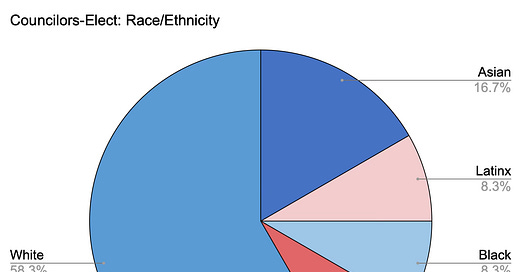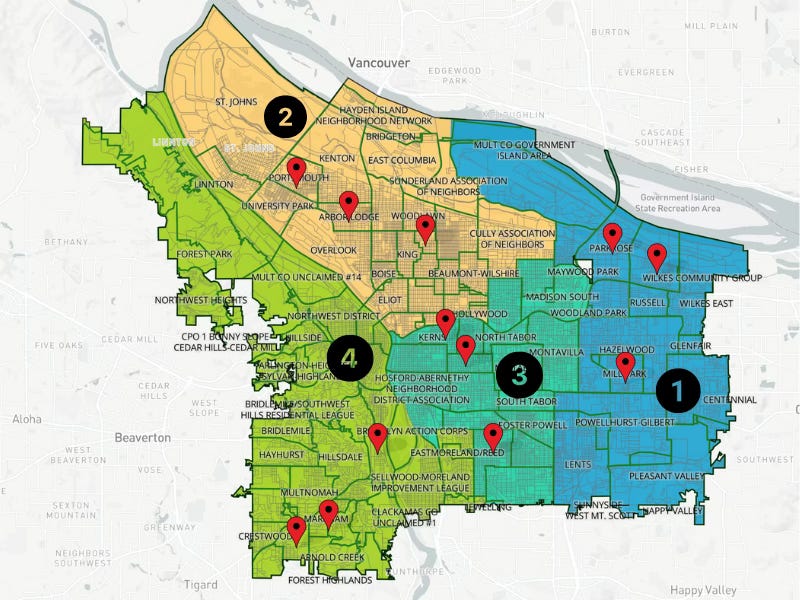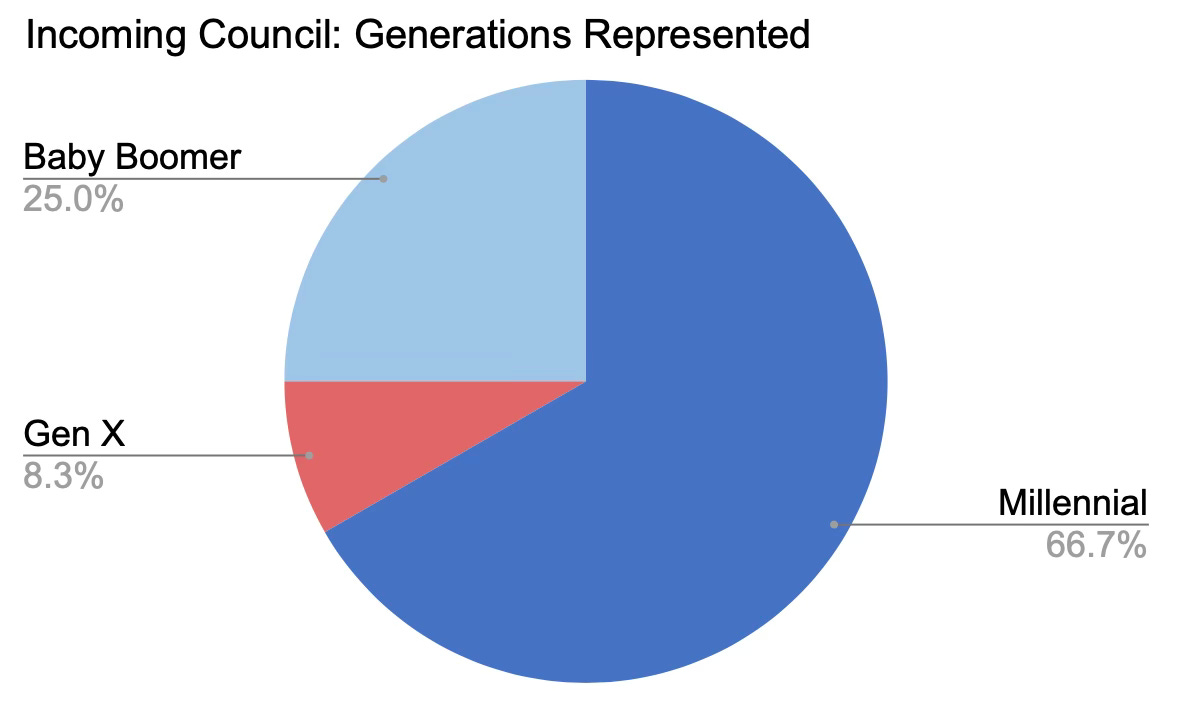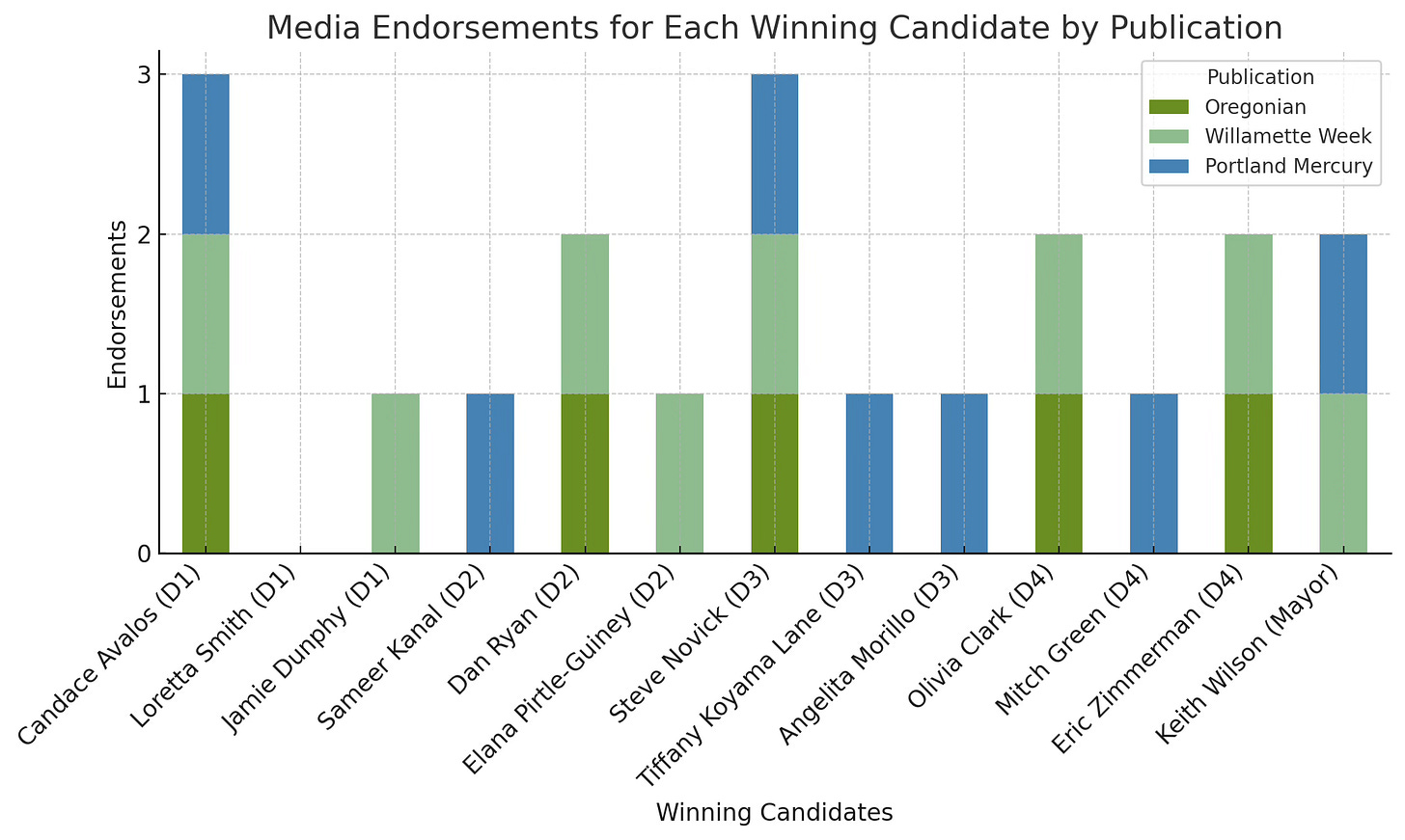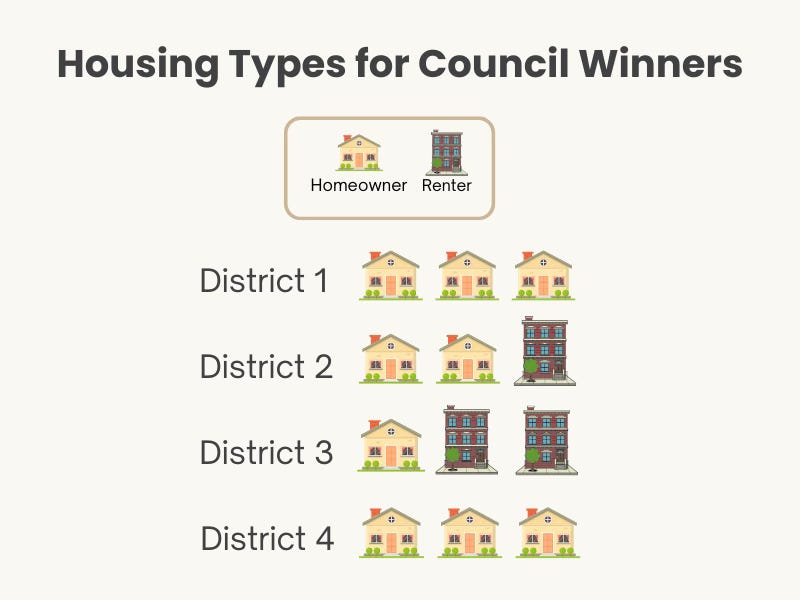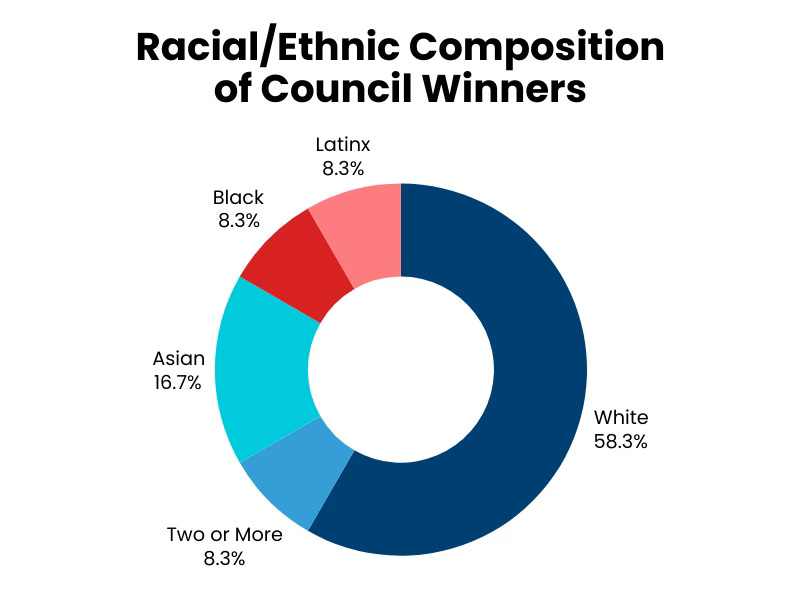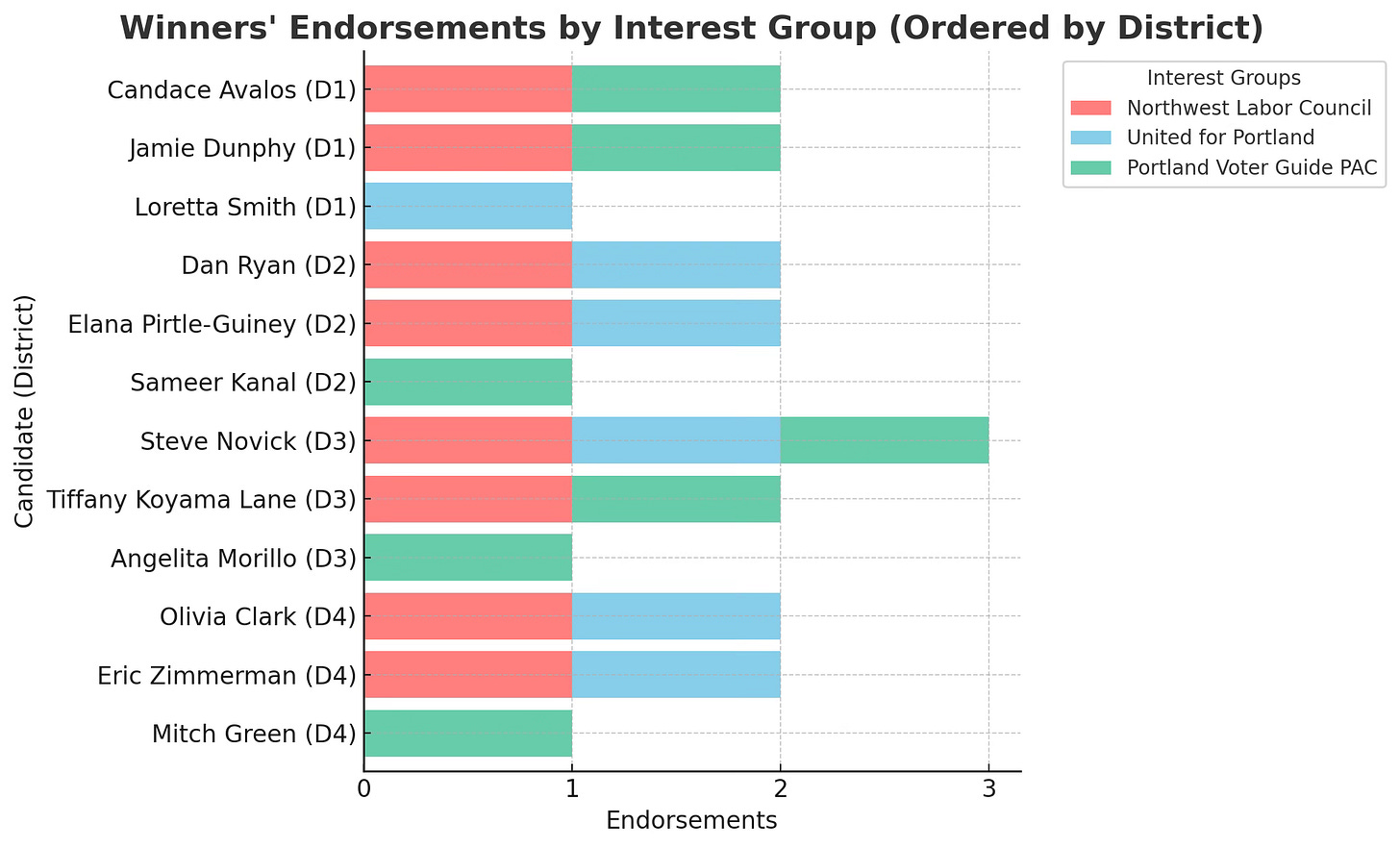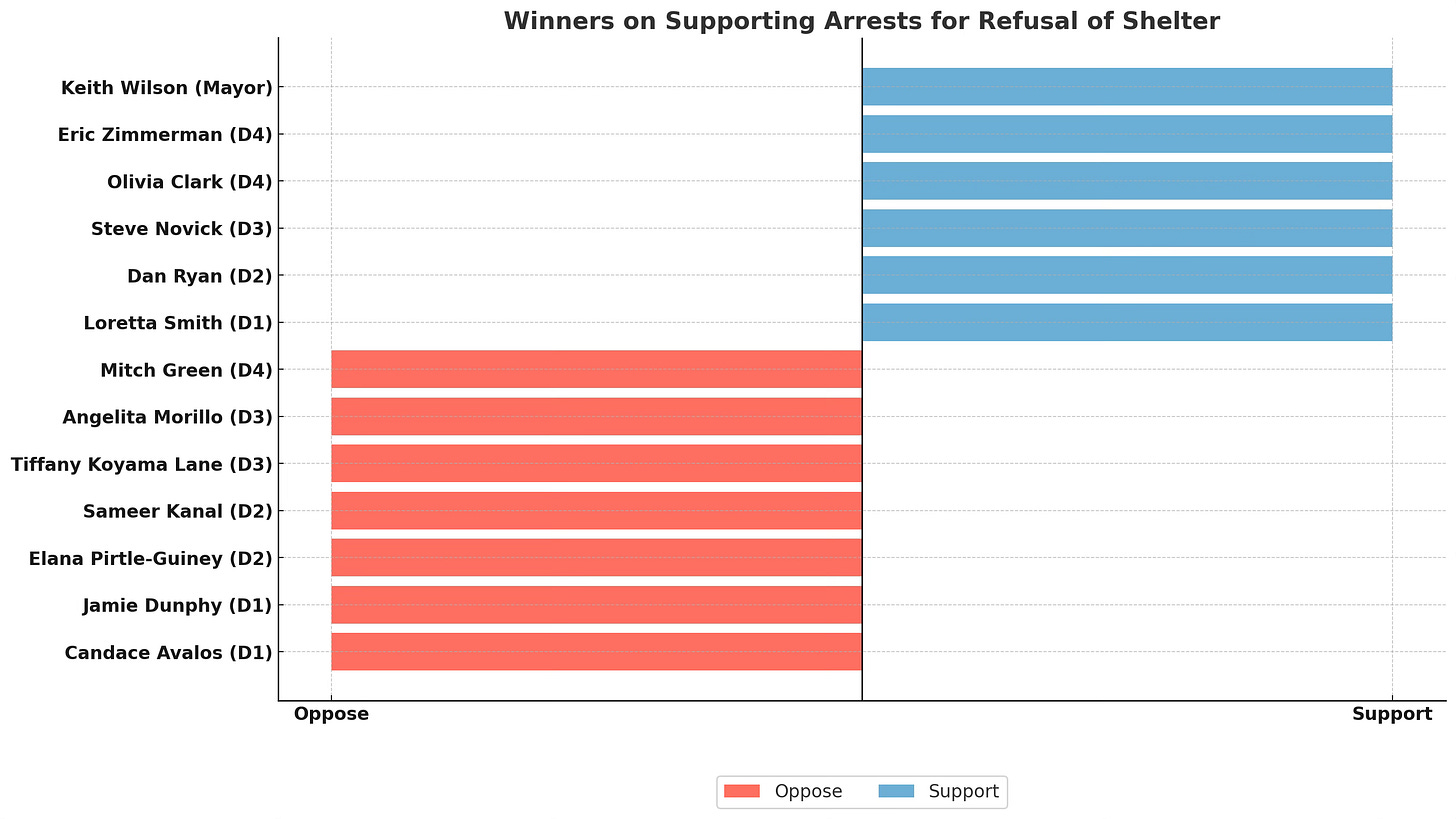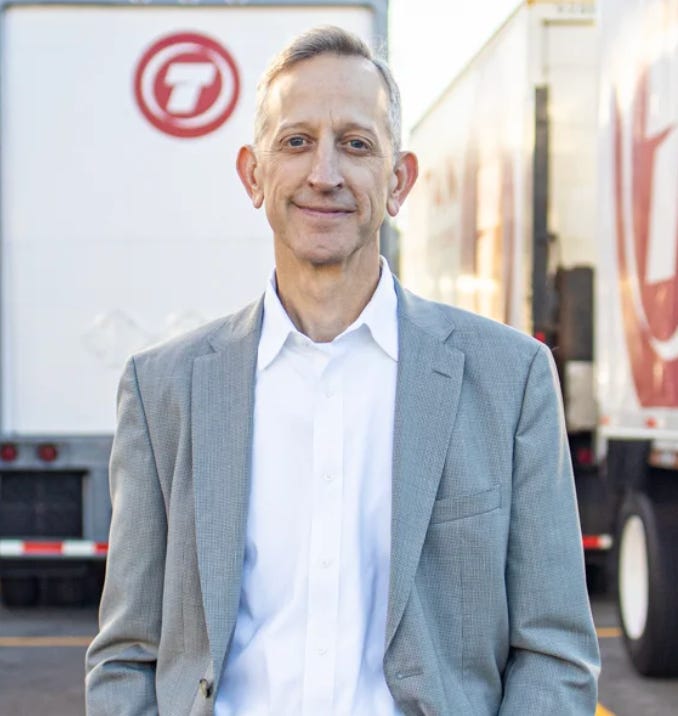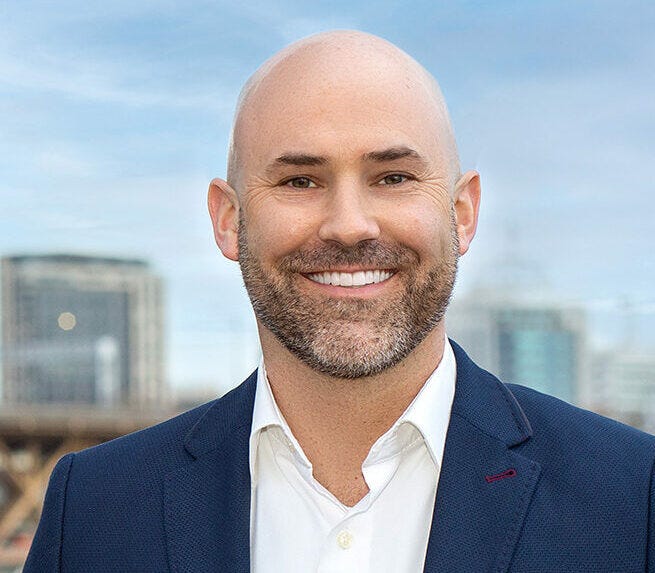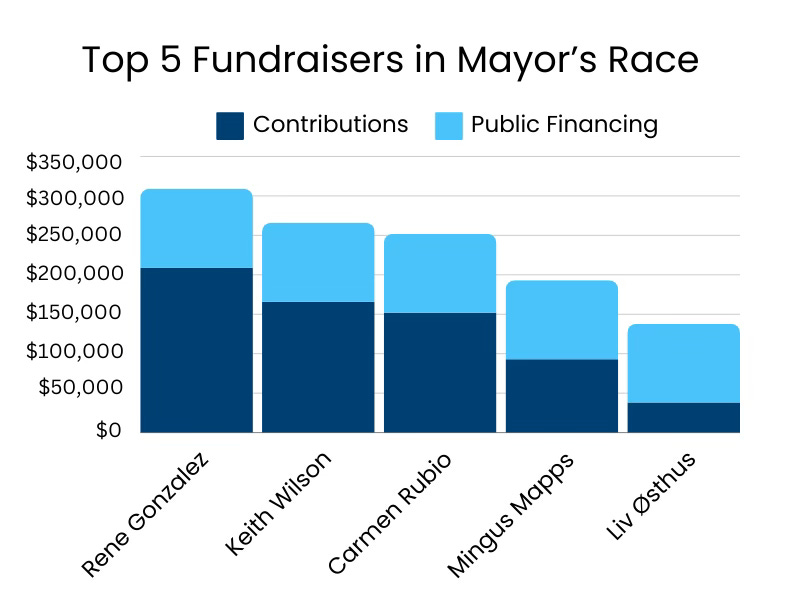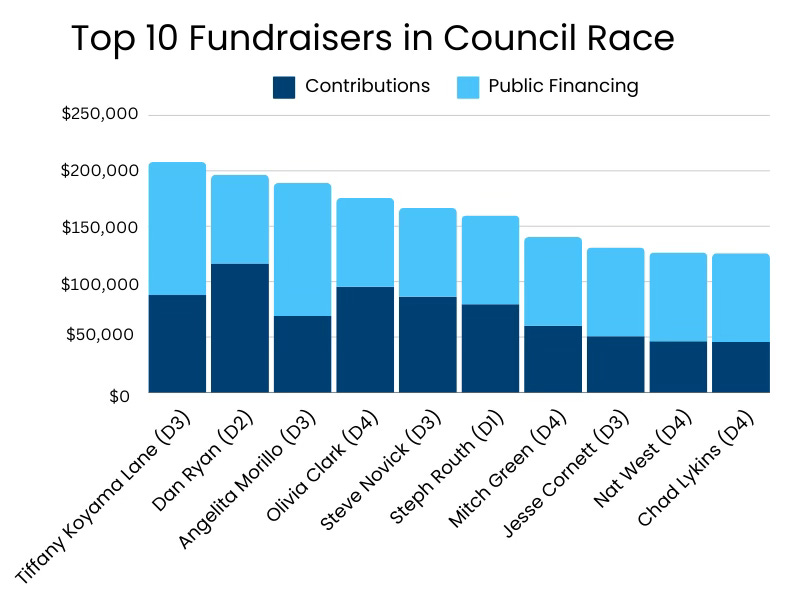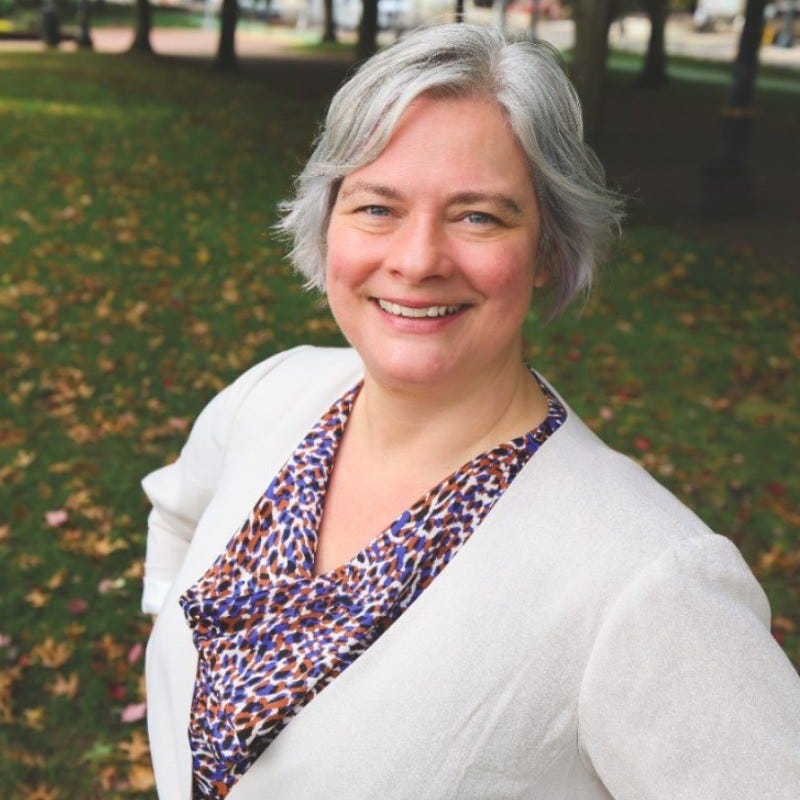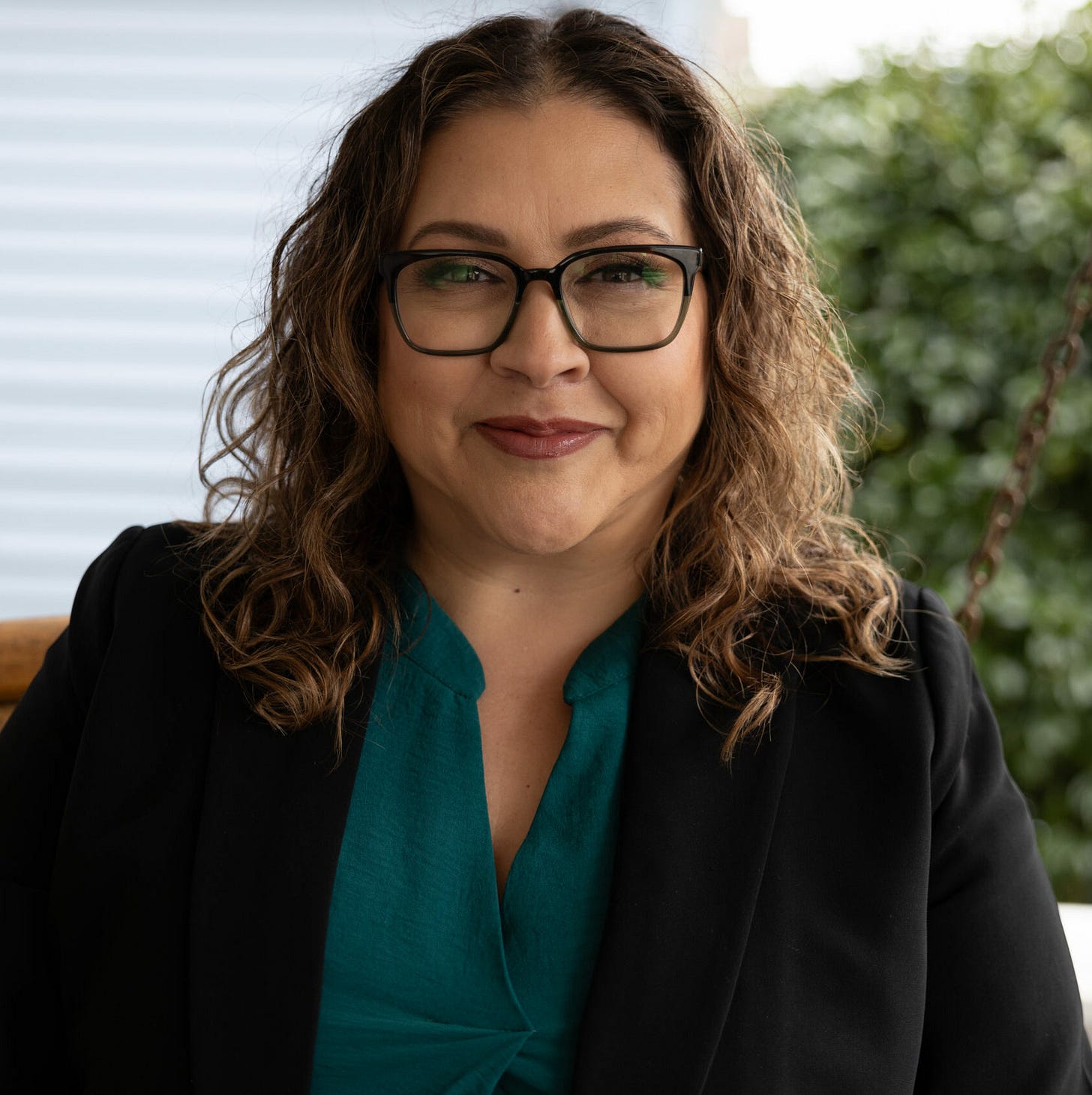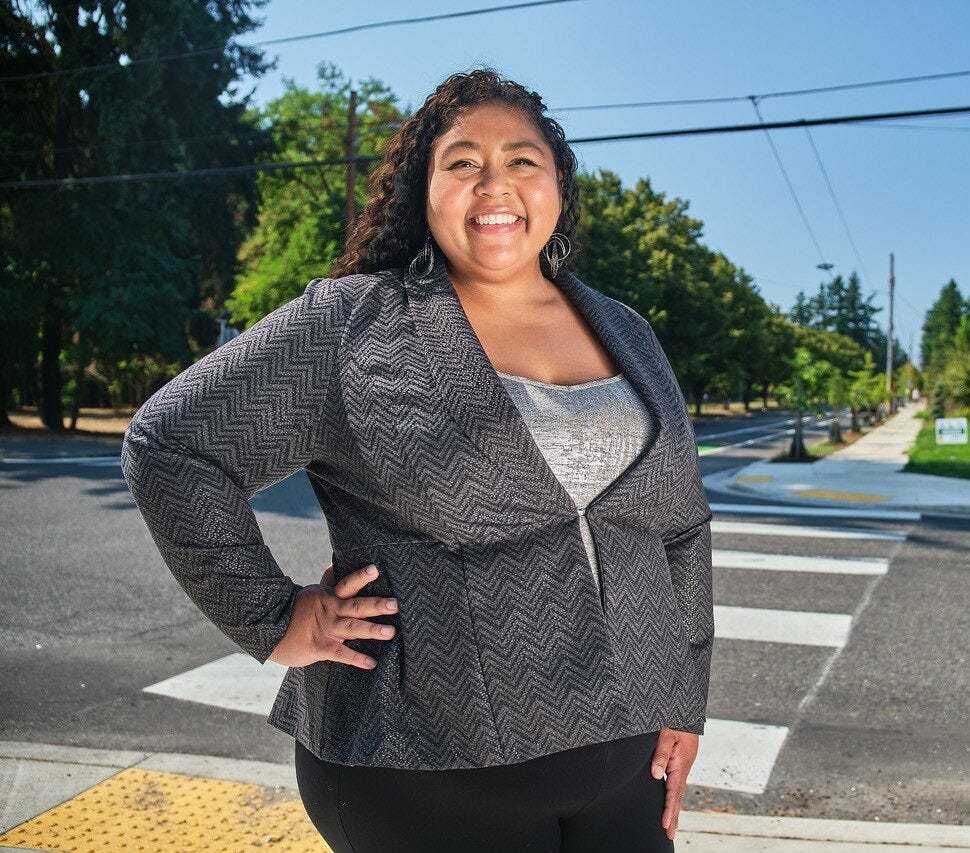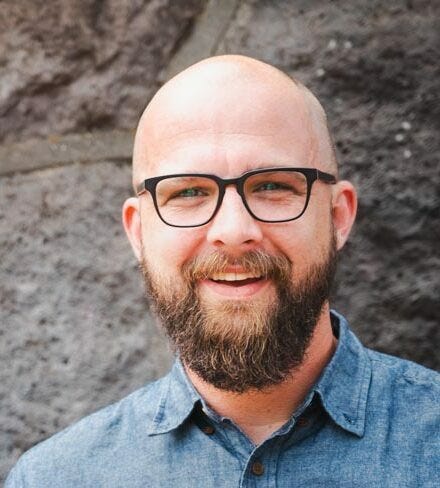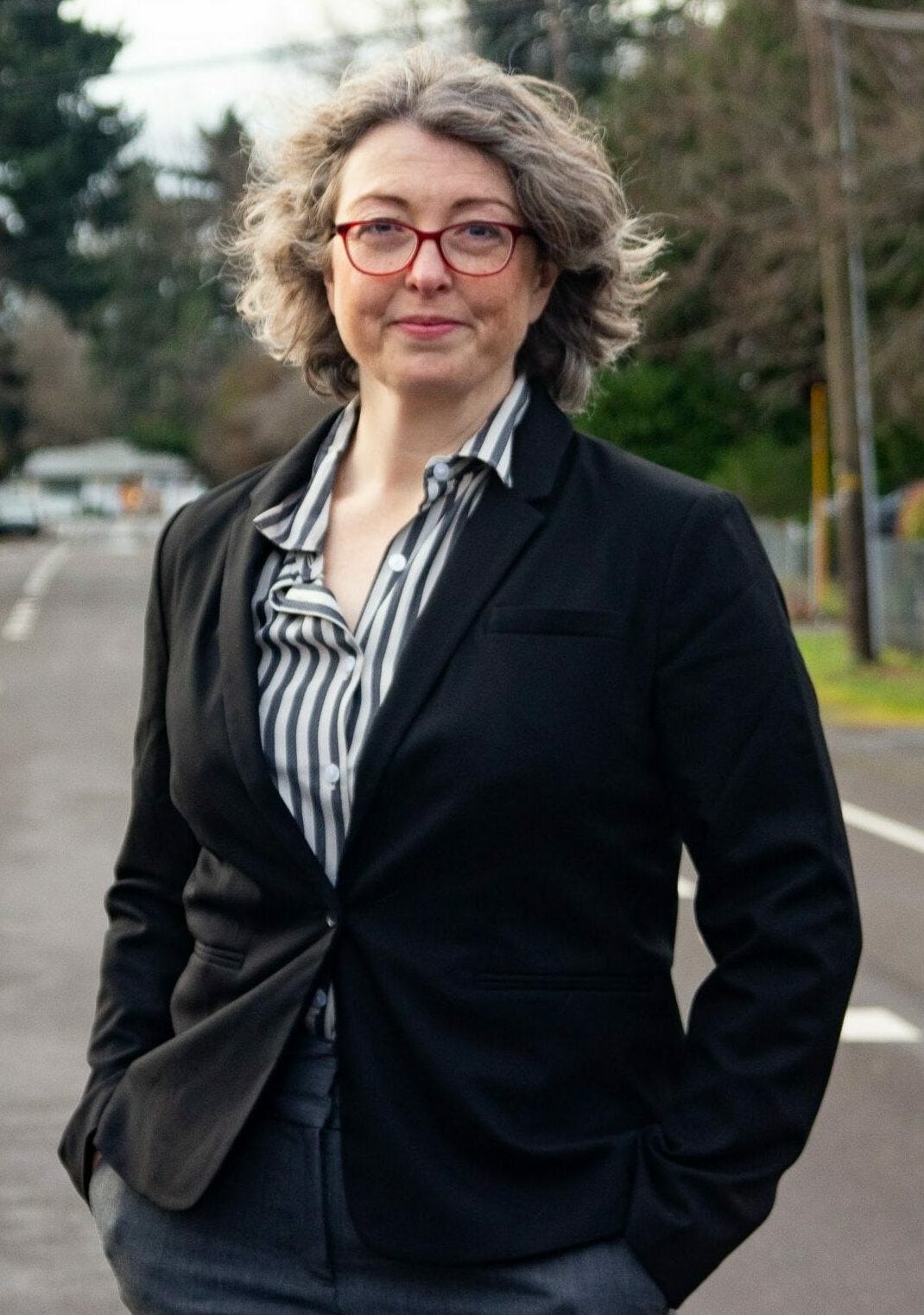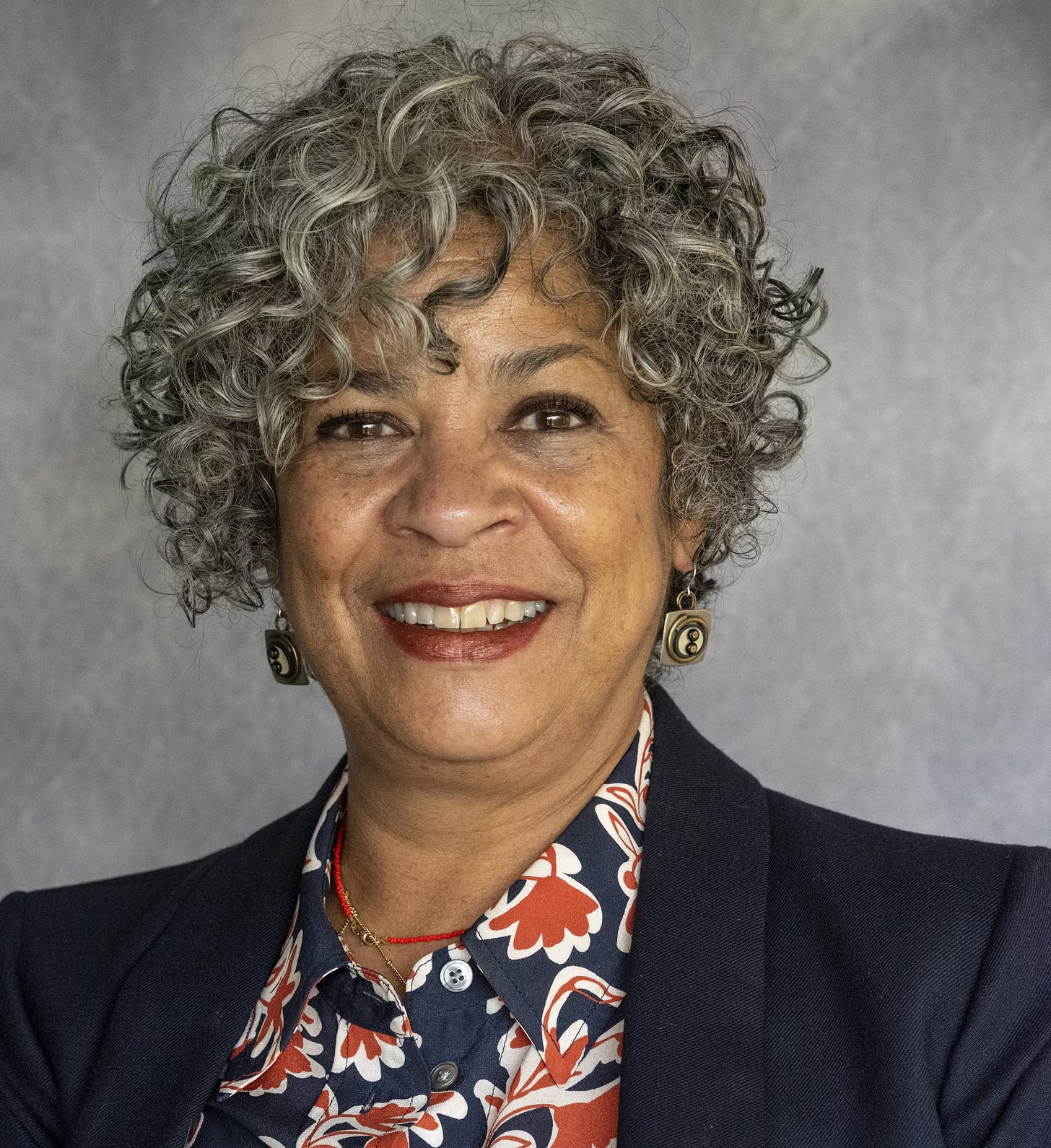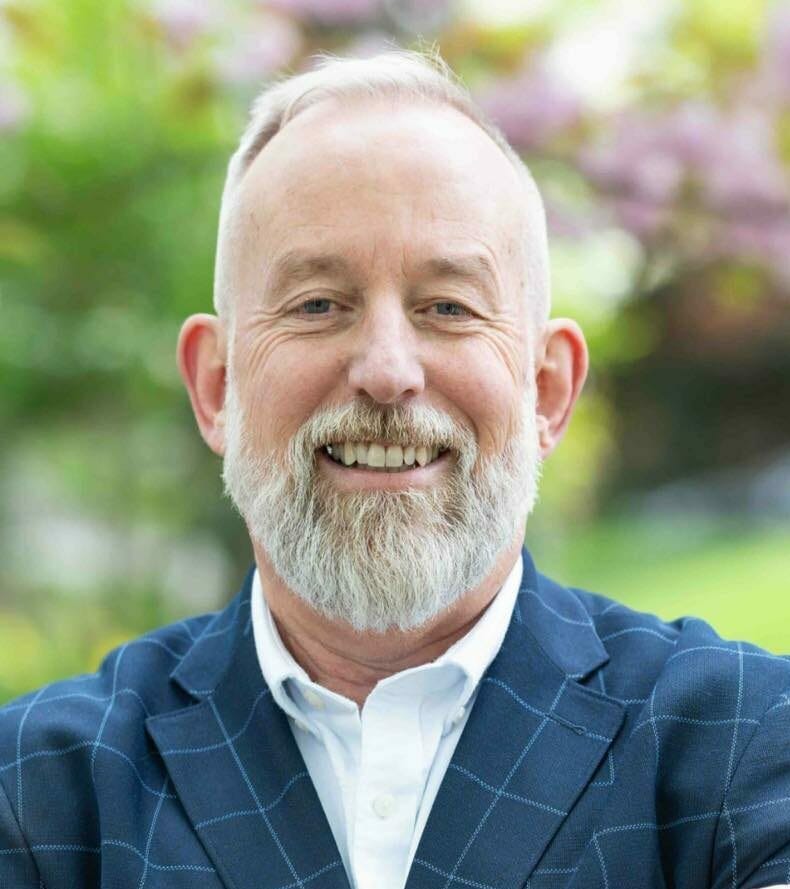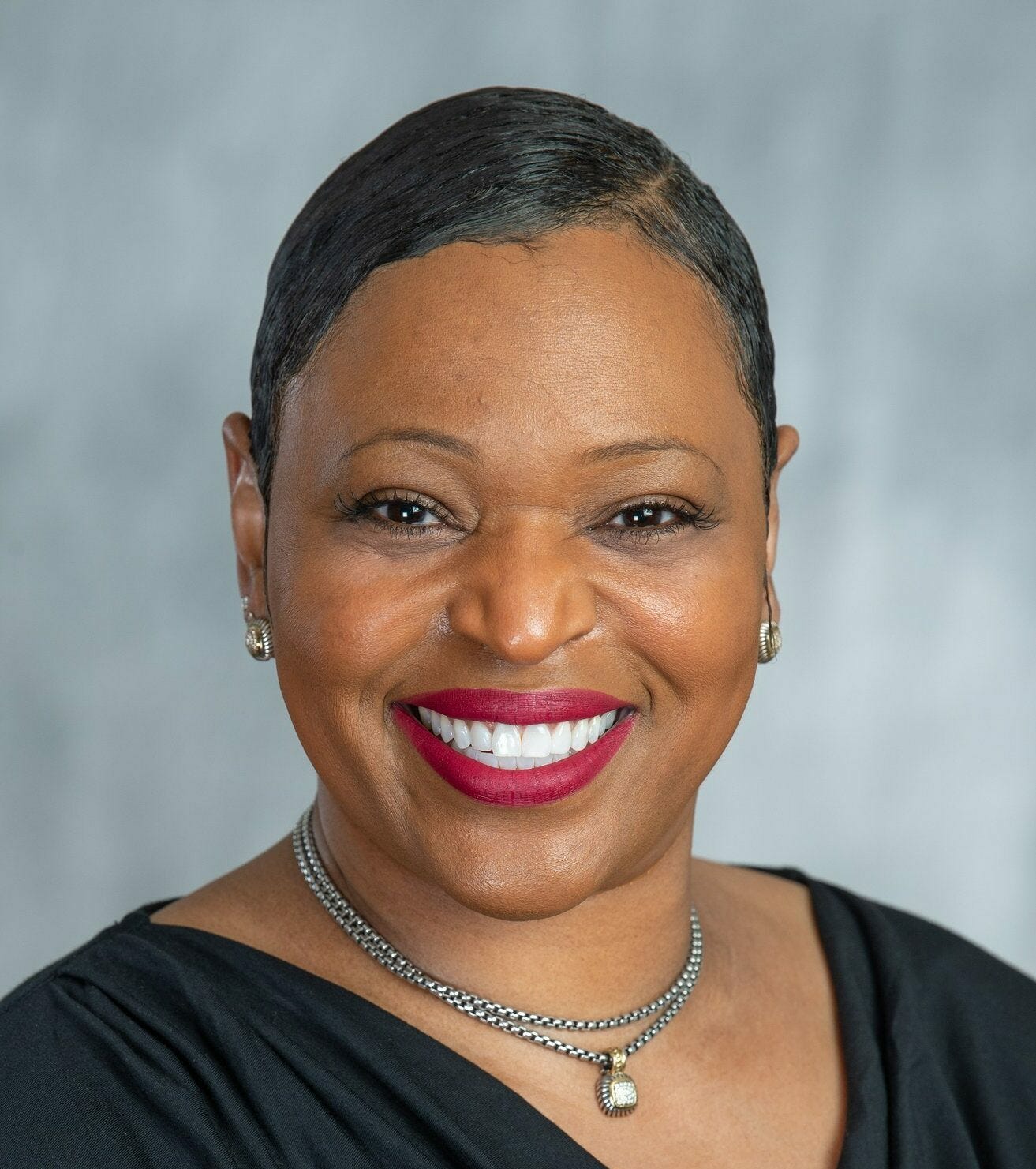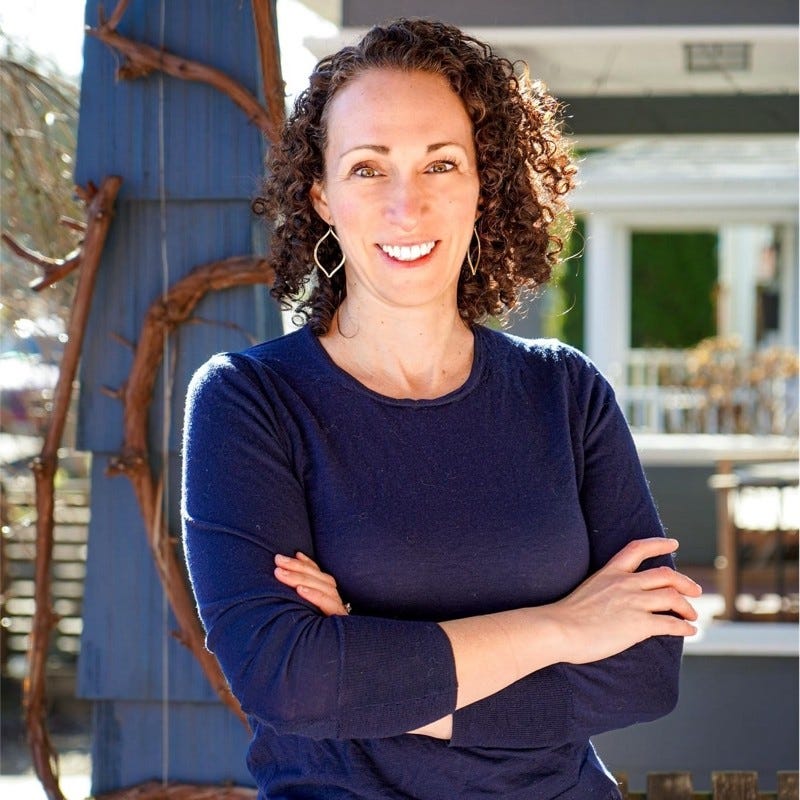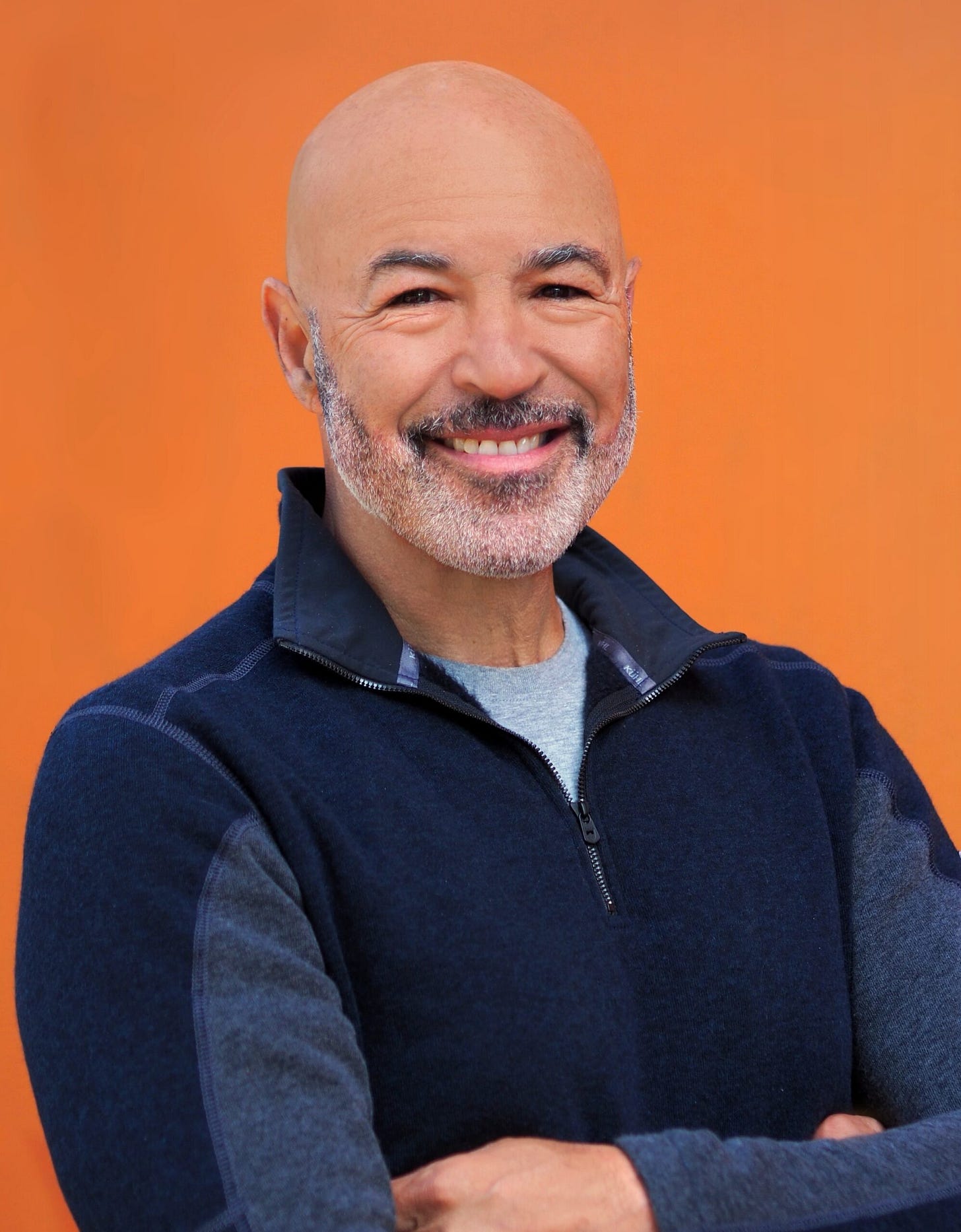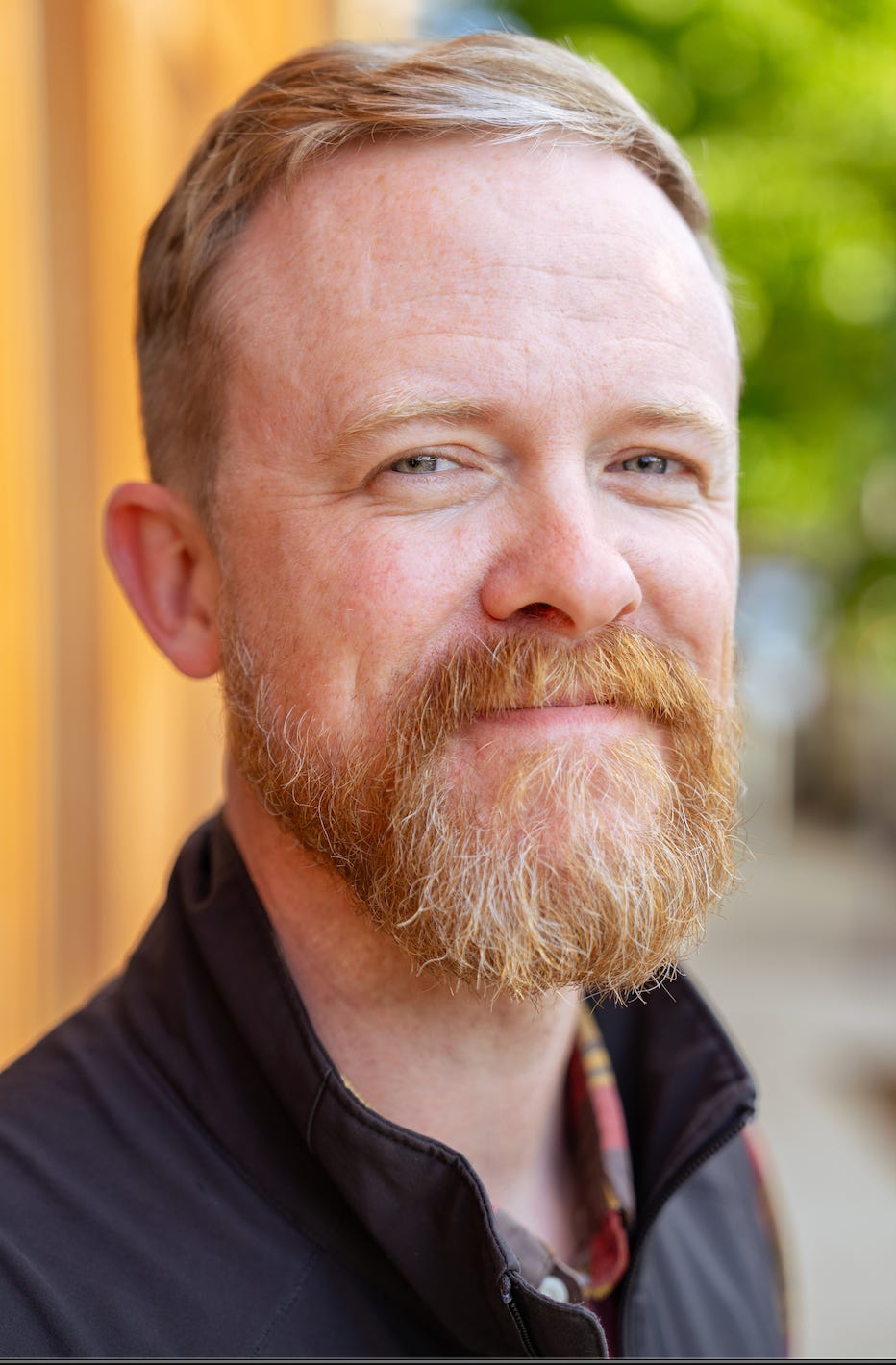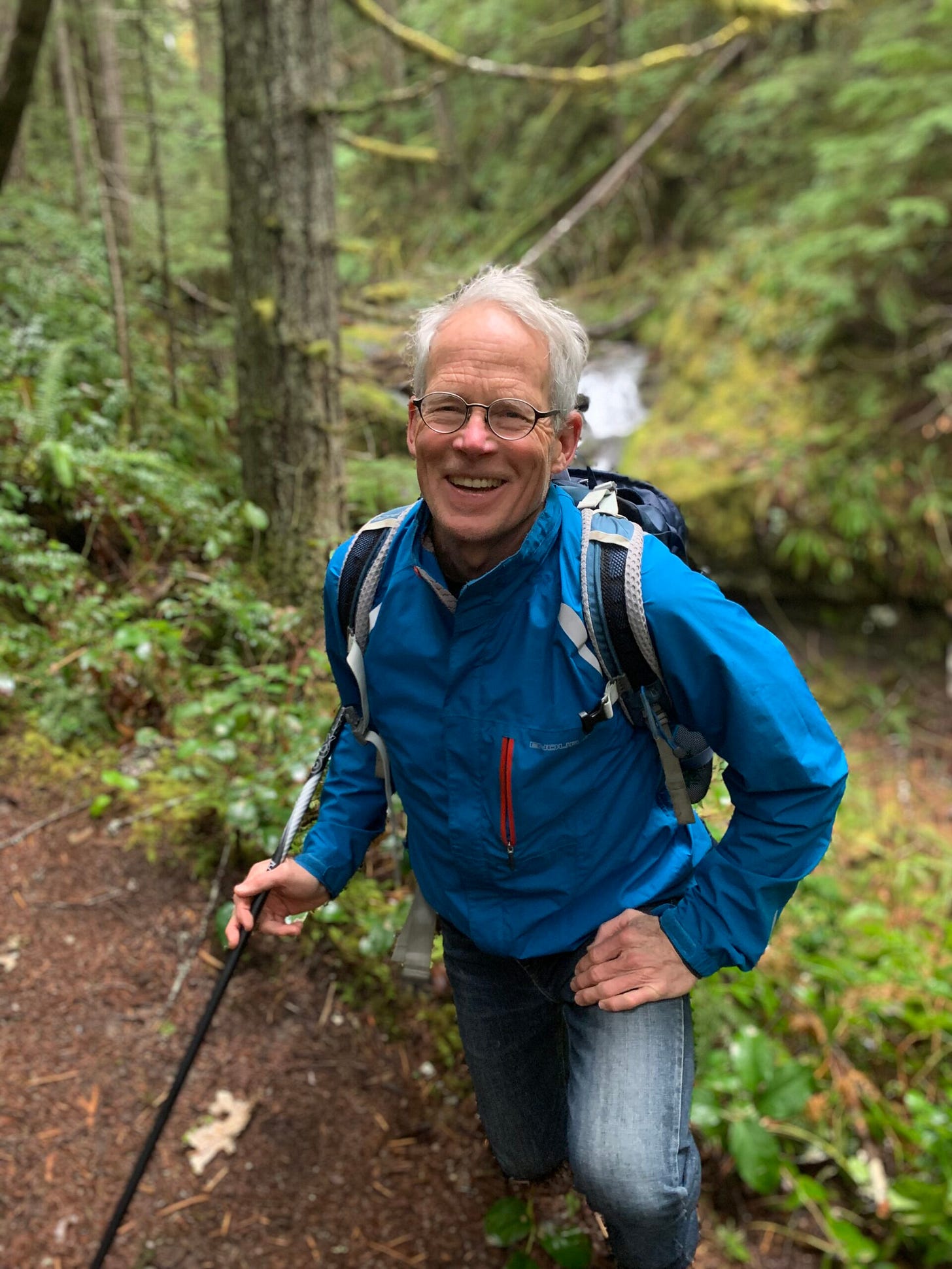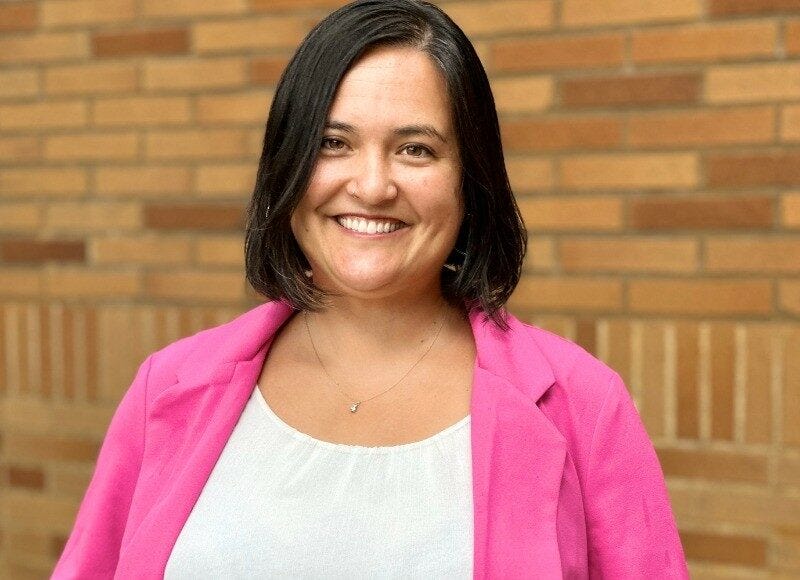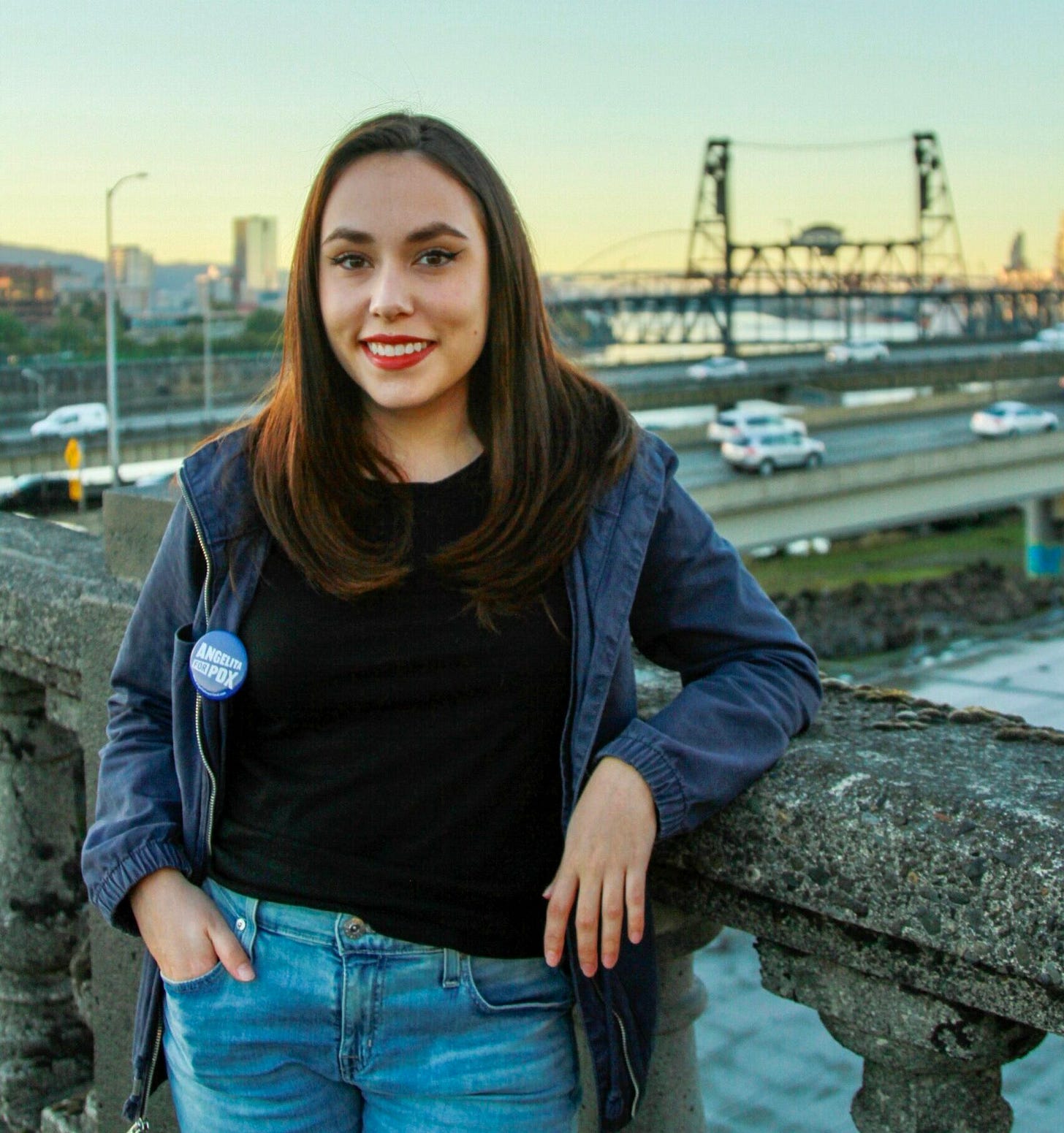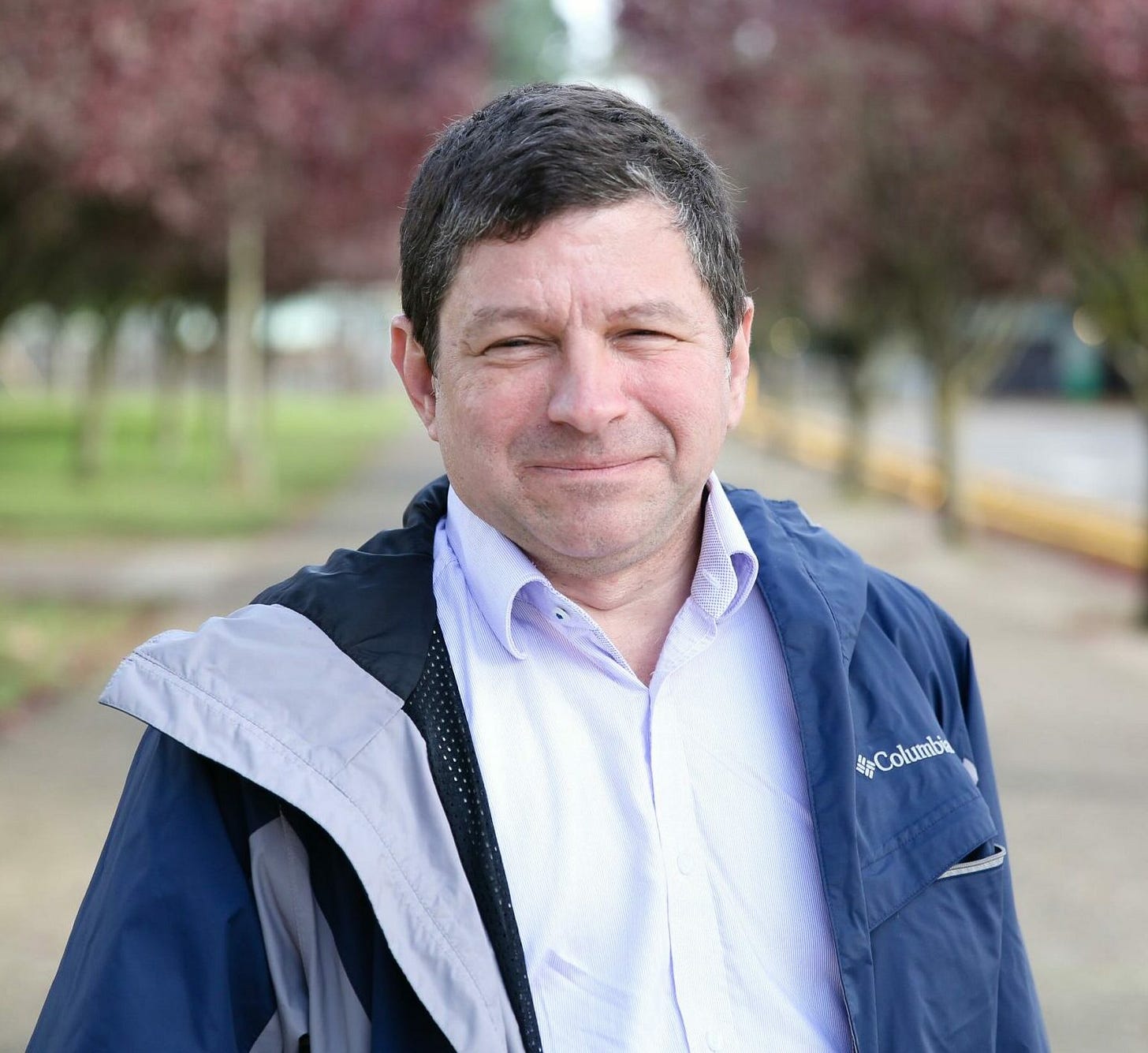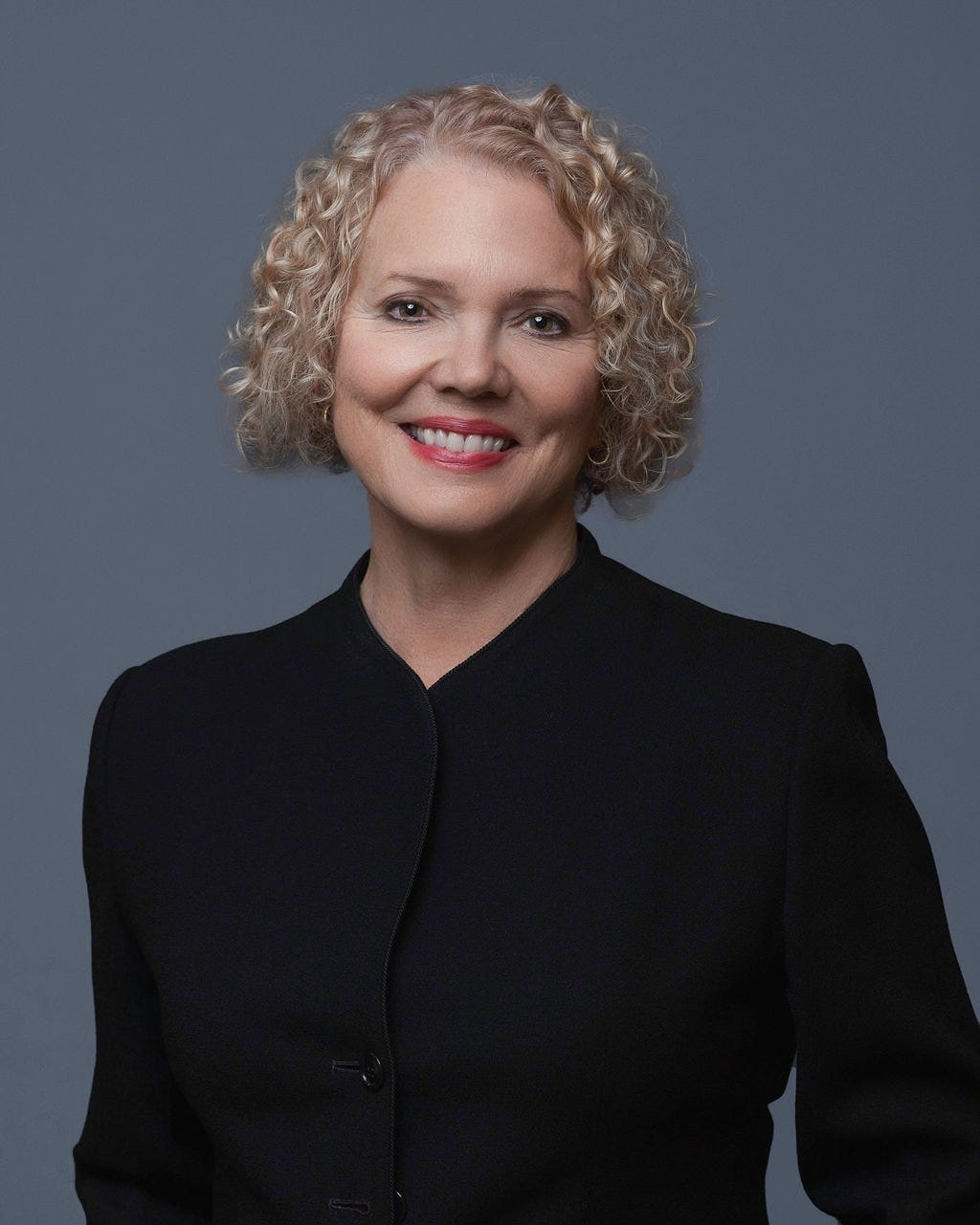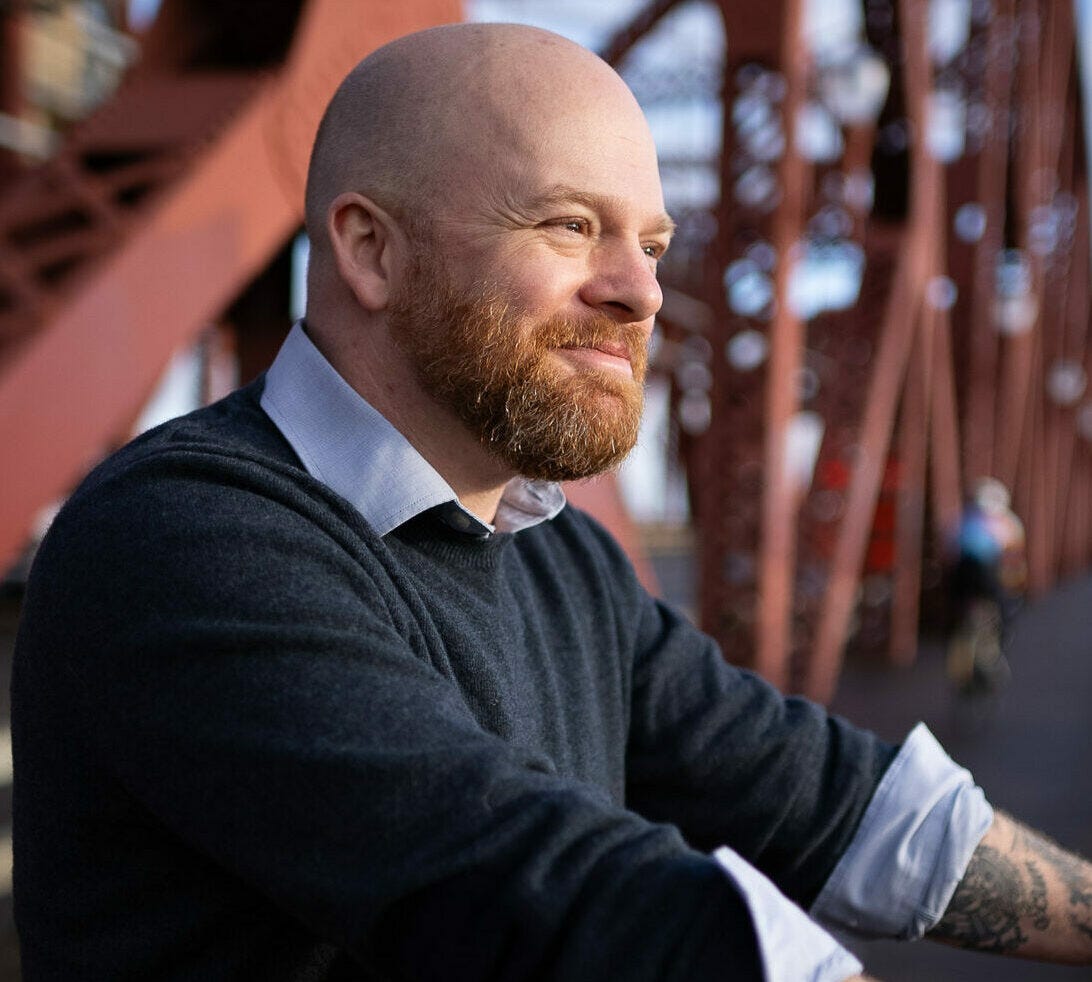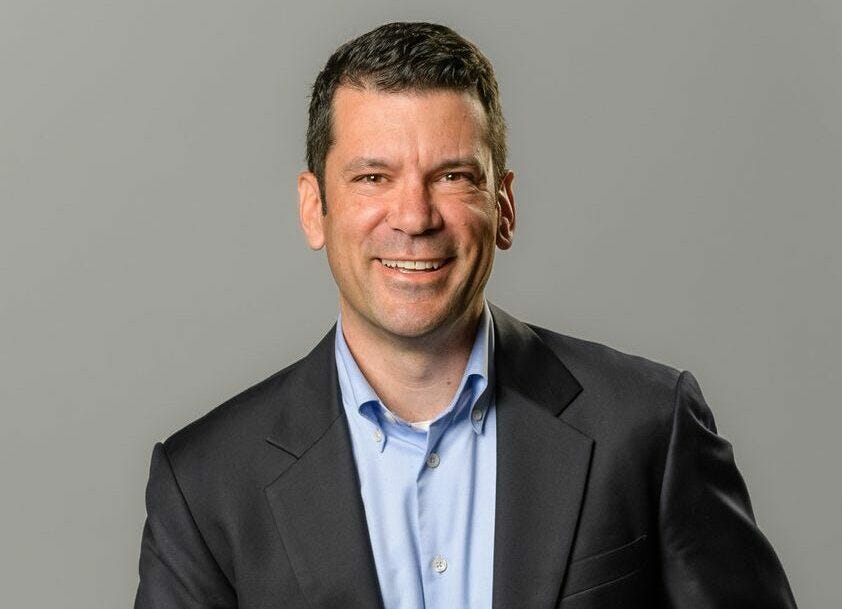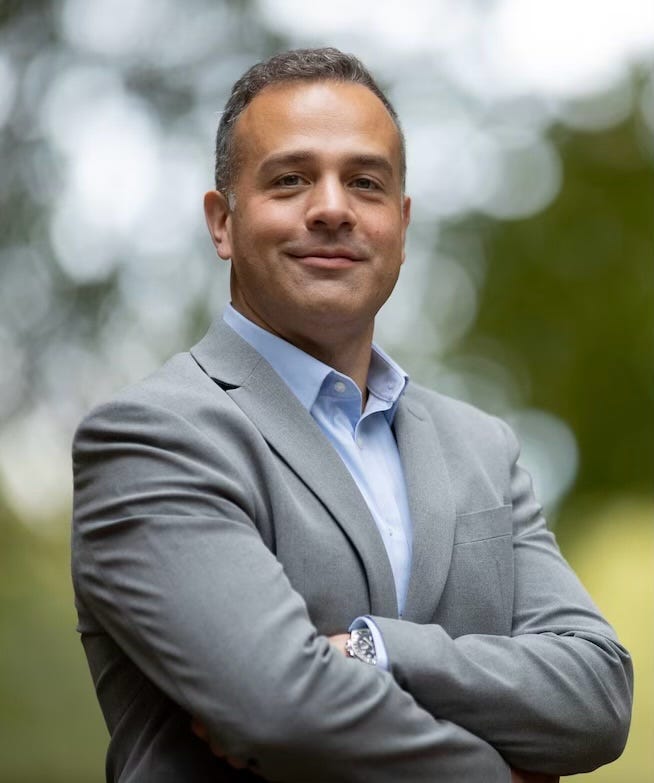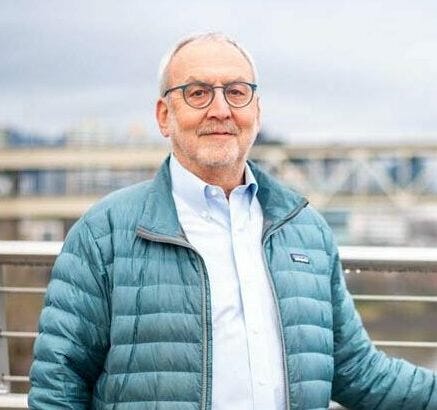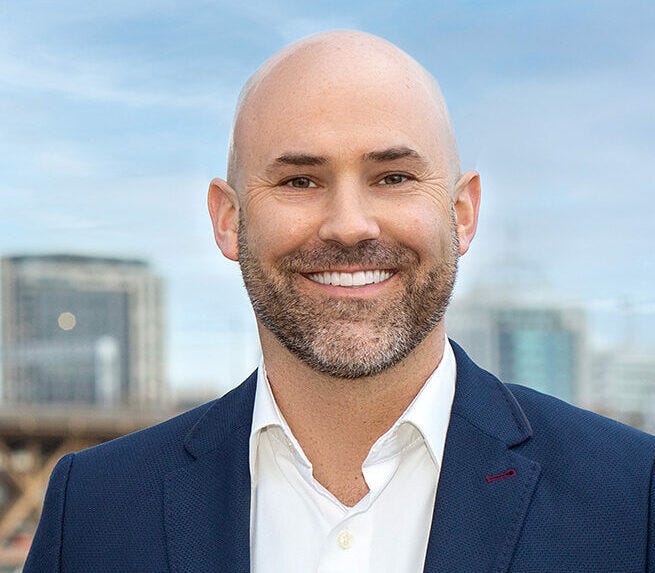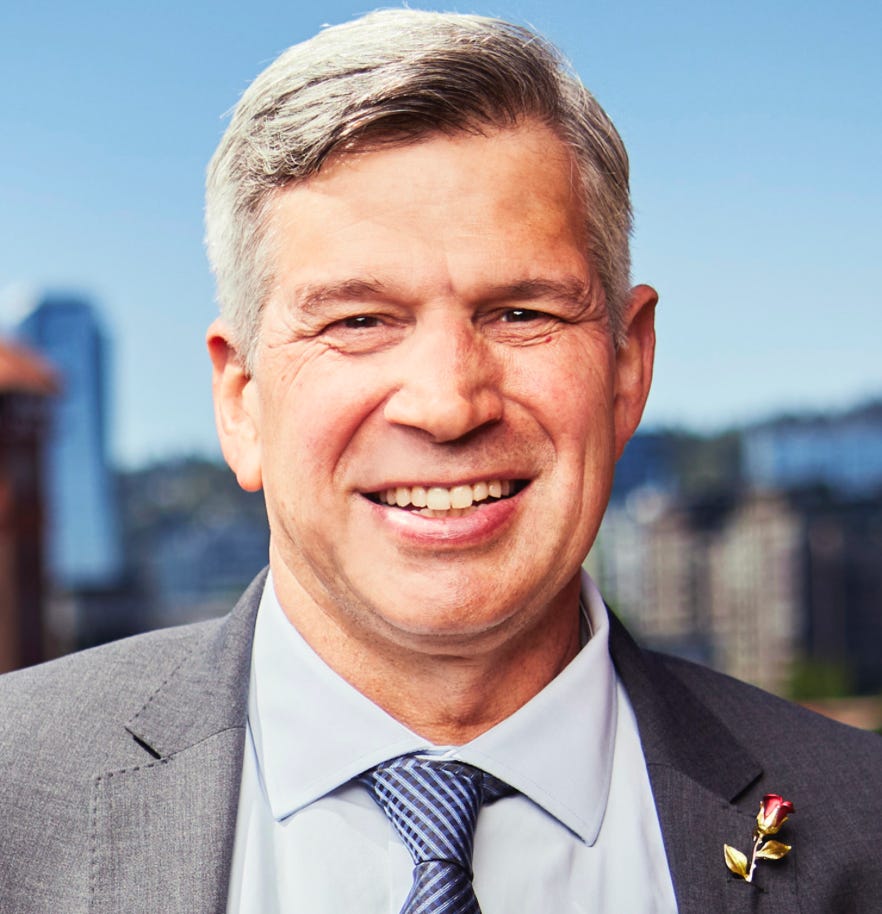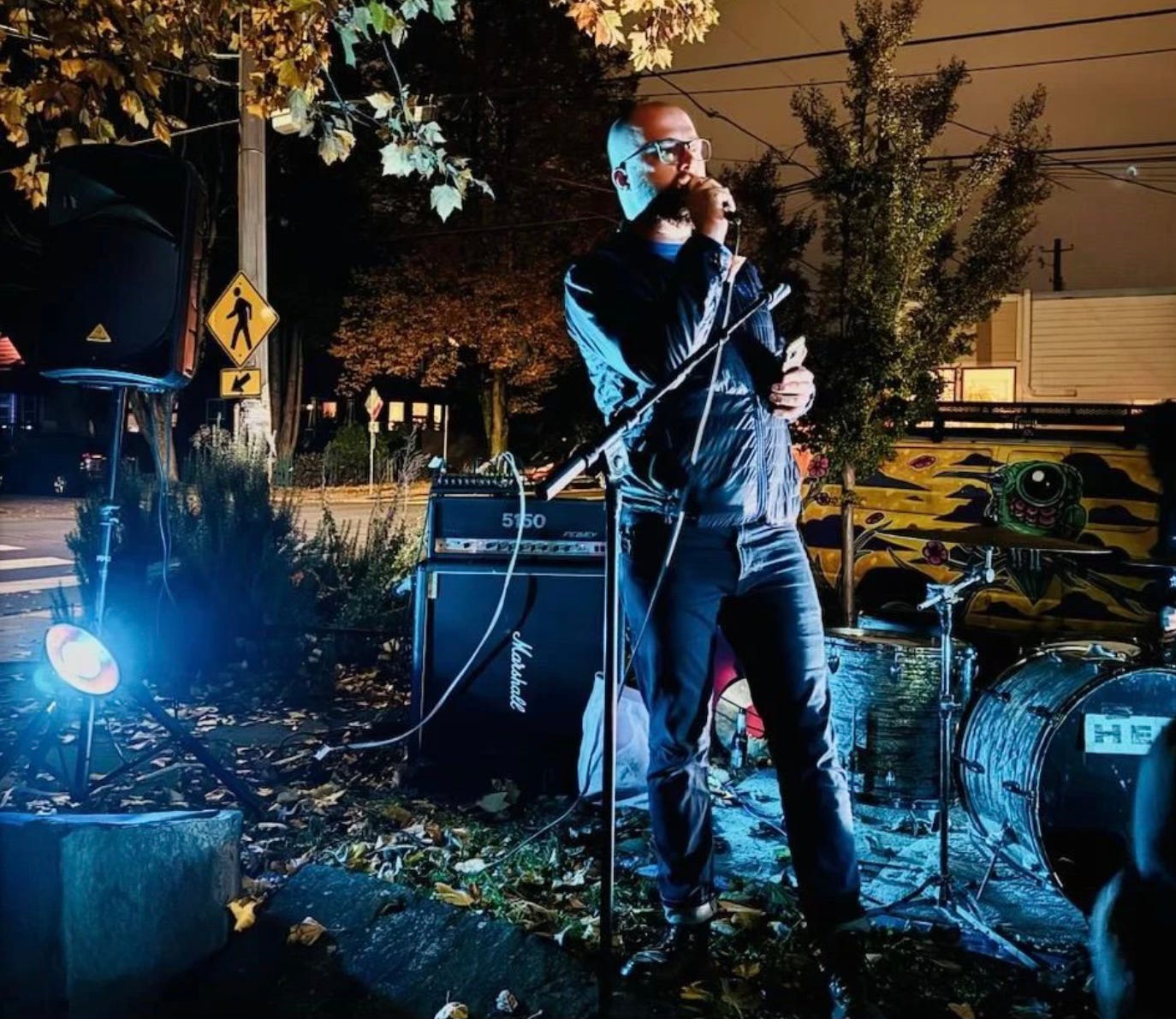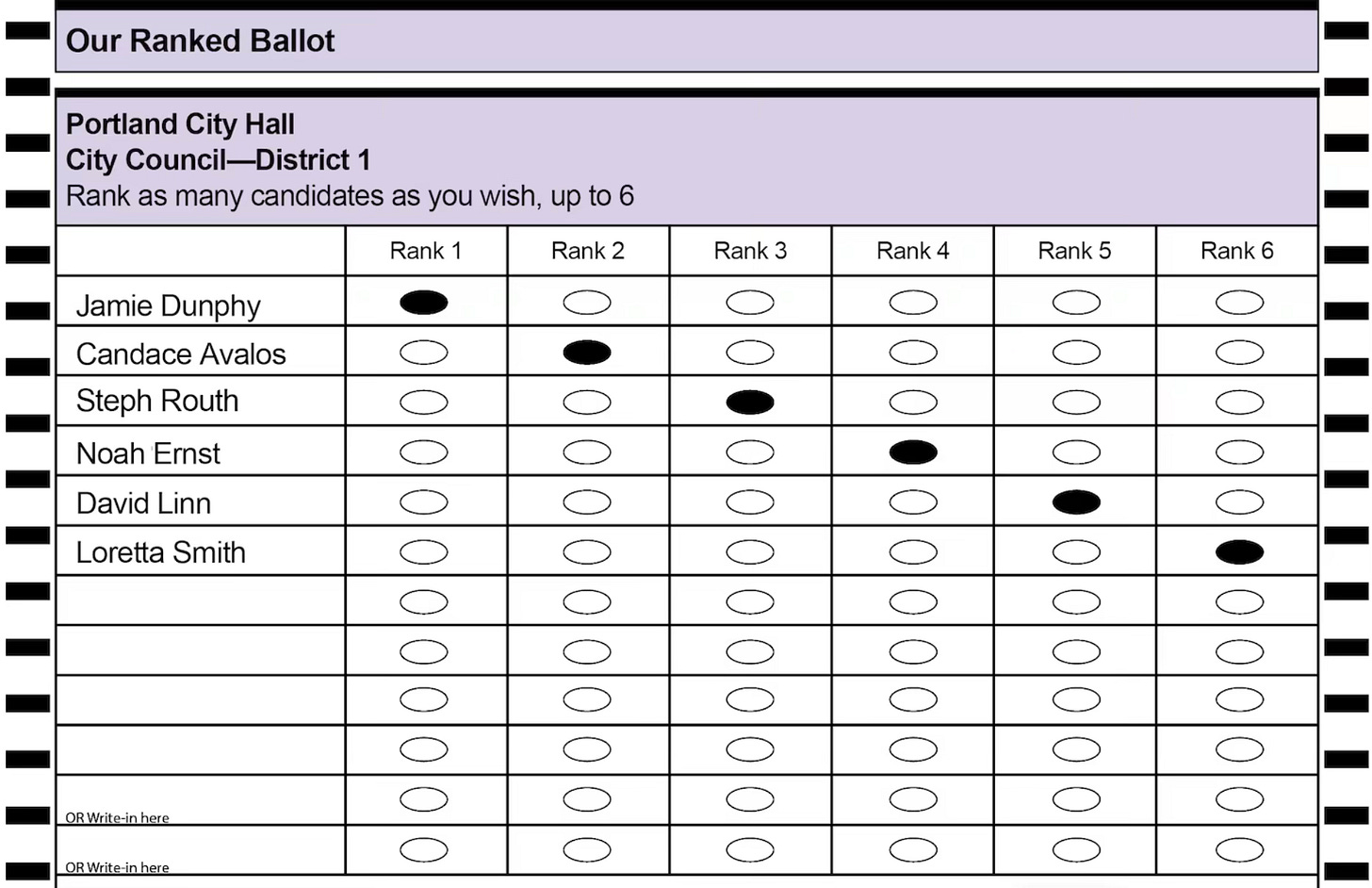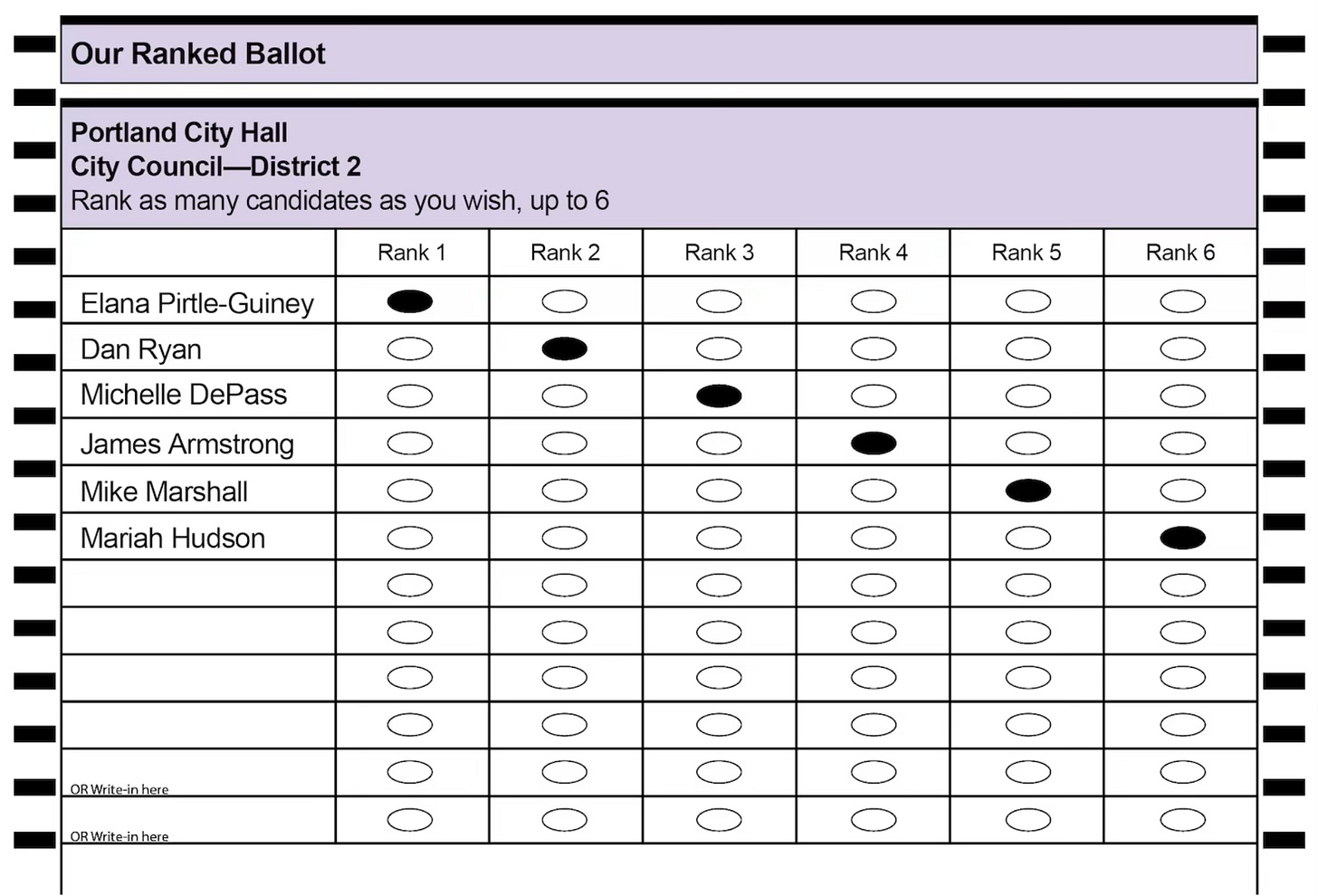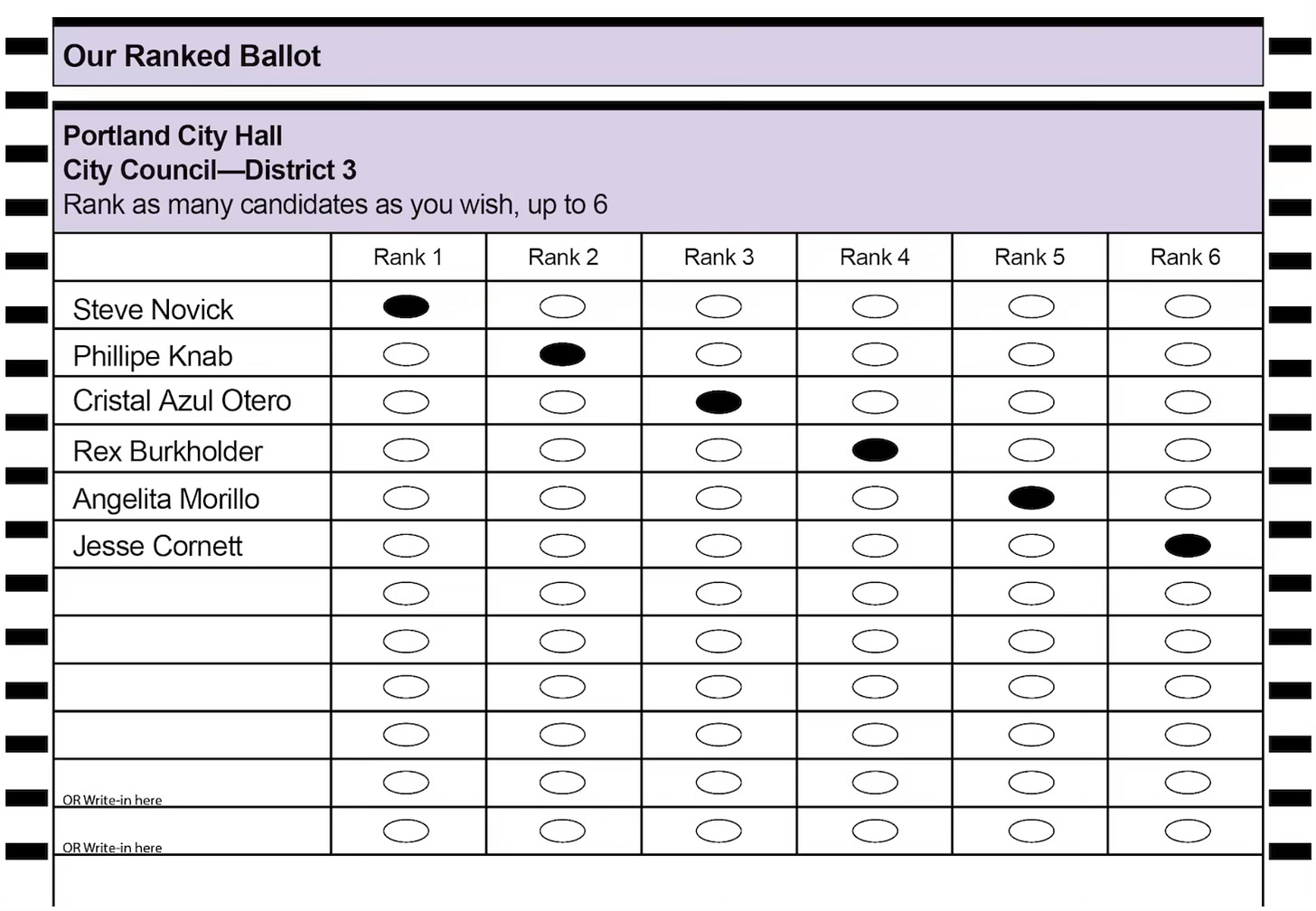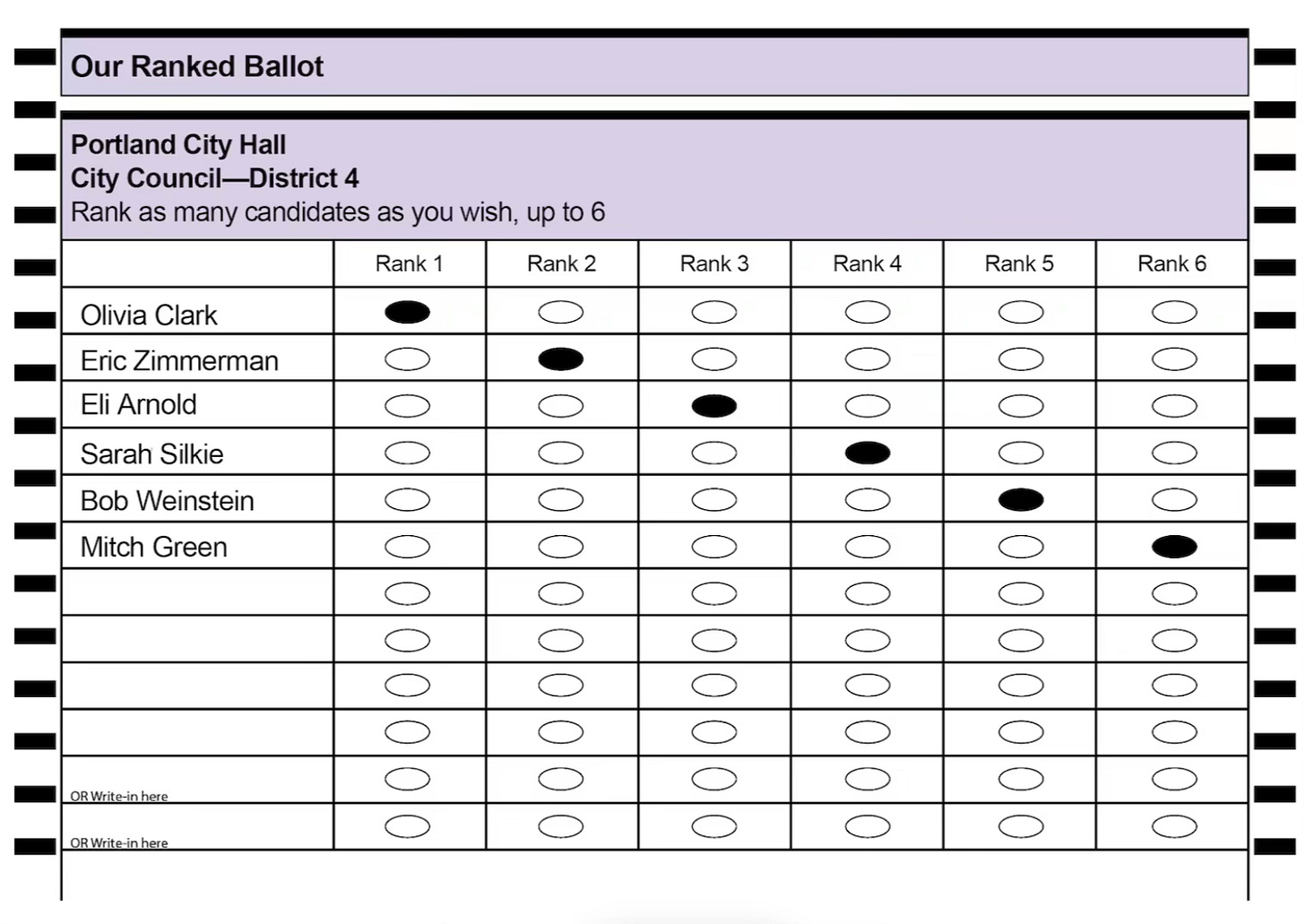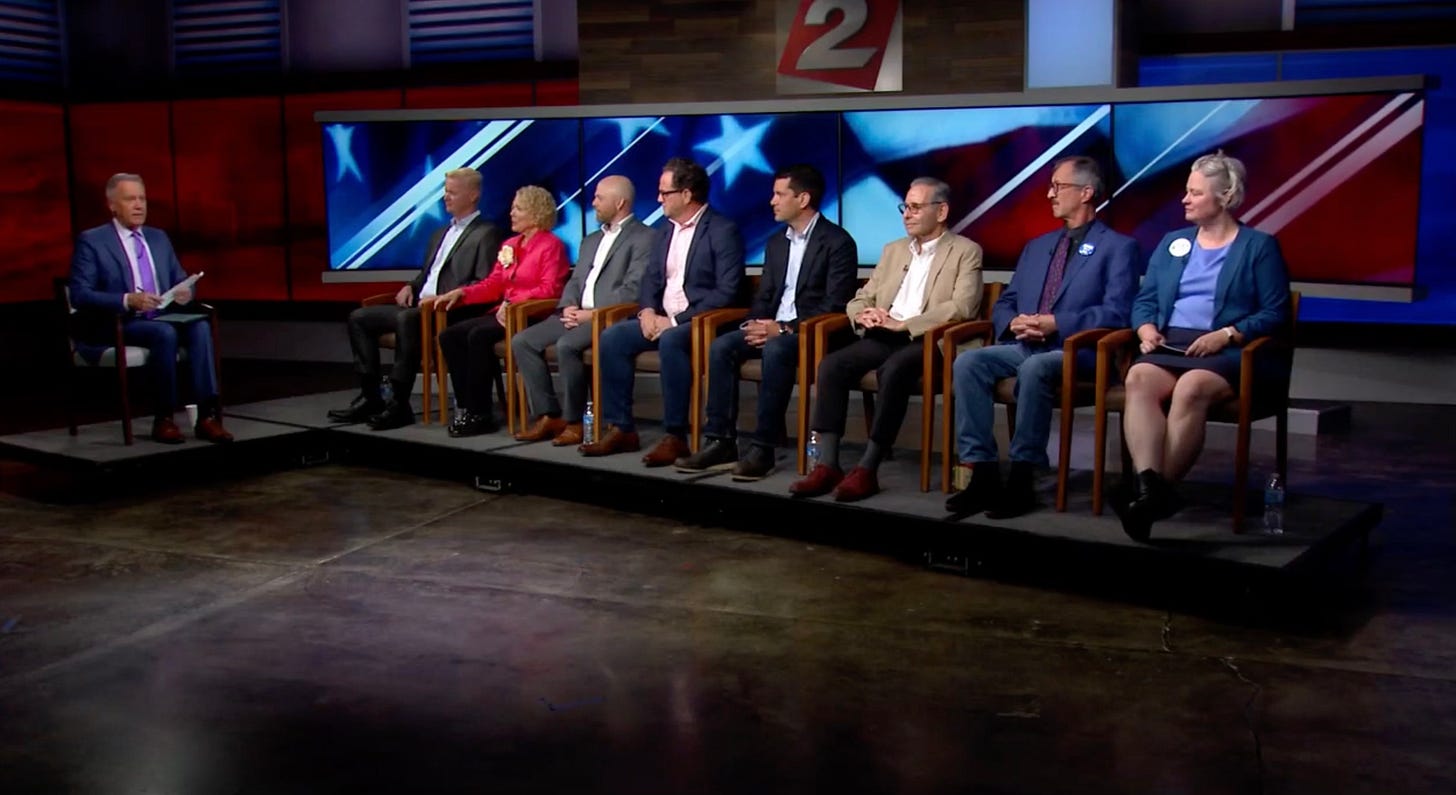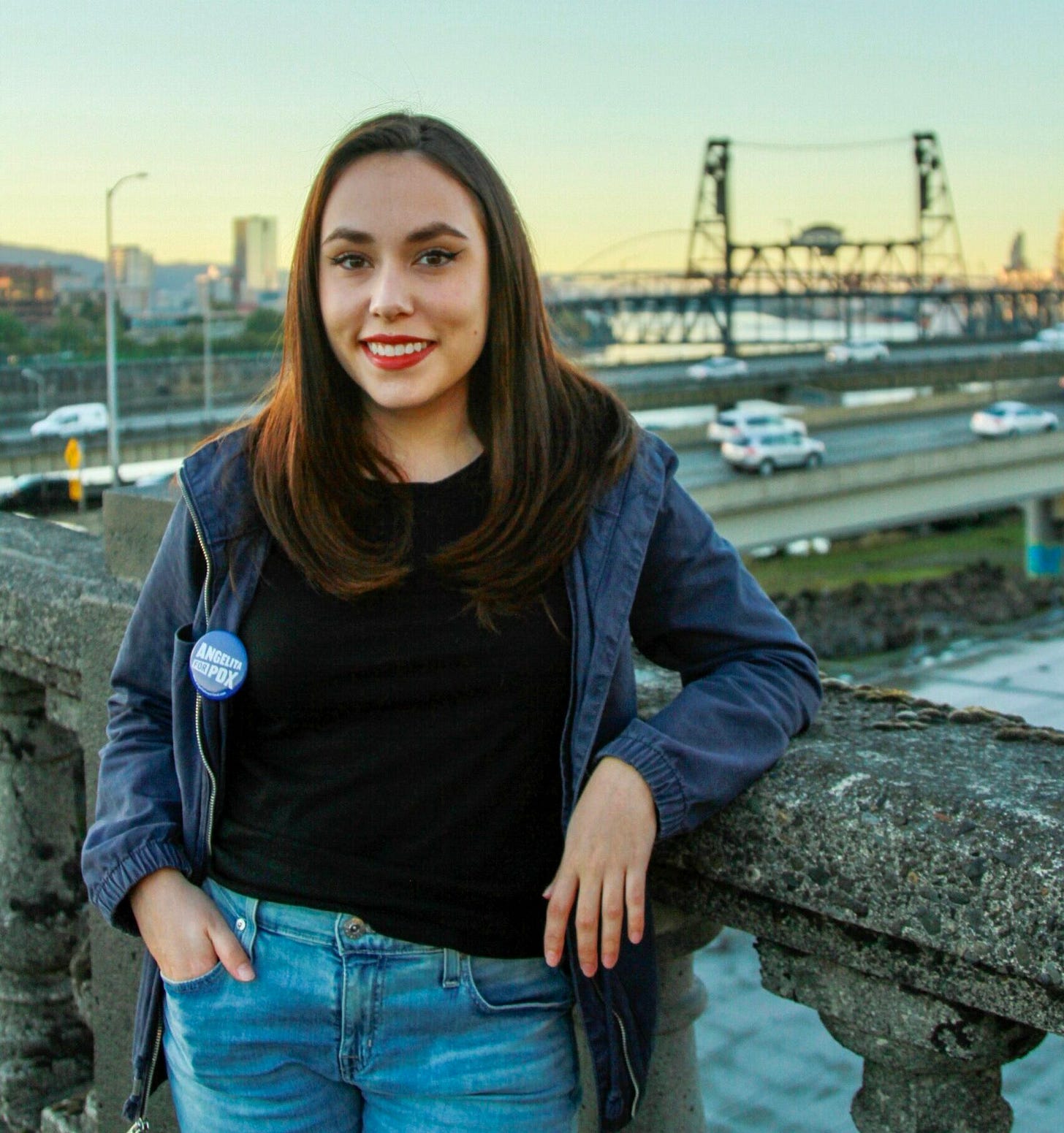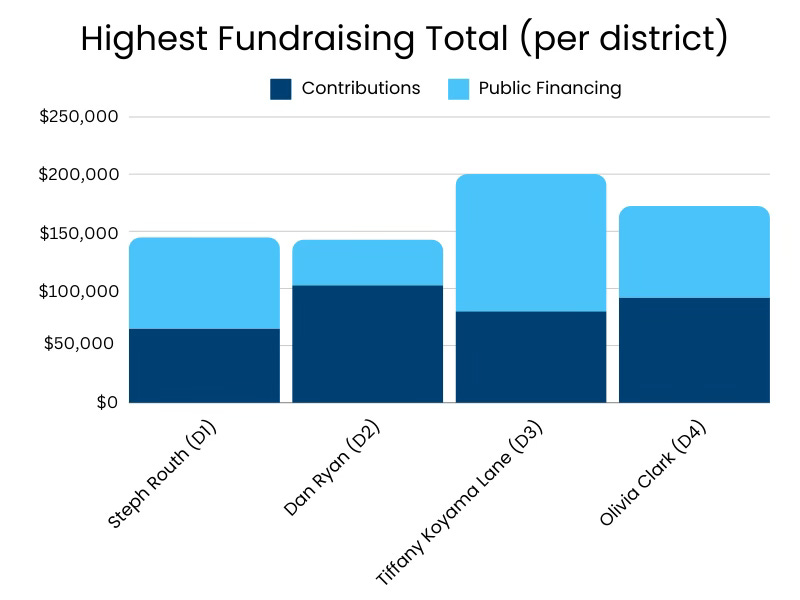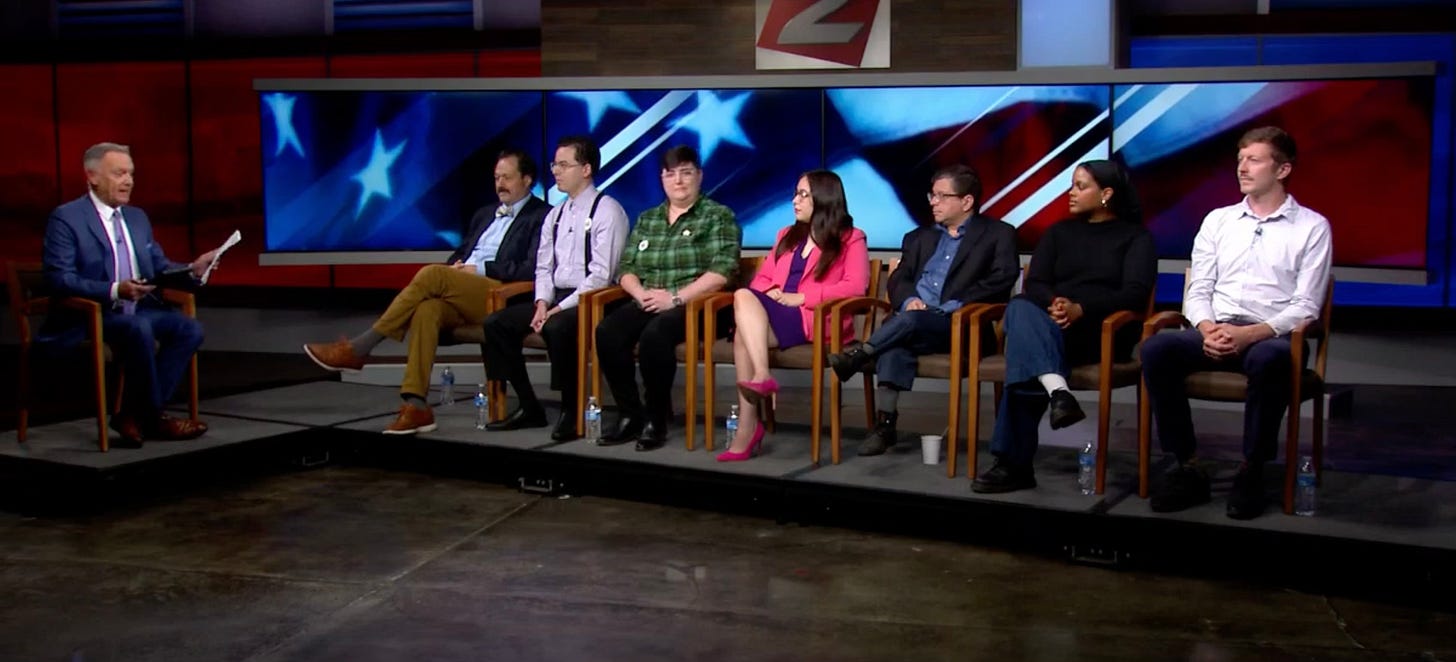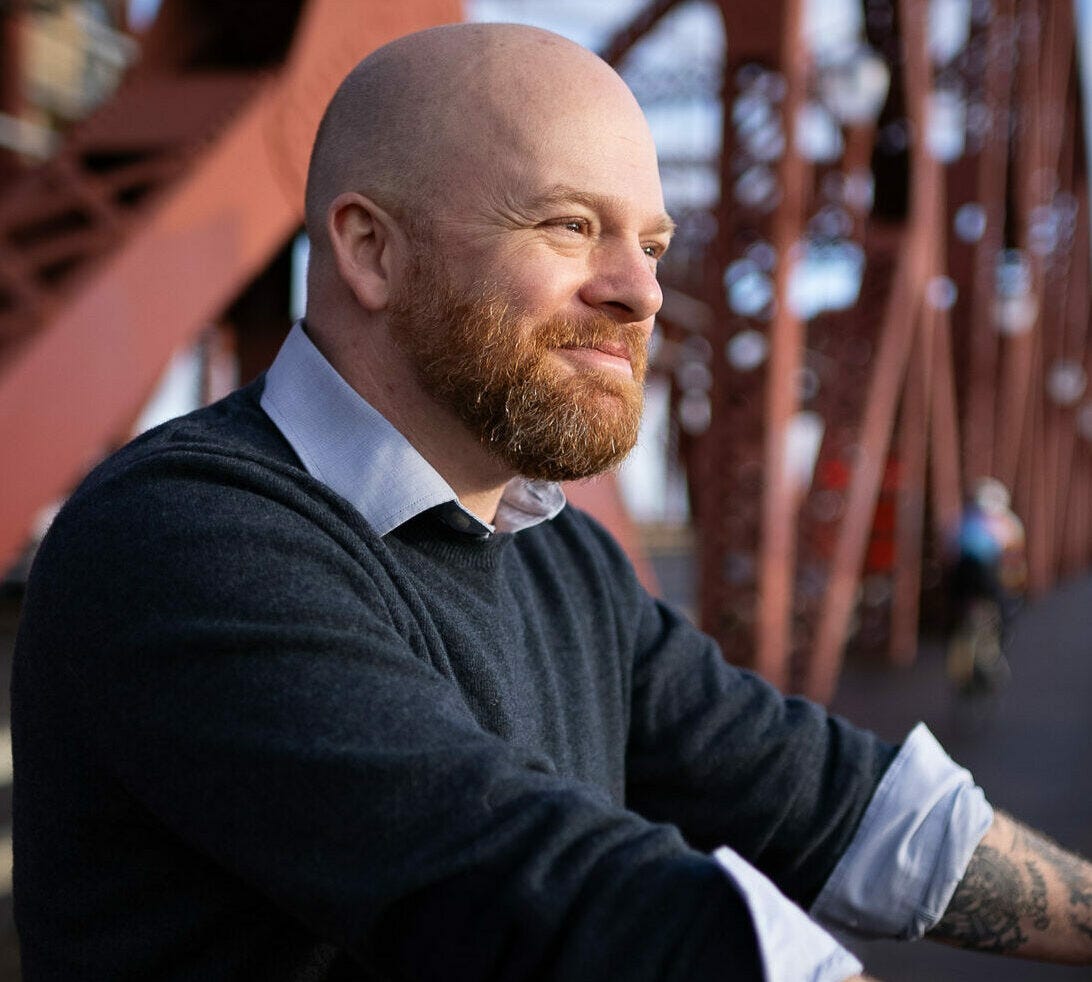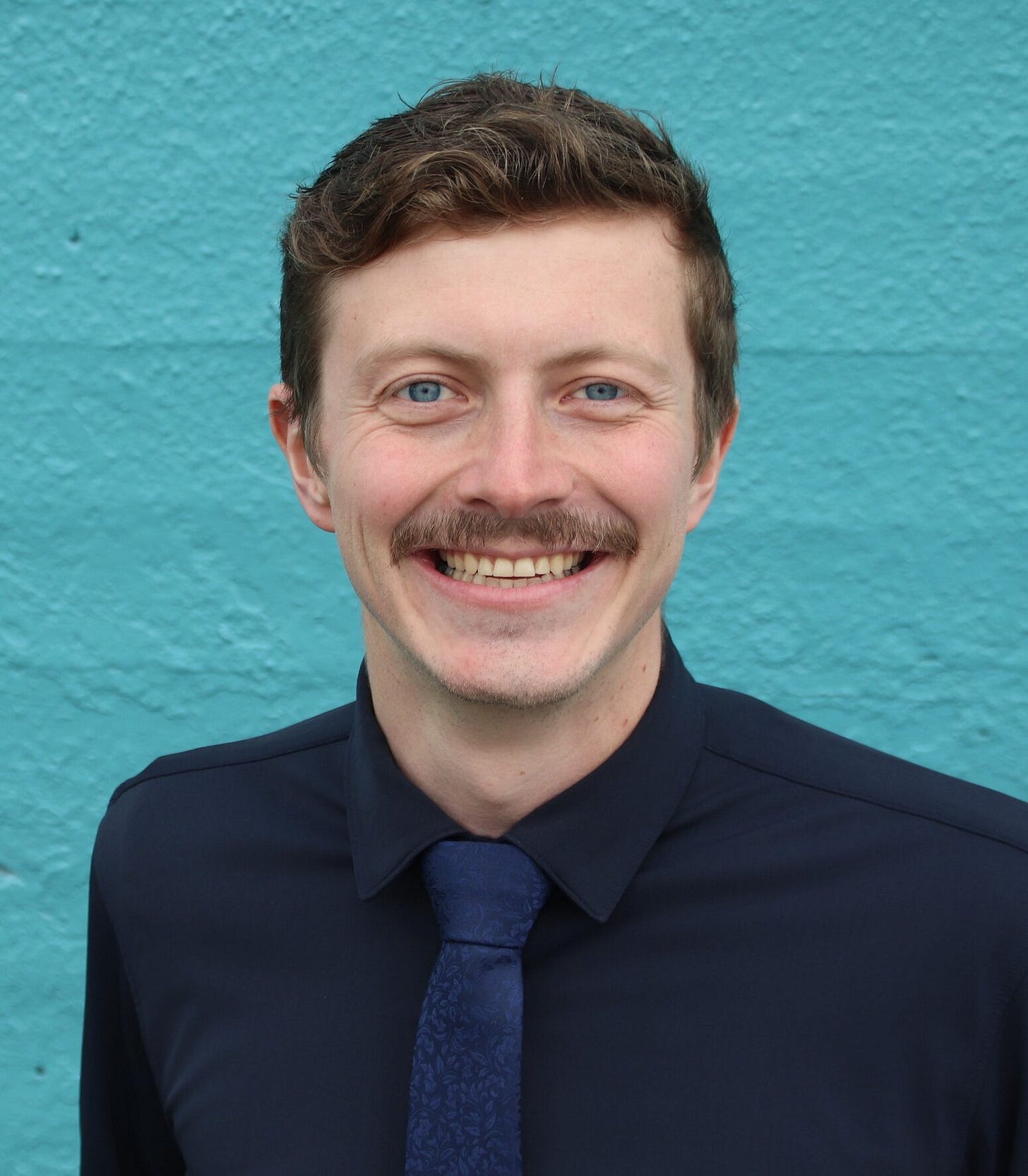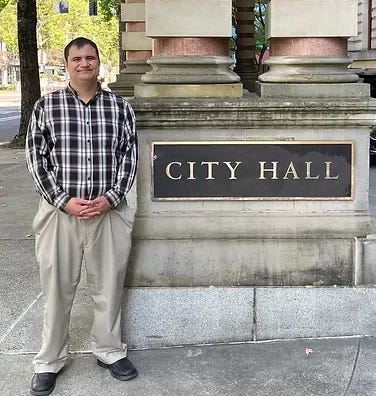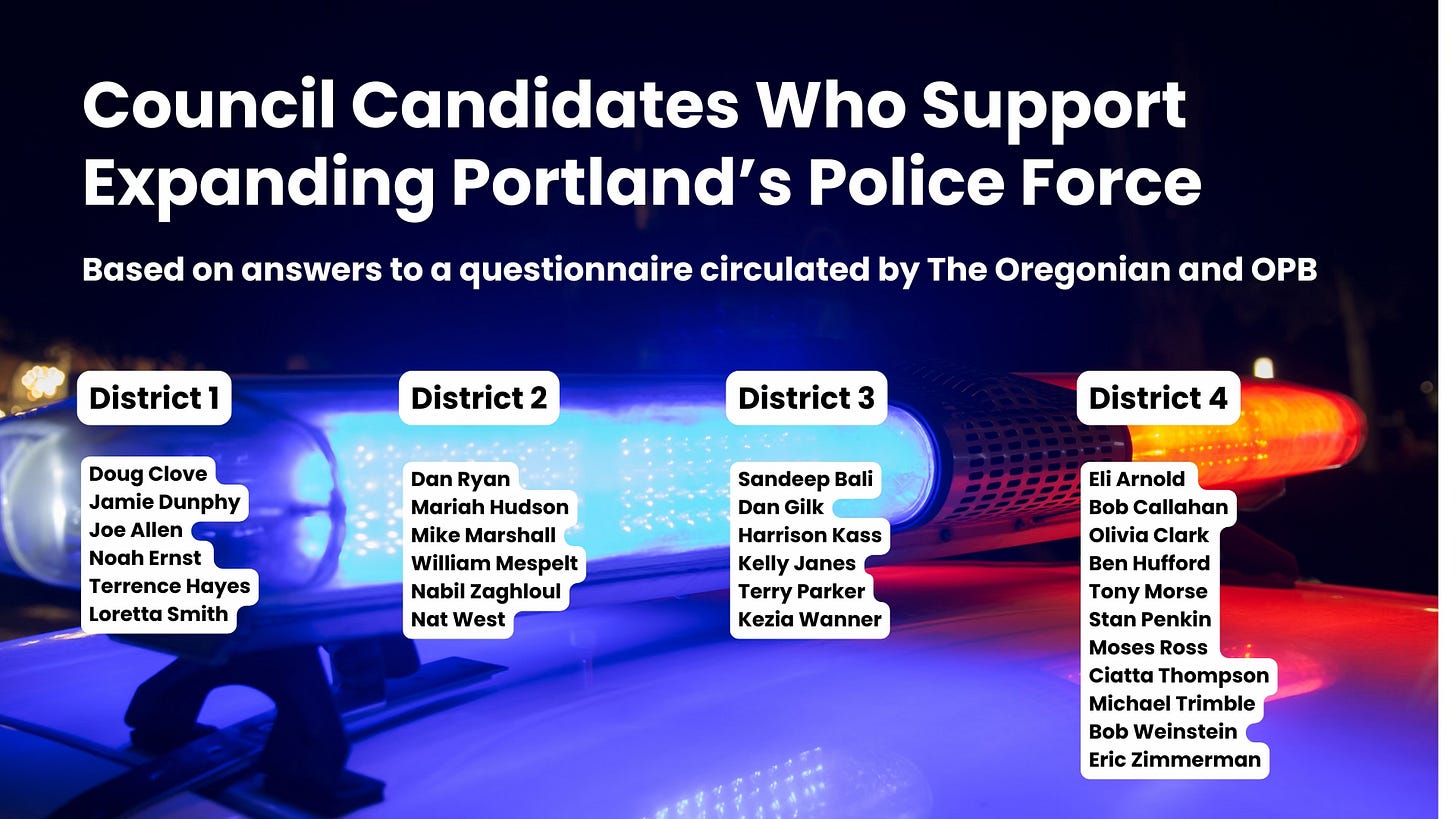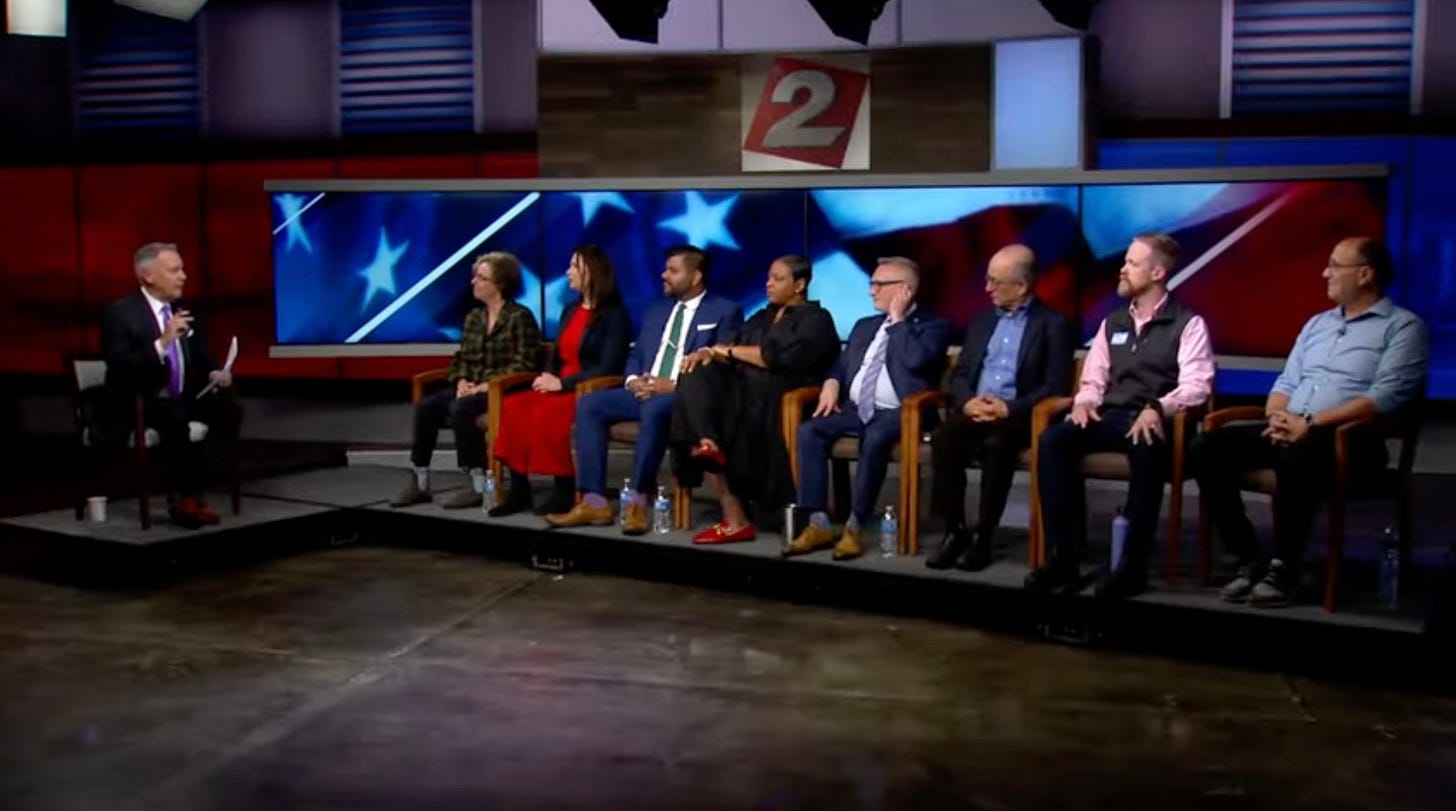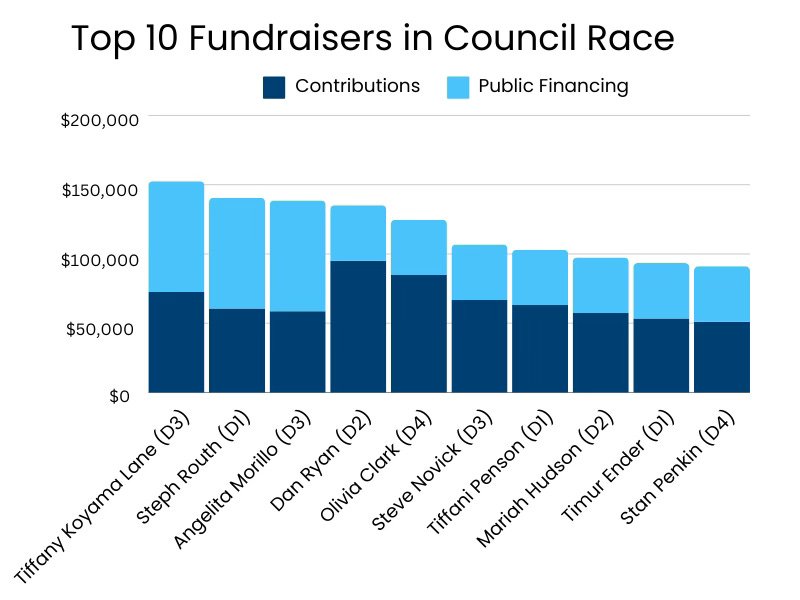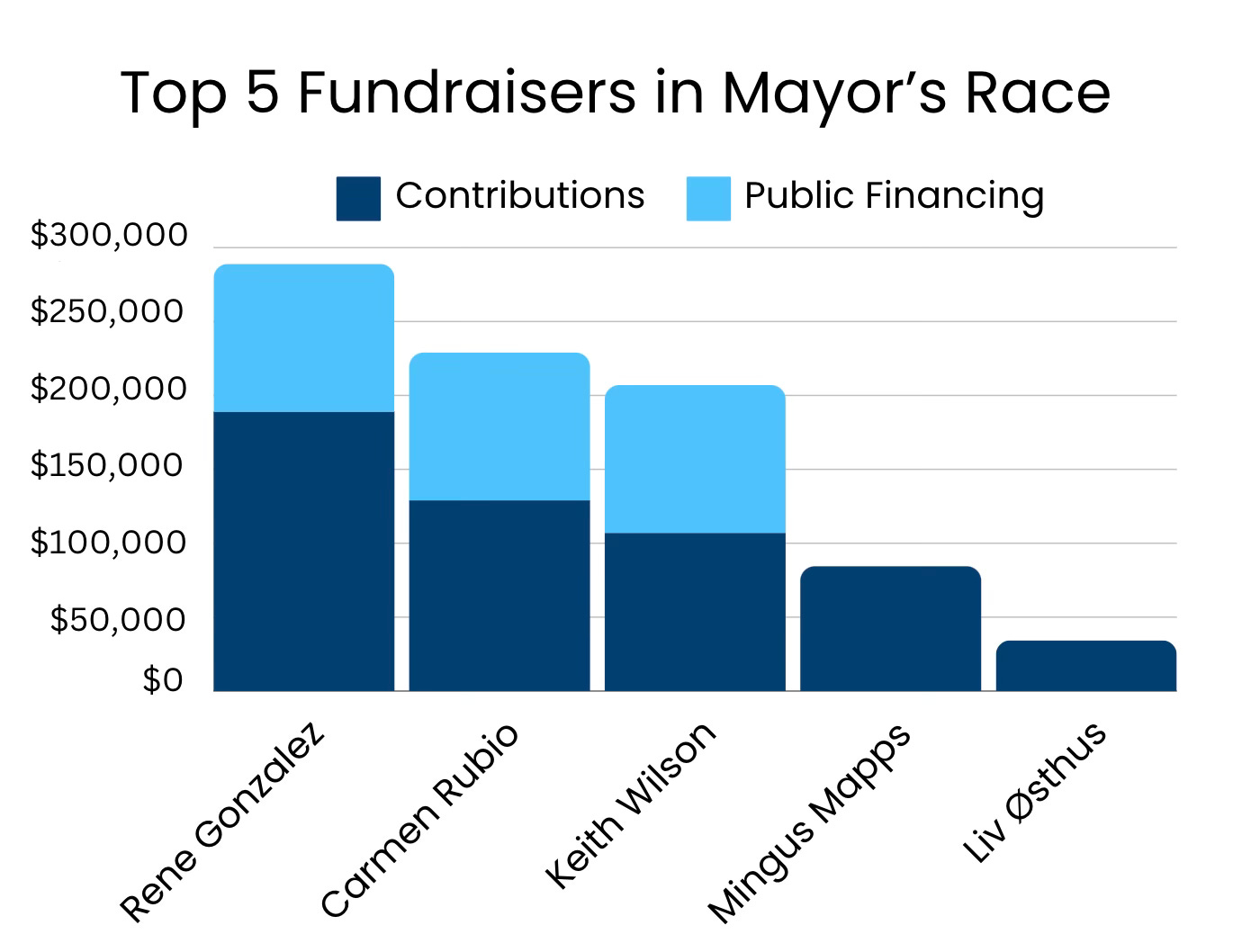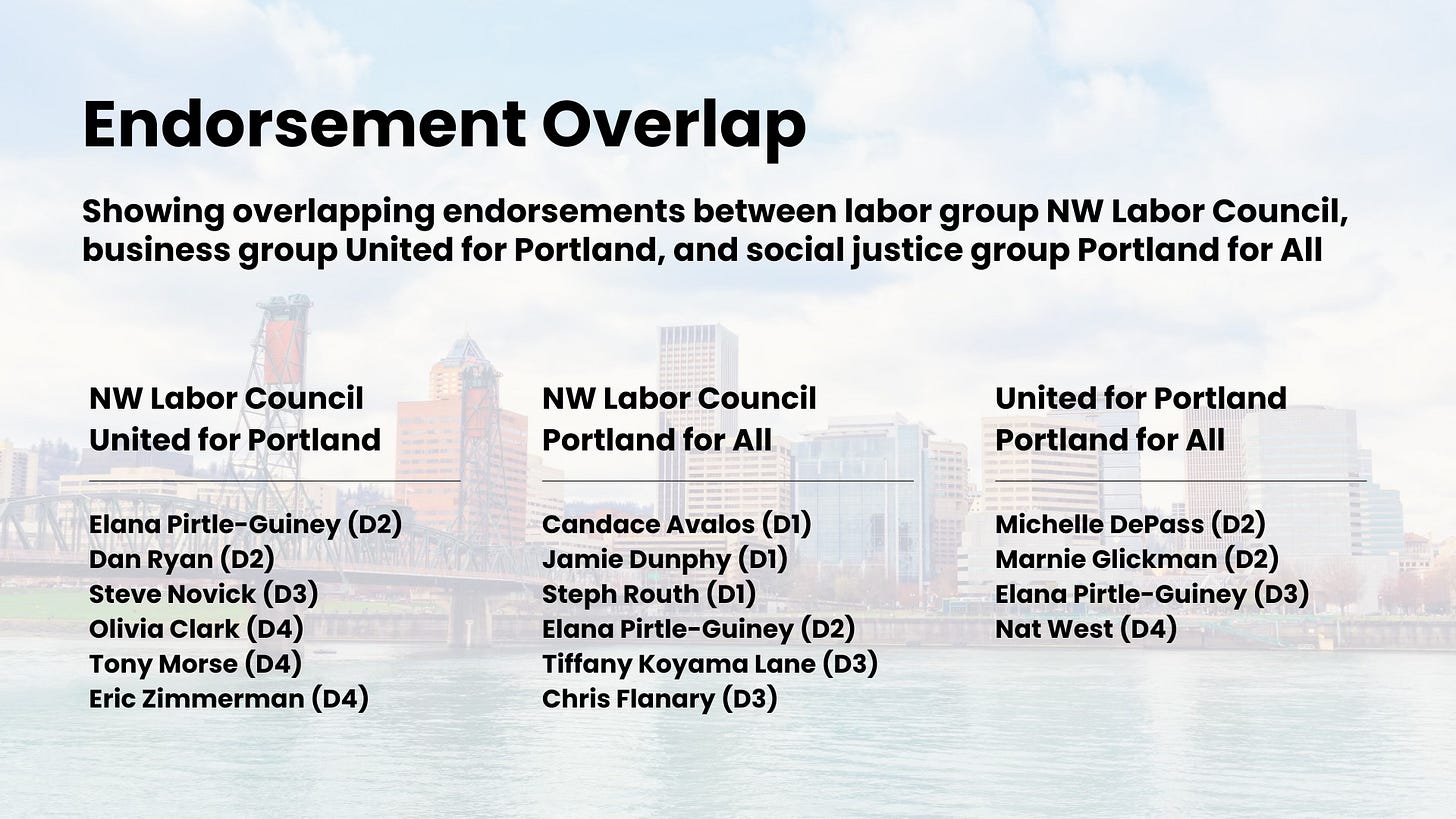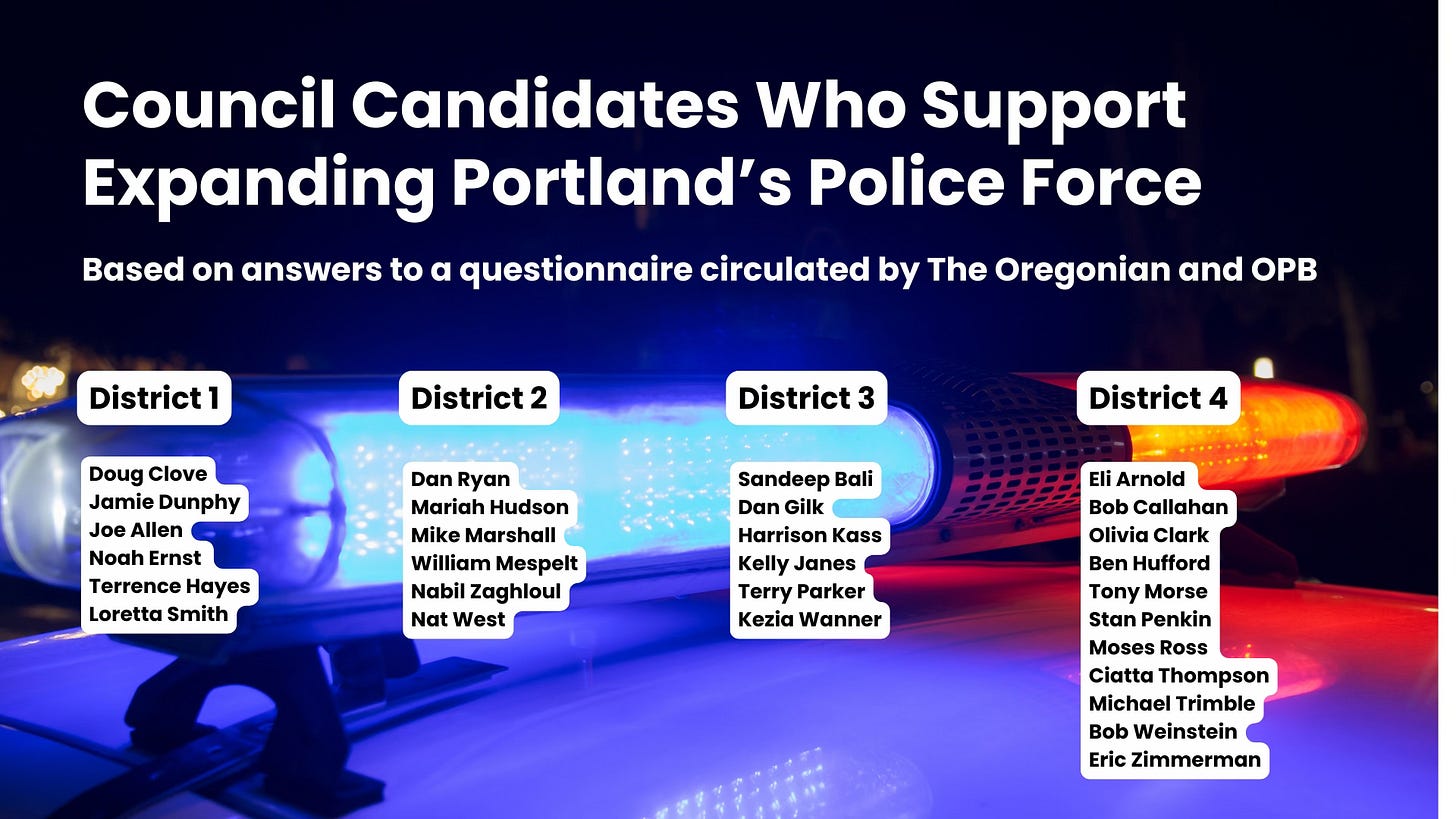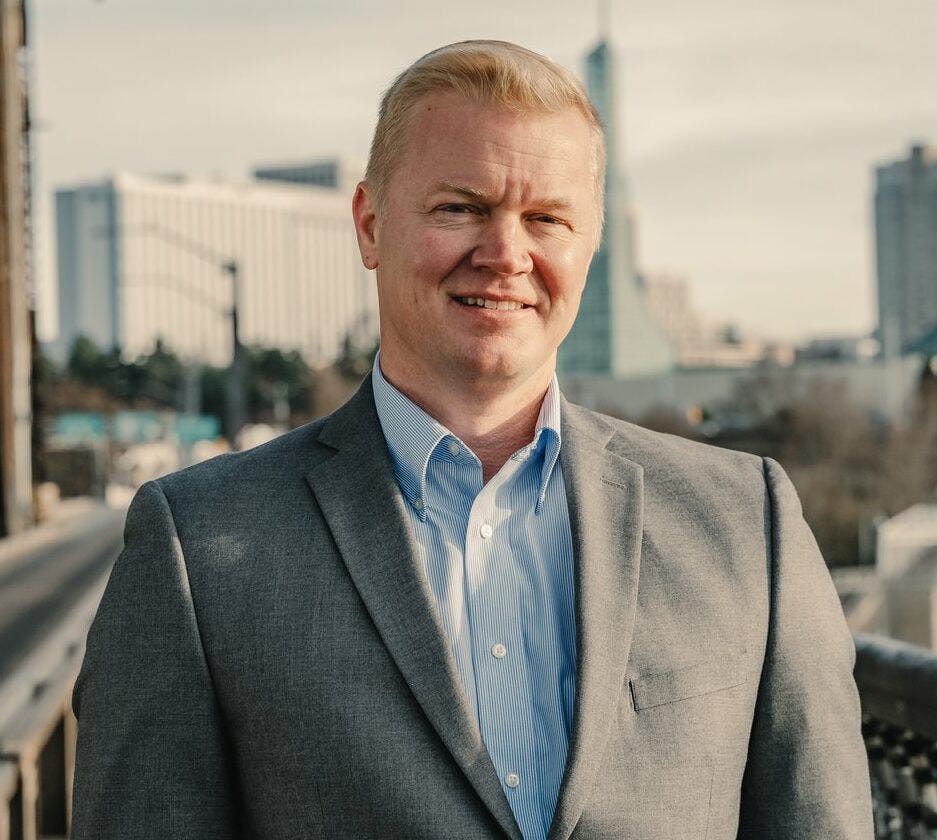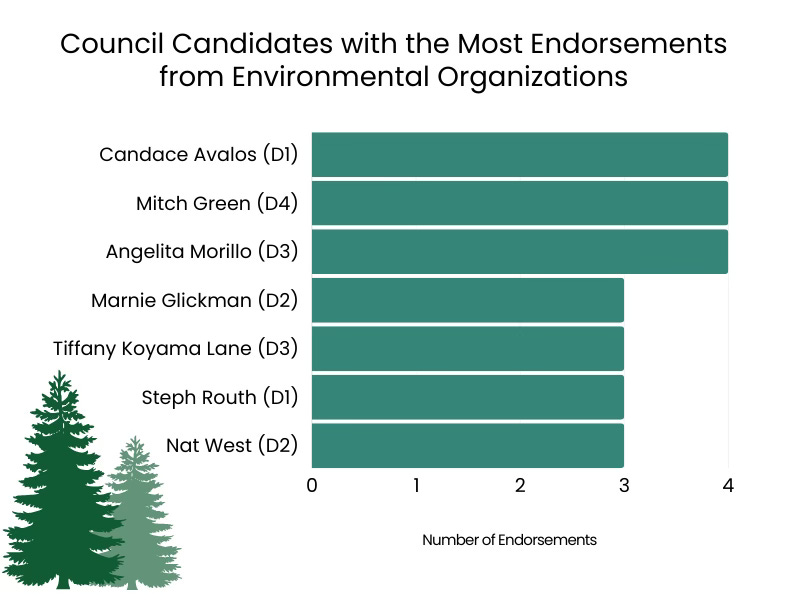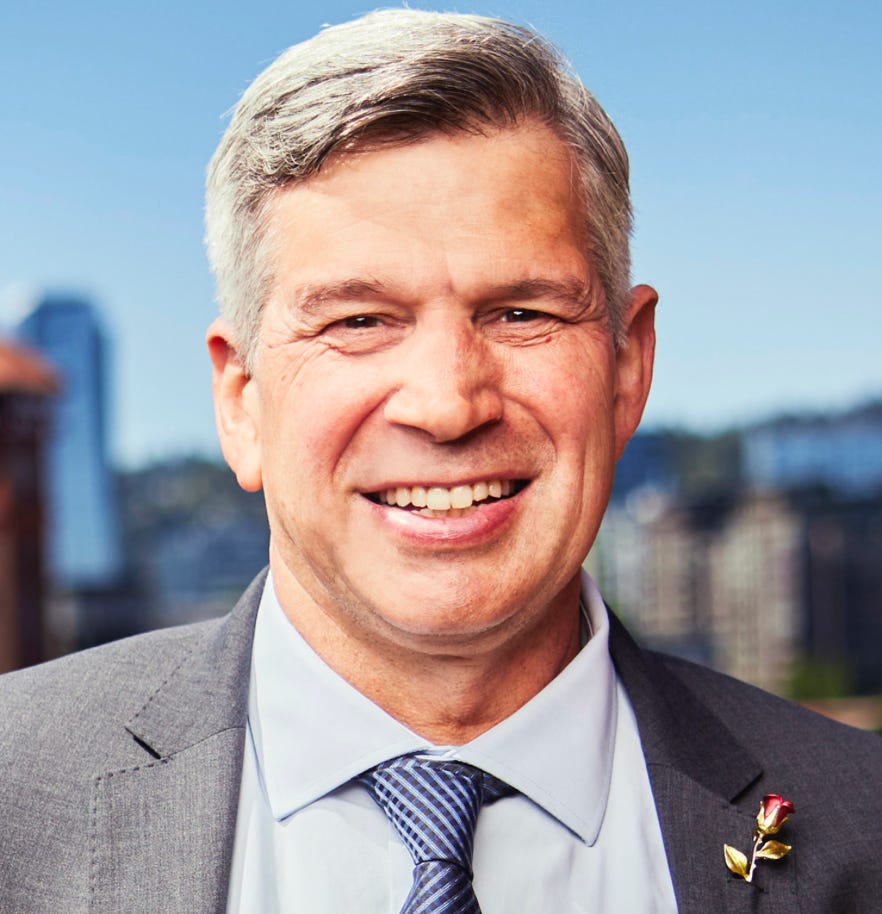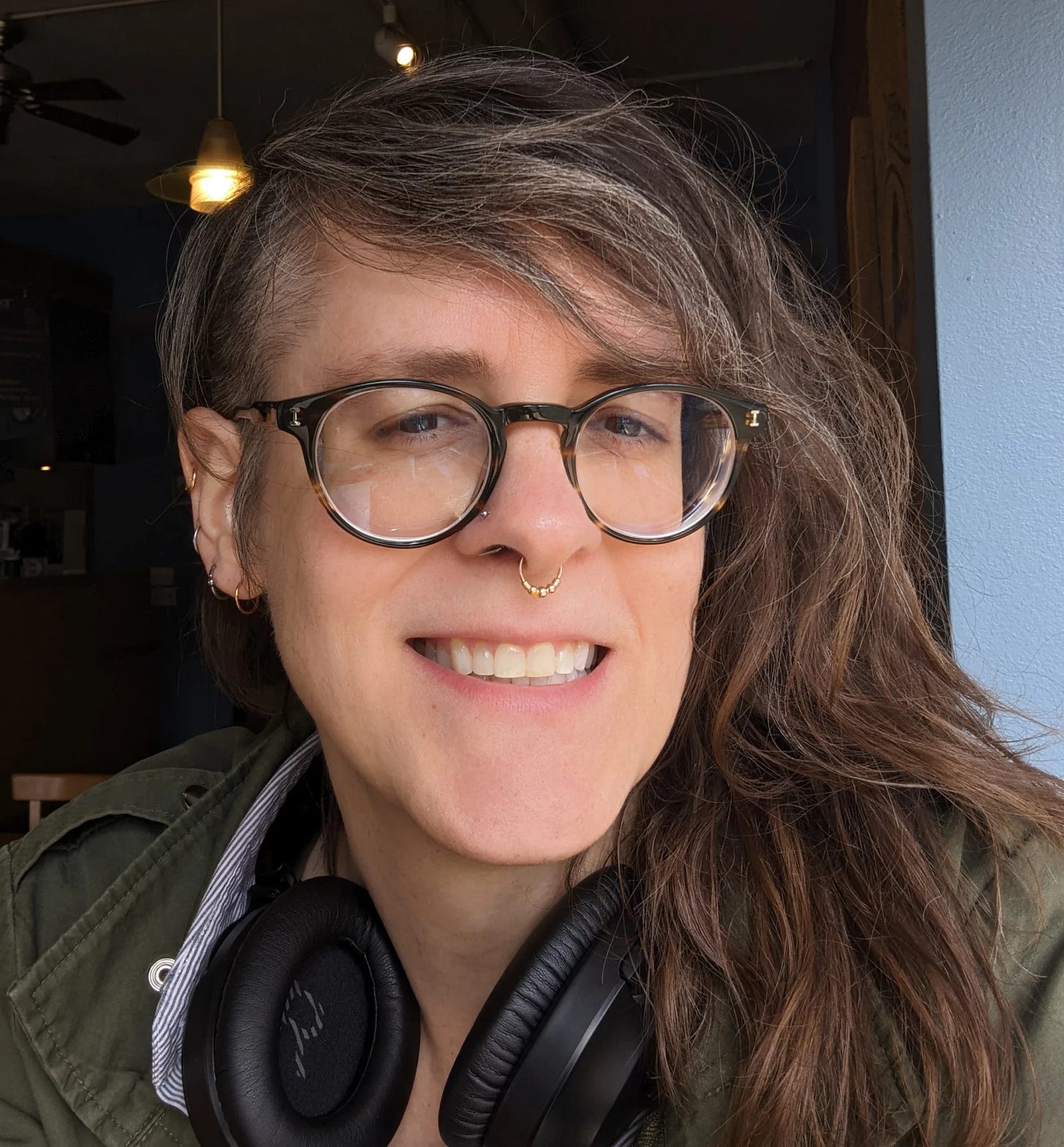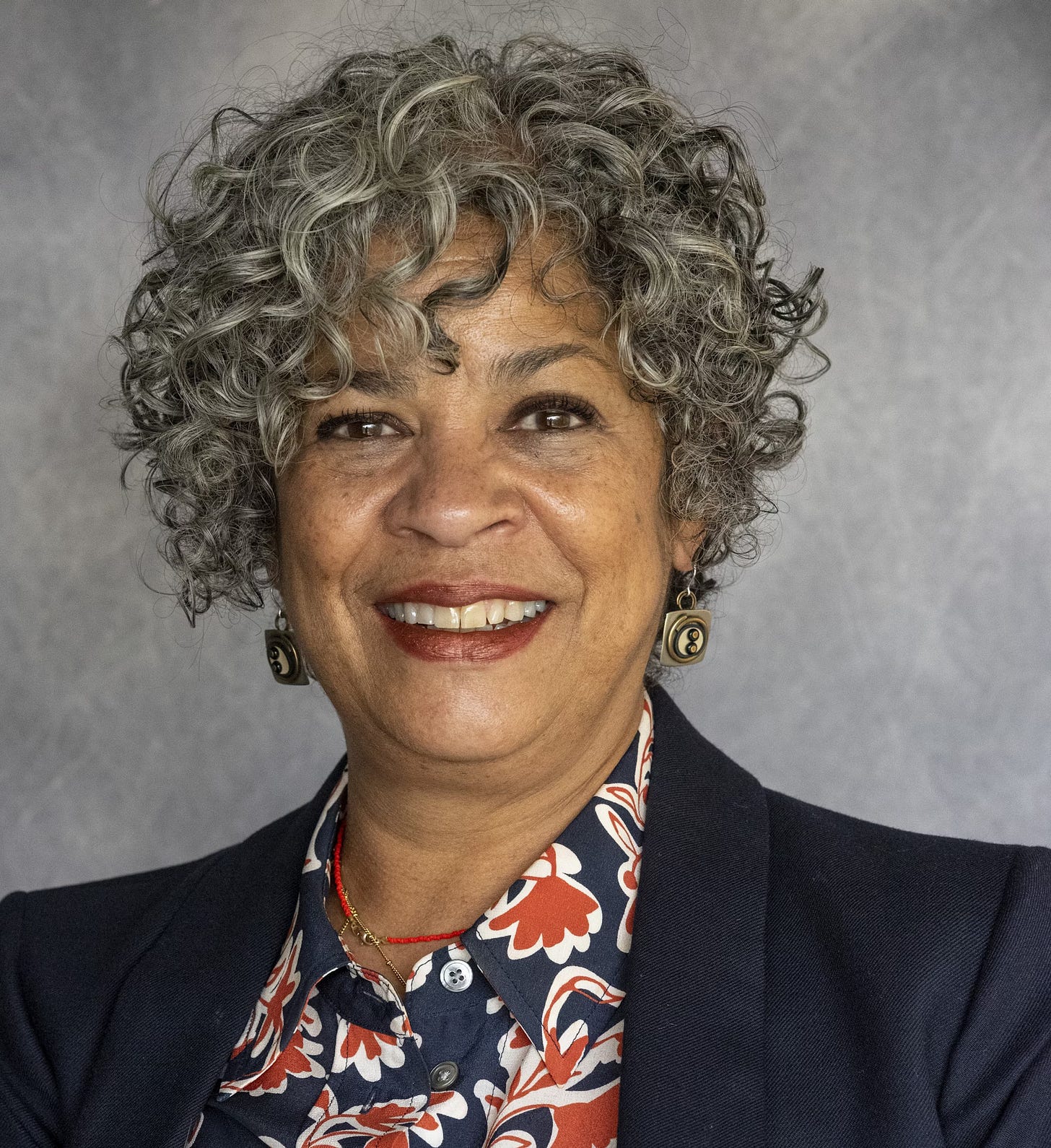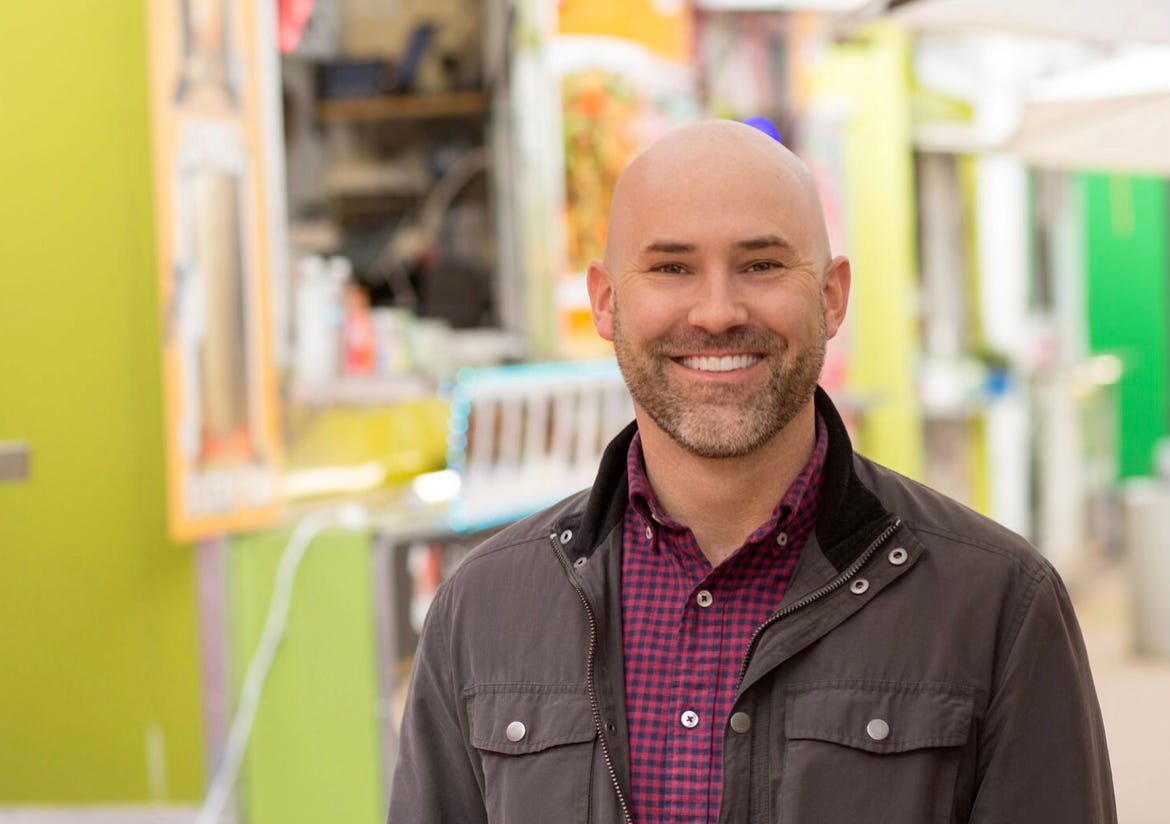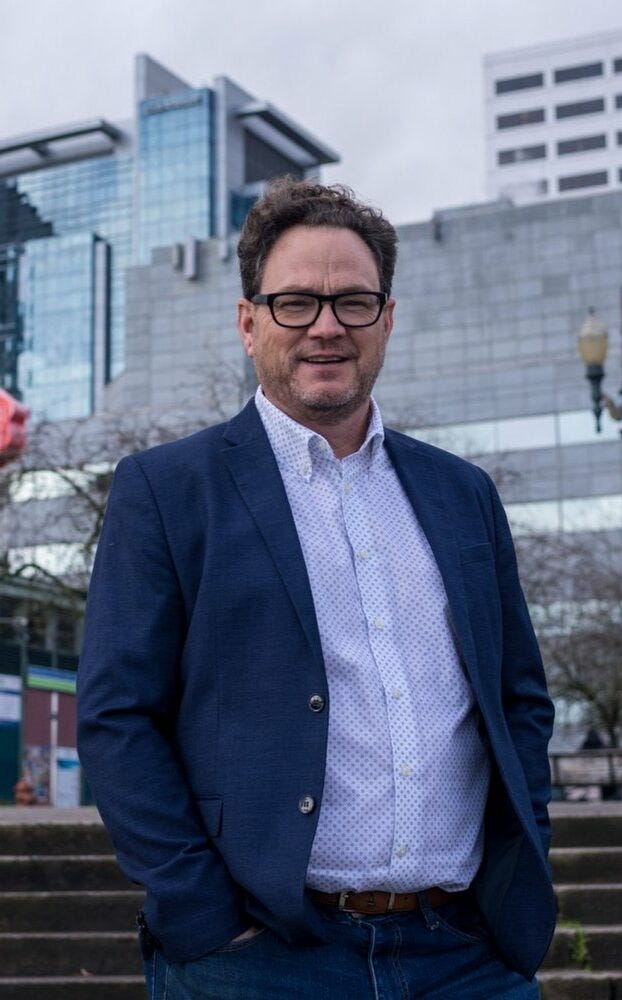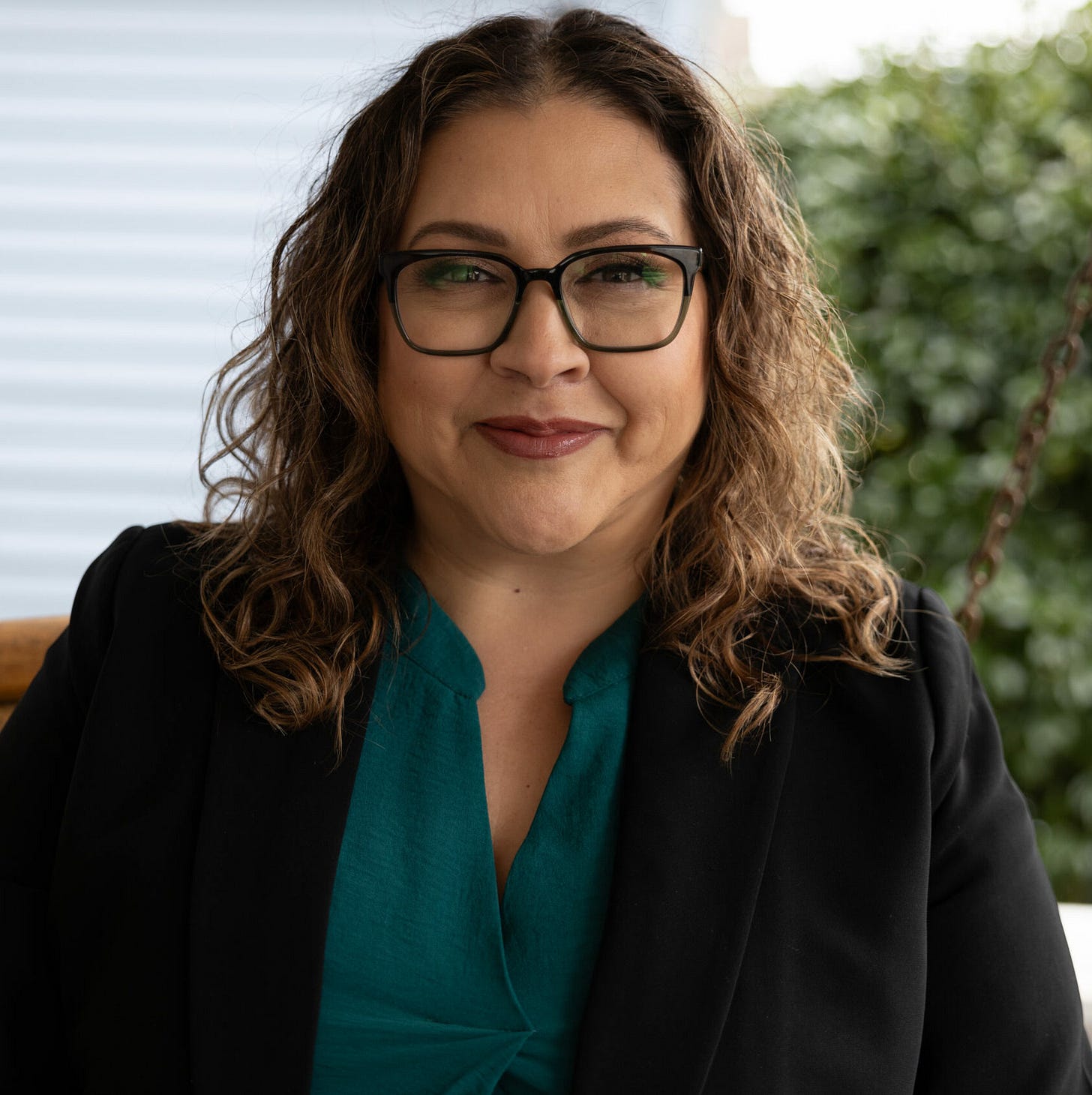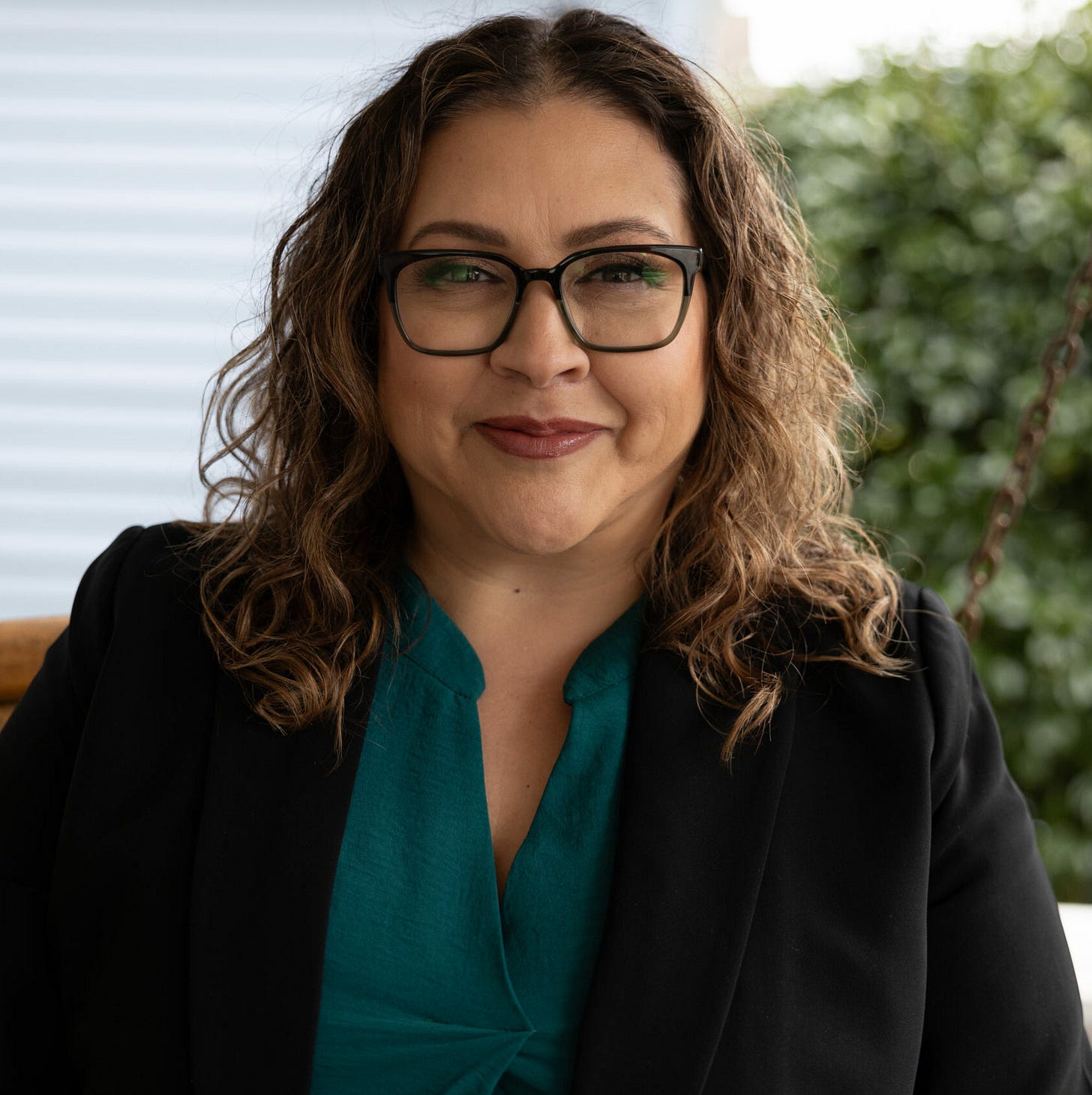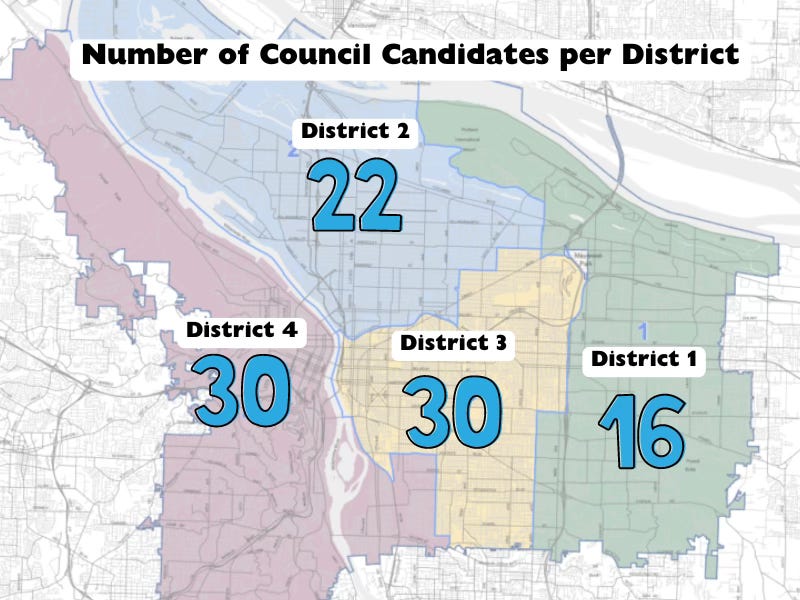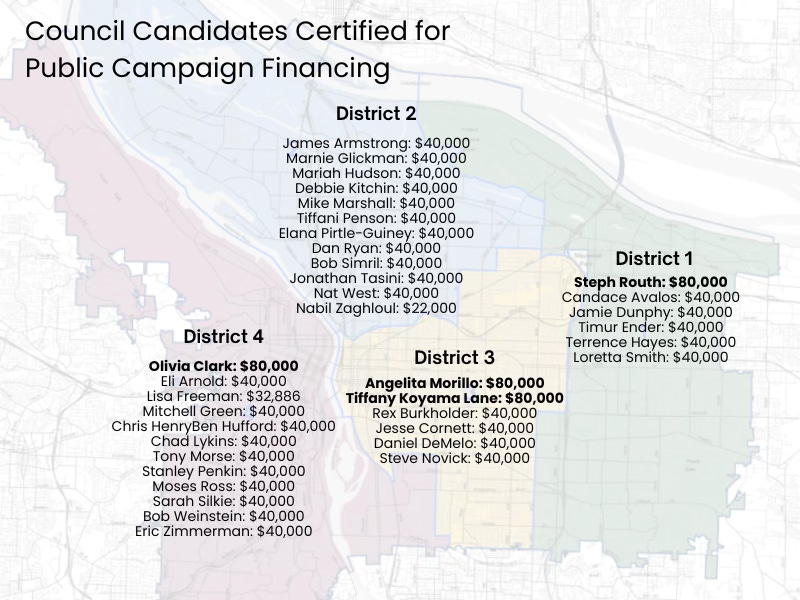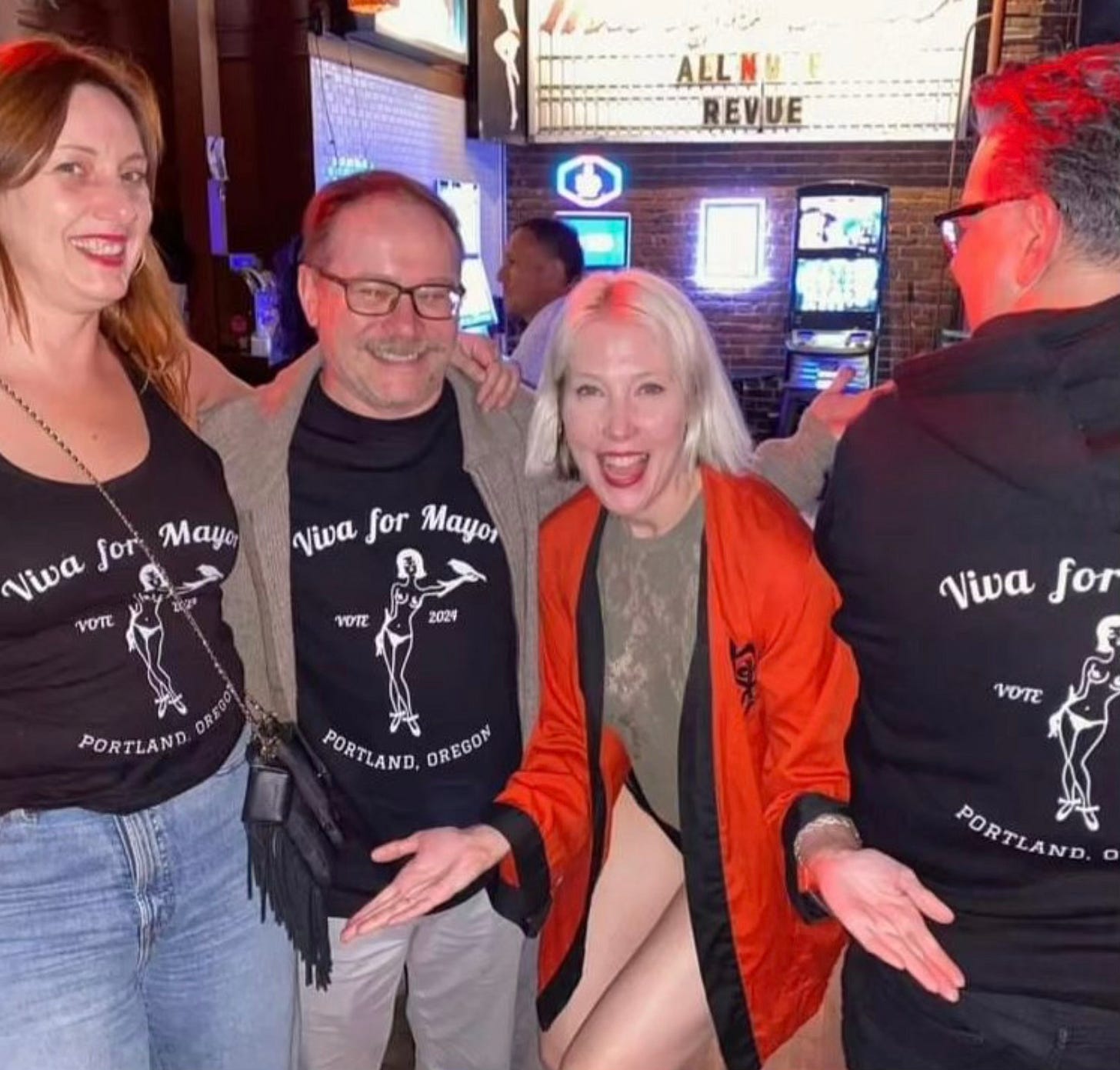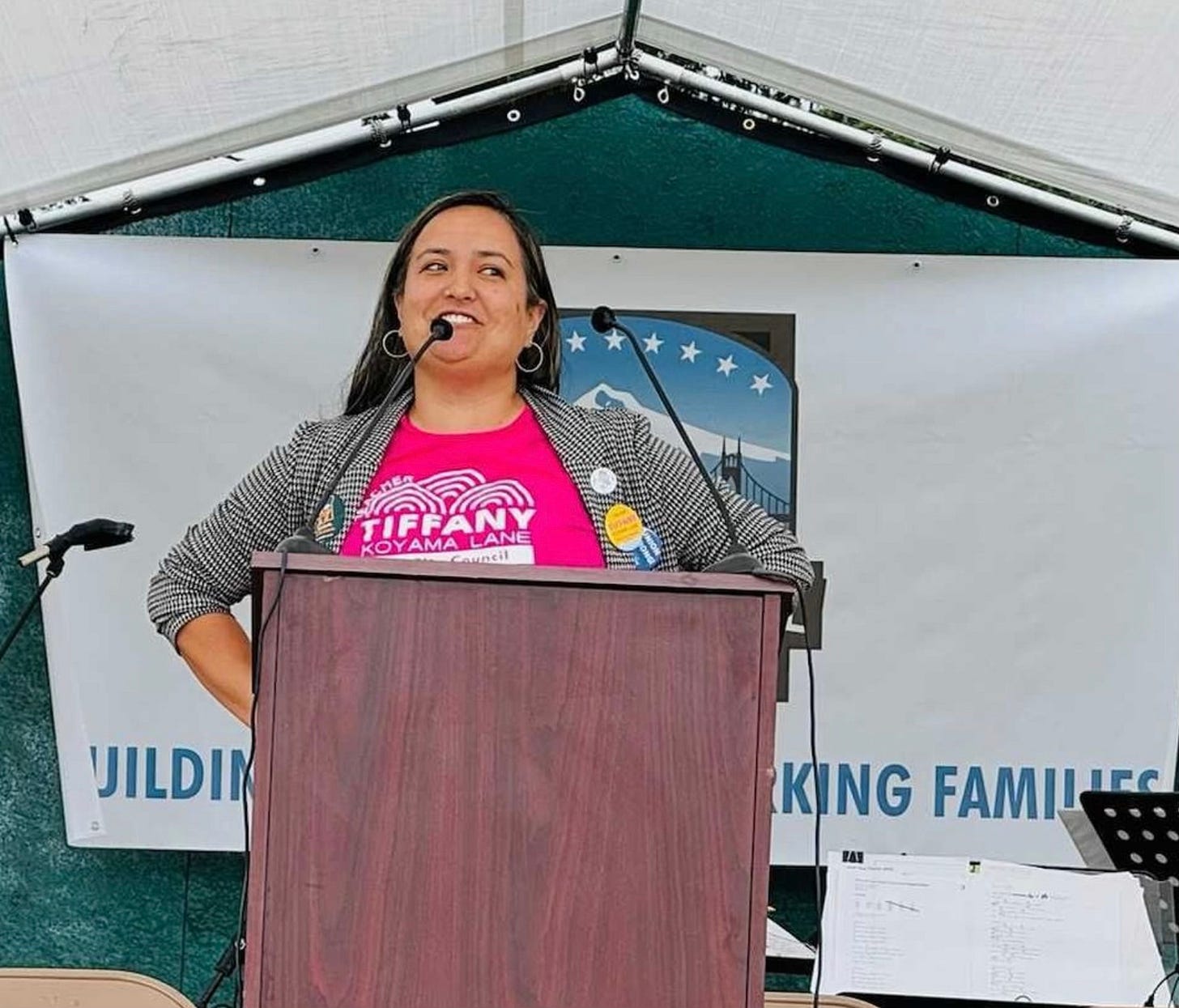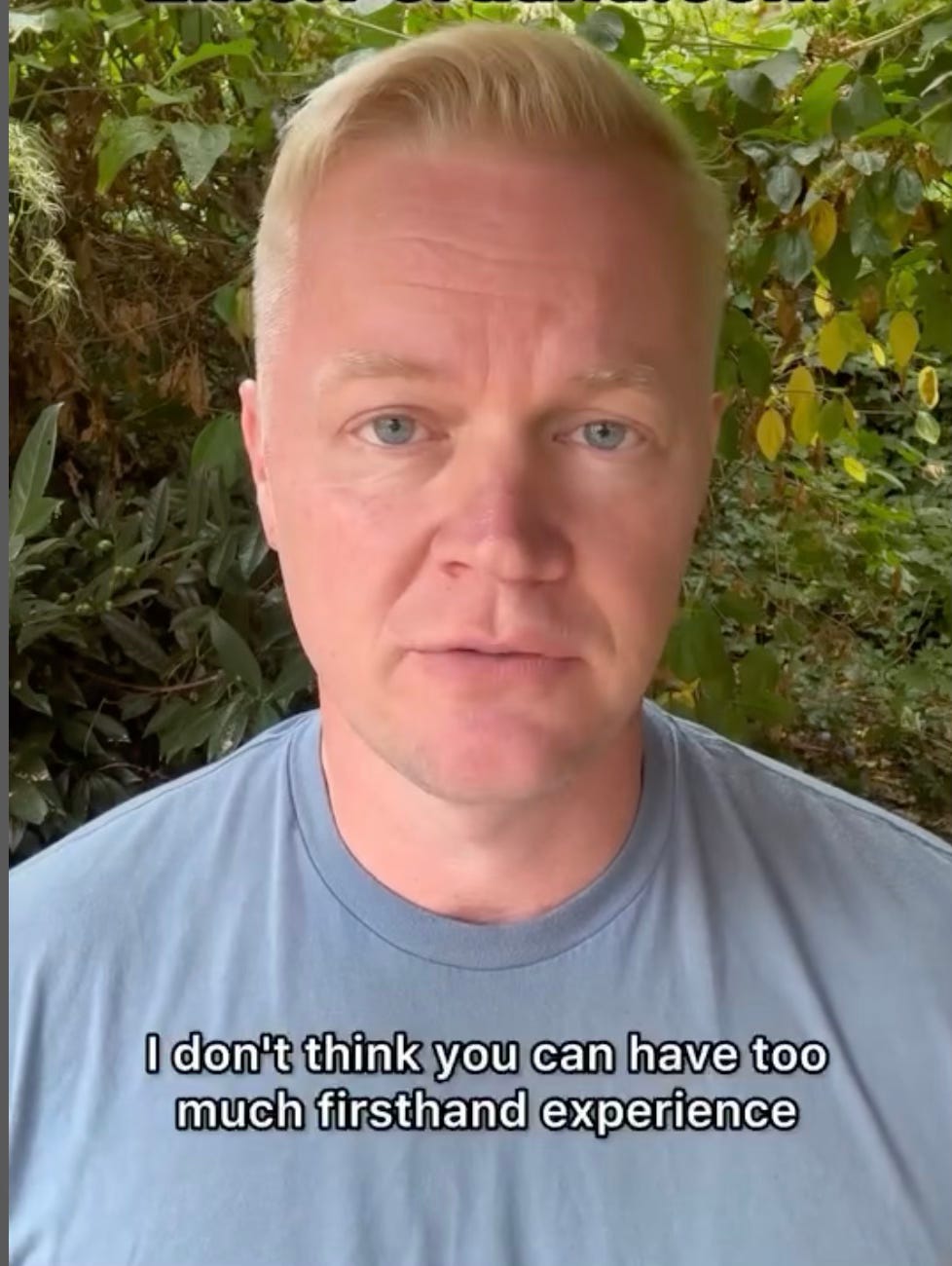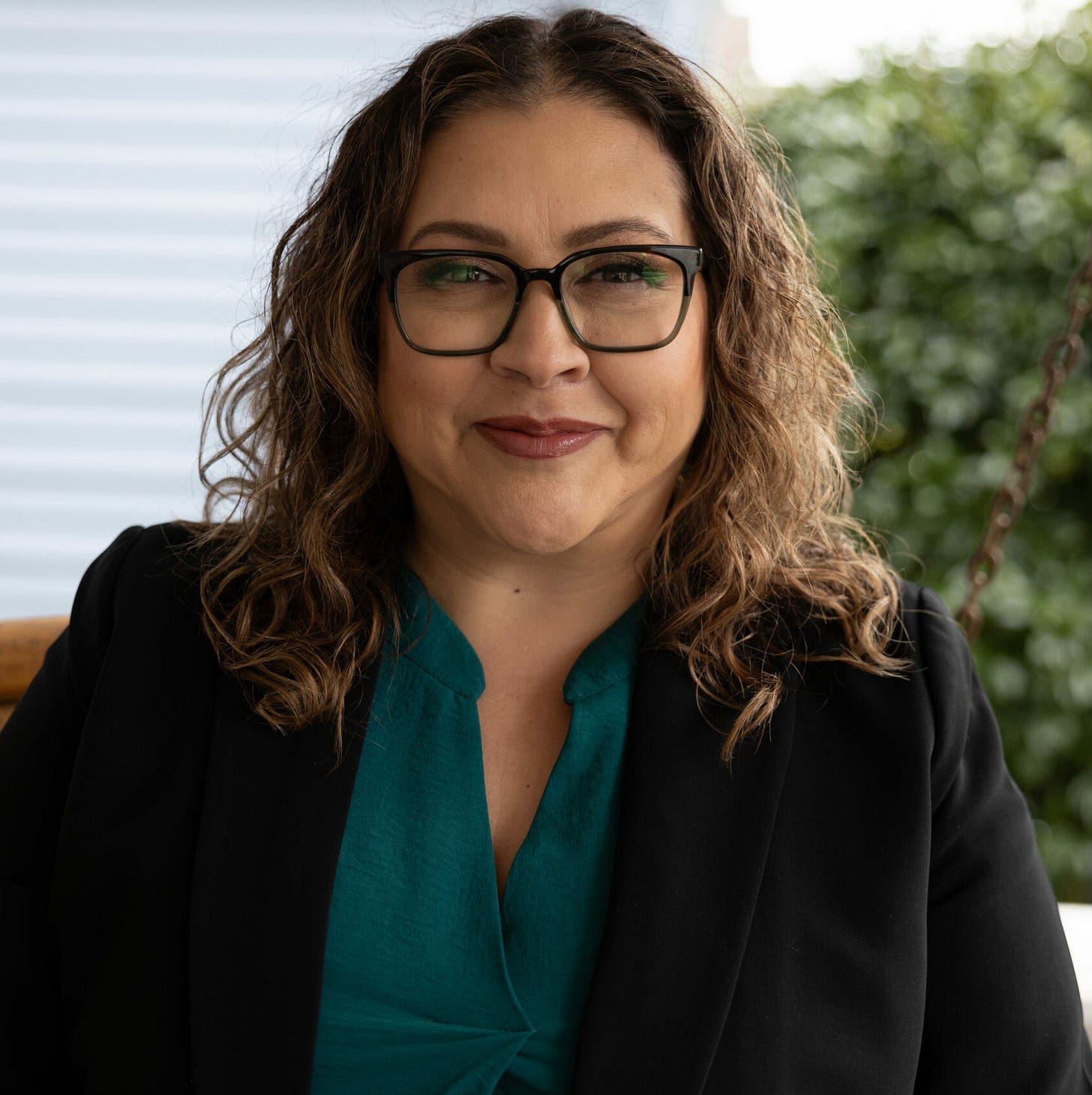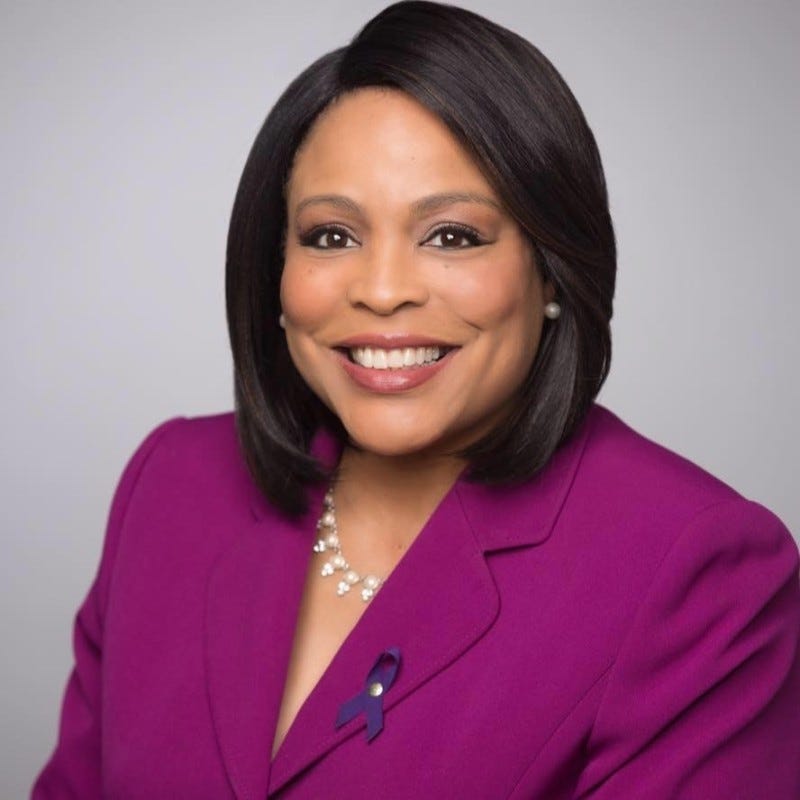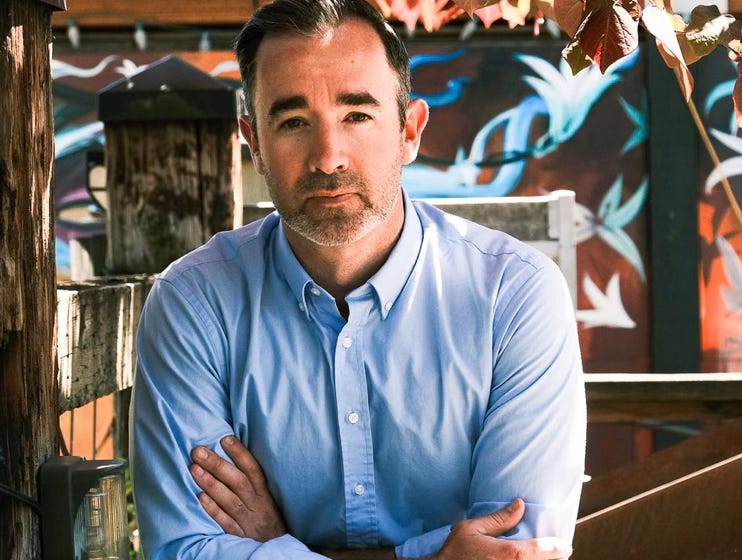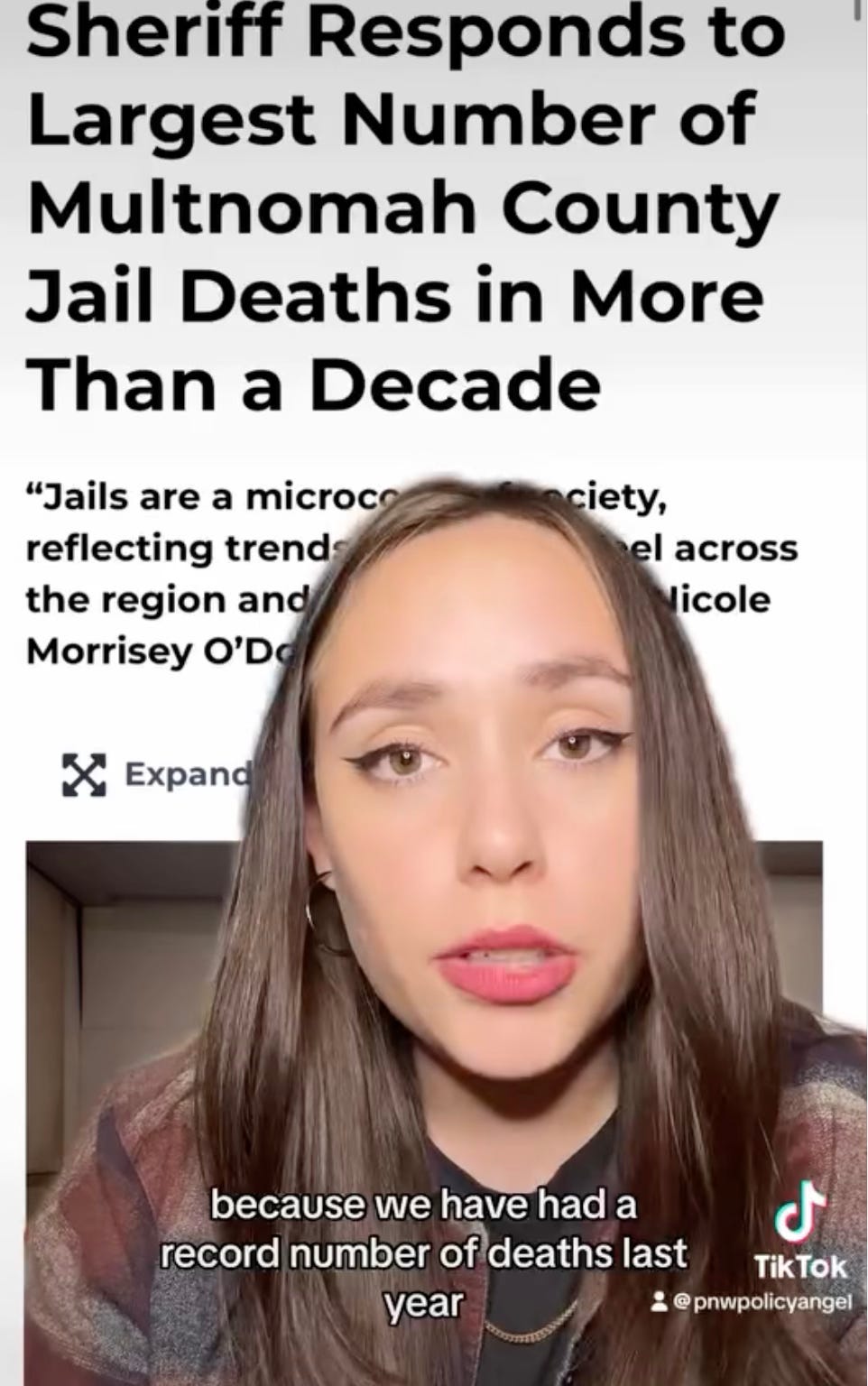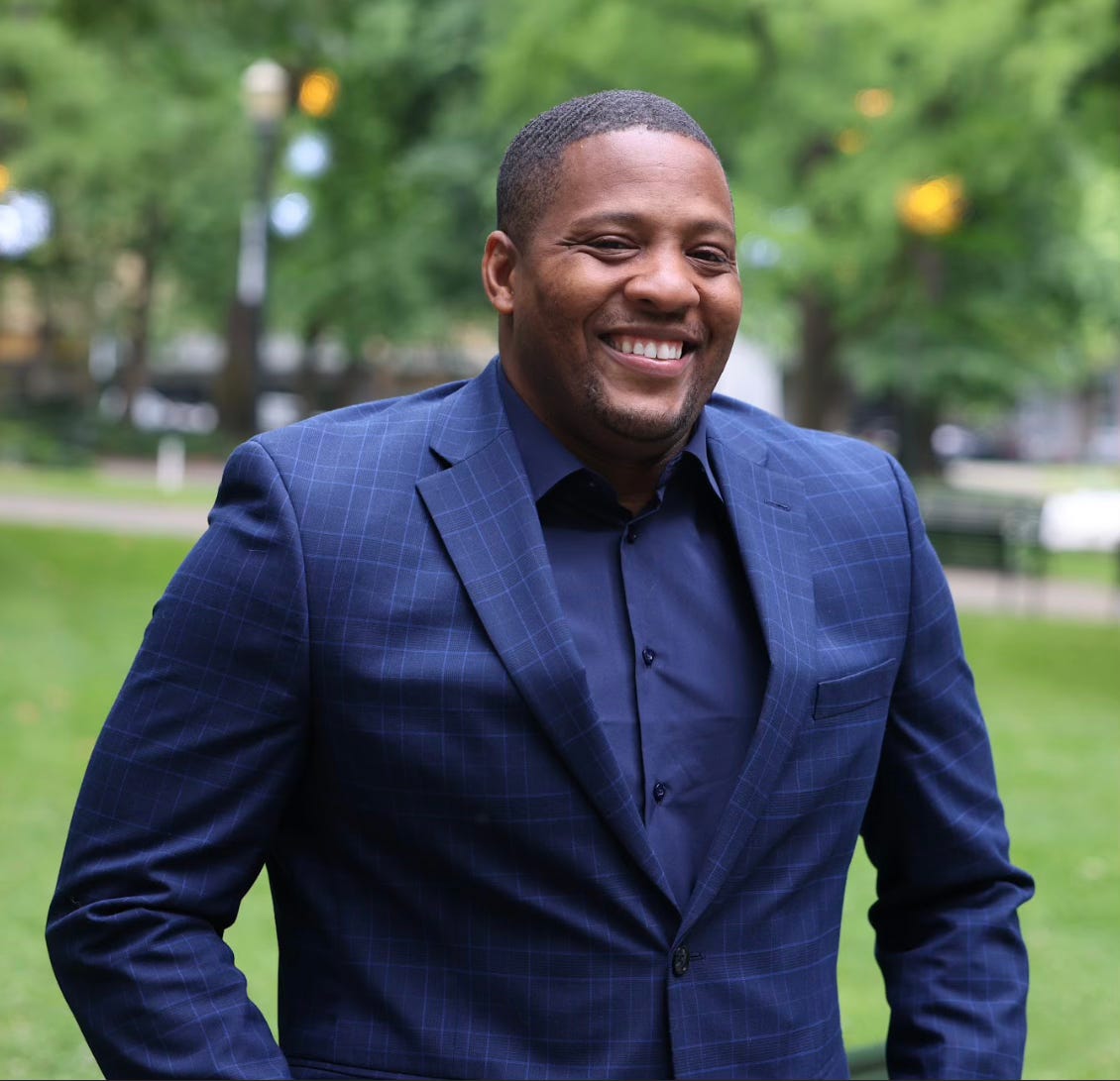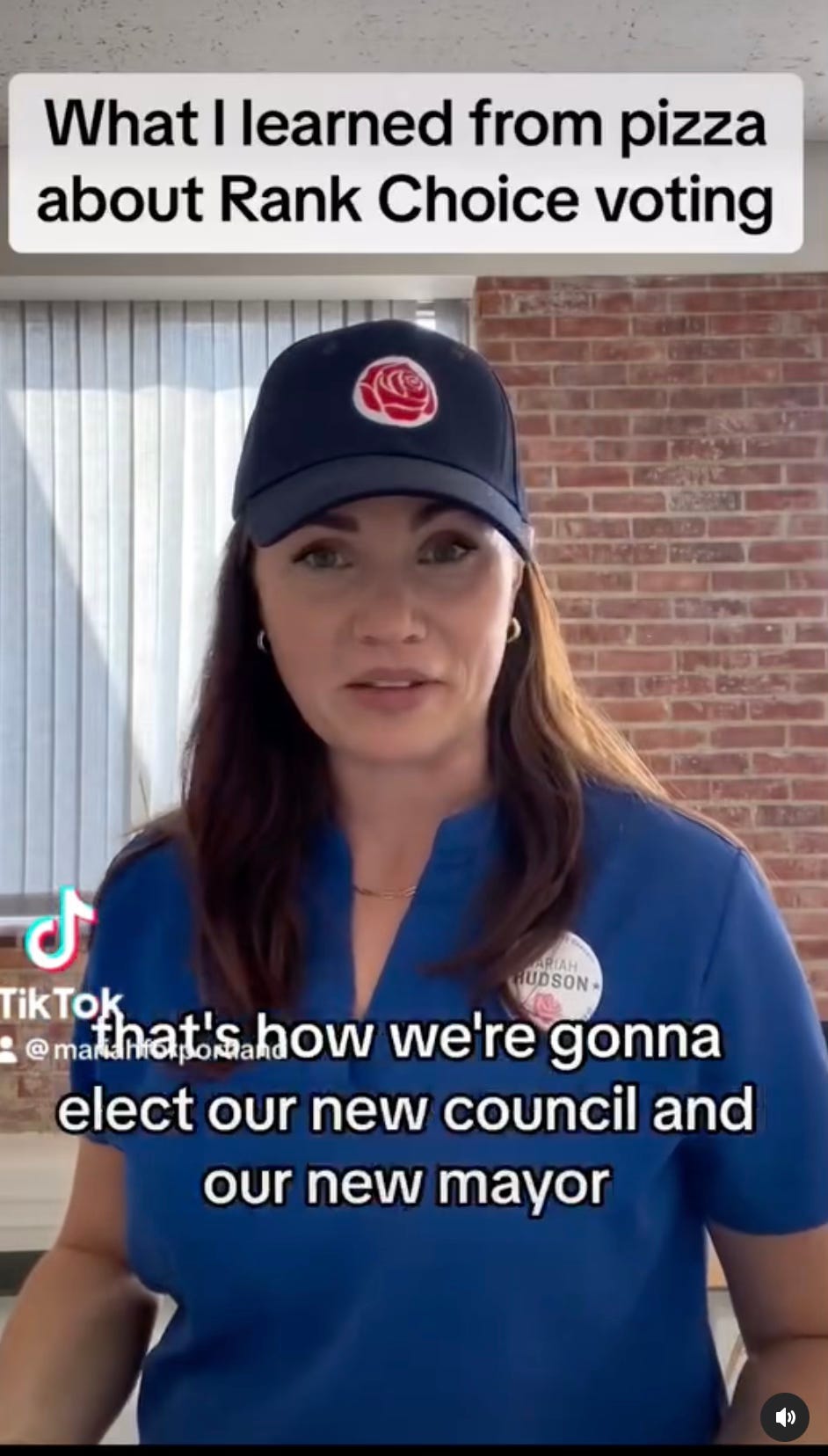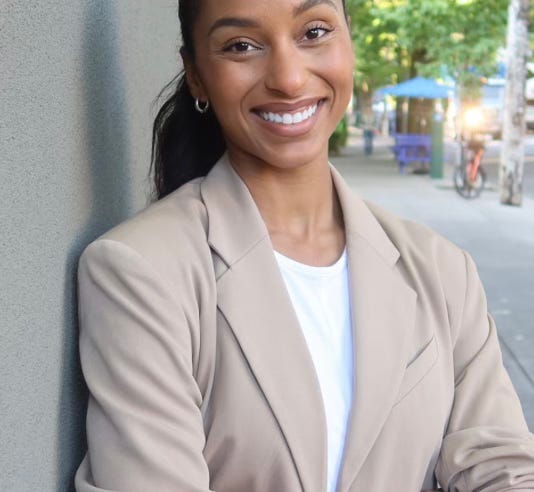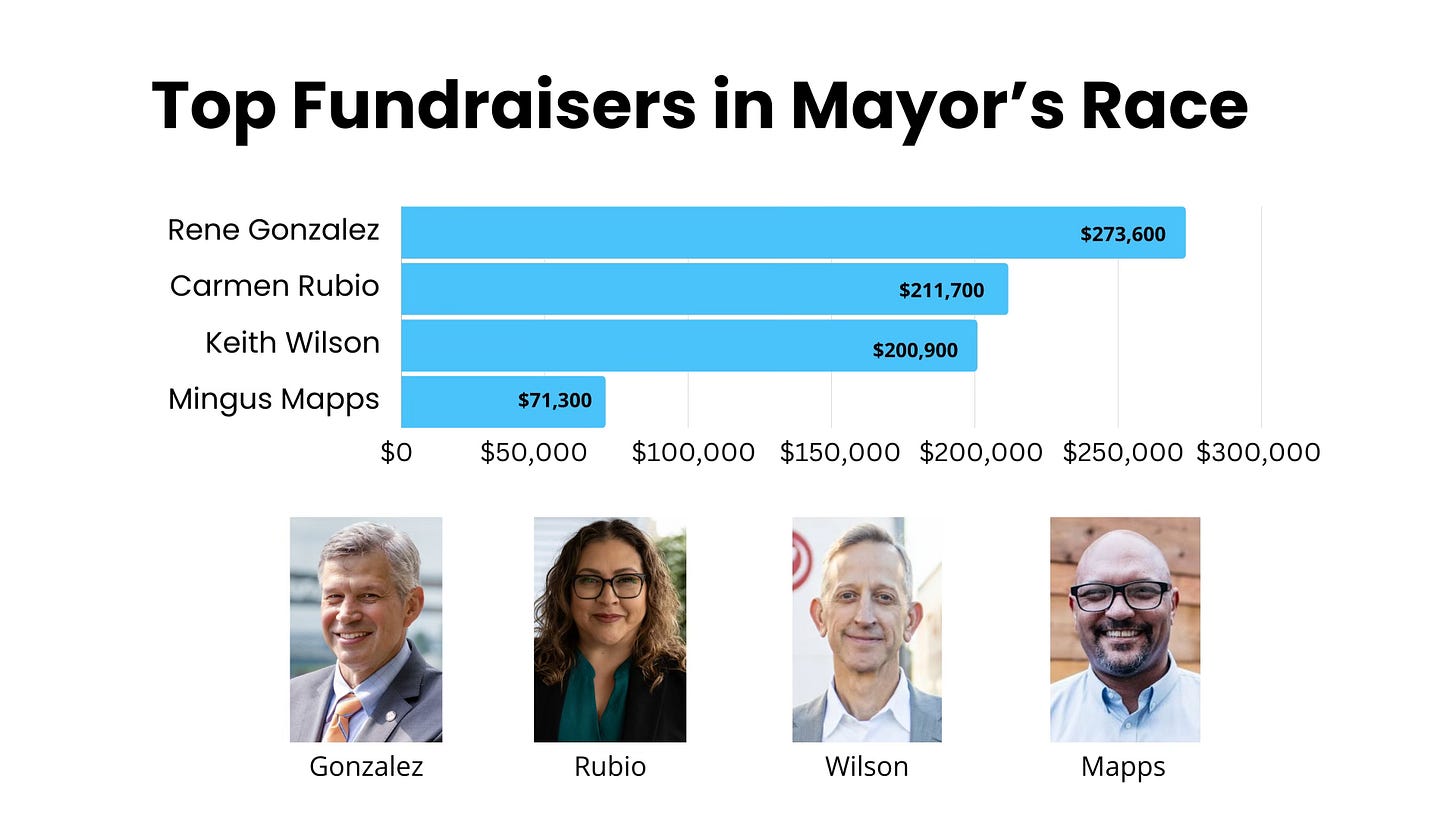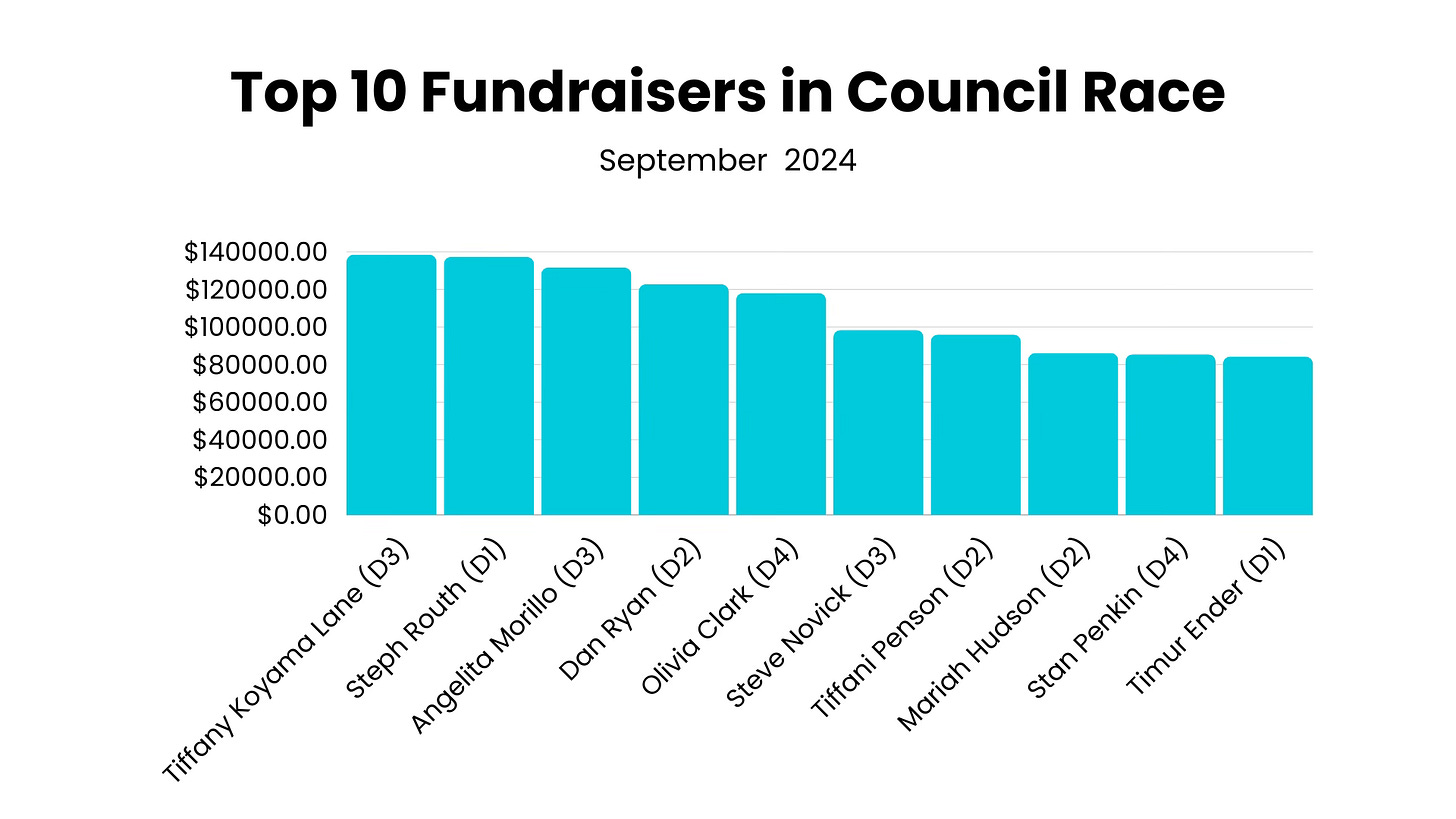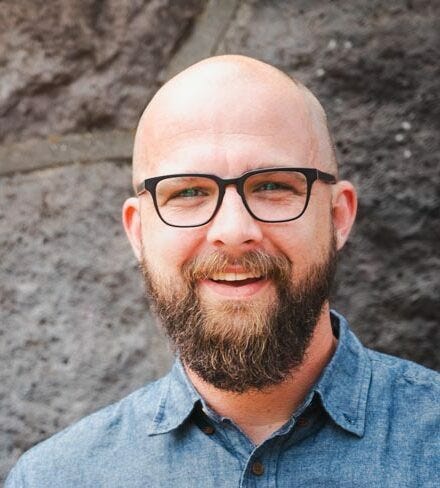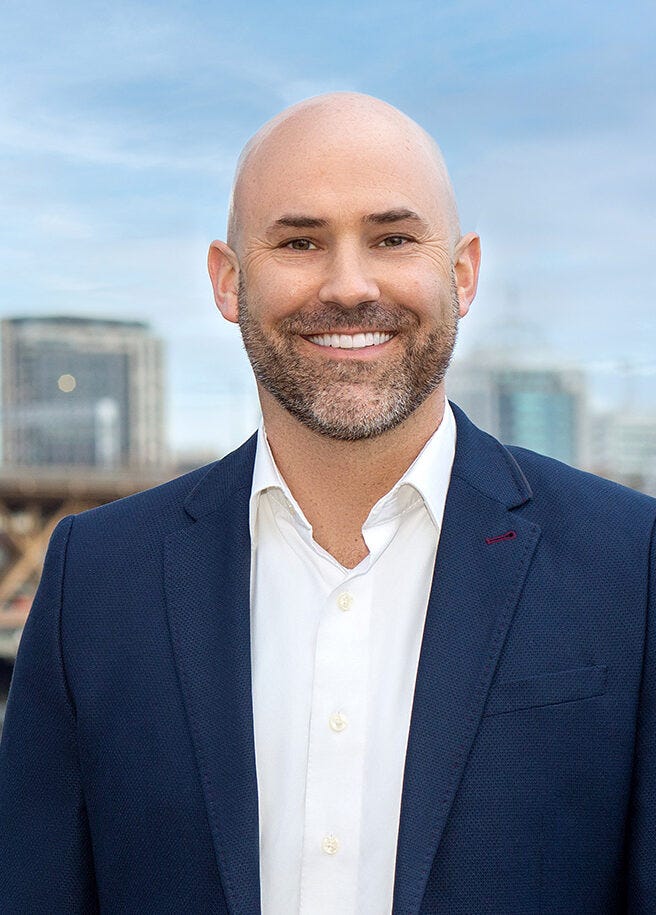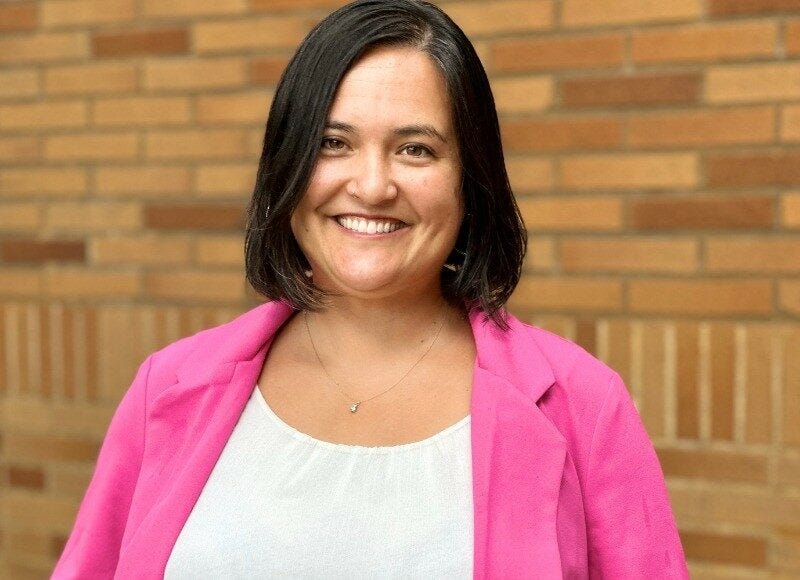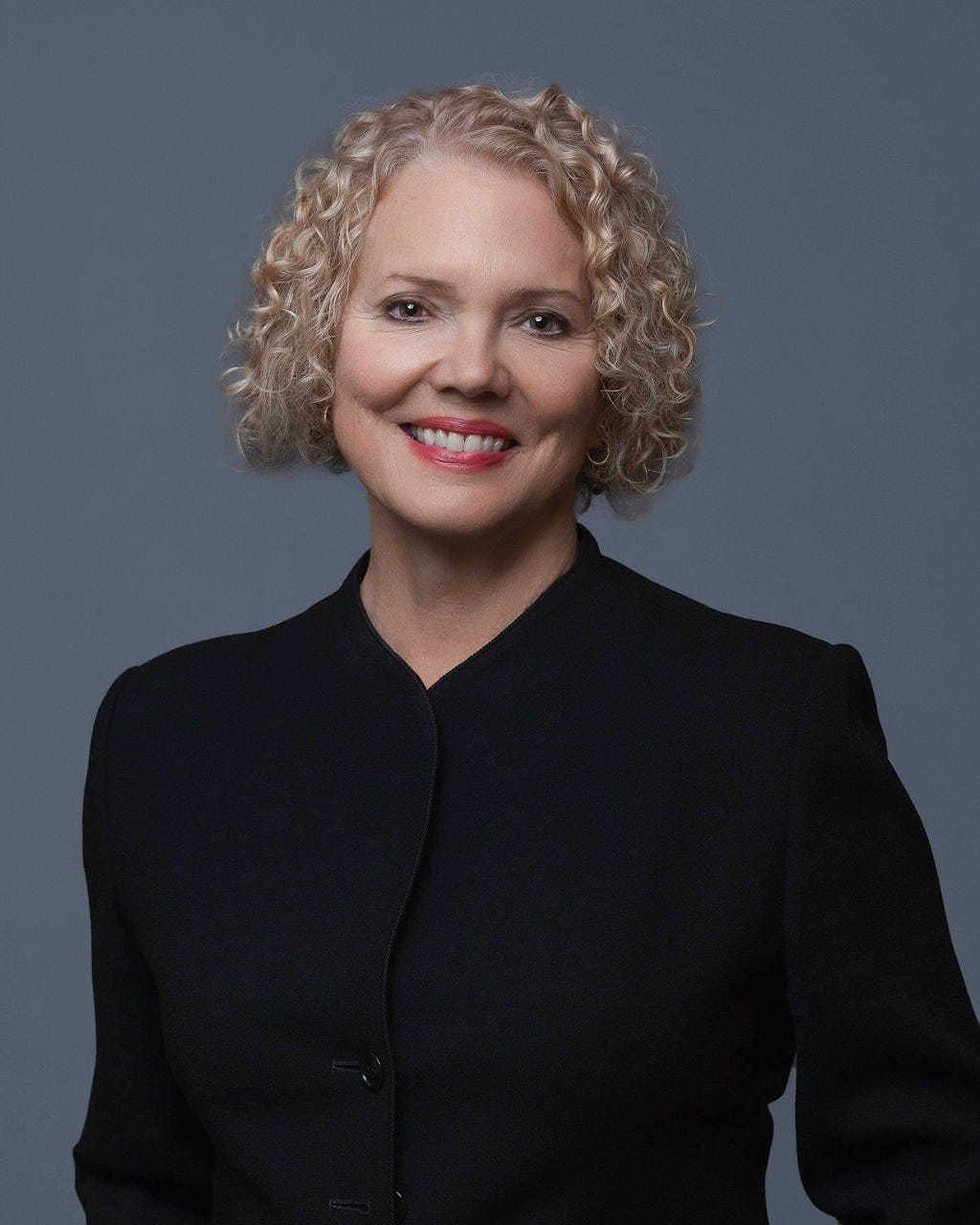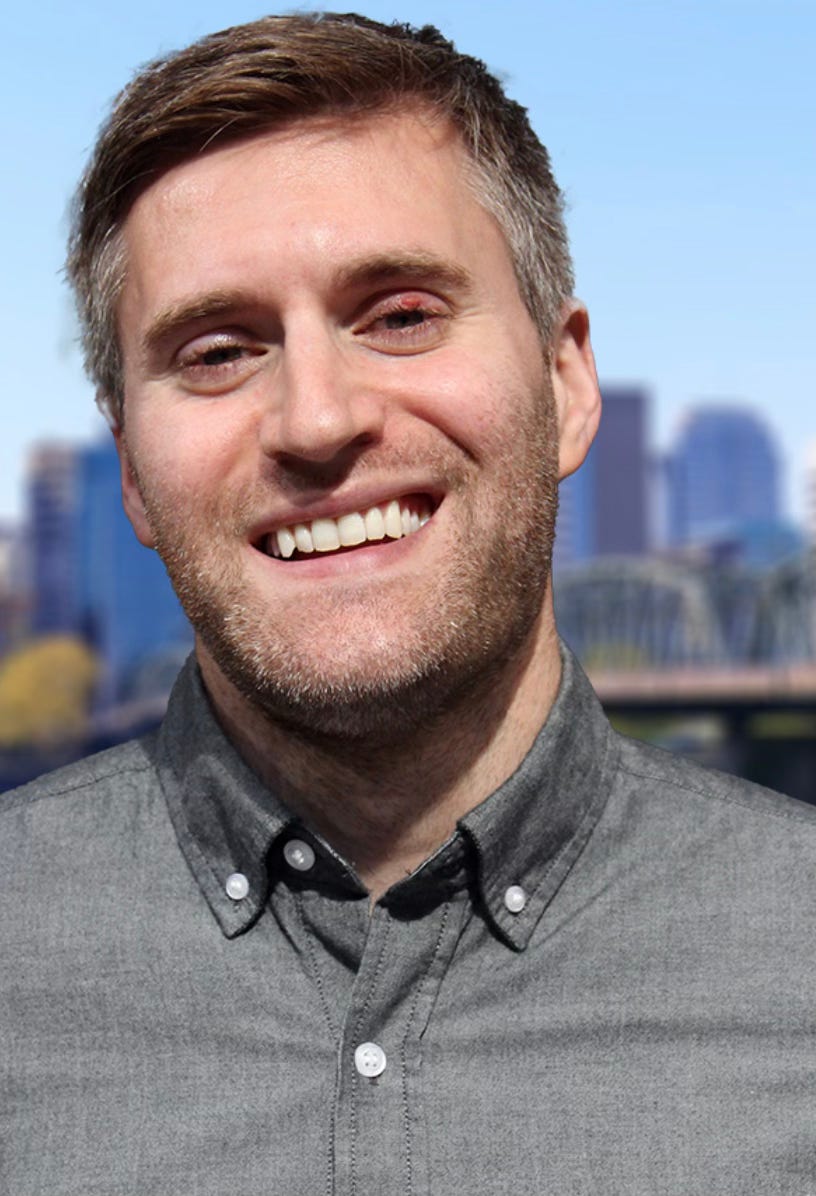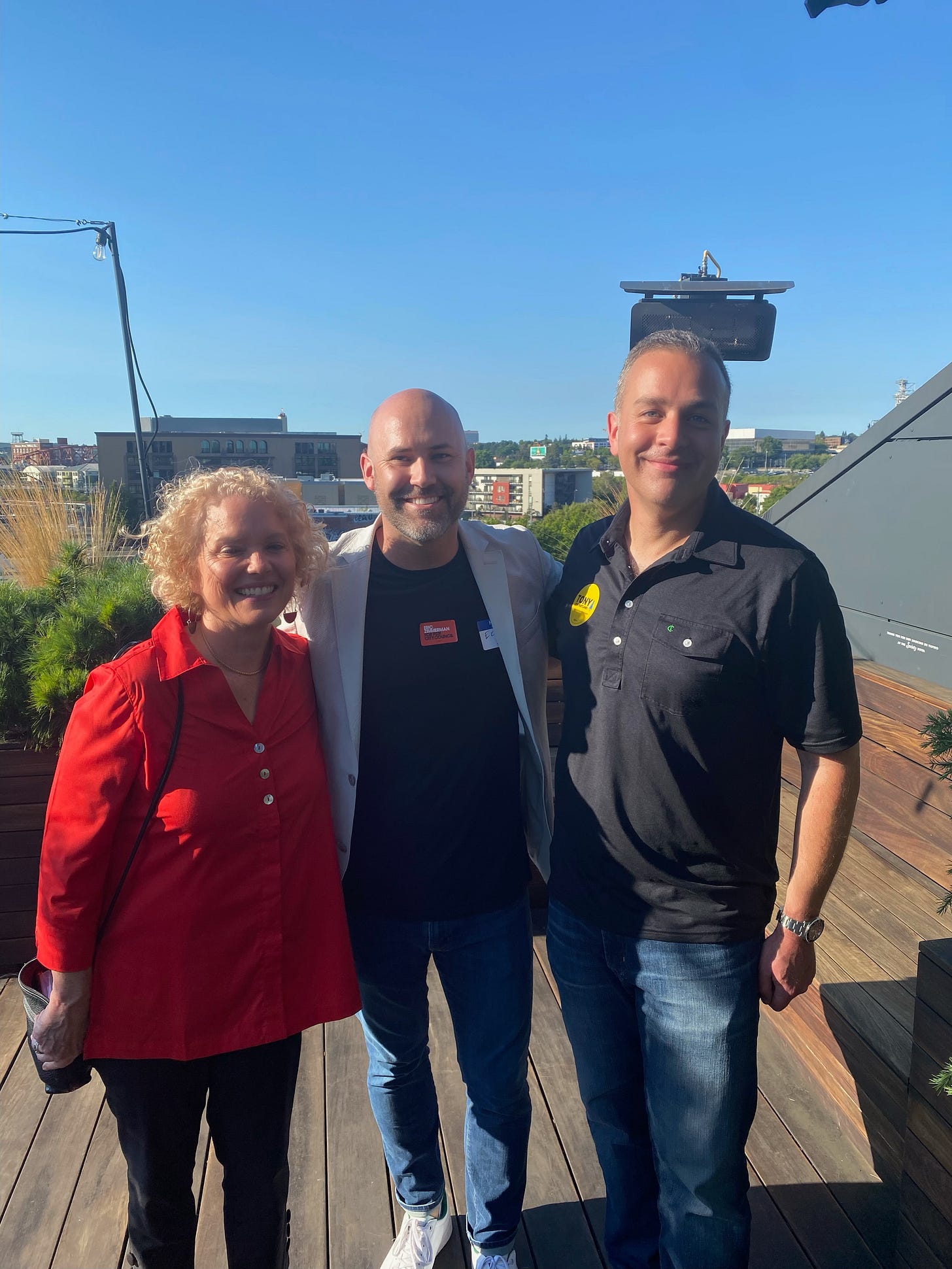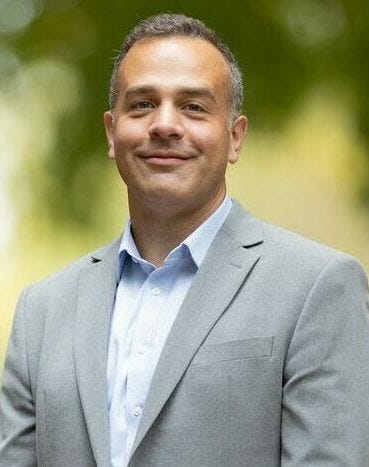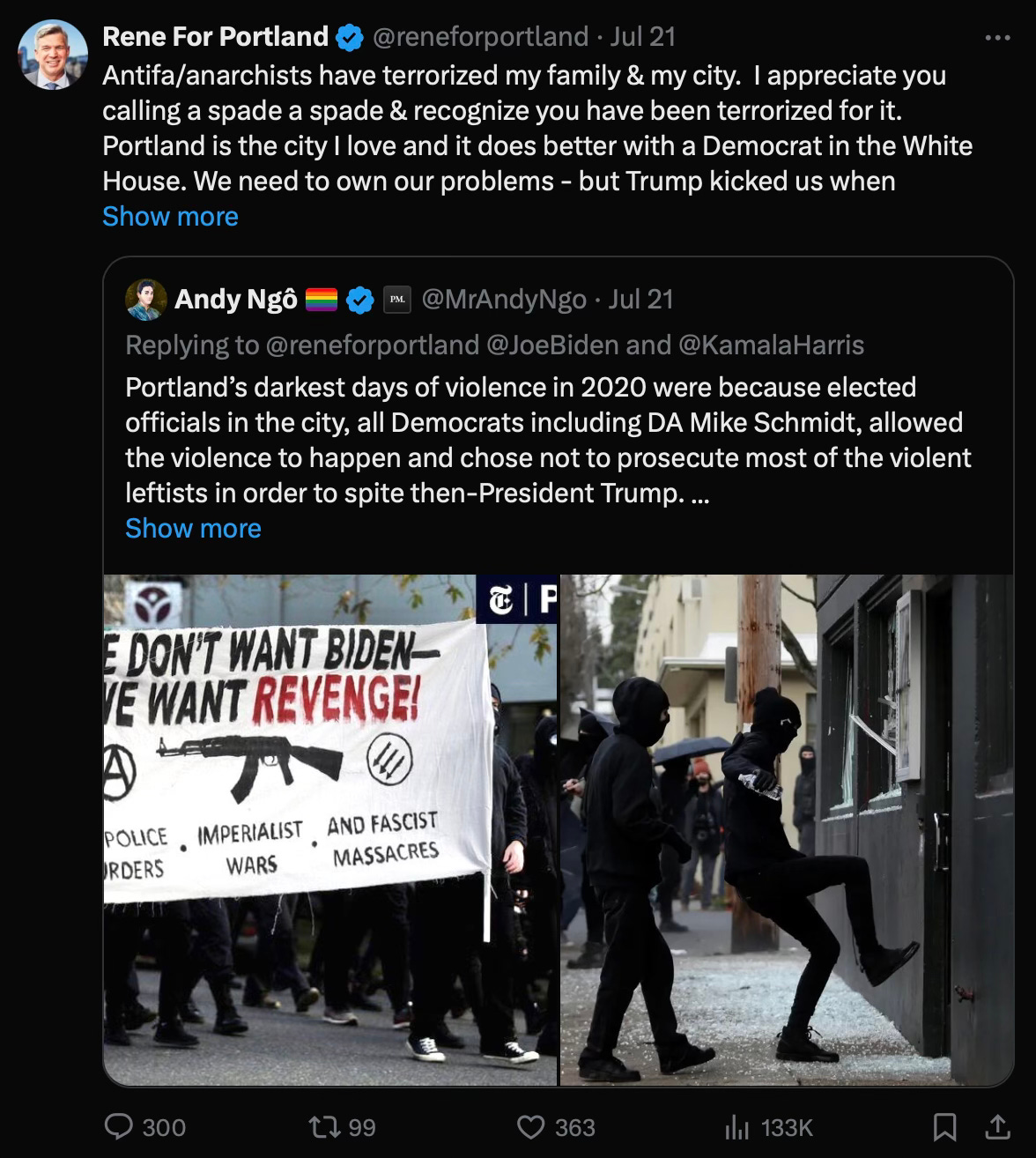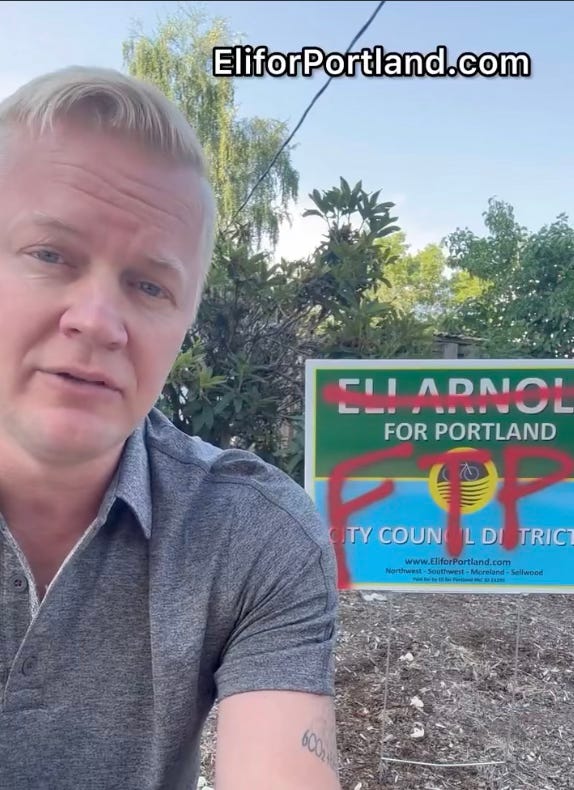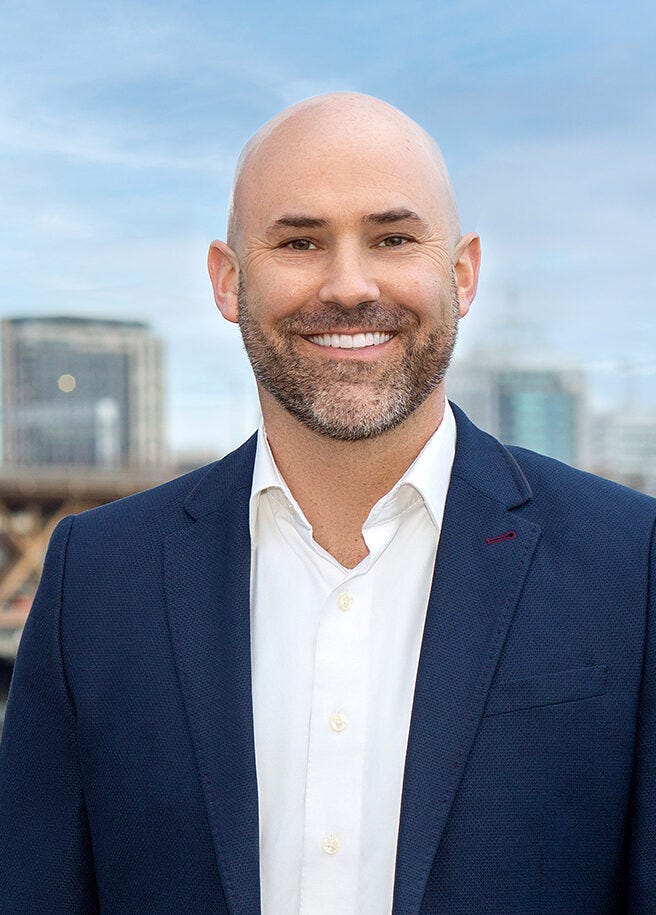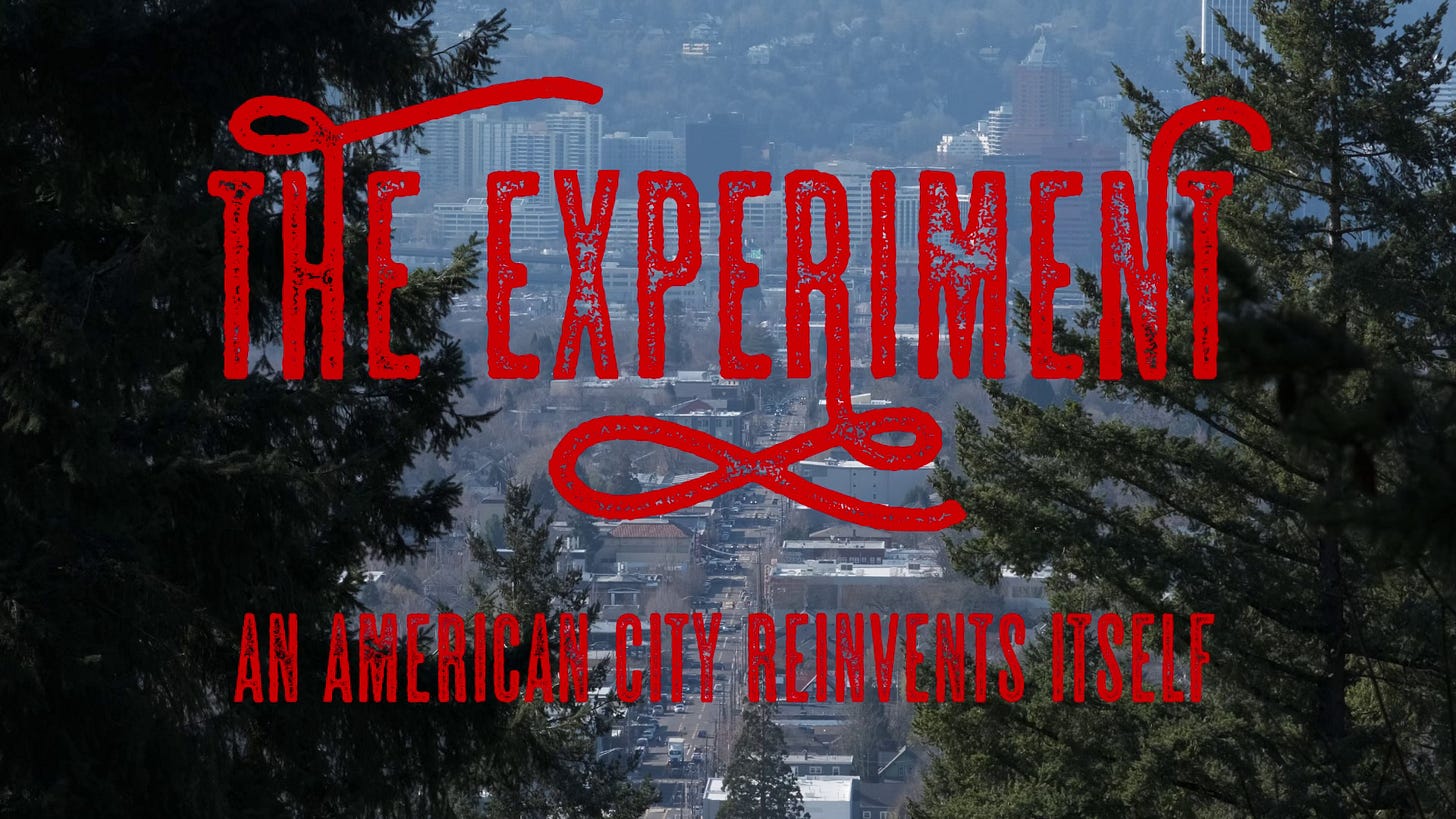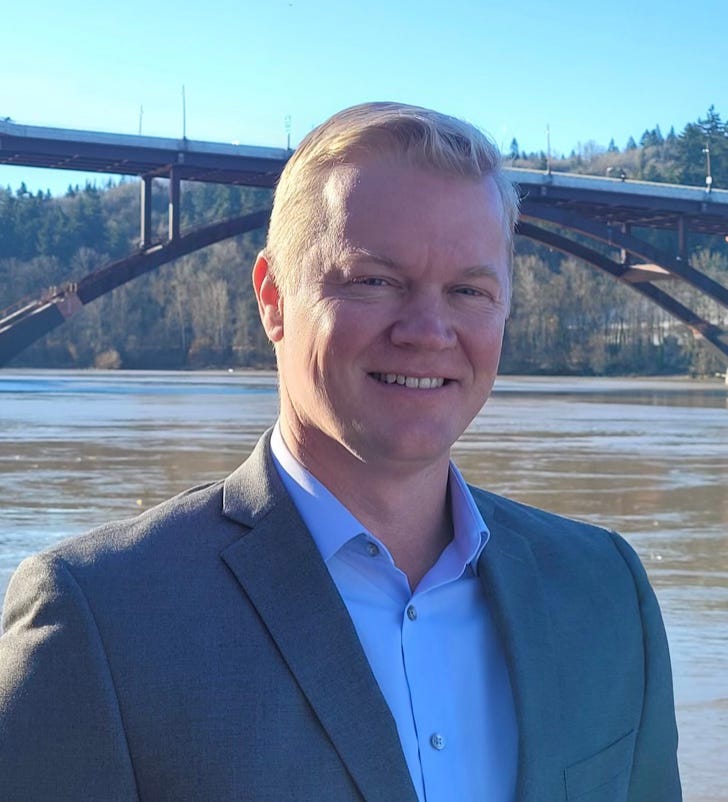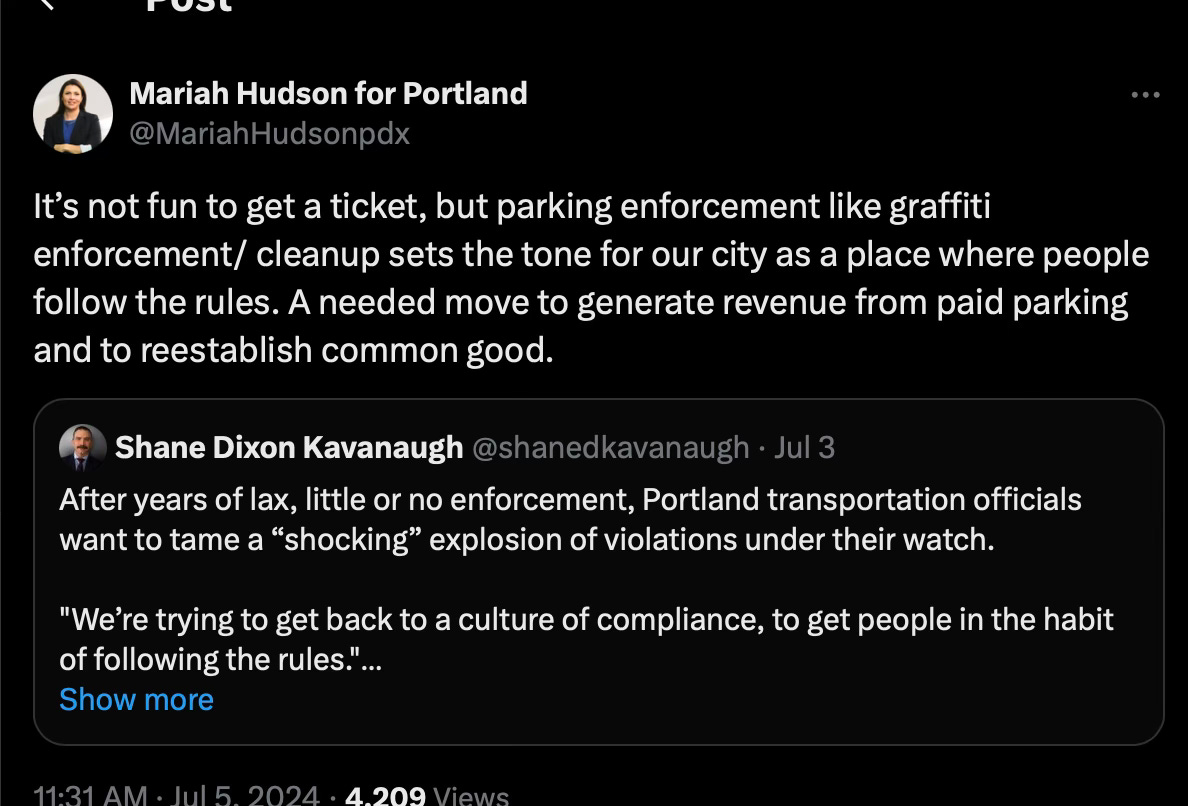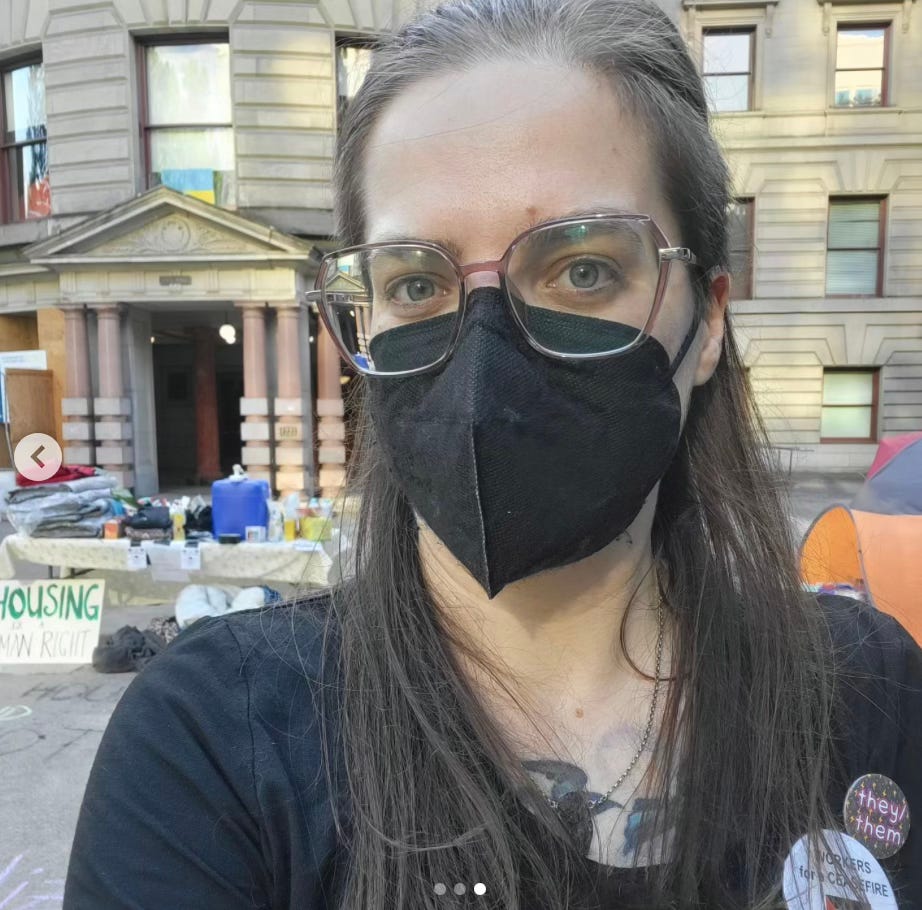Blog: 2024 Election.
(Last updated on December 19, 2024)
Thank You For Reading
Rose City Reform’s election blog ran from August 2023 to December 2024, providing information about candidates in the 2024 Portland election.
We’re now pausing the blog to focus on research and our monthly newsletter (subscribe above!). Much of our candidate research and news coverage remains available on our website, RoseCityReform.org.
If you’re a researcher seeking specific information, such as data on candidate demographics or endorsements, reach out to us at info@rosecityreform.org.
Thank you for reading!
A New Report, a New Year, a New Government
PORTLAND, December 19, 2024 — I took a break from the blog to work on Rose City Reform’s Portland Decides report, which was released yesterday. This hefty document is a departure from Rose City Reform’s usual concise style, but the historic and unprecedented nature of the 2024 election made for quite a few relevant observations.
Here are a few of our key findings:
Increased Representation for Underrepresented Groups: Our research found that while the 2024 candidate pool was diverse, election outcomes resulted in even greater representation for historically underrepresented groups. Women, who comprised 27% of the candidate pool, won 50% of council seats. Candidates identifying as Black, Indigenous, or People of Color (BIPOC), while representing 31% of the field, secured 42% of council seats. Openly LGBTQ+ candidates accounted for 19% of the candidate pool and now hold 33% of council positions. For the first time in Portland’s history, the Asian community gained representation on the council, electing two members.
Broader Geographic Representation: Portland’s new district-based system brought broader geographic representation to the city council. This was especially significant for District 1 (East Portland), a historically underrepresented area east of Interstate 205. In the 2024 election, East Portland gained more representation than it had in all four decades since its annexation. In one district, the election of three seats resulted in all representatives being clustered in one area: all District 4 representatives live in southwest Portland.
Diversity Varies Across Districts: The level of racial and ethnic diversity among representatives varies significantly between districts. District 1, home to a high concentration of BIPOC residents, elected two members who are BIPOC. In contrast, District 4, which has the lowest BIPOC population, elected no BIPOC candidates. Based on the 2024 election, districts where the BIPOC population surpassed the election threshold of 25% elected at least one BIPOC representative.
A Generational Shift: For the first time, Millennials will serve on Portland’s City Council. Representing 36% of the candidate pool, they now hold 67% of the seats. This move toward younger leadership represents a significant change from the previous council, which was dominated by Generation X. Among the newly elected council members, only one (8%) is from Gen X.
Critical Role of Endorsements: In a low-information election, endorsements appear to have been critical to candidates’ success. Our analysis identifies multiple organizations whose endorsements had a measurable impact on outcomes. Among them are SEIU, Northwest Labor Council, United for Portland, and three local newspapers. Candidates endorsed by prominent organizations, such as media outlets and labor unions, generally outperformed their peers. However, the sheer volume of endorsements, often overlapping among ideologically different candidates, potentially diluted their effectiveness as direct cues for voters. Endorsements were most impactful when paired with tangible support such as financial contributions, campaigns paid for by outside groups, and voter mobilization efforts.
The Promise of Candidate Alliances: The new electoral system reshaped campaign dynamics by encouraging collaboration between candidates and discouraging negative campaigning. While the level of collaboration varied widely, 2024 election results suggest that both formal and informal alliances between candidates in the same district may have contributed to their wins.
Fundraising as a Secondary Factor: All winning candidates qualified for public campaign financing, but their overall fundraising amounts varied widely. Some candidates succeeded with relatively modest funding, underscoring the importance of other factors like grassroots organizing, name recognition, endorsements, and campaigns paid for by outside groups.
Pledges as Ideological Cues: Multiple winners signed pledges during their campaigns to signal their priorities once elected. Our analysis shows that councilors-elect who pledged to reject contributions from law enforcement, support expanded renter protections, or advocate for increased funding for programs like Portland Street Response align significantly as a group emphasizing progressive policies. In contrast, candidates who did not sign these pledges appear more likely to advocate for centrist policies or position themselves as potential swing votes. We also find some evidence that pledges had a positive effect for candidates who signed them.
Barriers to Voter Information: Amid unprecedented choice on the ballot, voters faced a significant shortage of information about council candidates. Media outlets, constrained by limited resources, focused largely on the mayor’s race, leaving council candidates with little to no individual coverage. This lack of reporting deprived voters of a reliable source of objective information about the 98 candidates competing to represent Portland’s four new districts. Consequently, media endorsements likely gained outsized influence, emerging as one of the few widely available media resources for voters evaluating candidates.
New Generations Step Into Power
PORTLAND, December 2, 2024 — Portland's new city council reflects a generational shift, with millennials (born 1981–1996) now making up a significant majority—roughly 58% of council seats. Considering the fact that millenials made up 35% of the candidate pool, millenials as a group were highly successful among voters.
This marks the first time millennials have served on Portland City Council, a notable milestone in the city’s political evolution. Additionally, 8% of the council—one member—belongs to Generation Z (born 1997–2012), another historic first for Portland. Together, millennials and Generation Z hold over 65% of the council seats, signaling a clear shift toward younger representation.
The council’s age range spans from 27 to 69, with a mean age of approximately 46. Notably, Generation X (born 1965–1980), which comprised 80% of the outgoing council, and 37% of the candidate pool, now represents just 8% of the new members. Baby boomers (born 1946–1964) will see their representation rise slightly, increasing from 20% to 25%.
Dunphy and Zimmerman Emerge as Winners
PORTLAND, November 22, 2024 — After two and a half weeks of uncertainty following Election Day, it is now clear that Jamie Dunphy and Eric Zimmerman have secured seats in Districts 1 and 4, respectively. The races were too close to call initially due to slim margins between the third-place candidates and their fourth-place competitors.
Dunphy, a former staffer for Senator Jeff Merkley and City Commissioner Nick Fish, prevailed over Terrence Hayes, a small business owner and gun violence prevention advocate. Zimmerman, currently chief of staff to County Commissioner Julia Brim-Edwards, surpassed Portland police officer Eli Arnold, who placed third in first-choice votes.
In District 1, Dunphy joins nonprofit executive Candace Avalos to form a progressive majority, whereas Hayes would have created a more moderate majority with former County Commissioner Loretta Smith, who also won a seat. In District 4, Zimmerman partners with Olivia Clark, a former top aide to Governor John Kitzhaber, to establish a more moderate majority. The same outcome would have occurred if Arnold, whose ideology aligns with Zimmerman’s, had been elected.
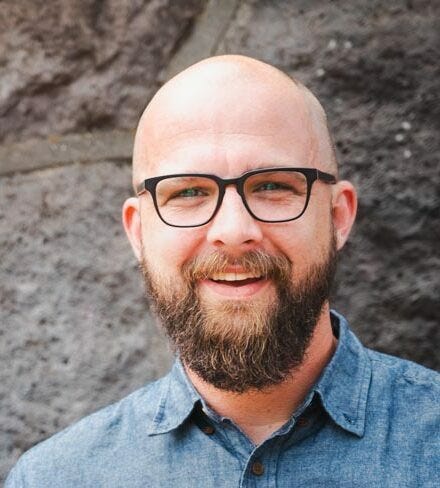
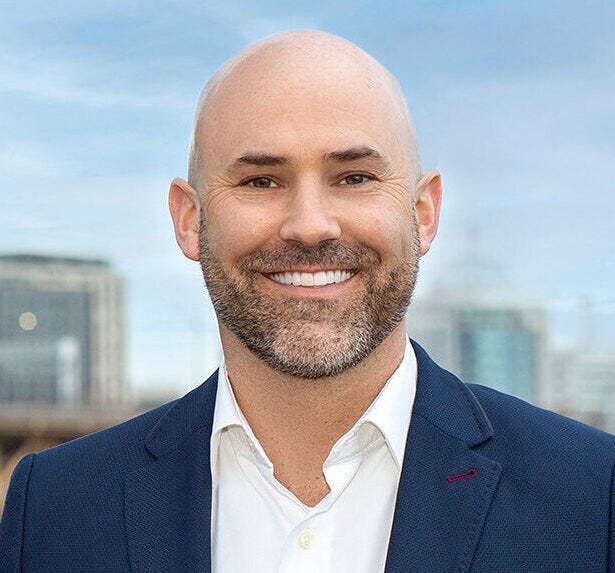
Taking a Look at Campaign Promises
PORTLAND, November 18, 2024 — Portland’s incoming government faces a challenging year ahead. The new council and mayor-elect Keith Wilson will need to organize themselves internally, set norms, and build relationships—all while preparing for a difficult budget cycle. Despite these daunting tasks, the winning candidates made promises to voters. Here’s a look at their priorities. As a reminder, all legislation requires seven votes to pass, with the mayor casting the tiebreaking vote in the event of a deadlock.
Keith Wilson (Mayor)
Key Campaign Promise: Ending unsheltered homelessness within his first year as mayor by reopening Portland’s overnight shelters and adding temporary daytime shelters to increase available shelter beds. Once shelter beds are readily available, ramp up enforcement of Portland’s public camping ban.
Candace Avalos (District 1)
Key Campaign Promise: Avalos has signed the Save Portland Street Response (PSR) pledge, committing her to voting in favor of expanding PSR, the city’s unarmed first response team, to operate citywide and 24/7.
Loretta Smith (District 1)
Key Campaign Promise: Increasing Portland’s number of sworn police officers.
Jamie Dunphy (District 1)
Key Campaign Promise: Reforming Portland’s noise code to eliminate the “plainly audible” standard and maintain only a decibel-based standard for different zones and times of day. Dunphy has also pledged to support a Renter’s Bill of Rights to expand renters’ protections in Portland and beyond.
Dan Ryan (District 2)
Key Campaign Promise: Increasing Portland’s number of sworn police officers and bringing more job training opportunities to East Portland.
Elana Pirtle-Guiney (District 2)
Key Campaign Promise: Expanding Portland Street Response to operate citywide and 24/7. While Pirtle-Guiney has not signed the pledge to expand PSR, she made it a priority during her campaign.
Sameer Kanal (District 2)
Key Campaign Promise: Kanal has signed pledges to support a Renter’s Bill of Rights, expand Portland Street Response, and introduce a Gaza ceasefire resolution on the council.
Steve Novick (District 3)
Key Campaign Promise: Transitioning police officers to smart gun technology to prevent youth suicides and reduce gun crimes.
Tiffany Koyama Lane (District 3)
Key Campaign Promise: Koyama Lane has signed pledges to support a Renter’s Bill of Rights, expand Portland Street Response, and introduce a Gaza ceasefire resolution on the council.
Angelita Morillo (District 3)
Key Campaign Promise: Establishing a Sanitation Bureau to serve Portland. Morillo has also signed pledges supporting a Renter’s Bill of Rights, expanding Portland Street Response, and introducing a Gaza ceasefire resolution on the council.
Olivia Clark (District 4)
Key Campaign Promise: Ending street camping and public drug use.
Mitch Green (District 4)
Key Campaign Promise: Establishing a social housing program where the City of Portland would own and manage rental housing with rents tied to 30% of tenants’ income. Green has also signed pledges to support a Renter’s Bill of Rights, expand Portland Street Response, and introduce a Gaza ceasefire resolution on the council.
Eric Zimmerman (District 4)
Key Campaign Promise: Expanding Temporary Alternative Shelter Sites to provide immediate shelter solutions and seeking to ban RV camping and parking on Portland neighborhood streets.
Nailbiter in District 1 and District 4
PORTLAND, November 15, 2024 — While ten council candidates now hold the title of councilor-elect, two races remain undecided. In District 1, Jamie Dunphy leads the race for the third seat, but the contest is too close to call. Dunphy, a live music advocate and former policy advisor to City Commissioner Nick Fish, holds a narrow lead of approximately 800 votes over Terrence Hayes, a small business owner and gun violence prevention advocate. Meanwhile, in District 4, Eric Zimmerman, chief of staff to Multnomah County Commissioner Julia Brim-Edwards, has a similar edge over Portland police officer Eli Arnold.
Multnomah County has received nearly all ballots, but about 11,000 still need to be cured. This means a ballot is either missing a signature or the voter’s signature doesn’t match the one on file. (Personal note: This happened to me the first time I voted in Oregon when I neatly signed my ballot with my full name instead of my usual illegible scribble.) Notably, curing doesn’t apply to fixing errors on the ballot itself. In those cases, Portland’s election code provides specific rules for determining if the ballot can count.
So how are the candidates faring while waiting? Reactions in the two races have been notably different. In District 1, both Dunphy’s and Hayes’ campaigns are rallying supporters to help voters cure their ballots. “We’re going to fight to the last ballot counted,” Hayes wrote on Instagram. Dunphy expressed similar confidence in an email to supporters, writing, “We are pretty confident that we can get to a lot of our supporters [and] that our lead will hold.”
In District 4, candidates are keeping a lower profile. Despite the close margin, Arnold tweeted the day after Election Night, “I assume this will hold. Congratulations to Olivia, Mitch, and Eric” (Olivia Clark and Mitch Green have already won seats in District 4). Zimmerman, who has been mostly silent about the close call, simply tweeted a GIF from the movie Braveheart on Election Night, showing Mel Gibson as William Wallace shouting, “Hold!”
The deadline for curing ballots is November 26. As a result, these races are unlikely to be called until November 27.
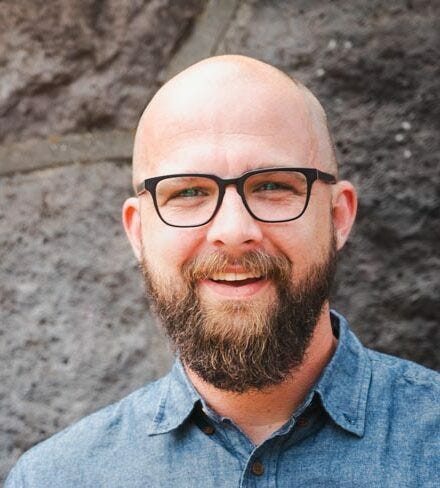
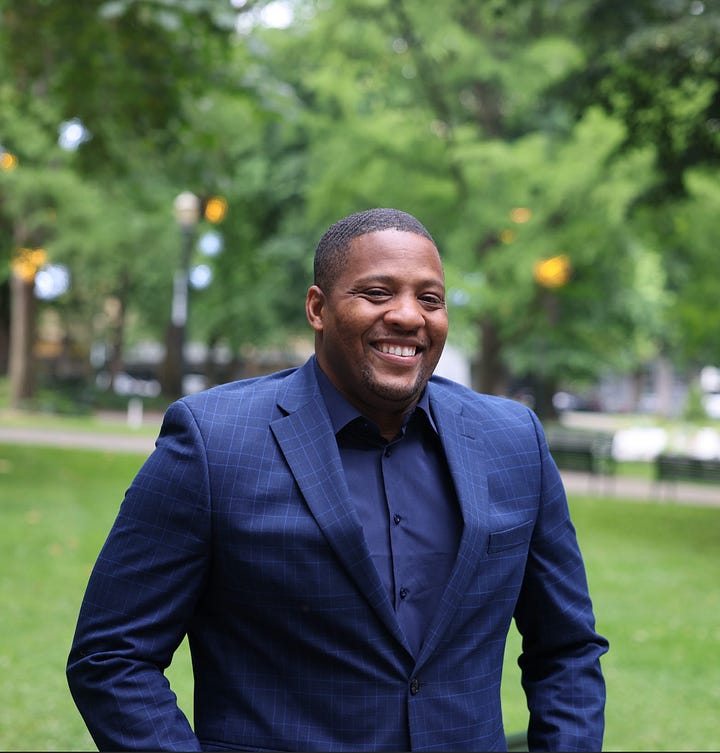
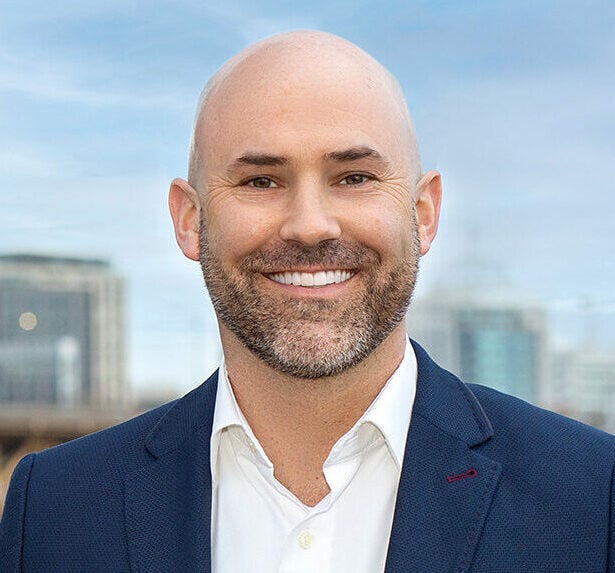
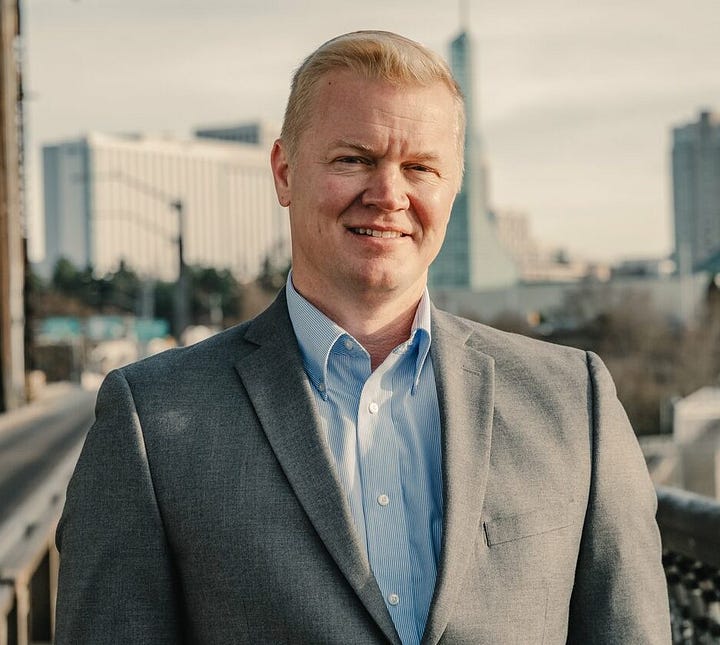
Did Media Endorsements Matter in the 2024 City Election?
PORTLAND, November 13, 2024 — In Portland’s crowded city races, media endorsements appear to have played an influential role. Of the twelve council winners, 11 received at least one endorsement from The Oregonian, Willamette Week, or Portland Mercury. The sole candidate who won without such an endorsement was Loretta Smith in District 1. Smith’s success may be attributed to her name recognition from two terms as Multnomah County Commissioner and multiple runs for other high-profile positions.
Willamette Week’s endorsement was most strongly associated with electoral success, with eight of its endorsed candidates winning, compared to seven for Portland Mercury and five for The Oregonian.
Among council candidates, the win rate for those with at least one of these media endorsements was approximately 30%. For candidates with multiple endorsements, the win rate rose to about 71%. Only two out of seven candidates with more than one of these media endorsements failed to secure a seat: Michelle DePass, endorsed by both Willamette Week and Portland Mercury, and Eli Arnold*, endorsed by Willamette Week and The Oregonian.
For mayoral candidates, these media endorsements likely also boosted electability. Notably, Keith Wilson—the winner—snagged Willamette Week’s endorsement, which was most highly associated with success, as well as the Portland Mercury’s endorsement. Runner-up Carmen Rubio secured the Portland Mercury’s endorsement, and Rene Gonzalez was endorsed by The Oregonian.
*Eli Arnold is currently in fouth place in the District 4 race, which has not been called yet.
Can We Expect a Push for Social Housing?
PORTLAND, November 11, 2024 — With several new Portland City Council members voicing support for social housing, the idea of city-owned, mixed-income housing could soon appear on the council’s docket.
Mitch Green, representing District 4, has pledged to introduce a proposal for the city to develop and manage publicly owned housing funded by a revolving loan model, allowing repaid loans to finance new housing projects continuously. Green points to Montgomery County, Maryland’s $50 million social housing fund, established in 2021, as evidence that this model can be sustainable without new taxes. “I think it’d be very difficult to pass a new bond or raise taxes in this city right now,” he told Rose City Reform last month, suggesting instead that existing resources within the Portland Housing Bureau could be reprioritized.
To help fund the social housing program, Green proposes redirecting resources from Portland’s inclusionary zoning (IZ) program, which he argues mainly benefits those near the median income, leaving limited options for lower-income residents. He also points to other funding sources, such as state grants, tax increment financing, and potential community investment through co-op shares or limited private backing.
On the campaign trail, Green’s stance on social housing was backed by other candidates, including councilors-elect Sameer Kanal (D2) and Tiffany Koyama Lane (D3), all of whom, along with Jamie Dunphy (D1) and Angelita Morillo (D3), have also signed a pledge dubbed the Renters' Bill of Rights. This pledge, developed by the Portland chapter of the Democratic Socialists of America (DSA), calls for renter protections such as six months’ notice before rent increases, relocation assistance for rent hikes over 5%, and a right to legal representation in eviction cases. It also proposes linking rent to the minimum wage to ensure housing affordability for full-time workers.
Since both social housing and a Renters' Bill of Rights are DSA priorities, council members who support one may be inclined to support the other. However, these members alone fall short of the seven-vote majority required to pass proposals on the new 12-member city council. To advance, Green and others will need additional backing from progressives like Candace Avalos (D1) or Elana Pirtle-Guiney (D2). Portions of Green’s revolving loan proposal also align with Portland’s Housing Production Strategy, which could appeal to moderate members, even if they hesitate on income-linked rent caps.
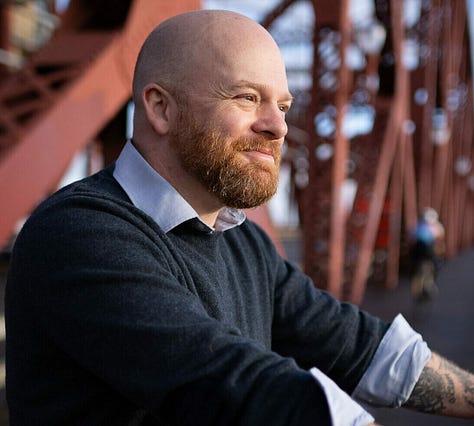
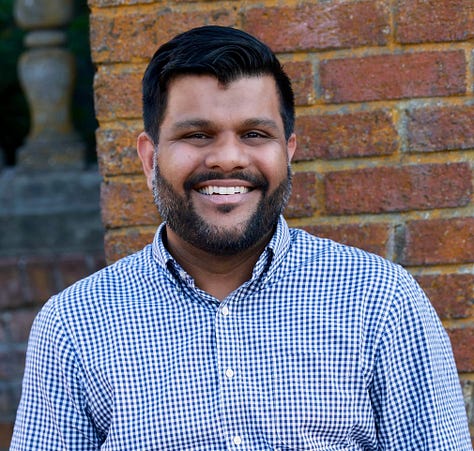
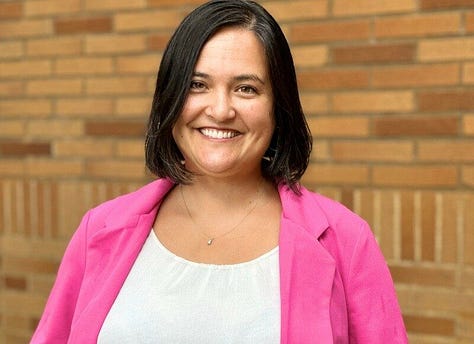
Meet Your New Council
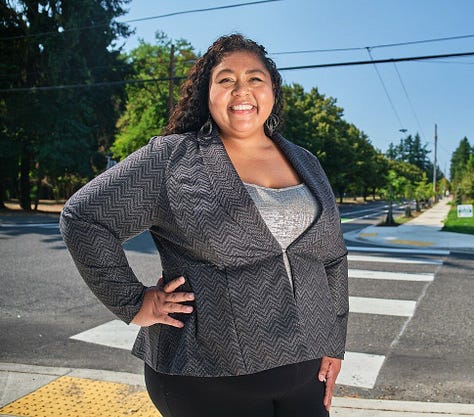
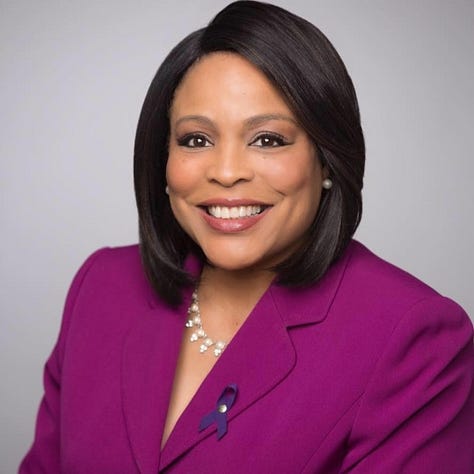
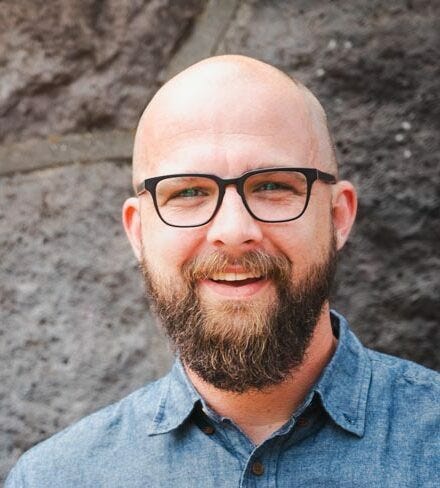

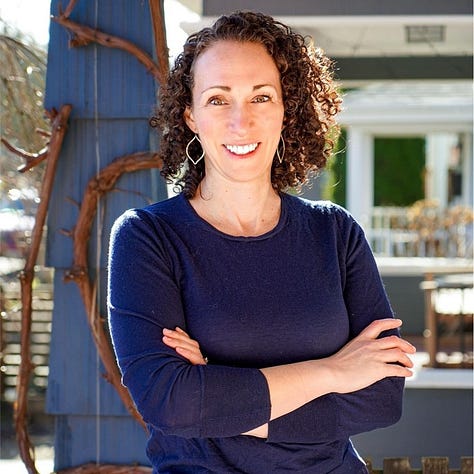
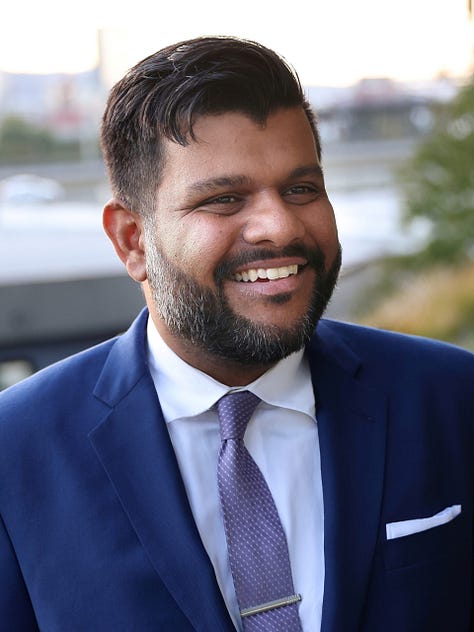
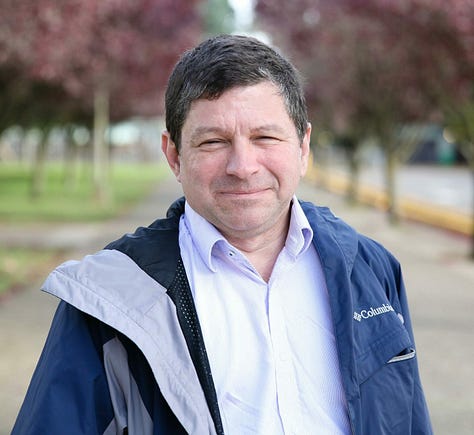
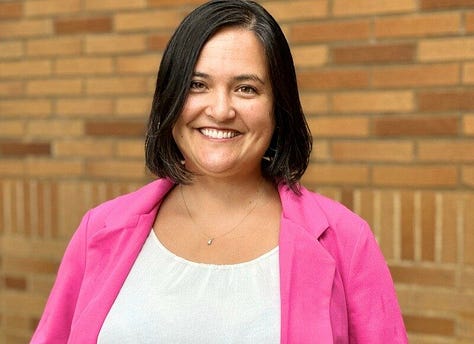

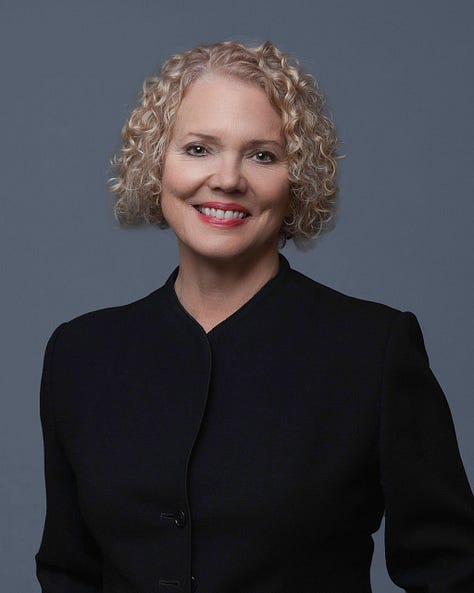
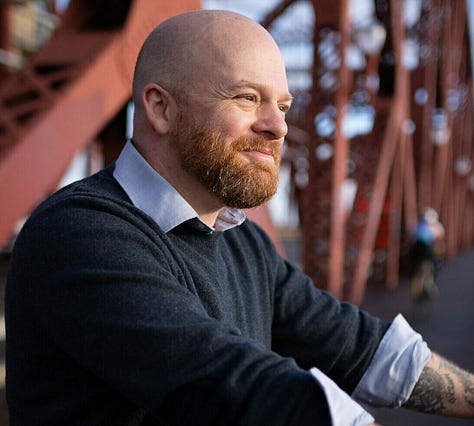
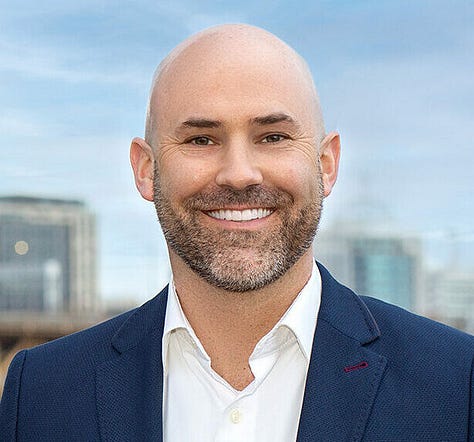
A New Council for a New Era
PORTLAND, November 10, 2024 — With yesterday's release of election results, most city council races have now been called, and the outcomes remain unchanged since Election Day. Two seats—one in District 1 and another in District 4—are too close to call, but here’s the likely lineup (pending races marked with an asterisk):
District 1: Candace Avalos, Loretta Smith, Jamie Dunphy*
District 2: Dan Ryan, Elana Pirtle-Guiney, Sameer Kanal
District 3: Steve Novick, Tiffany Koyama Lane, Angelita Morillo
District 4: Olivia Clark, Mitch Green, Eric Zimmerman*
To create a staggered election cycle, councilmembers elected in Districts 3 and 4 will serve initial two-year terms, with elections for these seats held again in 2026. Councilmembers in Districts 1 and 2, however, will serve full four-year terms, with their next elections scheduled for 2028. This staggered schedule ensures that half of the council seats are up for election every two years.
What Do We Know About This Council?
Over the next few months, Rose City Reform will provide in-depth commentary on how Portland’s government reforms have reshaped representation. For now, here are some early insights:
Representation of Women: Women have won 50% of council seats despite representing only 26.5% of the candidate pool, indicating a win rate approximately 1.9 times higher than their male counterparts.
Racial and Ethnic Diversity: While candidates of color did not win seats in every district, about 42% of councilmembers identify as BIPOC. Portland made history by electing the city’s first Asian-American councilors: Sameer Kanal (D2) and Tiffany Koyama Lane (D3). Districts 1 and 3 will each have a majority of representatives of color, while District 4 will have none. Notably, District 2, home to Portland’s largest percentage of Black residents, did not elect a Black representative despite having multiple competitive Black candidates.
Housing and Generational Diversity: Representation of housing types is broad among winners, with three members who rent their homes. Age demographics lean toward younger representation, with nearly 60% of members being millennials, followed by baby boomers at 25%.
LGBTQ+ Representation: Four prospective winners openly identify as LGBTQ+, comprising a third of the council. All districts except District 1 have at least one LGBTQ+ representative.
Fundraising: All winners qualified for Portland’s public campaign financing program. However, fundraising varied widely, from Koyama Lane’s $200k+ to under $80k for Sameer Kanal. (These totals may change as candidates report contributions.) In Districts 2, 3, and 4, the top fundraiser in each district won a seat, but in District 1, top fundraiser Steph Routh came up short.
Endorsements: Labor groups saw strong representation among the winners, with SEIU, the influential healthcare union, counting seven endorsed candidates among those elected, and the Northwest Labor Council seeing two endorsed candidates win in each district. The business coalition United for Portland also had success, with endorsed candidates taking two seats in both Districts 2 and 4, and one each in Districts 1 and 3. The Portland Voter Guide PAC, backed by progressive, environmental, and BIPOC organizations, saw eight of its endorsed candidates elected, including a clean sweep in District 3, where all its picks won.
Ideological Range: Councilmembers span the ideological spectrum, from Mitch Green (D4), Sameer Kanal (D2), and Tiffany Koyama Lane (D3), all members of the Democratic Socialists of America, to Loretta Smith (D1), Dan Ryan (D2), and Eric Zimmerman (D4), whose platforms emphasized support for law enforcement and tighter camping regulations. Multiple winners, including Avalos (D1), Kanal (D2), Koyama Lane (D3), Angelita Morillo (D3), and Mitch Green (D4), have signed a pledge that commits them to introducing and voting in favor of full funding for Portland Street Response, Portland’s unarmed first responders, to operate citywide and around the clock. Others, including Loretta Smith (D1), Jamie Dunphy (D1), Dan Ryan (D2), Olivia Clark (D4), and Eric Zimmerman (D4), have indicated support for increasing Portland’s number of sworn police officers.
Positions on Portland’s Camping Ban: Councilmembers appear divided on Portland’s newly adopted camping ban, which authorizes police to arrest and jail individuals who repeatedly refuse shelter. Responses to The Oregonian/OPB candidate questionnaires suggest that support for the ban among the new council may be limited. However, the phrasing of the question—asking if candidates “favor arresting and jailing people who camp on public property in Portland who refuse repeated offers of shelter”—makes it difficult to discern whether candidates oppose enforcement altogether or simply prefer alternative approaches while leaving the ban intact. This topic is likely to become prominent for the new government, as Mayor-Elect Keith Wilson’s shelter plan depends on enforcing the camping ban.
Campaign and Elected Experience: Most winners are new to elected office—83% have not previously held elected office. For 67%, this was their first candidacy. Meanwhile, 17% have both run and won before, with Loretta Smith (D1) previously serving on the Multnomah County Commission and Steve Novick (D3) on Portland City Council. Additionally, 33% have run and lost in prior races, including Smith and Novick, who also lost elections, as well as Candace Avalos (D1) and Eric Zimmerman (D4), who previously ran for Portland City Council and the Multnomah County Commission, respectively.
Tweeting While Waiting: Candidate Reactions
PORTLAND, November 8, 2024 — Yesterday’s results from Multnomah County didn’t shift the needle enough to declare winners in the council election, leaving leading candidates with little to do but wait. Here’s what a few of them are saying on social media.
Candace Avalos (D1) via Instagram:
While we wait for all the ballots to be counted for the Portland City Council races, I just want to take a moment to share my deep love and appreciation for everyone who helped our campaign get across the finish line! Last night emotions were high and complicated as our local and national elections told two different stories, but regardless of how the final results turn out, one thing is certain: you can always count on me to roll up my sleeves and fight for our collective future alongside you. 🫶🏾 I love you Portland!
Jamie Dunphy (D1) via Instagram
We pushed what was possible here in East Portland. We knocked on over 13,000 doors. We were the only unionized campaign in the city! We didn't do mailers and only put out 12 yard signs. Instead we bet it all on our field game in a part of town notorious for unpaved streets and incomplete sidewalks. We heard hundreds of times "no one has ever knocked on my door before". We still had remarkably low turnout. It's going to take decades to build the trust in this community to believe that their vote will make their lives better. Also we need to demand less of the voters. This election was the craziest it will hopefully ever be. It better be.
Tiffany Koyama Lane (D3) via Instagram
We wanted to share that things to look SO STRONG with our race. We continue to hold a steady lead after the new reporting from the county elections office today […]. I am so so proud of what we have built together! Thank you to every volunteer, donor, supporter… YOU made this happen!
Angelita Morillo (D3) via Twitter
If I get elected, the next two years are going to be hard. We’re going to be creating a new government with a $65million budget deficit, and a vengeful President Trump in power. I am daunted by that, but I also firmly believe our community will stand strong and I am ready to hold the line if I’m called to serve. Whatever happens in the coming days, weeks, and months, we will protect each other and love each other more fiercely than we’ve ever done before. We’re gonna make it.
Mitch Green (D4) via X
Despite Trump’s claims tariffs will be paid by consumers at home. Don’t know if he can do it, but I’m not betting against it. Fortunately it looks like we’ll get a council that wants to move aggressively on permitting and zoning, but we’ll need to put rent control on the legislative agenda and move on other tenant stabilization measures for near term.
Eric Zimmerman (D4) via Instagram
We’ve come to the end of an important election season. My gratitude to everyone who was involved, everyone who took time to share something important for you with me, and to my always faithful and incredibly helpful set of supporters and volunteers. My deep appreciation to the labor community, the business community, and public safety advocates. And finally, for everyone that canvassed, my family, friends, supporters, and a couple new faces- thanks for helping us reach neighbors.
Leading candidates weren’t the only ones taking to Twitter to share their reactions. Eli Arnold, currently trailing closely behind Eric Zimmerman for the third spot in District 4, had this to say:
Thoughts on the Council results. The new council is far more progressive than the last. Does this mean Portland voters are more progressive than we realized, but had been hedging bets? I think the DA’s race in May suggests that answer is no. Another possibility is that older and more moderate voters did not embrace the new voting system. They either sat the council race out, or ranked fewer choices than progressive voters, leading to higher rates of ballot exhaustion. o be clear, I actually like ranked choice and I’m sure people will become more used to it in time. I do not believe it negatively impacted my race. It will be interesting to see what analysis shows in time.
Keith Wilson: “A Vote for Me is a Vote for a Plan to Care for the Community—with Clear Asks Involved.”
PORTLAND, November 7, 2024 — Keith Wilson, president of Titan Freight Systems and founder of the nonprofit Shelter Portland, is set to become Portland's next mayor. As of last night, Wilson held 61.55% of the vote to Carmen Rubio’s 38.45%—a gap Rubio is unlikely can no longer close despite a substantial number of votes still uncounted.
Based on ballots processed so far, Wilson was the first choice for 35% of voters and a popular second choice among those who ranked Liv Østus, Mingus Mapps, or Rene Gonzalez first.
Wilson, a Portland native whose campaign centered on expanding shelter access, recently participated in a Q&A with Rose City Reform about his strategy. Here’s what he had to say:
Q: Running for office is a huge undertaking. You decided to also develop a detailed strategy for ending unsheltered homelessness—before you were elected—and present it to elected officials and other candidates. This seems like essentially taking on two massive projects at once. Why?
A: The issue of our time is unsheltered homelessness, due to all the associated issues it creates. Our police response times are among the worst in the nation, with half of their time spent dealing with the unsheltered. Our livability has been impacted by the humanitarian crisis on our streets. Addressing these issues can restore dignity in our community. As mayor, I don’t want to miss the opportunity to lead the city in coming together behind a specific plan to end unsheltered homelessness. If elected, I feel this effort requires a community-wide push.
Q: Can you tell us a little more about this plan?
By having emergency shelters, we eliminate the 72-hour posting requirement for clearing tents and RVs, allowing outreach workers to help people while also saying, “You can’t stay here.” This will improve community livability and respect the rights of shopkeepers and residents. The public needs to know what’s coming, as it will be challenging. If I’m elected, they’re electing me with a mandate to care for our community by setting up nighttime shelters. We’ll need to set up six shelters in each community. While these will be short-term, they are essential. It’s a choice: do we want people living on the streets in tents, or do we want them cared for at night in churches and community centers? It’s a social contract we’re creating with the city—a vote for me is a vote for a plan to care for the community, with clear asks involved.
Q: Most candidates running on the issue of homelessness talk primarily about county services, housing production, or other jurisdictional actions involving the state, city, county, or even Metro. Most promises revolve around other jurisdictions. Your approach is a city action plan. Can you speak to that?
A: It comes down to each jurisdiction's priorities. The county handles Health and Human Services, while the city is responsible for public safety, infrastructure, and right-of-way. Unsheltered homelessness is a city priority because it impacts public safety. Hundreds of people are dying this year, affecting our priority response times and right-of-way. These are city responsibilities. Last week, the mayor’s office confirmed the city’s budget impact for not caring for our citizens is $300 million. This waste could be avoided if we cared for unsheltered individuals. It’s a cost-cutting measure as well as a moral imperative, and the ROI on reducing that $300 million by investing $20-25 million is obvious.
Q: Housing First—what does it mean to you?
A: It’s low-barrier. You take everyone as they are, whether they have a dog, addiction, or behavioral issue. Housing First, to me, means finding and solving their needs, even if that’s reuniting them with family or providing an ID for employment. Housing is the goal, but there’s a continuum of support we must address first. I’m focused on ending unsheltered homelessness to stabilize our community. If people came to Portland because of decriminalization, that’s changing. Our compact with the city is that we provide basic nighttime emergency shelter, but street living is no longer permitted. If they’re here for a lifestyle choice, we’ll help reunify them with their communities, whether that’s Austin, San Diego, or Salem.
A: What happens if you propose this plan to the council, and they say no?
A: I’m already working on that. I’ve been meeting with Metro, the county, and every city candidate. The first legislative step will be to reconfirm our homelessness emergency declaration, giving us the authority to implement this plan.
Learn More About Wilson’s Plan
Last month, Mayor-Elect Wilson also appeared on our Stump Talk podcast. You can listen to it on Substack here, or click the Spotify link below.
The Oregonian Calls Races for Clark and Novick
PORTLAND, November 6, 2024 — The Oregonian has declared Olivia Clark and Steve Novick as winners in Portland’s council election. Clark, who has held leadership roles at TriMet and the Oregon Department of Environmental Quality, currently holds a substantial lead in District 4, although a large percentage of votes remain uncounted.
In District 3, former City Commissioner Steve Novick is also leading, though by a narrower margin than Clark.
Proceed With Caution: Too Early to Speculate About Council Winners
PORTLAND, November 6, 2024 — Last night at 8 p.m., Multnomah County released its initial ranked-choice voting results on a dedicated page, showing the tallying rounds completed at that point.
As of last night, the leading candidates were:
District 1: Candace Avalos, Loretta Smith, Jamie Dunphy
District 2: Dan Ryan, Elana Pirtle-Guiney, Sameer Kanal
District 3: Steve Novick, Tiffany Koyama Lane, Angelita Morillo
District 4: Olivia Clark, Mitch Green, Eric Zimmerman
It’s critical to emphasize that the page has not been updated since and that none of these candidates have secured a decisive win given how many ballots remain uncounted. Additionally, a key feature of Portland’s new voting method, single transferable vote, is that candidates leading in early rounds may be overtaken as additional ballots are tallied in later rounds.
Readers should note that if they consult the results page, many candidates may be marked as “defeated” — but this does not mean they are out of the running. Paul Gronke, a political science professor at Reed College and founder of the Early Voting Information Center (EVIC), yesterday noted on Twitter that the label “defeated” has the potential to cause confusion among voters. While Gronke said it was his understanding that Multnomah County must use the term due to city code, he called on the city to consider a code change that would use a more accurate nomer.
Gronke posted an image of the District 4 results, which as of Tuesday night showed a commanding lead for Olivia Clark but very narrow results for the three-runners up: Mitch Green, Eric Zimmerman, and Eli Arnold. “There is no way to tell at this stage which of the 2-4 candidates will end up being elected. To label one as “defeated” is really inaccurate,” Gronke wrote.
Likewise, pollster John Horvick of Portland-based DHM Research urged similar caution in a tweet. “Multnomah County Elections is projecting 80% turnout. In the May primary, 13% of the ballots were returned after election day. If both happened—a big if—that would mean about 60k ballots to come in tomorrow and later. Be careful about interpreting early returns tonight,” Horvick said.
Dear readers, please rest assured that we are preparing for our analysis of the winners as soon as the results warrant it. We’re just not there yet.
It’s Election Day!
PORTLAND, November 5, 2024 — After a sixteen-month election cycle that began in earnest when City Commissioner Mingus Mapps announced his candidacy on July 5, 2023, we’re finally at the finish line.
To recap: twenty candidates are running for mayor (including a late write-in addition), and 98 are competing for seats on Portland’s new twelve-member council. Two council candidates—District 1’s Deian Salazar and District 3’s Jaclyn Smith-Moore—dropped out after the withdrawal deadline, but will still appear on the ballot.
As many media outlets have noted, it’s unlikely we’ll see conclusive results for city races tonight. Multnomah County turnout was just under 50% yesterday, and with final turnout projected at 80%, newsrooms likely won’t be able to call city races unless there’s a landslide. That’s improbable given the close mayoral race and crowded council contests, which may come down to slim margins.
For those tracking city races closely, Multnomah County has a dedicated page displaying each round of vote counting. Please note that every instance of reporting includes only the ballots received by that point, meaning early leaders could be overtaken as more ballots come in—and candidates marked as “defeated” are not truly out of the game until enough ballots are counted to confirm their elimination.
For an even deeper look, check out the Elections & Voting Information Center (EVIC) blog, where Portland State University Professor Paul Manson is preparing to post a visualization of ranked-choice voting rounds. As Manson notes, this tool will be especially useful for those of us researching connections between candidates who received vote transfers from each other.
Though this may look like a typical gray and cloudy Portland day, there is no overstating the historic nature of this landmark election, which will fill every seat at Portland City Hall. To all the candidates who worked so hard to get here, congratulations on your campaigns, and thank you for contributing to our local democracy.
And last but not least, to all the Rose City Reform readers—you’ve made my year, not just in 2024, but every year since I started this endeavor in 2022. This isn’t goodbye, but I’d be remiss if I didn’t mention how much your readership has meant to me.
Truly, deeply—thank you.
Which First Will Be First?
PORTLAND, November 4, 2024 —As Portland’s landmark election nears, voters have the chance to select multiple candidates whose election to the city council would mark a historic first.
So, which "first" will be first? In District 1, will voters choose Terrence Hayes, a gun violence prevention advocate, as the first formerly incarcerated council member? Will transportation planner Timur Ender in District 1 or Multnomah County program manager Nabil Zaghloul in District 2 become Portland’s first Middle Eastern council members? Could public school teacher Tiffany Koyama Lane in District 3 or former City of Portland manager Sameer Kanal in District 2 become the first Asian Americans to serve on the council?
While some candidates may not fit neatly into the "first" category, there are other standout themes in this diverse race. Will Portlanders elect one of the candidates whose campaigns are centered around their long-term recovery from addiction, such as Mike Marshall in District 2, Jesse Cornett in District 3, and Tony Morse in District 4? Or perhaps Angelita Morillo in District 3, who often talks about her personal experience with homelessness, will resonate with voters? In District 4, could Mitch Green whip up enough support among the district’s progressive voters to be elected on a socialist platform?
We’ll know soon. Until then, don’t forget to turn in that ballot.
District 4 Candidates Differ on Proposed Expansion of ‘Downtown Portland Clean & Safe’ Contract
PORTLAND, November 1, 2024 —Two District 4 candidates recently took to social media to criticize the proposed expansion of the Downtown Portland Clean & Safe program, citing concerns over transparency, corporate influence, and inadequate public accountability. Their objections concern an upcoming council vote to extend the program’s boundaries from 213 to 273 blocks and increase its budget from $7 million to nearly $10 million.
Established in 1988, the Downtown Clean & Safe program is a public-private partnership managed by the Portland Metro Chamber (formerly the Portland Business Alliance). It operates as an Enhanced Services District (ESD), providing services such as security patrols, graffiti removal, and sidewalk cleaning funded by fees paid by local property owners rather than the city’s general fund. Proponents argue that expanding the contract will improve downtown safety and cleanliness. Critics, however, contend that the program primarily serves corporate interests and lacks sufficient oversight.
District 4 candidate Mitch Green, an economist, criticized the timing of the expansion.
“Council is voting to extend for 10 years the Downtown Clean & Safe contract ahead of the election. This ensures a decade of public money flows into the Portland Business Alliance’s coffers to fund their ongoing lobbying with the city. It’s a huge conflict of interest,” Green tweeted. In a letter submitted as testimony to the council, Green urged that the vote be postponed until the new council is seated, referencing a 2020 audit from the Portland City Auditor’s Office that raised concerns about potential disparate law enforcement outcomes within enhanced services districts and called for greater transparency and public input.
"Rushing this 10-year contract extension through in the lame-duck session just reinforces that impression that its elected leaders misuse public resources with little regard for accountability," Green wrote.
Fellow District 4 candidate Chad Lykins joined Green in opposing the contract’s renewal, calling it "a boondoggle of a contract that diverts even more public $ from sanitation & safety to the coffers of corporate lobbyists." Lykins, who referred to the audit as “scathing,” argued that the little has been done to adopt the recommendations in the report. He also noted that the Portland Metro Chamber (formerly the Portland Business Alliance, or PBA) is a political interest group that has endorsed several of his opponents. “I wouldn't expect serious scrutiny of PBA contracts if they win a majority of seats in D4.”
United for Portland, a business coalition in which the Portland Metro Chamber is a prominent member, has endorsed nearly 30 council candidates. Earlier this year, Lykins—a small business owner who operates a chess club offering programming for youth—sought the organization’s endorsement but did not receive it. The Metro Chamber also issued multiple independent endorsements of council candidates in October, including six in District 4.
Meanwhile, Eric Zimmerman, who ranks among United for Portland’s and the Portland Metro Chamber’s top picks in District 4, defended Downtown Clean & Safe, framing it as a positive force for downtown businesses. “When we began the cleanup for downtown Portland and other areas across the city, we did so by neighborhoods, small businesses, and enhanced service areas coming together,” Zimmerman posted on Twitter. “These candidates who are running against neighborhoods and against the interests of small business have no place in our next City Hall,” he said, without identifying his opponents by name.
The City Council is scheduled to vote on the proposed Downtown Clean & Safe expansion later this month.
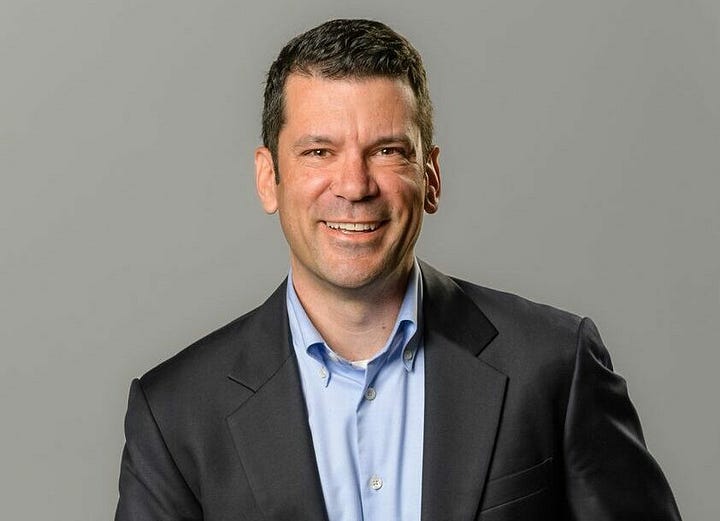
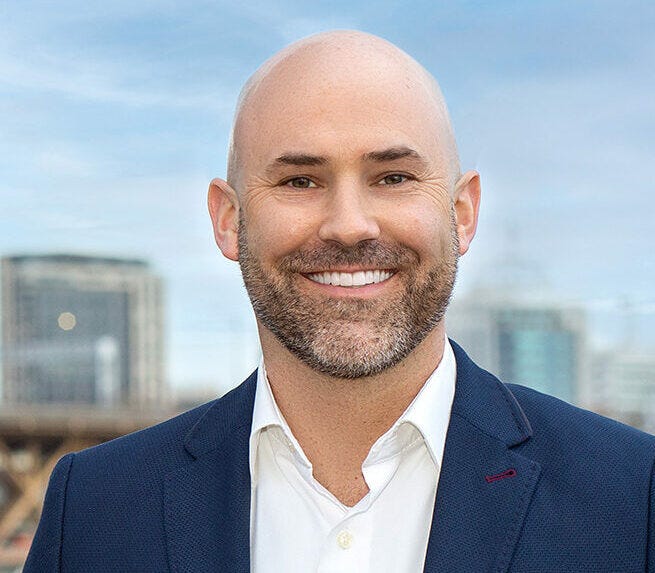
Eric Zimmerman Trades Campaign Trail for National Guard Duty
PORTLAND, October 31, 2024 — District 4 City Council candidate Eric Zimmerman is spending Election Week a bit differently than his fellow contenders—on duty with the Oregon National Guard. An army veteran and current chief of staff to Multnomah County Commissioner Julia Brim-Edwards, Zimmerman is trading door-knocking for a weeklong military planning conference at Camp Rilea on the Oregon Coast.
Zimmerman, a soon-to-be battalion commander, says he might drive back to Portland on Election Night to stop by a watch party or two. However, with many council races unlikely to be called until later in the week, he anticipates quietly monitoring his own results while attending to guard duties.
“I’ll probably have a smirk or a blank stare, depending on how things go,” he joked, explaining that military ethics require him to keep the results to himself. “We try to be super non-political in the Army… I imagine some people have no idea what I do in my civilian life.”
Celebrating 17 years with the National Guard this year, Zimmerman plans to make decisions about his future service after Election Day. National Guard service is structured to allow members to hold civilian jobs or attend school, and typically happens on weekends.
The Most “Portland” Endorsement Ever?
PORTLAND, October 30, 2024 — The Portland Psychedelic Society has entered the political arena by endorsing 11 candidates in Portland’s City Council. According to the organization, it is the first time a psychedelic organization has backed candidates for public office.
“Portland and Oregon are lands of firsts and bold solutions,” the organization posted on social media. “They understand the research and science, and they’re open to the idea that these naturally occurring medicines, when handled responsibly, are part of Portland’s recovery solution and must be protected.”
Endorsements were made by the organization’s newly established political arm, the Portland Psychedelic Society Action Fund. Each endorsed candidate reportedly agreed to consider supporting a ballot referral for “The Portland Psychedelic Health Act,” which the Action Fund aims to place on the November 2026 ballot.
Candidates who snagged the endorsement include Timur Ender in District 1; Michelle DePass, Mike Marshall, Elana Pirtle-Guiney, and Jonathan Tasini in District 2; Rex Burkholder and Jesse Cornett in District 3; and Mitch Green, Chad Lykins, Stanley Penkin, and Eric Zimmerman in District 4.
One Week Before the Election, 21 Candidates Have Raised Over $100,000
PORTLAND, October 29, 2024 — With Election Day just a week away, 21 city candidates have each surpassed the $100,000 fundraising threshold.
The group includes five mayoral candidates, led by City Commissioner Rene Gonzalez with over $309,000 raised, down to Liv Østhus with approximately $138,000. Each of these candidates has received the maximum $100,000 in public campaign financing available for mayoral contenders. Rene Gonzalez, Carmen Rubio, and Keith Wilson also benefit from spending by independent interest groups.
Among council candidates, District 3’s Tiffany Koyama Lane, a teacher and union organizer, tops the fundraising list with around $208,000, including $120,000 in public funds. Following her is City Commissioner Dan Ryan, who has raised over $196,000, with $80,000 from public financing.
Notably, though women make up just over 25% of the candidate pool, three of the top five fundraisers across all council races are women. Two of them, Tiffany Koyama Lane and anti-hunger advocate Angelita Morillo in District 3, are frequently seen campaigning together, urging voters to rank each other as their first and second choices.
Sarah Silkie Gets Warning, But No Fine, From City Auditor
PORTLAND, October 28, 2024 — The Portland City Auditor’s Office has issued a warning to the campaign of Sarah Silkie, a candidate running in District 4. Silkie’s violation involved a newspaper advertisement in a local newspaper called The Bee that failed to include disclaimers about the ad’s funding sources and major contributors.
However, since Silkie’s campaign self-reported the mistake with a note that it was unintentional, the Auditor’s Office simply issued a warning rather than a penalty.
Silkie, an engineer who works for the City of Portland, has received over 1,000 individual contributions and has raised over $76,000, including $40,000 in public campaign financing.
Carmen Rubio: We Need a Mayor Who Can Hit the Ground Running
PORTLAND, October 27, 2024 — As part of our effort to help you better understand your choices for mayor, we invited three frontrunners to join the Stump Talk podcast to discuss their platforms. Today, it’s City Commissioner Carmen Rubio’s turn. LISTEN TO THE EPISODE
Rubio took office in 2021, making history as the first Latina to serve on the Portland City Council. During her tenure, she has overseen the Parks Bureau, the Housing Bureau, the Planning and Sustainability Bureau, the Bureau of Development Services, and Prosper Portland, the city’s economic development agency.
A Focus on Housing and Community Policing
Rubio’s platform emphasizes housing production—she promises to establish a 90-day fast-pass permitting process for ready-to-go projects—and a public safety approach that includes community policing, focused on building relationships between patrolling officers and the communities they serve.
“Community policing brings that sense of connection for people,” says Rubio, who early in her career, served as a staffer to Mayor Tom Potter.
“Tom Potter was formerly the police chief who first ushered in true community policing for our city. And there was a notable and marked difference during that time compared to what we have now,” Rubio says, arguing that a similar strategy could improve safety and re-activate areas of the city where residents and businesses no longer feel safe.
Running on Government and Nonprofit Experience
Rubio, a government and nonprofit veteran, says no other candidate can match her experience in behind-the-scenes rallying and deal-brokering to push policy across the finish line. In addition to Mayor Potter, Rubio worked for Multnomah County Commissioner Serena Cruz and Portland City Commissioner Nick Fish and served as the Executive Director of Latino Network for over a decade. That experience, she says, gives her a unique outlook compared to her colleague Rene Gonzalez, who she feels sometimes disparages Portland’s nonprofit organizations.
“The language and rhetoric that I have heard from Rene Gonzalez characterizing these nonprofits makes me sad,” she says. “I’ve seen firsthand the incredible work that nonprofits do to bridge gaps, create a safety net, and, if not for them, no one would be serving some of our most vulnerable populations.”
Traffic Record Did Not Affect Ability to Lead
On the subject of her history of parking and traffic violations, Rubio says that while she regrets her record, she hopes voters will focus on her ability to lead despite personal failings.
“While these things happened before I was in office, they didn’t impact my ability to lead during that time. I was able to build and grow a multimillion-dollar nonprofit that is incredibly impactful on the thousands of people it serves every year,” she says.
“So I’m hoping voters can look at my policy accomplishments and the work I’ve been delivering on behalf of Portlanders and understand that the person who was able to do those things is running for office to create even more positive change for Portland.”
Rene Gonzalez: "We Can Return to Being One of the Safest Cities in the Nation."
PORTLAND, October 26, 2024 — As part of our effort to help you better understand your choices for mayor, we invited three frontrunners to join the Stump Talk podcast to discuss their platforms. Yesterday, we published our interview with Keith Wilson. Today, it’s Rene Gonzalez’s turn. LISTEN TO THE EPISODE
City Commissioner Gonzalez joined the Portland City Council in 2022, unseating Jo Ann Hardesty. His term, originally set for four years, was shortened to two due to the charter reform measure passed alongside his election.
During his time on the Council, Gonzalez has overseen the Fire Bureau, the Bureau of Emergency Communications, and the Bureau of Emergency Management. He points to passing Portland’s public drug use ban and reducing 911 wait times by 33% as his proudest accomplishments.
Often a polarizing figure, Gonzalez is running on a law-and-order platform, aiming to increase Portland’s number of sworn police officers to 1,000 and set on becoming the strictest mayor on the West Coast on public camping and drug use enforcement.
“I’m Actually Ambivalent on Jain Time for Camping”
“Somewhere along the way, the majority of my colleagues lost the stomach to just say, you cannot camp here,” he says, noting that state law includes an exception allowing tents to be removed without the standard 72-hour notice if criminal behavior is involved. Gonzalez believes the City is already within its rights to direct police officers to enforce this provision.
As for critics, such as his opponent Carmen Rubio, who has called his approach Draconian, Gonzalez pushes back. “I’m actually ambivalent on jail time for camping,” he says. “The City of Gresham doesn’t impose jail time, and they’re our neighbor with much less visible homelessness. They just make it clear you can’t camp there, and they’re not afraid to enforce simple code language.”
In this episode, Gonzalez also shares his views on why Prosper Portland, the city’s economic and urban development agency, needs reform and why he thinks Multnomah County’s deflection plan could harm Portland neighborhoods.
He also addresses the City Auditor’s finding that he violated campaign finance law by using city funds to edit his Wikipedia page during an election cycle and explains his readiness to work with council members who back the “Don’t Rank Rene” campaign if elected.
“You accept the outcomes of elections and find common ground where there’s common ground. That’s the beauty of democracy and the requirement for those who serve,” he says.
Keith Wilson: "We’re going to turn Portland around next year."
PORTLAND, October 25, 2024 — In the latest episode of our Stump Talk podcast, we chat with Keith Wilson, president of Titan Freight Systems and the founder of the nonprofit Shelter Portland, about his mayoral bid.
Wilson, who grew up poor in Northeast Portland and eventually developed a small family trucking business into a regional company focused on sustainable transportation, says his business background will make him view the city budget through a different lens than his competitors.
“I'll be a lot more fiscally responsible than our city's being right now,” Wilson says, referencing his twenty years of meeting payroll. “When you're in a private enterprise and you don't meet your budget—if you do that cycle for two or three years, you're out of business,” he says. “I think it's going to be a critical positive to address waste in the system.”
Wilson is most known for his campaign promise to end unsheltered homelessness within his first year as mayor, a plan he estimates will cost approximately $25 million—which he says is affordable compared to the $128 million the city spends on camp cleanups.
His strategy consists of three pillars: reopening Portland’s nighttime shelters, establishing day shelters to connect individuals with resources, and enforcing no-camping codes.
“The law states that you’re not allowed to enforce your no-camping codes unless you have a shelter available for every unsheltered person. That’s why we have to set up the shelters in that next year—so we can fully and completely enforce our no-camping codes,” he says.
“Tough love without love is just cruelty”
Wilson points to cities like Boston and Boise, which rely on nighttime shelters and have lower rates of unsheltered homelessness, as models for Portland. While Wilson says “the threat of arrest” will be an option, he hopes arrests won’t be necessary. “Tough love without love is just cruelty,” says Wilson, whose brother suffers from behavioral health issues and addiction, and faced homelessness as a result.
“I had the ability to care for Carl. I'm his trustee. He’s cared for, and he’s housed right now. But what about all the brothers and the sisters and the mothers and the fathers who don't have my means?” Wilson says. “We’re not going to let people suffer and die on the streets anymore.”
While Wilson’s campaign has gained significant momentum in recent weeks, his vision has also received fierce pushback, particularly from his mayoral rival Rene Gonzalez, who at a recent forum called Wilson’s plan a “cheap model” that would bring crime and chaos to neighborhoods.
Tomorrow, we’ll post the Gonzalez interview, and on Sunday, Carmen Rubio’s.
District 1 Candidates Elaborate on What Sets Them Apart
PORTLAND, October 25, 2024 — In a candidate survey circulated by City Club of Portland, candidates answered the question of what sets them apart from other contenders.
Below are the responses from District 1’s frontrunners. In this district, which has the fewest candidates, we defined frontrunners as those who have qualified for public campaign financing and secured significant support from organizations and elected officials.
Please note that all candidates did not return the questionnaire.
Candace Avalos (Climate and Community Safety Advocate)
As a first-generation “Blacktina” with roots in Black American and Guatemalan immigrant communities, my experiences growing up in a multiracial family and working in advocacy have made me a leader who understands the issues facing all Portlanders. I’m running to bring a much-needed voice that reflects our city’s diversity and values. What sets me apart is my track record of bridging gaps and creating equitable policies. From my time as an educator mentoring students, to my role as Executive Director of an environmental justice nonprofit, and my service on many boards and commissions, I have a deep understanding of the challenges our city faces. Over 150 organizations, elected officials, and individuals have endorsed my campaign.
Jamie Dunphy (Music Advocate and Former City Hall Staffer)
I have a unique combination of deep lived experience in this community, and a proven track record of getting meaningful results out of complicated government systems. Portland cannot afford to have the new City Council learn on the job. I have been in public service for more than 20 years, including more than ten years working for two of our region’s best elected officials. I spent five years working for US Sen. Jeff Merkley, focused on housing, education, and Social Security, and five years as Senior Policy Director for Portland City Commissioner Nick Fish. I am intimately familiar with Portland’s unique and dysfunctional system of government, and how to advance complicated and nuanced public policy to deliver real results for Portlanders.
Timur Ender (Attorney, Transit and Biking Advocate)
I am one of the few candidates in this race who:
who has experience aligning infrastructure funding to meet the needs of East Portland.
has managed scope, schedule, budget, and risk for multimillion dollar budgets and stood up major city programs such as fixed speed safety cameras, bike share, and the fixing our streets program.
in a district of 100 languages represented, speaks a language other than English at home (Turkish).
is a parent of three young kids, including a child in the foster care system.
is the first in my family to be born in the U.S..
is a resident in a neighborhood with high rates of gun violence (Hazelwood).
has served as a volunteer legal aid attorney for families fleeing gender-based and political violence.
Terrence Hayes (Small Business Owner and Public Safety Advocate)
I am different from the other people running in District 1 because I am willing to have hard conversations and speak harsh truths that aren’t popular with everybody. Portland is on an upward trajectory again, but we will stagger if we don’t have someone like me championing both the Black community’s true needs as well as the true needs of East Portlanders. We have to truly understand why this district has felt left out so long, and it’s not because we don’t have enough bike lanes. People in East Portland want to feel safe, and they want their kids to be able to afford to live here when they grow up. That’s why my campaign slogan is ‘clean, safe and affordable’ because that’s what all Portlanders want.
Steph Routh (Sustainability, Transit and Biking Advocate)
I understand what it has felt like to be a small business owner and manage a business impacted by COVID. With my former business, the Portland Underground Grad School, we leased an event space in January 2020 and had to pivot in a way that fundamentally changed our operations. While I was interim executive director at the Community Cycling Center, our bike shop was broken into and the back door destroyed. Additionally, I have a 20-year track record of bringing diverse stakeholders together through my work on housing and transportation. As a commissioner and former chair on the Planning & Sustainability Commission, I have developed a deep knowledge of housing and land use policy, which is a unique expertise among my colleague candidates.
District 2 Candidates Elaborate on What Sets Them Apart
PORTLAND, October 24, 2024 — In a candidate survey circulated by City Club of Portland, candidates answered the question of what sets them apart from other contenders.
Below are the responses from District 2’s frontrunners. In this district, where 17 candidates have qualified for public campaign financing, we defined frontrunners as those who have secured meaningful support from organizations and elected officials, and who have raised at least $20,000 in contributions not including the public match.
Please note that all candidates did not return the questionnaire.
James Armstrong (Small Business Owner)
I’ve proven myself as a leader in our community by growing three successful small businesses within my district, all of which continue to thrive and expand. I led Alberta Main Street and co-founded the St. Johns Safety & Livability Committee. As an advocate for local businesses, I understand the nuances of operating in our current environment. I also understand the importance of responsible city spending and, as a forensic accountant, I have the expertise to analyze complex financial issues and investigate the misuse of public funds. My experience positions me to tackle our city’s challenges and deliver real results for our residents.
Michelle DePass (PPS Board Member and Sustainability Advocate)
I was born and raised in District 2. I attended local schools, including PSU (BS, Community Development, School of Urban Studies). I pursued an MBA in Sustainable Business at Bainbridge Graduate Institute, founded by Gifford Pinchot the 3rd in the Puget Sound. I am currently serving as Vice Chair of the Portland Public Schools Board of Education, so I have experience making decisions in a high stakes, collaborative, decision making model. I am an environmentalist who understands the role of government and that government is not a business. I know how to ski uphill, as evidenced in an Oregon Field Guide episode, and I was endorsed by Governor Kate Brown, and Jane Fonda.
Mariah Hudson (Neighborhood and Sustainability Advocate)
What sets me apart is my ability to operationalize our compassion and get things done with urgency, vision, and accountability. As a leader at OHSU, I coordinated across agencies to during the pandemic, showing that I can implement large-scale solutions in crisis. I’ve led grassroots efforts, like organizing to open shelters and fighting air pollution, while also serving as budget chair for the Portland Bureau of Transportation and PPS, where I focused on making public dollars work harder. I’m ready to lead with urgency to make Portland safer and more affordable, using my experience to deliver real, measurable results for our community.
Debbie Kitchin (Small Business Owner)
As a small business owner in the housing industry for 30 years, plus 18 years in the public sector as a regional economist, I have a unique combination of experience and perspective on how our city can improve. I’ve been part of the startup of a brand new government agency. I understand the importance of public-private partnerships for collaborating and solving problems. I bring years of leadership and collaboration to organizations ranging from the Energy Trust of Oregon to the Portland Metro Chamber to the SE Quadrant Stakeholder Advisory Committee for the City’s Comprehensive Plan. I served on the Charter Commission, so I understand our local reforms and how local governments operate throughout the country and world.
Mike Marshall (Recovery Advocate)
I am person in longterm recovery from addiction. I know what it takes to move people off the streets and into recovery. Additionally, I have a long history of tackling large challenges (democracy, marriage equality, addiction), identifying solutions and mobilizing broad coalitions to solve big problems. Our new city council will need folks like me, who understand the need for decisive consensus, to lead from behind and move rapidly to reverse the city’s fortunes. I’d be honored to have your #1 vote.
Tiffani Penson (City Hall Veteran and PCC Board Member)
I was raised and am rooted in Portland and still live in my family home. My father had a barbershop on what is now Martin Luther King Jr. Blvd. that became a place where community gathered to share stories while waiting for the perfect haircut. My mother retired early from Pacific Northwest Bell and became a realtor, helping families find their forever homes. They instilled in me both a commitment to community and a sense of urgency to get things done. I’ve been elected twice to the PCC Board and served on several community organization boards, achieving milestones that improve the lives of children and families. I will bring my lived, professional and volunteer experience to the City Council to achieve real results for all Portlanders.
Elana Pirtle-Guiney (Union Organizer and Former Kate Brown Staffer)
I’ve worked in advocacy and policy development, at the nexus of legislative and executive branches, for almost twenty years in Oregon. I started my career in organizing and advocacy with labor unions, building coalitions with nonprofits in our city. I worked for Gov Kitzhaber and Gov Brown as a Policy Advisor. I served as Gov Brown’s Legislative Director during Republican walkouts, budget cuts, COVID-19, and racial justice protests. I want Portland’s new Government to work – to create the culture change we voted for. I believe in Portland’s future – a future where we lead with equity, sustainability, and affordability, front of mind. I bring the experience to get to work on day one, but also a fresh perspective from outside City Hall.
Dan Ryan (Portland City Commissioner)
I have served through the most challenging four years of our city’s history and stood strong and calmly delivered common sense decisions and pragmatic action. My track record speaks for itself—leading initiatives like Safe Rest Villages, fixing our broken permitting system, advocating for balanced public safety reforms, and calling out misuse of funds. I don’t just talk about solutions—I implement them. With my deep connections in this community, I know how to get things done. Portland needs leaders focused on pragmatic solutions, transparency, and collaboration—not catering to special interests. This is my hometown, and I will keep fighting for her.
Bob Simril (Private Sector Executive and Community Advocate)
What sets me apart is my enterprise mindset & private sector experience at companies like Coca-Cola, Microsoft, and Tony Robbins. I would bring an enterprise mindset to create a more streamlined, accountable and effective city government. I specialize in solving large-scale problems through collaboration and accountability. In business, performance is non-negotiable—you either deliver or you’re out. I’ll bring that same drive to city government. Growing up in the projects outside Compton as a Black kid with a white mom taught me the power of persistence and communication across diverse communities. I’m uniquely positioned to connect with District 2’s wide range of social, economic, and racial diversity, listening and addressing their needs.
Nat West (Former Cider Entrepreneur and TriMet Driver)
My extensive experience as the founder of Reverend Nat’s Hard Cider connects me with the small business community – the heart and soul of Portland’s economy. Being a TriMet bus driver, gives me a unique perspective on the city’s unsafe roads. I pride myself on being a collaborator and working across differing views, including in this Council race, where I’m seen as the leading collaborative candidate city-wide. With the most small donations in his race and strong community involvement, my platform reflects the interests of everyday Portlanders, not wealthy elites or business lobbyists.
District 3 Candidates Elaborate on What Sets Them Apart
PORTLAND, October 24, 2024 — In a candidate survey circulated by City Club of Portland, candidates answered the question of what sets them apart from other contenders.
Below are the responses from District 3’s frontrunners. In this district, where 10 candidates have qualified for public campaign financing, we defined frontrunners as those who have secured meaningful support from organizations and elected officials, and who have raised at least $20,000 in contributions not including the public match.
Please note that all candidates did not return the questionnaire.
Rex Burkholder (Former Metro Councilor, Sustainability Advocate)
With over a decade of service on the Metro Council, I have the most experience in governing — setting priorities, shaping budgets, working collaboratively with diverse partners and the community. Accomplishments: I have 40 years of making positive change in this city, region, and state. Launching the bicycle revival in Portland, Oregon, and nationally; integrating sustainability into the region’s long range plan as a co-founder of the Coalition for a Livable Future; getting regional partners to include climate change and equity into the region’s transportation plans and funding decisions; Leading a statewide effort to successfully fund Outdoor School for all students. Skills: Collaboration, inclusion, inspiration, innovation
Jesse Cornett (Recovery Advocate)
What sets me apart from other candidates in my district is my deep and personal understanding of the key issues facing Portland. From my lived experience with housing instability and homelessness to my work at Oregon Recovers and as an advocate for addiction treatment, I bring firsthand insight into the challenges many Portlanders face. I’ve spent nearly two decades in public service, electoral politics, and policy, with a proven track record of securing funding and leading complex initiatives. My collaborative, results-oriented approach emphasizes practical solutions, and I’ve consistently prioritized budget transparency and accountability.
Daniel DeMelo (Fovernment Accountability Advocate)
I count: Everyone says we need more homeless services; I say we specifically need 3k new shelter beds. Everyone says we need to fix public safety; I say we specifically need to fill the 80 already-funded officer positions and improve 911 response times from 37%-in-compliance to over 95%. And I have an unprecedentedly diverse coalition: I’ve earned the support of our Portland Street Response EMTs, Firefighters, 911 operators, and Police Officers; business groups like United for Portland and Revitalize Portland; homebuilders like Multifamily NW and PMAR; progressive organizations like Progreso Latino, LGBTQ+ Victory Fund, Run for Something and 314 Action; and countless elected officials including Sam Adams, Dan Ryan and Dr. Sharon Meieran.
Tiffany Koyama Lane (Teacher and Union Organizer)
Early in the campaign I went to an event where city administrators from across the country shared their experiences of government transition. They were asked what kind of leaders succeed in this form of government and every one of them talked about city council members who were curious, open-minded, and collaborative. I am coming at this as a labor and community organizer and someone who works in a field where you literally have to work with everyone. You cannot turn anyone away from a public school. My work in my union has also given me a lot of experience with moving through conflict to find consensus. Making plans is one thing, but getting people to work together is another, and it requires a certain temperament and a lot of experience.
Angelita Morillo (Anti-Hunger and Houseless Community Advocate)
I am the best candidate because in a race with nearly 100 candidates running, I am one of only immigrants and women of color in a field that is over half white men. Additionally, I am one of the only candidates to have experienced unsheltered homelessness. I have never owned a car and am a lifelong transit user; I am a first-generation college student, and I am also one of the youngest candidates in the race despite having six years of experience in policy and government work. I have worked with state agencies, grassroots communities, and the state legislature to create policies that help working people. I know what it takes to work with people who aren’t like me while also holding ourselves accountable to the community we vowed to serve.
Steve Novick (Former City Commissioner)
As a former Commissioner, I have experience getting things done at City Hall, and the humility that comes with experience. I know I don’t have magic silver-bullet answers to the city’s biggest problems, but have the patience and commitment to identifying practical, realistic things we can do that will move the needle.
District 4 Candidates Elaborate on What Sets Them Apart
PORTLAND, October 24, 2024 — In a candidate survey circulated by City Club of Portland, candidates answered the question of what sets them apart from other contenders.
Below are the responses from District 4’s frontrunners. In this district, where 13 candidates have qualified for public campaign financing, we defined frontrunners as those who have secured meaningful support from organizations and elected officials, and who have raised at least $20,000 in contributions not including the public match.
Please note that all candidates did not return the questionnaire.
Olivia Clark (Legislative Veteran and Neighborhood Advocate)
I am the most experienced candidate running in District 4 with a record of success in Oregon’s local, regional and state governments. The Oregonian newspaper recognized this and endorsed my candidacy. Whether in housing, transportation, environmental protection or state-local relations, I have a portfolio of achievement that has benefited the people of Portland and Oregon. I am a coalition builder, a strong partner and work well across the aisle. I have chaired and led several large boards including the Oregon Providence Health System where I brought forward policies on quality and equity in care. I learned the value of hard work by working in my family’s small business and I am ready to apply all my skills at Portland city hall.
Mitch Green (Economist and Environmentalist)
I’m serious about creating a care economy for Portland and leading with compassion and skill. I can engage people across all generations, socioeconomic statuses, and viewpoints. As a PhD economist with more than a decade at Bonneville Power Administration, where I have worked to ensure we can keep the lights on for the entire region while being good stewards of public resources, I have the experience to help move my peers, make the economic case for public investments, and collaborate to get things done. I know how to evaluate with rigor the costs involved in budget tradeoffs, particularly for program areas that have high return on investment but lack representation.
Ben Hufford (Architect and Housing Production Advocate)
I’m a successful architect because I know how to build places where people want to be. My ability to solve challenging problems, make the most out of limited funds, and work with diverse viewpoints to achieve results on a timeline. I will bring the critical experience required to solve Portland’s urgent need for housing. And, to fix any of our problems we need to stop electing politicians who just want to BE something and start electing people who want to DO something. I have set aside my architecture practice to commit to making measurable progress for the city I love, not just generate more talk.
Chad Lykins (Chess Club Owner and Policy Expert)
I understand policy and taught leaders from all over the world how to be better policy makers. I have a breadth of perspective that we don’t always get in local politics. I know this district best because I’ve taught hundreds of families and knocked on thousands of doors in each and every neighborhood. I have the highest percentage of donations from Portlanders and from D4 residents. I hear people say they don’t have a voice in city hall. Whether it is citing homeless shelters, Alpenrose, traffic safety – I’ll be the councilor who listens. My campaign is strong enough to take the bullies who keep saying that our values are our problem. We’re showing that our values bring us together to accomplish great things.
Tony Morse (Labor and Recovery Advocate)
As a person in long-term recovery with substantial legislative experience, I offer District 4 a unique combination of lived experience and professional experience to effectively lead in our new form of government. I’m endorsed by 28 elected officials, and nearly 30 organizations, including 21 unions, several business groups, and folks focused on improving housing affordability and public health. These organizations represent over 100,000 people, and our broad-based coalition includes Firefighters, Police Officers, Construction Workers, Small Business Owners, and Portlanders working hard to create a more livable city. My broad-based support shows I know how to form effective coalitions and can deliver results for Portland.
Stan Penkin (Neighborhoods and Arts Advocate)
I have a proven track record of building consensus among diverse groups, which is essential for effective governance. My endorsements from all four City Commissioners demonstrate my ability to work collaboratively across differing priorities and styles. I approach contentious issues with a calm, professional demeanor, allowing for productive dialogue and understanding. My seven years as President of the Pearl District Neighborhood Association exemplify my dedication to community engagement; my door was always open to constituents and fellow board members. I believe that listening to opposing views can lead to innovative solutions and improved outcomes for our city.
Bob Weinstein (Former Ketchikan, AK, Mayor)
1. Proven leadership: As a former school superintendent and four-term mayor, I have demonstrated effective leadership and a deep commitment to public service, which informs my approach to policy-making and governance. I have a proven track record of bringing people from diverse backgrounds together to find common ground solutions using a pragmatic approach, not an ideological one.
2. 30 years of public budgeting experience.
3. Constituent work: In my 18 years of experience as an elected city official and 6 years as staff for U.S. Senator Mark Begich, I learned that constituents have many important reasons to contact their elected officials. And that they expect a response from their elected representatives.
Eric Zimmerman (Chief of Staff to County Commissioner Julia Brim-Edwards)
At a time when we need the County and the City working together on our most challenging problems, I am the only person who has worked in both governments and helped bring about some of our most successful partnerships. I helped initiate and open the large pod shelters known as TASS, our most successful shelters. I helped secure funding for Bybee Lakes when the County wanted to let 175 shelter beds close. I helped stop the foil and straw program for fentanyl users and I started the downtown recovery and clean up programs. My accomplishments in the district are unmatched and my experience has shown I can deliver on tough issues. I’m also one of the three candidates to be endorsed by the Oregonian. Labor, business, public safety all support me.
Gonzalez Pushes Back Against Campaign Finance Violation Decision
PORTLAND, October 23, 2024 — In an interview with Rose City Reform, City Commissioner Rene Gonzalez sharply criticized a decision by the City Auditor’s Office that fined his campaign $2,400 for violating Portland’s campaign finance law.
The decision followed the Auditor’s conclusion that Gonzalez had accepted an illegal campaign contribution by spending $6,400 in city resources to edit his Wikipedia page, with the edits allegedly highlighting his Democratic Party affiliation during an election cycle.
While the unlawful contribution was valued at $800, the Auditor’s Office levied a civil penalty of $2,400 against the Gonzalez campaign—three times the value of the contribution—stating that Gonzalez had attempted to interfere with the investigation by seeking the removal of Deputy City Auditor Reed Brodersen from the case, claiming he was politically biased.
“I strongly disagree with the characterization of interference,” Gonzalez said, reiterating concerns about a conflict of interest involving Brodersen’s past romantic relationship with Andrés Oswill, the board chair of Portland For All, the group that brought the complaint against Gonzalez. The group supports Gonzalez’s opponent, Carmen Rubio. “This absolutely should have been disclosed to us, to the public, to any other public entity that was involved,” Gonzalez said.
In a statement explaining the reasons for the finding, the Auditor’s Office called Gonzalez’s claims about political bias “baseless” and “irrelevant,” and stated that he was treated fairly at all times during the investigation.
Objections Raised to Protect Right to Appeal, Gonzalez says
Gonzalez noted that he raised the issue of a conflict of interest to protect his right to appeal. “If I don’t raise it now, then I might be deemed to be waiving that argument on appeal. So I had no choice but to raise it,” he said. “To go down that path by the Deputy Auditor in their statement seems to be trying to intimidate future people who might ever raise the possibility of conflicts in the Auditor’s Office.”
Gonzalez explained that city staff worked with a consultant to request eight edits to the Wikipedia page and that the edit regarding his party affiliation was suggested by the consultant, not made in consultation with his campaign. “I’m ultimately responsible for what happens on both sides, so I don’t want to wash my hands of that. But when this is just one of eight requests and not even one that we originated, I just don’t see how that can be a contribution,” he added.
Notably, the requests were submitted to Wikipedia by Gonzalez's policy advisor, Harrison Kass, who is running for a seat in District 3.
Candidates Show Interest in Reforming Portland’s Noise Code
PORTLAND, October 23, 2024 — A survey circulated among city candidates by the music advocacy group Music Portland showed strong interest in reforming Portland’s noise code to protect music venues.
Currently, there are two conflicting city noise codes: Title 18, which sets specific decibel limits for different zones and times of day, and Title 14A.30, a nuisance code that gives police officers discretion to enforce noise violations based on a "plainly audible" standard. According to Music Portland, the latter code has a history of harming the music industry, particularly BIPOC-owned venues, which it says are more likely to receive complaints regardless of noise level. The group advocates for repealing Title 14A.30 and adopting Title 18 as the consistent standard for noise control.
Calls to Repeal the "Plainly Audible" Standard
Among the 32 candidates who returned the survey, most said they supported repealing the “plainly audible” standard.
“When you look at the data, it's no coincidence that the types of noise complaints that are most subjectively enforced against involve music with heavy bass and drums and is enjoyed by Black and brown audiences,” wrote District 1 candidate Jamie Dunphy, a live music advocate who serves on the board of Music Portland. “If elected, I will introduce a repeal of 14A.30 within the first 60 days of being in office,” he added.
Dunphy’s stance was echoed by District 2 candidate and OHSU communications specialist Mariah Hudson, who noted personal experience of observing unfair enforcement practices.
“As chair of the Northeast Coalition of Neighborhoods, I worked with noise control officers on complaints, many of which were directed at longstanding businesses and BIPOC owners, including Solae's on Alberta. Having an objective standard and noise control officers helped us support these cultural hubs and determine the neighbors' complaints were unfounded,” she wrote.
Mayoral candidates Keith Wilson and Liv Østhus also said they supported repealing the “plainly audible” standard, while Carmen Rubio said her office had explored amendments to the code that gives police officers discretion, an effort that resulted in no code changes.
“We are still very much in favor of working towards finding a solution to ensure that no code can ever again be used to target music venues. When I am mayor, I will then have authority to find a path forward,” she wrote.
Live Nation’s Entry Raises Concerns Among Candidates
An overwhelming majority of candidates also expressed misgivings about global entertainment giant Live Nation and its ticketing subsidiary Ticketmaster coming to Portland.
“For 14 months as a candidate, I’ve been clear in saying that I will oppose companies like Live Nation and Ticketmaster from entering our marketplace, where they would undoubtedly damage the local music ecology and stifle the independent spirit that makes Portland such a special place to live,” wrote District 3 candidate and recovery advocate Jesse Cornett, whose candidacy is endorsed by the band Pearl Jam.
Mayoral candidates Keith Wilson and Carmen Rubio were less definitive.
“We will not tolerate near-monopolies or anti-competitive practices that exploit consumers, workers, or artists,” wrote Wilson, who owns a sustainable trucking company. “I believe Live Nation can operate here, but I expect they will feel Portland's values reflected in the marketplace,” saying he would support the ongoing efforts of the DOJ and Department of Commerce in their antitrust suits against Live Nation and Ticketmaster.
City Commissioner Carmen Rubio, who recently voted to reject Music Portland’s appeal against Live Nation’s 3,500-seat concert hall in the Central Eastside, said the council had no influence over Live Nation’s entry into the market.
“Although business practice agreements were outside the bounds of the [City Council’s] decision, in a separate decision I was proud to have pushed to ensure that those publicly made operating commitments to the music community were put in writing as part of the Purchase and Sale Agreement before council took this land use vote,” Rubio wrote.
The original approval was made by a Hearings Officer, a city-appointed official responsible for making decisions on specific types of land use applications.
What Happens If I Only Rank Two Candidates?
PORTLAND, October 22, 2024 — Lately, I’ve been hearing from readers asking: what happens if I only rank two candidates in a three-seat council race? It’s a good question, and it’s important to understand how your vote will count under Portland’s Single Transferable Vote (STV) system.
The simple answer is that with STV, you’re casting a single vote, not three. The rankings on your ballot reflect your preference order—they don’t mean you have multiple votes to cast.
One Vote, Not Three
Your vote always starts with your first choice. That’s why the first ranking is the most important, and you should always rank your favorite candidate number one.
If your first choice is eliminated in a runoff round (when not enough candidates reach the 25%+1 vote election threshold), your vote moves to your second choice.
Additionally, there’s a scenario where your single vote can help two candidates at the same time. If your first choice wins with surplus votes—meaning they get more than the 25%+1 required to win—a fraction of your vote is transferred to your second choice. In total, however, you are still casting just one vote. If you’re curious about how this works, we made a video about it.
Consider Maximizing Your Influence
If you rank two candidates, there’s a good chance your vote can transfer if your first choice is either eliminated or elected with a surplus. However, in a scenario where your second choice has either already been elected or eliminated, your vote cannot count for that candidate. In that case, the system will look for a lower preference, but if you don’t have one, your vote will no longer influence the outcome.
So, while ranking two candidates is not a bad choice—you should only rank candidates who you support—adding more rankings gives your vote more flexibility to move through your ballot and remain influential. If that inspires you to research more choices, you know where to go: Rose City Reform.
Candidates Reveal Alliances At District 2 Forum
PORTLAND, October 21, 2024 — At a recent District 2 forum, council candidates were asked to share who they’d like to see serve alongside them in the district office. Despite the awkwardness of the moment, many candidates were candid about their choices, and several signaled mutual alliances.
Marnie Glickman, a political strategist, selected Sameer Kanal, a project manager for the City of Portland, and Jonathan Tasini, a union organizer. Both Kanal and Tasini reciprocated by picking Glickman and also choosing each other.
Mariah Hudson, a communications manager for OHSU, selected City Commissioner Dan Ryan and Elana Pirtle-Guiney, a former policy advisor to Governors Kate Brown and John Kitzhaber. Ryan reciprocated by choosing Hudson, along with Tiffani Penson, a manager for the City of Portland. Penson also chose Ryan but not Hudson—opting instead for Elana Pirtle-Guiney, stating that Ryan and Pirtle-Guiney have the experience to pass policy.
“You can have an idea, but can you turn it into policy?” Penson said. “Can you count to seven? I can count to seven. This city raised me,” added Penson, who has nearly two decades of experience working for the city.
Elana Pirtle-Guiney selected both Tiffani Penson and Jennifer Park, who runs an educational nonprofit.
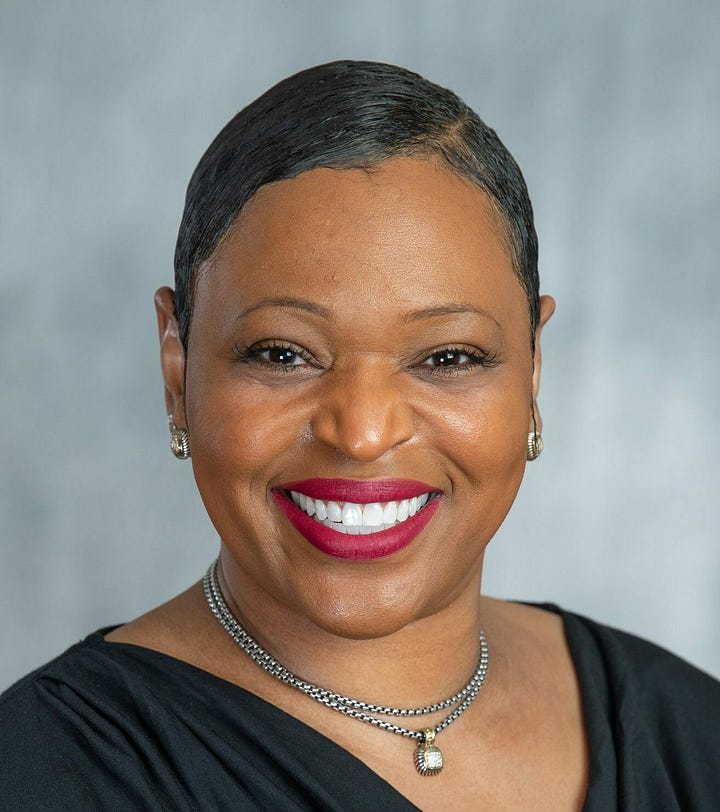
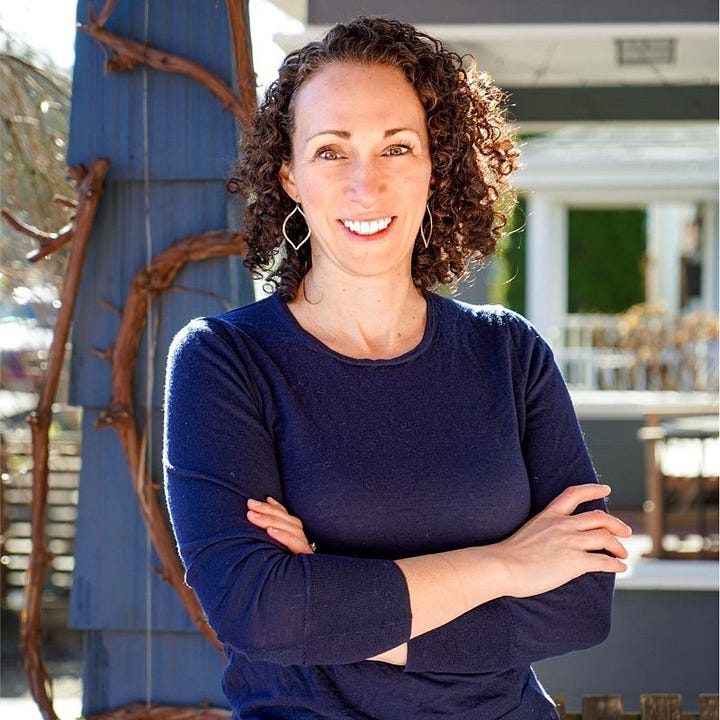
Gonzalez Fined for Violating Campaign Finance Law, Accuses Auditor’s Office of Bias
PORTLAND, October 21, 2024 – City Commissioner Rene Gonzalez violated Portland's campaign finance law by using city funds to edit his Wikipedia page, according to a decision from the City Auditor's Office. Gonzalez’s campaign has been fined $2,400 after the office determined that $6,400 in city money was improperly used to make edits emphasizing his Democratic Party affiliation.
The investigation began after an August 2024 complaint accused Gonzalez of using public funds to edit his Wikipedia page during his mayoral campaign. Initially, the Auditor’s Office did not find enough evidence to issue a violation, but new evidence led to a different determination.
“The Wikipedia edit about Gonzalez’s status as a Democrat is directly tied to his campaign and has nothing to do with City business,” the Auditor's Office said.
The statement also noted that Gonzalez attempted to interfere with the investigation, pressuring the City Auditor to remove a staff member from the case and making “unsubstantiated” claims of political bias. Gonzalez alleged bias due to a connection between the Chief Deputy Auditor and the complainant, noting that the complainant serves on the board of an organization where the Chief Deputy Auditor’s former romantic partner is involved. This organization has been vocal in opposing Gonzalez, leading him to suggest the investigation was politically motivated.
Green and Lykins Reach Second Public Financing Tier
PORTLAND, October 19, 2024 –District 4 candidates Mitch Green and Chad Lykins have unlocked the second tier of Portland’s public campaign financing by securing 750 individual contributions from local residents. Both candidates have now received two rounds of public financing, totaling $80,000 per campaign.
Green, an economist and environmentalist, has raised nearly $110,000, while Lykins, a college professor turned chess club owner, has raised over $122,000. These totals include their taxpayer-funded financing payouts. Both candidates have garnered support from multiple labor unions, progressive groups, and elected officials, and offer ambitious policy proposals focused on expanding supportive services and increasing housing and shelter options.
Portland’s public campaign financing program matches donations of up to $20 at a 9-to-1 ratio, meaning a $20 contribution results in $200 for the candidate. Mayoral candidates can raise up to $100,000 through the program, while city council candidates can receive up to $120,000.
Thirteen candidates in District 4 have qualified for public financing. Most have secured one round of up to $40,000, while three—Green, Lykins, and former TriMet director Olivia Clark—have qualified for $80,000.
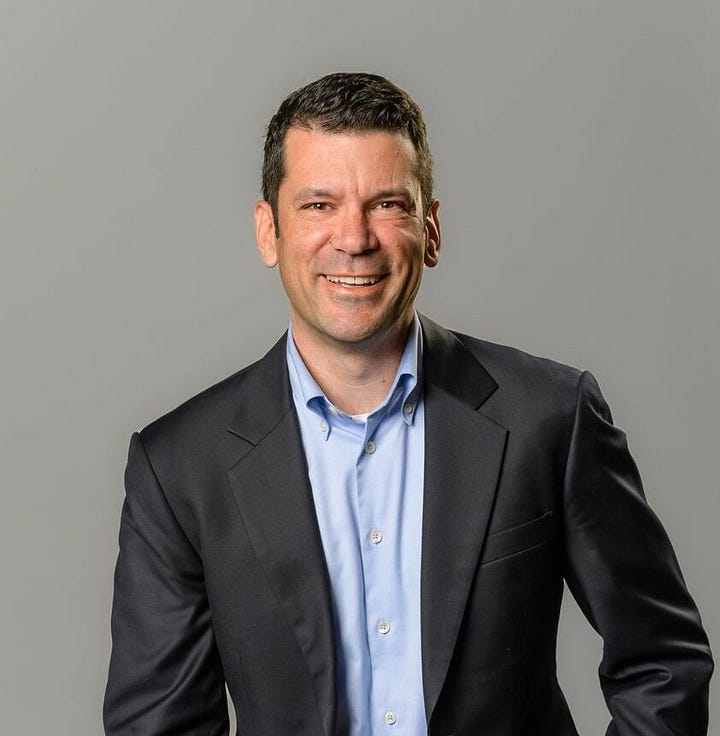
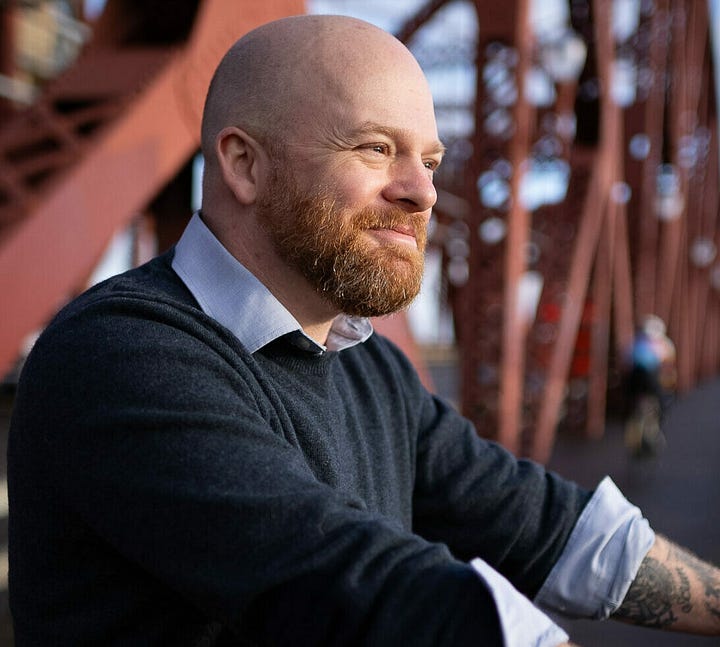
Dan Ryan: City Should “Burst the Status Quo” and Exit Joint Office of Homelessness Agreement
PORTLAND, October 18, 2024 – In a letter to supporters, City Commissioner Dan Ryan outlined his reasons for wanting to end the city’s current homeless services agreement with Multnomah County. Along with colleagues Rene Gonzalez and Mingus Mapps, Ryan on Wednesday asked the City Attorney to draft an ordinance to dissolve the agreement, allowing it to appear on the agenda before their terms expire at the end of the year.
“It isn’t improving Portlanders’ ability to access our public spaces, and it isn’t creating measurable, net gains that demonstrate we are making progress on homelessness in Portland,” Ryan said about the current agreement.
Ryan, who is running for a council seat in District 2, criticized the county for not spending enough Metro Supportive Housing Services (SHS) dollars on shelters with services, such as the Safe Rest Villages, which he helped usher in during his tenure as the commissioner in charge of the Housing Bureau from 2021 to 2023. The SHS tax, approved by voters in 2020, is a regional tax on high-income earners and large businesses, designed to fund homelessness services like rent assistance, addiction and mental health support, and shelters with services.
In the letter, Ryan referenced his late brother, who struggled with homelessness and addiction.
“I was called to service in 2020 because my brother died on our streets—Tim died because there were no services for someone like him experiencing a behavioral health crisis,” Ryan wrote. “It is time to burst the County’s insular Housing First bubble and reset our relationship with a commitment to action and demonstrable results that meet Supportive Housing Services taxpayers’ expectations—like fully funding shelters with services.” he wrote.
It’s still unclear when the ordinance will appear on the council’s agenda. City Commissioner Carmen Rubio has indicated that she will oppose the proposal to withdraw from the agreement.
BIPOC and Progressive Table Launches Campaign
PORTLAND, October 17, 2024 – A table of community-based organizations serving Black, Indigenous, and other people of color (BIPOC), along with progressive groups, has launched a campaign promoting its endorsement slates for Portland’s city races.
Featuring both mailers and an online voter guide, the campaign is convened by Building Power for Communities of Color, the political arm of the Coalition of Communities of Color, a nonprofit that spearheaded the public input process for Portland’s charter reform measure and later led the successful campaign to pass it on the 2022 ballot.
“We know that to realize the potential of the voter-approved charter changes, voters need thorough information about the candidates running to represent them,” said Jenny Lee, Managing Director of Building Power.
The voter guide, funded by the Portland Voter Guide PAC, urges voters to rank City Commissioner Carmen Rubio as their first choice for Portland mayor. Notably, it discourages support for City Commissioner Rene Gonzalez, claiming he “represents everything that’s broken about Portland politics.”
In District 1, the PAC has endorsed sustainability advocate Candace Avalos, transit and biking advocates Steph Routh and Timur Ender, and music advocate Jamie Dunphy.
For District 2, the PAC backs Portland Public School Board member Michelle DePass, Tiffany Penson and Sameer Kanal, both holding leadership roles within the City of Portland, and Nat West, a cider entrepreneur.
In District 3, the PAC endorsed teacher and union organizer Tiffany Koyama Lane, anti-hunger advocate Angelita Morillo, and former City Commissioner Steve Novick.
For District 4, the endorsed candidates are economist and environmentalist Mitch Green, Rose City Chess founder Chad Lykins, and City of Portland manager Lisa Freeman.
The PAC also provides information for additional candidates and does not discourage voters from ranking any City Council candidates.
In addition to Building Power for Communities of Color, supporting organizations include APANO Action Fund, Color PAC, Latino Network Action Fund, Next Up Action Fund, Oregon Chapter of the Sierra Club, East County Rising, and others. According to filings with the Oregon Secretary of State, the Portland Voter Guide PAC has raised approximately $160,000.
Willamette Week Endorses Wilson for Mayor, Offers Six Suggested Rankings for Each District
PORTLAND, October 16, 2024 – The Willamette Week has unveiled its 2024 city endorsements. In recognition of Portland's new voting method, ranked-choice voting, the organization provided their top three picks for mayor and six ranked candidates for each city council district.
Willamette Week’s choice for mayor is trucking executive and Shelter Portland founder Keith Wilson, who they said was the only candidate to offer an acceptable plan to address homelessness. They also suggested voters rank City Commissioner Carmen Rubio second and her colleague Rene Gonzalez third.
In District 1, Willamette Week’s top pick is Jamie Dunphy, a live music advocate and former policy director for late City Commissioner Nick Fish. They recommended voters rank Candace Avalos, a sustainability and criminal justice advocate, second, and transportation advocate Steph Routh third. Their fourth choice was Radio Cab supervisor Noah Ernst, followed by neighborhood advocate and Centennial school board member David Linn in fifth. Former County Commissioner Loretta Smith secured the sixth and final ranking.
In District 2, Willamette Week’s top pick was labor organizer Elana Pirtle-Guiney, followed by City Commissioner Dan Ryan. Portland Public School Board member Michelle DePass secured the third spot, while small business owner and forensic accountant James Armstrong was ranked fourth. Recovery advocate Mike Marshall took the fifth position, with Mariah Hudson, a communications director for OHSU, rounding out the rankings in sixth.
In District 3, Willamette Week’s top choice was former City Commissioner Steve Novick, followed by attorney and criminal justice advocate Phillippe Knab. The third choice was Cristal Azul Otero, a program specialist at the Joint Office of Homeless Services, while former Metro Councilor Rex Burkholder took the fourth spot. The fifth and sixth rankings went to to anti-hunger advocate Angelita Morillo, and recovery advocate Jesse Cornett, respectively.
In District 4, Willamette Week ranked former TriMet public affairs director Olivia Clark as their top choice. Eric Zimmerman, Chief of Staff to County Commissioner Julia Brim-Edwards, was their second pick, followed by Portland police officer Eli Arnold in third. City of Portland engineer Sarah Silkie was ranked fourth, with former Ketchikan, Alaska, mayor Bob Weinstein in fifth. Economist and environmentalist Mitch Green took the sixth and final spot.
Working for a Better Portland Unveils City Council Picks
PORTLAND, October 15, 2024 – The political action committee (PAC) Working for a Better Portland has announced its endorsements for Portland’s City Council races. Backed by labor organizations such as AFSCME, the Portland Fire Fighters Association, the Northwest Oregon Labor Council, and LIUNA Local 737, the PAC supports candidates who prioritize labor rights and working families.
The endorsed candidates, listed in order of combined labor support, are:
District 1: Jamie Dunphy, Steph Routh, Candace Avalos, Timur Ender, and Loretta Smith
District 2: Jonathan Tasini, Elana Pirtle-Guiney, Nat West, Mariah Hudson, Dan Ryan, Tiffani Penson
District 3: Tiffany Koyama Lane, Steve Novick, Chris Flanary, Angelita Morillo, Jesse Cornett
District 4: Tony Morse, Olivia Clark, Eric Zimmerman, Mitch Green, Sarah Silkie, Chad Lykins
The PAC’s top three endorsements in each district largely align with those made by the Northwest Oregon Labor Council, except for Nat West in District 2, who was not endorsed by the council but has received backing from other labor groups.
The PAC has raised $75,000 in contributions. Notably, while the Northwest Oregon Labor Council endorsed Carmen Rubio for mayor, Working for a Better Portland has not issued a mayoral endorsement.
Portland Is Possible Event Brings Candidate Improv
PORTLAND, October 15, 2024 – Last night, 24 council candidates and five mayoral contenders entertained a full house at Portland Center Stage for the Portland Is Possible event. Led by Luke Burbank of the popular podcast Live Wire, the evening featured a game show format, with candidate teams collaborating to answer trivia and respond to voter questions. Many embraced the festive spirit—Jesse Cornett sported a hot pink suit, and Steve Novick wore a Dr. Seuss-inspired hat.
The event was hosted by North Star Civic Foundation, XRAY FM, Better Portland, Northwest Native Chamber, Reimagine Portland, and Portland Center Stage at the Armory. Candidates were selected based on criteria such as fundraising, voter outreach, and an online poll in their districts.
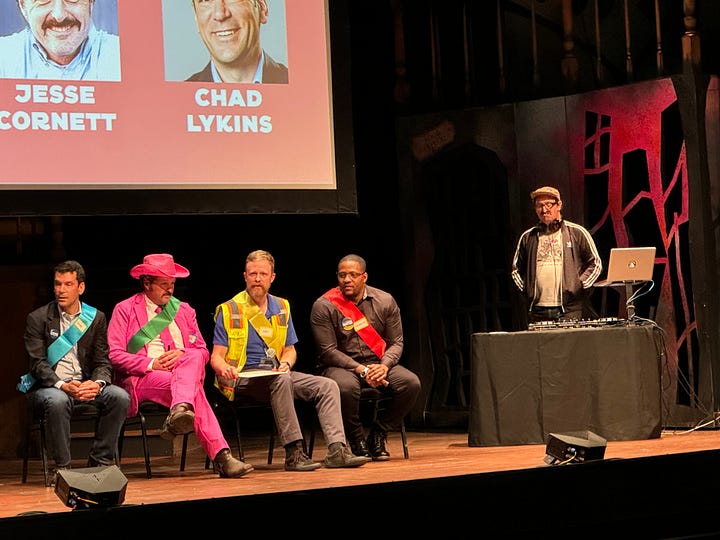
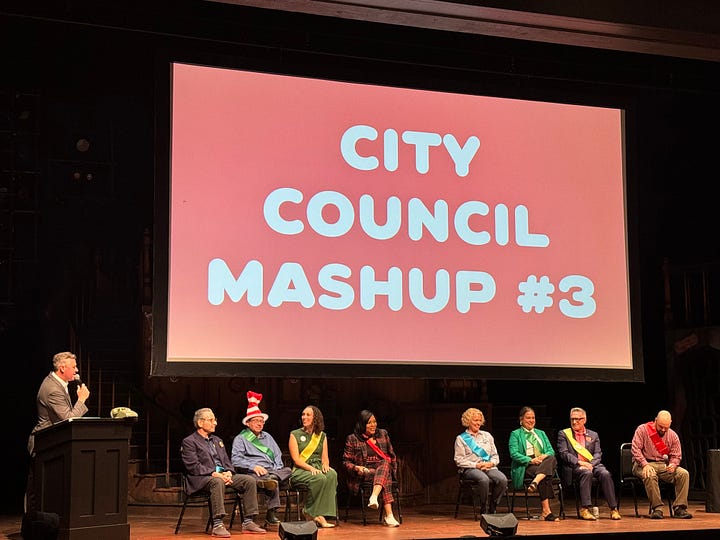
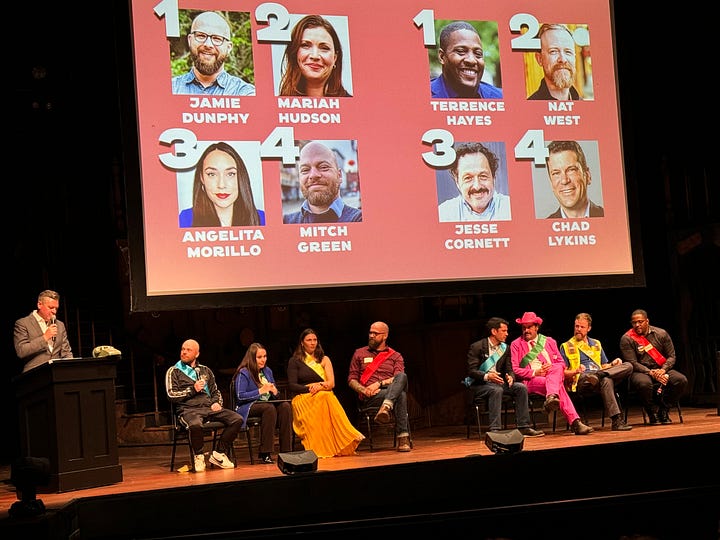
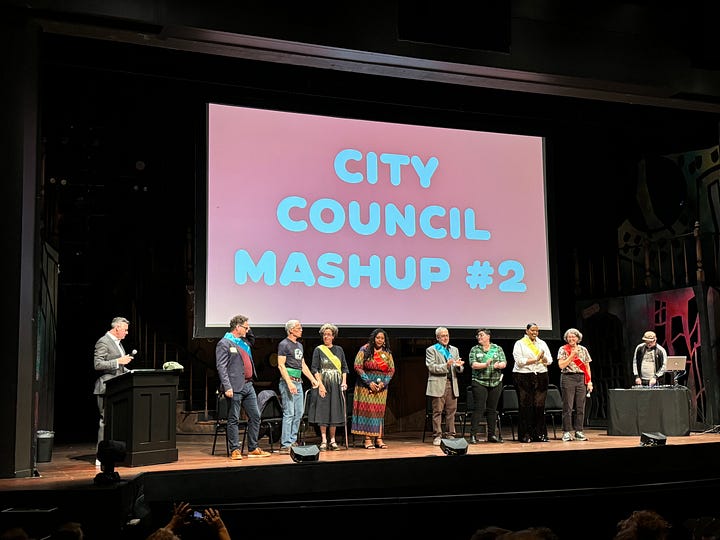
Cornett and Novick Reach Second Tier of Taxpayer Financing
PORTLAND, October 14, 2024 – Recovery advocate Jesse Cornett and former City Commissioner Steve Novick have both unlocked the second tier of public campaign financing. They reached this milestone by securing 750 individual contributions from Portland residents. Both candidates have now received two rounds of public financing at $40,000 each, totaling $80,000 per candidate. Including public financing, Cornett has raised over $129,000, while Novick has raised nearly $160,000.
Portland’s public campaign financing program matches small donations of up to $20 at a 9-to-1 ratio, meaning a $20 contribution results in $200 for the candidate. Mayoral candidates can raise up to $100,000 through the program, while city council candidates can collect up to $120,000.
Ten candidates in District 3 have qualified for public financing. Most have secured one round of up to $40,000, while two women, teacher and union organizer Tiffany Koyama Lane and anti-hunger advocate and social media influencer Angelita Morillo, have qualified for the maximum amount of $120,000.


Oregonian Endorsements Big Win for Some, A Bitter Pill for Others
PORTLAND, October 13, 2024 – The Oregonian has unveiled its city council endorsements, following its earlier endorsement of Rene Gonzalez for mayor.
The news organization interviewed up to six candidates per district, a number that raised eyebrows given the varying sizes of the candidate pools, ranging from sixteen in District 1 to thirty in Districts 3 and 4.
In a letter to the editor earlier this month, District 2 candidate Mariah Hudson expressed frustration over being excluded, citing qualifications like chairing PBOT’s Budget and Bureau Advisory Committee. Hudson, backed by several labor unions, elected officials, and business groups, is the third-highest fundraiser in her district.
In District 4, supporters of neighborhood and arts advocate Stan Penkin sent over 80 emails to The Oregonian editorial board, requesting that Penkin be granted an interview. Penkin, the district’s second-highest fundraiser, has endorsements from all four sitting city commissioners and several business groups.
Other District 4 candidates who were not invited to make their pitch included Tony Morse, with over twenty labor endorsements and support from multiple business groups, and Mitch Green, an economist, and environmentalist whose worker-friendly platform has earned support from many labor and progressive organizations.
In District 3, The Oregonian notably did not interview Tiffany Koyama Lane, a teacher and union organizer who could become Portland’s first Asian-American councilor. Koyama Lane is the top fundraiser across all council races, and is backed by numerous labor organizations and progressive leaders. In contrast, The Oregonian’s first pick in District 3, Kezia Wanner, is not a participant of the public campaign financing program, and has raised less than $10,000.
In District 1, The Oregonian’s editorial board endorsed small business owner Terrence Hayes, Radio Cab supervisor Noah Ernst, and sustainability advocate Candace Avalos. In District 2, it backed City Commissioner Dan Ryan, City of Portland manager Tiffani Penson, and cider entrepreneur Nat West.
In District 3, it chose Kezia Wanner, a compliance director for the Oregon Department of Emergency Management, former City Commissioner Steve Novick, and recovery advocate Jesse Cornett. In District 4, the board picked Eric Zimmerman, chief of staff to Multnomah County Commissioner Julia Brim-Edwards; Olivia Clark, a former high-level staffer for TriMet and the Department of Environmental Quality; and Portland Police Officer Eli Arnold.
Read The Oregonian’s District 1 and 2 endorsements.
Read the Oregonian’s District 3 and 4 endorsements.

Council Candidates Call for DEQ to Delay Zenith Permit
PORTLAND, October 11, 2024 – A group of 27 candidates for Portland City Council has called on the Oregon Department of Environmental Quality (DEQ) to delay a decision regarding Zenith Energy’s Air Contaminant Discharge Permit.
Zenith Energy operates a fuel storage and transfer facility in Portland’s Critical Energy Infrastructure (CEI) Hub, a region in Northwest Portland that holds much of the state's fuel supply. The hub is a focal point in many candidates’ campaigns, especially due to concerns over the seismic vulnerability of its aging infrastructure in the event of an earthquake.
In a letter addressed to DEQ Director Leah Feldon, the candidates expressed concerns about what they describe as a pattern of noncompliance by Zenith Energy. They also criticized the DEQ and Environmental Quality Commission for what they see as insufficient examination of the city’s Land Use Compatibility Statement process.
“It’s time to stand up to dishonest fossil fuel companies like Zenith so we can have a chance at a livable future,” District 4 candidate Mitch Green said in the statement.
His concerns were echoed by District 3’s Angelita Morillo, who said: “Either DEQ should do its job and deny permits to a repeat offender or let the city take a fresh look at Zenith’s land use compatibility when the new council takes over.”
At this time, no date is set for the DEQ’s decision.
United For Portland Issues Spotlight Endorsements, Withdraws Support for Mike Marshall
PORTLAND, October 10, 2024 — United for Portland, a political action committee (PAC) backed by business groups, real estate interests, and local civic leaders, has issued "spotlight" endorsements among its broad slate of candidates.
The PAC previously greenlit more than 25 candidates who attended multiple information sessions and presented platforms that aligned with its priorities. While these endorsements remain, the group has now refined its process, introducing "spotlight" endorsements to highlight its top picks in each district.
The spotlight candidates are:
District 1: Terrence Hayes and Loretta Smith
District 2: Mariah Hudson, Tiffani Penson, Elana Pirtle-Guiney, Dan Ryan, and Bob Simril
District 3: Rex Burkholder, Jesse Cornett, Daniel DeMelo, Steve Novick, and Kezia Wanner
District 4: Eli Arnold, Olivia Clark, Ben Hufford, Tony Morse, Stan Penkin, and Eric Zimmerman
Two of the spotlight candidates are brand-new additions as of yesterday: Bob Simril in District 2 and Kezia Wanner in District 3.
United for Portland also appears to have withdrawn its endorsement of Mike Marshall, a recovery advocate running for a seat in District 2. A source close to the process told Rose City Reform the decision was likely tied to Marshall’s advocacy for lifting the state preemption that prevents local alcohol taxes.
In a recent email to supporters, Marshall advocated for equal taxation of cannabis and alcohol and for using the Portland Clean Energy Fund—currently a business tax funding climate justice projects—for a broader range of improvements, such as free public transportation and expanding the city's tree canopy. He also suggested converting the gas tax from a flat tax to a percentage of sales.
"Tax reform can come with a lot of moans and groans, but it's time Portland took a thorough and responsible review of our taxes to ensure they align with our values, accomplish our goals, and fund our objectives at the right levels—while putting money back into our neighbors' pockets," Marshall wrote.
District 4 Debate Centers on Affordable Housing and Public Safety
PORTLAND, October 9, 2024 — Public safety and the need for affordable housing emerged as the key issues when District 4 candidates took the stage at a live-streamed candidate forum hosted by KATU and Willamette University last week. This was the final installment in a series of four forums focused on the upcoming election.
The forum featured eight of the thirty candidates running in District 4: Eli Arnold, Olivia Clark, Mitch Green, Ben Hufford, Chad Lykins, Stan Penkin, Moses Ross, and Sarah Silkie.
When asked about their main priority if elected, Clark and Arnold cited public safety. Green focused on housing and climate, while Hufford and Lykins noted housing and homelessness. Penkin emphasized government efficiency, and Silkie highlighted the need to rebuild trust in government.
Candidates Differ on Enforcement of Camping Ban
The District 4 debate followed the trend of previous debates, with candidates evenly split on Portland’s camping ban, which allows for fines or jail time for those who refuse shelter and continue camping in public spaces.
“I’ve never seen a study that shows that jails are a cure for homelessness,” said Chad Lykins, a chess club owner. “Once they leave jail, where do they go? They exit right back to homelessness.” His stance was echoed by Moses Ross, a political consultant, and Sarah Silkie, an engineer who works for the city of Portland.
Mitch Green, an energy economist, agreed, noting that Portland’s homeless community includes families. “If you take a carceral approach first, you’re just going to reinforce [...] traumas and make it harder for people to reintegrate into society,” he said.
Stan Penkin, a retired community advocate and former chair of the Pearl District Neighborhood Association, called for enforcement only in the "most egregious" cases, citing examples like fires in tents or blocked sidewalks. He emphasized outreach, saying, “That’s an absolute last resort, but sometimes that’s what it takes to change somebody’s life.”
Eli Arnold, a Portland police officer, supported the ban, describing it as “a targeted intervention” and stating, “It’s okay for us as a community to have rules, to have basic expectations, about things like not blocking sidewalks or not creating issues like shigella downtown.” He received support from Ben Hufford, an architect and restaurant owner, and Olivia Clark, a former TriMet director, who cited "compassion fatigue" among residents: “There are situations where there is a public safety or public health issue where we really need to remove people off the street,” Clark observed.
Most Pressing Safety Issues Include Officer Shortage, Traffic, and Environmental Threats
When asked about the most pressing public safety issue in District 4, most candidates pointed to Portland’s relatively low number of police officers per capita, a problem exacerbated by recruitment challenges leaving many positions vacant.
“We have a terrible police capacity issue,” said Eli Arnold. “We’re down to about half the number of police per capita as we had in 1995.” He added that a significant portion of 911 calls are related to a small population of unsheltered homeless individuals, and said stabilizing measures could help free up police resources.
Ben Hufford echoed the sentiment, sharing an anecdote where, as a business owner, he called the police during a break-in attempt and received no help. “We need to staff the police at appropriate levels,” he said, adding that non-emergency calls could be handled by community policing or Portland Street Response, the city’s unarmed first responders trained to address mental health emergencies.
Additionally, Olivia Clark and Chad Lykins pointed to speeding and traffic fatalities as pressing safety concerns in the district. Mitch Green cited the Critical Energy Infrastructure (CEI) Hub, an industrial area storing fossil fuels along the Willamette River that has long been a concern for neighboring communities. Lykins and Penkin agreed, stressing that relocating the CEI Hub should be a priority. “It is a danger that’s lurking down the road,” Penkin said. “A derailment, an earthquake, a fire—that would be a disaster not just for the city but for the region and the state as well.”
Moses Ross highlighted homelessness as the key public safety issue, particularly in the downtown core, and said revitalizing downtown would improve the city’s image and attract investment.
Unified Call for Streamlined Permitting
When asked how they would work to increase affordable housing, almost all candidates called for quicker permitting. Citing personal experience, Ben Hufford called the permitting system "a disaster" and warned that Portland’s housing crisis would reach the same proportions as San Francisco’s unless government inefficiencies are addressed.
Mitch Green proposed a move to social housing, a model where the city would own and manage housing to provide long-term affordable options for residents. He proposed tying rent to 30% of income to ensure affordability for all income levels.
Chad Lykins stressed the need for renter protections to prevent evictions, saying residents on fixed incomes or with disabilities might never be able to afford market-rate housing. “Long-term rental subsidies are a terrific way of keeping them housed and closer to the places and people they love,” he said.
Stan Penkin, a co-founder of Home Share Oregon—a nonprofit that connects people in need of housing to homeowners with rooms to rent—suggested home-sharing as a way to alleviate the housing crisis and offer financial stability for homeowners.
Sarah Silkie, citing her experience working through city code, noted that while she supports the calls for an expedited permitting process, the devil is in the details. “I don’t think it’s going to be hard to get seven votes to streamline our permitting,” she said. “What our councilors are going to need to know is what codes need to be fixed and how.”
KATU extended invitations to candidates who had qualified for Portland’s public financing program and ranked among those with the highest number of small contributions. Fundraising progress among these candidates ranged from Olivia Clark, who has raised over $170,000, to Sarah Silke, who has raised nearly $60,000. Other District 4 candidates who fit within that range are Tony Morse, Bob Weinstein, and Eric Zimmerman.
Read about the KATU District 1 forum here.
Read about the KATU District 2 forum here.
Read about the KATU District 3 forum here.
Angelita Morillo Becomes Second Candidate to Max Out on Public Financing
PORTLAND, October 8, 2024 — Angelita Morillo, an anti-hunger advocate and social media influencer running in District 3, has become the second candidate to reach the final tier of the city’s public campaign financing program. Morillo, who is also the youngest candidate to achieve this milestone in the program’s history, made the announcement in a statement.
Portland’s Small Donor Elections program matches small donations up to $20 at a 9-to-1 ratio, turning a $20 contribution into $200 for the candidate. Council candidates can raise up to $120,000 in public funds.
So far, five mayoral candidates and 47 council candidates have qualified for public campaign financing this election cycle. The only other candidate to reach the maximum funding is public school teacher and union organizer Tiffany Koyama Lane, who is also running in District 3.
Morillo’s campaign focuses on addressing housing and homelessness, improving sanitation and transportation infrastructure. She opposes Portland’s public camping ban, instead advocating for police alternatives and a range of shelter options to address unsheltered homelessness. She also supports expanding Portland Street Response, the city’s unarmed first responders for mental health calls.
Keith Wilson to Host Forum on Unsheltered Homelessness
PORTLAND, October 8, 2024 — Keith Wilson, a trucking company executive who’s running for mayor, will host a forum to end unsheltered homelesssness on October 10. Wilson is the founder of Shelter Portland, a nonprofit that repurposes community spaces into nighttime emergency shelters. If elected, he pledges to expand the initiative under city management, promising that it could end unsheltered homelessness in Portland within a year.
Notable speakers include Mark Johnston, former Assistant Secretary under President Obama tasked with reducing homelessness, and Dave Bieter, former mayor of Boise, Idaho, and the appellant in the landmark Supreme Court case Martin v. Boise, which has had significant influence on homelessness policy across the West Coast.
High Dollar Totals and Small Donor Momentum Shape Portland Council Races
PORTLAND, October 7, 2024 — Who has raised the most money among Portland’s city council candidates? The top fundraisers in council races have remained relatively consistent throughout the 2024 election cycle. In District 1, transportation and sustainability advocate Steph Routh leads with nearly $145,000 in contributions. In District 2, City Commissioner Dan Ryan has collected close to $143,000. Public school teacher and union organizer Tiffany Koyama Lane has raised over $200,000 in District 3, the highest total citywide. In District 4, veteran legislative director Olivia Clark follows closely with just over $172,000. (The totals reflect campaign finance filings with the Oregon Secretary of State.)
However, when looking at the number of individual contributions, the leaders change slightly. Steph Routh leads District 1 with 1,378 contributions. In District 2, cidermaker Nat West takes the lead with 1,340 contributions. Tiffany Koyama Lane dominates in District 3 with 2,311 contributions, including 1,733 donations under $25—the most micro-donations among any candidate. In District 4, economist and Army veteran Mitch Green leads with 1,378 contributions.
Small contributions play a critical role in unlocking public financing for candidates, thanks to Portland's Small Donor Elections program. The program matches donations of up to $20 at a 9-to-1 ratio, turning a $20 contribution into $200 for a candidate. Koyama Lane has unlocked $120,000 in matching funds, while Routh, West, and Clark have each unlocked $80,000. Ryan, who has collected fewer small donations, has unlocked $40,000 to date. The fundraising totals listed above include matching funds collected.
All of these candidates appear close to unlocking their next tier of matching funds, with the exception of Koyama Lane, who has already maxed out her public match.


Let Liv Østhus Take the Debate Stage, Candidates Tell OPB
PORTLAND, October 7, 2024 — City commissioners and mayoral candidates Carmen Rubio and Mingus Mapps took to social media over the weekend, urging OPB to include fellow mayoral candidate Liv Østhus in its upcoming 'Think Out Loud' mayoral debate scheduled for October 18. Østhus is a well-known Portland artist, performer, and dancer at Mary’s strip club.
OPB has limited the debate to five candidates: Rene Gonzalez, Mingus Mapps, Carmen Rubio, and Keith Wilson. When Østhus inquired about the selection process, OPB reportedly explained that adding more candidates could confuse listeners about who was speaking and noted that Østhus trailed behind in fundraising.
Østhus has raised roughly $122,000, including over $85,000 from Portland’s Small Donor Elections (SDE) program, placing her behind the other five candidates.
“Money has never been a priority for this campaign,” Østhus said in an Instagram video. “We are exactly the type of campaign the small donor program exists for,” she added, expressing disappointment over the decision.
In an Instagram post, Carmen Rubio called on OPB to reconsider its decision.
“My team and I are reaching out to OPB urging them to include Liv Østhus and allow Portlanders to hear from all of the leading voices in this race,” Rubio wrote.
Rubio further expressed concerns over OPB's reasoning: “[...] the response from OPB suggesting that they needed to be selective about which of the SDE-certified candidates were invited to limit confusion about who was speaking doesn’t sit right with me given that multiple male voices were accommodated but there was only room for one woman — me — at this event,” she added.
Mingus Mapps echoed Rubio’s sentiments. “Ensuring fair representation in forums like Think Out Loud is absolutely essential for a healthy democracy, especially as we transition to our new government structure. Proud to stand with you and continue fostering this spirit of collaboration,” he wrote on Instagram.
Several City Council candidates also voiced their support for Østhus on social media. District 3 candidate Jesse Cornett questioned OPB's justification for excluding Østhus.
“I’m troubled that the station wrote ‘listeners would have an easier time knowing who is talking.’ That is nonsensical, especially given you chose to include all three men who qualified for Portland’s Small Donor Election program,” Cornett noted.
Homelessness and Housing Focus in District 3 Debate
PORTLAND, October 5, 2024 — Homelessness and housing were the central topics as District 3 candidates took the stage at a live-streamed candidate forum hosted by KATU and Willamette University. This was the third in a series of four forums, each focused on a different district as part of KATU’s election coverage.
The forum featured seven of the thirty candidates who will appear on the ballot: Jesse Cornett, Daniel DeMelo, Chris Flanary, Steve Novick, Angelita Morillo, Ahlam Osman, and Luke Zak. An eighth candidate, Tiffany Koyama Lane, was invited but unable to attend.
When asked what their main focus would be if elected, Cornett, DeMelo, Morillo, and Zak all cited homelessness, with multiple candidates also highlighting housing. Novick emphasized the importance of effective public spending, Flanary focused on living wages, and Osman stressed the urgency of addressing climate change.
Housing Solutions: Emphasizing Existing Properties and City-Owned Land
The candidates were asked how they would increase affordable housing options. Luke Zak advocated for acquiring apartment buildings that have dropped in price due to market conditions. “Right now, there are many apartment buildings that are for sale at a far reduced rate because of the market conditions,” said Zak, a sales manager with Travel Salem, a nonprofit promoting tourism in the Willamette Valley.
Former City Commissioner Steve Novick also expressed interest in this approach but acknowledged the challenges of converting office buildings into housing. “It's very difficult and expensive,” Novick said. He referenced Calgary, Canada, where similar efforts are underway, noting, "I'm actually interested in talking to folks there and seeing how they're doing it and why they think that's a good investment."
Chris Flanary, a housing specialist with the City of Portland, advocated for using city-owned land to build affordable homes. "The city has a lot of land around Portland, and I would love to see us take that land and put cottage clusters on there, small units, starter homes that are affordable to regular working Portlanders at starter home prices," Flanary said.
Angelita Morillo, drawing on her own experience of being unhoused, argued that funds used for mass shelters could be better spent on providing secure, private housing. “Some of the encampments that we have right now that are being run by the city... cost millions of dollars every single year,” she said, advocating for reallocating those funds toward more permanent housing solutions. Morillo is a policy advocate for the nonprofit Partners for a Hunger-Free Oregon.
Differing Views on Public Camping and Enforcement
Candidates were split on whether they support Portland’s current camping ban, which allows for fining or jailing people who refuse shelter and continue to camp in public spaces.
“Criminalization is not an effective way to address being unhoused, and I’m not sure how folks who are unhoused are going to pay their fines,” Flanary said, adding that jailing people is “the most expensive way to shelter them for the night.”
Morillo echoed Flanary’s sentiment, calling the camping ban "political theater" that overlooks the core issues. "I think we need to be asking, why is it that unhoused people don't want to go into our shelter spaces?" she said, citing safety concerns about existing shelters. Her concerns were shared by Ahlam Osman, a small business owner and sustainability advocate, who called the ban "a waste of resources" and said the city must make shelters safer and more livable.
Novick took a different approach, arguing that enforcement should be a last resort. “Most people, if they’re told that there’s a humane shelter for them to go to... they will go,” Novick said, suggesting that enforcement only be used when all other options have been exhausted. Cornett, a policy advocate for Oregonians in recovery from addiction, agreed. "The goal is not to criminalize, but to make sure public spaces are safe for everyone, and that means having clear boundaries and expectations," he said.
DeMelo, a software engineer, supported giving the city authority to fine or jail people for continuing to camp in public spaces. “I think it’s really important that the city have the authority to fine and jail people for public camping,” DeMelo said, emphasizing the need for discretion and common-sense rules.
Zak took a more cautious stance. "I think that until the city has the quantity and diversity of shelter options needed to house all of our people, this question is a nonstarter," he said.
Joint Office of Homeless Services: Calls for Reform, Not Withdrawal
When asked whether the city should remain in the Joint Office of Homeless Services, a partnership with Multnomah County, the majority of candidates supported staying but emphasized the need for reforms.
"We should focus on improving the structure," Angelita Morillo said, calling for increased coordination and oversight.
Steve Novick agreed that staying in the joint office was the right move but noted that the city should be prepared to withdraw if the partnership doesn’t deliver results. "The threat of withdrawal should always be there," Novick said, though he stressed the importance of collaboration. He pointed to tiny house villages as one potential solution and suggested that the city and county work together to identify more sites for such developments. Cornett backed Novick’s stance. "We need to stay committed to the partnership, but we must demand accountability and push for reforms that make sure taxpayer dollars are being spent effectively," Cornett said.
Daniel DeMelo, whose experience includes serving as Chair of the Joint Office’s Budget Advisory Committee, was more skeptical. He posited that the joint office must show real progress or the city should consider other options. "If the county fails to fulfill its obligations, then we should leave. That’s what holding government accountable means," he said. "If the county fails to fulfill its obligations, then we should leave. That’s what holding government accountable means," he said.
KATU extended invitations to candidates who had qualified for Portland’s public financing program and ranked among those with the highest number of small contributions. Fundraising progress among these candidates ranged from frontrunner Angelita Morillo, who has raised over $140,000, to Ahlam Osman, who has raised just over $20,000. Other candidates who fit within that range are Rex Burkholder and Harrison Kass.
Read about the KATU District 1 forum here.
Read about the KATU District 2 forum here.
Green and Hufford Offer Ambitious Housing Production Plans
PORTLAND, October 4, 2024 — Two candidates running in District 4, Mitch Green and Ben Hufford, have unveiled ambitious but contrasting plans to tackle the city’s housing shortage.
Mitch Green, an economist and army veteran running for a District 4 City Council seat, plans to introduce a "social housing" model that he believes could provide a long-term solution to the city's affordability crisis.
Under Green's proposal, the city would build and manage publicly owned, mixed-income housing. The funding would come from a revolving loan fund, which Green says would allow Portland to keep building new housing by reusing money from repaid loans. He points to Montgomery County, Maryland, which set up a similar $50 million fund in 2021 to finance social housing projects.
Plan Won’t Raise Taxes, Green Says
A key part of Green’s social housing proposal is tying rent to income, with a goal of capping it at 30%—a common standard for housing affordability.
When asked whether his plan would require raising taxes, Green says that may not be necessary. “I think it’d be very difficult to pass a new bond or raise taxes in this city right now. So I think the way to pay for it is to reallocate and reprioritize the funding that the Portland Housing Bureau already has,” he explains.
Green plans to start by auditing Portland’s inclusionary zoning (IZ) program, which he believes has primarily produced housing for those just below the median income, with limited options for those with fewer means.
“Is there a better use for those funds? My argument is yes,” he says, suggesting that IZ funds, along with state grants and tax increment financing, could be repurposed to help capitalize a revolving loan fund for social housing. Other avenues include selling equity positions to the community in the form of coop shares, or engaging private investors in limited capacities, he adds.
A Focus on Renters’ Rights
Green, who if elected would serve a two-year term because of Portland’s electoral reform process, acknowledges that implementing social housing in Portland might require a lengthy process and says the plan would need to go through a committee process to work out specifics.
In the meantime, he thinks Portland should focus on policies that keep people in their homes. Green is one of ten city candidates who have signed the Renters’ Bill of Rights, circulated by the Portland chapter of the Democratic Socialists of America and the Renters Action Network, seeking to strengthen protections for renters.
“In the short run, let’s focus on keeping people from flowing out of housing and into homelessness through eviction protections and renter stabilization. That’s always going to be less expensive than dealing with it after the fact,” Green says.
Green’s campaign has drawn endorsements from multiple labor unions, the Working Families Party of Oregon, the Portland Democratic Socialists of America, and Home PAC, a political action committee focused on affordable housing solutions.
Hufford Emphasizes Private Development as Key to Solving Housing Crisis
Ben Hufford, an architect also running in District 4, offers a different vision for addressing Portland’s housing crisis that instead focuses on incentivizing private sector development.
“I respect that Mitch Green recognizes the scale of our housing problem, and that he is working on a very aggressive proposal to do something, not just talk about it,” says Hufford, who earned his Master of Architecture degree from Harvard University. Yet Hufford remains skeptical of the city's ability to effectively manage housing construction.
"The City of Portland is not an expert in building housing and has a history of spending a lot of money with little to show for it," he says, arguing that City Hall should instead focus on streamlining zoning and permitting processes to speed up housing construction.
Portland Must Respect State-Mandated 120-Day Permitting Deadline, Hufford Says
If elected, Hufford plans to introduce an emergency measure to simplify Portland’s beleaguered permitting and review processes. He proposes consolidating the city’s 28 separate housing-related reviews into four categories and requiring Portland to comply with a state law that mandates zoning and land use reviews take no longer than 120 days.
While Portland developers must often waive this right, Hufford believes housing development projects should instead be automatically approved if the city fails to meet the deadline. He also proposes that smaller housing projects—which he defines as those under eight stories or with fewer than 80 units—should receive a less stringent design review than larger complexes.
"Portland is falling behind on housing supply. We need to clear away the red tape that’s slowing down development," says Hufford, who is backed by real estate and business groups as well as City Commissioners Rene Gonzalez and Carmen Rubio.
Incentivizing Affordable Housing Through Tax Breaks
Hufford also supports expanding tax incentives to encourage affordable housing construction and reducing the period developers must keep units affordable from twenty to ten years.
While his approach differs from Mitch Green’s, he says he looks forward to working with Green if elected and notes that the two may find common ground on promoting co-ops and condos.
“We are about to turn a point where more than half of our Portland citizens live in multi-family buildings, but we have rules that favor building rental apartments over condos and co-ops that allow people to own their homes. We need to work to change those, or we will end up shutting a lot of people out of home equity that’s been the core of the American Dream,” Hufford says.
Hudson Calls On Oregonian to Expand Endorsement Interviews for Council Race
PORTLAND, October 3, 2024 — Mariah Hudson, a candidate for Portland City Council in District 2, has submitted a letter to the Oregonian/OregonLive editorial board, urging them to reconsider their decision to interview only a limited number of candidates for endorsements. Hudson pointed out that only five candidates from District 2 were invited, although voters will be able to rank up to six on their ballots.
“I’m the only solo working parent of young children in District 2 and bring a bench of experience serving on Budget Committees for Portland Public Schools and the Portland Bureau of Transportation that should merit consideration,” wrote Hudson.
Hudson, who has raised $104,000, is currently the third-highest fundraiser in District 2. She is backed by multiple business and labor groups, as well as elected officials like Multnomah County Commissioner Julie Brim-Edwards, City Commissioners Rene Gonzalez and Mingus Mapps, and State Senator Lew Frederick, who represents North and Northeast Portland.
“I’ve knocked on 7,300 doors and counting,” Hudson told Rose City Reform, adding that Willamette Week offered all candidates the opportunity to share their platforms.
Sources close to multiple campaigns have voiced frustration over being excluded from the Oregonian's endorsement process. One of the most vocal critics is City Commissioner Mingus Mapps, the only sitting council member who did not receive an invitation to an endorsement interview. In a pointed tweet, Mapps noted that he is the only Black member of the City Council and has served "with honor" for nearly four years, yet was not given the chance to make his case.
"[…]character clearly isn’t the issue—my opponent Carmen Rubio, who has racked up over 150 parking tickets, is being considered. Rene Gonzalez also has traffic violations, questionable use of public funds, and lied about a Black woman attacking him. Yet these are your 'chosen' candidates," Mapps tweeted.
Independent Group Launches “Dont Rank Rene” Campaign
PORTLAND, October 2, 2024 — A new PAC called “Don’t Rank Rene” has launched a grassroots campaign opposing City Commissioner Rene Gonzalez’s bid for Portland mayor. Led by progressive organizer Stephen Gomez, the PAC is using social media to urge Portland voters not to include Gonzalez in their rankings on the November ballot.
The campaign appears aimed at voters who may not select Gonzalez as their first choice but might consider him as a lower preference. In a close race between frontrunners Carmen Rubio and Rene Gonzalez, such lower rankings could make a difference. In ranked choice voting, voters’ first-choice votes are counted first. If no candidate wins a majority, the candidate with the fewest first-choice votes is eliminated, and their first-choice votes are transferred to the next ranked candidate on those ballots.
If neither Rubio nor Gonzalez wins a majority in the first round, the second-choice preferences of voters who back candidates like Keith Wilson, Mingus Mapps, or Liv Østhus could determine the final result. For example, if a voter ranks Mingus Mapps first and Rene Gonzalez second, and Mapps is eliminated, that vote would then transfer to Gonzalez.
Multiple Candidates Support the Message
Several candidates have shown support for the “Don’t Rank Rene” campaign, most notably Carmen Rubio, Gonzalez’s main rival, who shared the PAC’s message on social media. During a recent candidate forum in District 3, three city council candidates also urged voters not to rank Gonzalez. Angelita Morillo and Jesse Cornett encouraged voters to leave him off their ballots, while Chris Flanary added humor by saying they’d rather vote for a “half-eaten sandwich” than for Gonzalez.
Other candidates who have liked the “Don’t Rank Rene” campaign on social media include Candace Avalos (D1), Chris Olson (D2), Jennifer Park (D2), and Lisa Freeman (D4).
According to filings with the Oregon Secretary of State, the Don’t Rank Rene PAC has raised about $1,300, with most of it coming from Stephen Gomez himself. Gomez is also involved with Portland for All, a PAC that has raised approximately $20,000 and has endorsed several progressive candidates.



Candidates Reveal Alliances at District 3 Forum
PORTLAND, October 1, 2024 — At a District 3 candidate forum last week, many council candidates shared their picks for mayor with the audience. This November, Portlanders will have the option to rank up to six candidates for all city offices, as a result of the city’s transition to a new voting method: ranked choice voting.
Trucking executive Keith Wilson emerged as the top choice for mayor, with six candidates—Dan Gilk, Kelly Janes, Phillippe Knab, Ahlam Osman, Heart Free Pham, and Jon Walker—saying they would rank him first. City Commissioner Carmen Rubio was the first choice for Jesse Cornett, Tiffany Koyama Lane, and Luke Zak. Rene Gonzalez received support from Sandeep Bali and Daniel De Melo, while Mingus Mapps was backed by Brian Conley.
Some participants in the forum, which focused on progressive issues, were candid about their opposition to City Commissioner Rene Gonzalez. Angelita Morillo and Jesse Cornett urged voters not to rank him at all, with Chris Flanary adding some biting humor to the discussion, noting they would rather vote for a "half-eaten sandwich" than for Gonzalez.
Candidates were also asked whom among their fellow council contenders they would rank highly. Jesse Cornett, Angelita Morillo, Tiffany Koyama Lane, and Steve Novick received the most support from other candidates.
Koyama Lane and Morillo, known for canvassing together, highlighted their alliance on stage. "I feel a kinship with you as another woman of color and […] the values that you carry," Morillo told Koyama Lane during the discussion.
Morillo also expressed excitement about "bantering" with Steve Novick, who indicated the feeling was mutual. The former city commissioner also said he would rank Jesse Cornett highly. Cornett returned the support, adding that he would also give Luke Zak a high ranking.
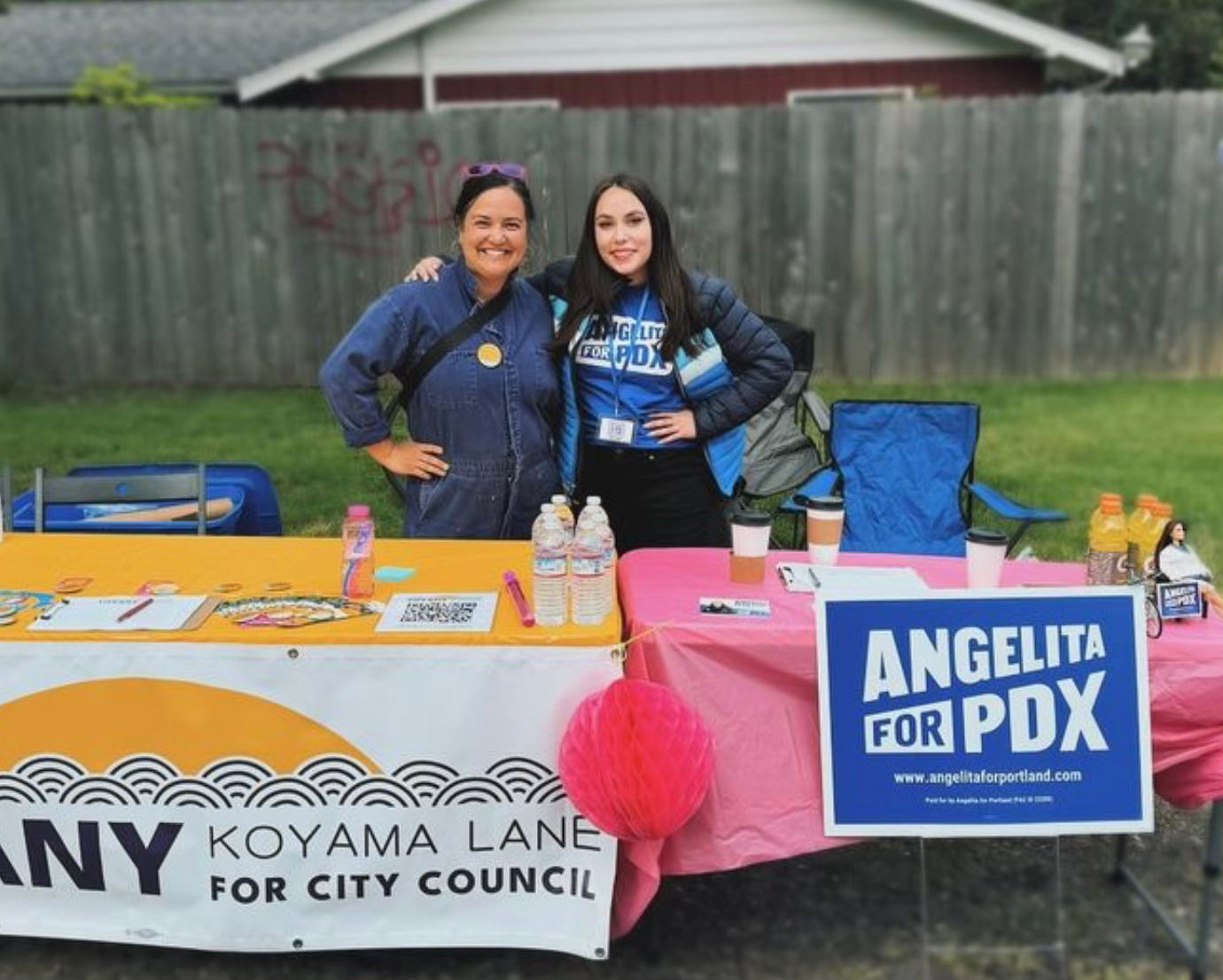
Luke Zak Qualifies for Taxpayer Campaign Financing
PORTLAND, October 1, 2024 —Luke Zak is the final candidate to qualify for public campaign financing in the 2024 city races. Zak, a Sales Manager with Travel Salem, a nonprofit promoting tourism in the mid-Willamette Valley, has a background in organizing for voting rights and marriage equality. He secured a $16,300 match.
This brings the total number of council candidates qualifying for public financing to 47, along with five mayoral candidates. Portland’s public campaign financing program matches small donations of up to $20 at a 9-to-1 ratio, meaning a $20 contribution generates $200 for the candidate. Mayoral candidates can raise up to $100,000, while council candidates can collect up to $120,000.
William Mespelt, a property manager in District 2, whose application status was previously pending, ultimately did not qualify. He will not receive matching public funds.
Female Council Candidates Lead Fundraising Despite Representing Just Over 25% of Candidate Pool
PORTLAND, September 29, 2024 — Although women make up just over 25% of the council candidate pool, they are outpacing men in fundraising.
Among the top 10 fundraisers in the council races, six are women. The top fundraiser across all districts is Tiffany Koyama Lane, a public school teacher and union organizer running in District 3. The second highest is Olivia Clark, a longtime legislative director in District 4. Both are women.
Of the five council candidates who have qualified for more than one round of public campaign financing—requiring at least 750 contributions—four are women. In addition to Koyama Lane and Clark, the list includes Steph Routh, a sustainability advocate running in District 1, and Angelita Morillo, an anti-hunger advocate and TikTok influencer in District 3. Nat West, a former cidermaker running in District 2, is the only man to qualify so far.
Whether women will maintain their fundraising lead as Election Day approaches remains uncertain. While they dominate the top 10 fundraisers, the top 20 is nearly evenly split, with nine women and 11 men.
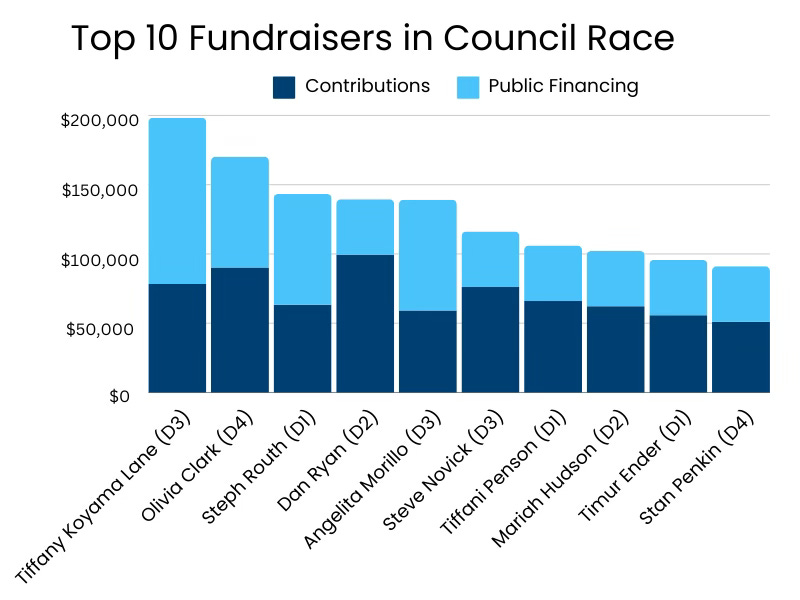
Deian Salazar Exits District 1 Race, Endorses Terrence Hayes
PORTLAND, September 28, 2024 — District 1 candidate Deian Salazar, an advocate for Oregonians with autism and children and youth in foster care, has suspended his campaign for city council.
Salazar announced his decision in an interview with KATU, where he also explained his choice to endorse Terrence Hayes, a small business owner running for a seat in the same district. Salazar highlighted Hayes' deep ties to East Portland and Portland's Black community.
"I believe I'm endorsing the right candidate who will be able to do what East Portland needs and not sell it out like we've seen so many other politicians do," said Salazar, who will now work as a policy advisor and deputy field manager for Hayes.
"At this time, it's more effective to dedicate my energies toward electing Terrence Hayes than running myself," Salazar added, emphasizing that public service goes beyond stepping into the role of a politician and is about putting others first.
Salazar, the only Gen Z candidate in District 1 and the only council candidate open about being diagnosed with autism, serves on the Oregon Commission on Autism Spectrum Disorder and the Governor's Child Foster Care Advisory Commission.
Public Safety and Housing Affordability Dominate District 2 Debate
PORTLAND, September 27, 2024 — District 2 candidates took the stage yesterday at a live-streamed candidate forum hosted by KATU and Willamette University. This was the second in a series of four forums, one for each district, organized as part of KATU’s election coverage.
The show featured eight of the 22 candidates running in the district: Marnie Glickman, Mariah Hudson, Sameer Kanal, Tiffani Penson, Dan Ryan, Jonathan Tasini, Nat West, and Nabil Zaghloul. KATU extended invitations to candidates who had qualified for Portland’s public financing program and ranked among those with the highest number of small contributions. Fundraising progress among these candidates ranged from frontrunner Dan Ryan, who has raised over $135,000, to Nabil Zaghloul, with approximately $40,000. Notably, several candidates within that range were absent, including recovery advocate Mike Marshall, labor organizer Elana Pirtle-Guiney, small business owners Debbie Kitchin and James Armstrong, and sales executive Bob Simril.
Public Safety as a Major Focus
Citing their top priority as city councilors, most candidates emphasized public safety. Jonathan Tasini, a lifelong union organizer, focused on improving wages for working people, while Nabil Zaghloul, a social services director for Multnomah County, highlighted the need for economic growth and infrastructure. Nat West, former owner and operator of Reverend Nat’s Hard Cider, who also drove a TriMet bus, said his top concern is safe streets.
When asked if they supported increasing Portland’s police force beyond the current budget allocation, the candidates were evenly split. Mariah Hudson, Dan Ryan, Tiffani Penson, and Nabil Zaghloul supported adding more sworn officers. “Support times for urgent calls can be 21 minutes. That's too long,” said Hudson, an OHSU communications specialist.
Tiffani Penson, a people and culture manager with the City of Portland, noted that the police force hasn’t kept up with Portland’s growing population. “We are not equipped to handle the population and respond to them in a timely and safe way,” she said. “We also need to make sure that our police officers are well-trained, accountable, and accessible,” she added.
Ryan Takes Credit for Stopping Defunding of Police
City Commissioner Dan Ryan echoed Penson’s stance. “About four years ago I was a deciding vote to stop the defunding of the police, and since then, we’ve done our best to level it up to what we should be at for a city of our size,” said Ryan, noting a “culture change” among recent recruits. “I'm seeing a different type of person showing up to be a police officer, with degrees in sociology and such, and I'm optimistic about where it's going,” he added.
Other candidates, including Sameer Kanal, Jonathan Tasini, Nat West, and Marnie Glickman, argued that the city should focus first on filling existing vacancies and explore alternative public safety investments, such as expanding Portland Street Response, the city’s unarmed response team for mental health emergencies. “I believe in community policing—we need to spend more time having officers get to know people in the neighborhood,” said Glickman, a political strategist, who also expressed support for expanding Portland Street Response.
Nat West, who ran Reverend Nat’s Hard Cider for twelve years, said that as a business owner, many of his interactions with police involved non-emergency situations, like broken windows. “I don't need an expensive armed officer to show up. I need a public safety support specialist to give me a case number so I can file an insurance claim,” he said.
Solutions to Housing Shortage: Permitting Reform and Renters’ Bill of Rights
Housing affordability was another key issue addressed during the forum.
“I've been a renter my whole adult life, and there is a massive affordability crisis,” said Sameer Kanal, a project manager with the City of Portland, who called for a Renters’ Bill of Rights to help renters stay in their homes. Jonathan Tasini seconded Kanal’s position and called housing a “universal right,” expressing support for social housing, a city-owned housing model. “The vast majority of homelessness is caused by economic issues, by people not being able to afford rent in this city,” Tasini said, adding that if he’s elected, he’ll push the state legislature to raise the minimum wage to $25 an hour.
Dan Ryan and Nat West emphasized the need to streamline Portland’s beleaguered permitting system. West shared a story of spending three years in “permitting hell” as a small business owner due to a dispute between the Portland Water Bureau and the Bureau of Environmental Services. “When elected, I'll spend a lot of time ensuring that our permitting bureau runs as smoothly as possible,” he said. Nabil Zaghloul called for tax rebates and incentives to spur housing production. “We need to work with business leaders across multiple jurisdictions—city, county, metro—to address this together,” he stated.
North Portland Neighborhoods Should Look More Like SlabTown, Glickman Says
Marnie Glickman pointed out the need for increased density and access to mass transit east of the river. “We need our Eastside and North Portland neighborhoods to look more like Slabtown, the Pearl District, and the Alphabet District in Northwest,” she said, also signaling support for raising the minimum wage.
Mariah Hudson stressed that Portland must become more affordable for single parents like herself, and expressed optimism about projects such as the redevelopment of Lloyd Center and Albina Vision Trust’s efforts. “We’ll need strong leaders who can push through permitting reform and work on infill strategies,” she said.
Tackling the Addiction Crisis
On the subject of Portland’s addiction crisis, City Commissioner Dan Ryan, whose late brother struggled with heroin addiction, stressed the importance of rehabilitation. “I’ve been really honest about this: some people aren't houseable in that condition—they need withdrawal with medical support,” Ryan said. “Sometimes elected officials have to be brave enough to stand up to the ‘Housing First’ coalition and tell them we need to rethink this. That’s what I’ve done my entire time in office,” he said, referencing the “Housing First” model, which promotes low- or zero-barrier housing.
Nabil Zaghloul stressed the need to enforce the city’s camping ban and urged investment in supportive services and harm reduction measures like overdose prevention centers and access to the drug naxolone, which can prevent overdosing deaths. “These are human beings,” Zaghloul said. “We need to invest in rehabilitation and treatment plans because these proven methods work,” he concluded.
Forums for Districts 3 and 4 Coming Up
Read our breakdown of the KATU District 1 forum here. Forums for Districts 3 and 4 will air on Monday, September 30, and Thursday, October 3, respectively.
Meet Your November Ballot
PORTLAND, September 26, 2024 — Multnomah County has released sample ballots for the historic 2024 city election. To give you an idea of what to expect this November, here’s the sample ballot for the mayoral race.
Curious about the order of names? It’s different each year and is determined by a random drawing by the Oregon Secretary of State.
Voters can rank up to six candidates, with number one being their first choice. Ranking candidates is optional—voters who prefer not to rank can simply fill in the "Rank 1" oval next to their favorite candidate’s name. However, voters who want to exercise their option to rank multiple candidates can rank up to six contenders.
The key to ranking correctly is to avoid marking more than one oval in any column or row. If this happens—don’t worry—your ballot can still be saved. The Multnomah County Elections Division recommends correcting your ballot in the following manner. Be as clear as you can to avoid ambiguity for county election workers.
Sparks Fly as City Commissioner Mingus Mapps Accuses Rene Gonzalez of Lying
PORTLAND, September 25, 2024 — City Commissioner and mayoral hopeful Mingus Mapps today publicly accused fellow council member and mayoral rival Rene Gonzalez of lying, raising the temperature of the mayoral race just weeks before Portland’s general election. In a social media post, Mapps alleged that Gonzalez fabricated details about an incident in which Gonzalez claimed he was "attacked by a Black woman" on a TriMet train.
Mapps’s accusation seems fueled by frustration over The Oregonian’s decision not to include him in their endorsement process for Portland mayor.
“I’ve served Portland with honor for nearly four years on the City Council. I’m the fourth African American to do so in our city’s history and hold a PhD in Government from Cornell. Despite that, The Oregonian won’t even consider my candidacy,” Mapps tweeted, noting that his opponents Carmen Rubio and Rene Gonzalez were still being considered despite recent revelations Rubio'stroubled traffic record and an ongoing campaign finance investigation into Gonzalez' use of city funds to edit his Wikipedia page during an election year.
“And character clearly isn’t the issue—my opponent Carmen Rubio, who has racked up over 150 parking tickets, is being considered. Rene Gonzalez also has traffic violations, questionable use of public funds, AND lied about a Black woman attacking him. Yet these are your 'chosen' candidates,” Mapps charged.
The incident Mapps referenced involves a 2024 claim made by Gonzalez, where he stated that a woman attacked him on a TriMet train. In a subsequent tweet, Mapps said Gonzalez’s campaign had contacted him to dispute his claim. Mapps responded:
“The traffic violations and questionable use of public funds? Those are just facts.”
Mapps included video footage from the train, showing the woman grazing past Gonzalez. "Was Commissioner Gonzalez really ‘accosted by a woman on the train’?" Mapps asked, urging voters to view the footage and decide for themselves.
Gonzalez has not yet responded publicly to Mapps’s tweet. The exchange marks a clear shift in the tone of the mayoral race, which has so far remained largely civil between candidates.
Public Safety and Housing Take Center Stage in District 1 Council Debate
PORTLAND, September 25, 2024 — Public safety and housing emerged as key topics when District 1 candidates presented their platforms during a live-streamed forum hosted by KATU and Willamette University.
The forum featured seven of the sixteen candidates running in the district: Candace Avalos, Jamie Dunphy, Timur Ender, Noah Ernst, Terrence Hayes, Steph Routh, and Loretta Smith. KATU extended invitations to candidates who had qualified for Portland’s public financing program and ranked among those with the highest number of small contributions. Fundraising among participants ranged from frontrunner Steph Routh, who has raised nearly $141,000, to Noah Ernst, with just over $8,000.
Public Safety Prioritized by Most Candidates
When asked about their top priority as city councilors, most candidates pointed to public safety. Jamie Dunphy, however, highlighted livability as his main focus, while Steph Routh emphasized housing and homelessness.
On public safety, Noah Ernst, a taxi company supervisor, argued for increasing the number of law enforcement officers, noting that Portland has significantly fewer officers per capita than similar-sized cities.
Candace Avalos, a sustainability advocate, advocated for a more diversified first responder system, including alternatives to police. She referenced Portland Street Response, which handles mental health calls, stating, “What our community wants and deserves is the right responder at the right time for the right reasons.”
Loretta Smith, citing her experience as a former Multnomah County commissioner, pushed for youth employment programs as a crime prevention measure: "I have never seen a kid doing a drive-by on their way to work." She also highlighted the role of community-based organizations in addressing crime.
Jamie Dunphy, a live music advocate and former policy director for City Commissioner Nick Fish, supported adding more police officers but stressed that vibrant community spaces could do more to reduce crime. He argued, “There is no amount of police officers walking up and down Hawthorne Boulevard at one in the morning that will have the same effect on community safety as a concert getting out and people being out in the community.”
Sustainability advocate Steph Routh and Timur Ender, a transportation planner, agreed that community-based solutions were needed, proposing a mix of services that included both police and unarmed responders. “I support things like a voluntary gun buyback program to prevent retaliatory shootings,” Ender added.
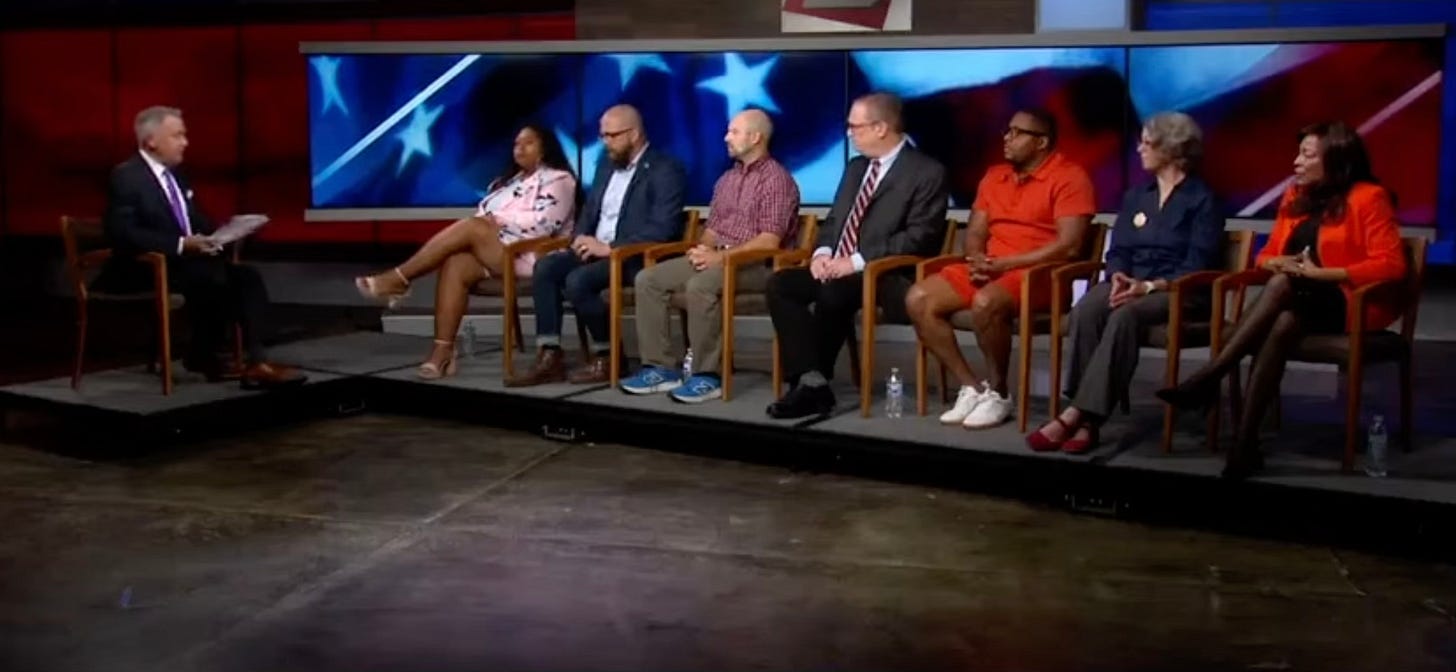
Disagreement Over Police Expansion and Camping Ban
The candidates split over whether to expand the police force. Terrence Hayes, Loretta Smith, and Noah Ernst called for increasing the number of sworn officers, while Steph Routh, Jamie Dunphy, and Timur Ender believed filling current vacancies should come first. Candace Avalos suggested the city should examine how the police budget is currently allocated before deciding on further expansion.
Jamie Dunphy and Candace Avalos voiced opposition to Portland’s camping ban, which allows enforcement officers to fine or jail unsheltered individuals who repeatedly refuse shelter. In contrast, Noah Ernst, Terrence Hayes, and Loretta Smith supported the ban. Steph Routh emphasized the need for more shelter space but did not take a position on the ban itself.
Housing Solutions: Land Banking, Permitting Reform, and Vacancy Tax
The candidates offered a range of solutions for increasing Portland’s housing stock. Steph Routh expressed optimism about the expanded use of ADUs and duplexes and called for streamlining the permitting process. Loretta Smith proposed land banking and expanding tax incentives for affordable housing projects.
Candace Avalos also supported land banking and predicted that Portland’s new government structure would help speed up housing production. Jamie Dunphy criticized the slow permitting process and called for changes to incentive structures to encourage development, while Noah Ernst and Terrence Hayes focused on reducing regulatory burdens to boost housing production.
Timur Ender and Jamie Dunphy both advocated for a vacancy tax to discourage long-term vacant properties. Dunphy remarked, “I've been told that there are condos in South Waterfront towers that have never been tenanted at all. I think that if those are kept vacant for a long period of time, that's criminal, and I think that we should incentivize against that.” Ender also proposed using surplus city land for housing projects and increasing the use of housing vouchers for low-income families.
Poll Results: Public Safety Tops Voter Concerns
A viewer poll conducted by KATU during the debate revealed that 60% of respondents identified public safety as the top issue for the city council, while 40% prioritized housing. The poll remains open on the station’s website. A second council candidate forum, this time with candidates from District 2, will air tomorrow at 11am.
Olson, Park, Streib, and Kass Qualify for Taxpayer Campaign Financing
PORTLAND, September 24, 2024 — Four additional candidates have recently qualified for public campaign financing. In District 2, Jennifer Park, a programs director for the educational nonprofit The Shadow Project, and Laura Streib, founder of Vibe of Portland, a music and arts nonprofit, have each secured approximately $23,000 in taxpayer funds. Joining them is community organizer Chris Olson, also from District 2, who has qualified for an undisclosed amount.
In District 3, Harrison Kass, a policy director for City Commissioner Rene Gonzalez, has qualified for $32,000.
This brings the total number of council candidates qualifying for public financing to 46, along with five mayoral candidates. Portland’s public campaign financing program matches small donations up to $20 at a 9-to-1 ratio, meaning a $20 contribution generates $200 for the candidate. Mayoral candidates may collect up to $100,000, while council candidates can raise up to $120,000.
Although the qualification deadline was August 27, the city's processing office has experienced delays due to the high volume of applications. Two council candidates are still under review, and those who missed the deadline will not receive taxpayer funds.
Nat West Becomes First District 2 Candidate to Qualify for Second Round of Taxpayer Financing
PORTLAND, September 23, 2024 — Nat West, founder of the now-closed Reverend Nat’s Hard Cider, has become the first District 2 candidate to qualify for a second round of public campaign financing. West achieved this milestone by securing 750 individual contributions from Portland residents. West, who has already received $40,000 in taxpayer financing, will now receive another round of $40,000.
Portland’s public campaign financing program matches small donations of up to $20 at a 9-to-1 ratio, meaning a $20 contribution results in $200 for the candidate. Mayoral candidates can raise up to $100,000 through the program, while city council candidates can collect up to $120,000.
West joins four women who have already reached the second tier of taxpayer financing: Steph Routh (D1), Tiffany Koyama Lane (D3), Angelita Morillo (D3), and Olivia Clark (D4). Koyama Lane is the only council candidate to qualify for three rounds of financing, thus reaching the $120,000 cap.
Mingus Mapps Slams The Oregonian in Fiery Email to Supporters
PORTLAND, September 23, 2024 — City Commissioner and mayoral candidate Mingus Mapps unleashed a scathing critique of The Oregonian in an email to supporters, accusing the newspaper of trying to "erase" his candidacy.
The email follows Mapps’ exclusion from two recent debates—one hosted by PAC Progreso Latino and the other by the Portland Metro Chamber—because he had not collected 750 individual contributions by the deadlines set by those organizations. Mapps, who oversees the Bureau of Transportation and is the fourth Black city commissioner in Portland’s history, framed his exclusion as part of a broader effort by the city’s political gatekeepers to marginalize his candidacy. "Portland’s power structure [is] trying to erase me from history, and now The Oregonian is complicit in that too," he said.
Mapps did meet the requirement for Portland’s public campaign financing program, which mandates that mayoral candidates collect 750 contributions by August 27 to qualify for matching funds. However, despite qualifying, Mapps said he has yet to receive the funds, a delay he claims has hindered his campaign. "I have the 'bad luck' to be the only mayoral candidate who has qualified for matching funds but has yet to receive them from the city," Mapps said.
He also took aim at his two main opponents, Rene Gonzalez and Carmen Rubio, accusing them of exploiting loopholes in campaign finance laws. "After Gonzalez and Rubio qualified for public matching funds, their top campaign strategists quit, only to start working for independent expenditure groups supporting their former bosses," Mapps charged. "That might be legal, but it sure isn’t right."
As the campaign moves forward, Mapps faces another potential hurdle with the upcoming City Club of Portland debate on October 8. It remains unclear which candidates will be invited to participate.
Five Council Candidates Have Raised Over $100,000
PORTLAND, September 22, 2024 — Seven candidates in Portland’s race for twelve open council seats have surpassed the $100,000 fundraising mark. Notably, five of these top fundraisers are women, despite only about 25% of the overall candidate field being female.
Leading the group is Tiffany Koyama Lane, a teacher and union organizer in District 3, who had raised $152,500 as of September 20. Close behind, transit and sustainability advocate Steph Routh in District 1 has brought in $140,500.
Other top performers include Angelita Morillo, an anti-hunger advocate in District 3, with $138,600; City Commissioner Dan Ryan in District 2 with $135,100; and legislative director Olivia Clark in District 4, securing $124,700. Former City Commissioner Steve Novick, also in District 3, has collected $106,800, while District 2’s Tiffani Penson, a people and culture manager for the City of Portland, rounds out the list with $103,100.
The list is based on campaign finance filings with the Oregon Secretary of State and includes contributions from individuals, organizations, and public funding through Portland's campaign financing system.
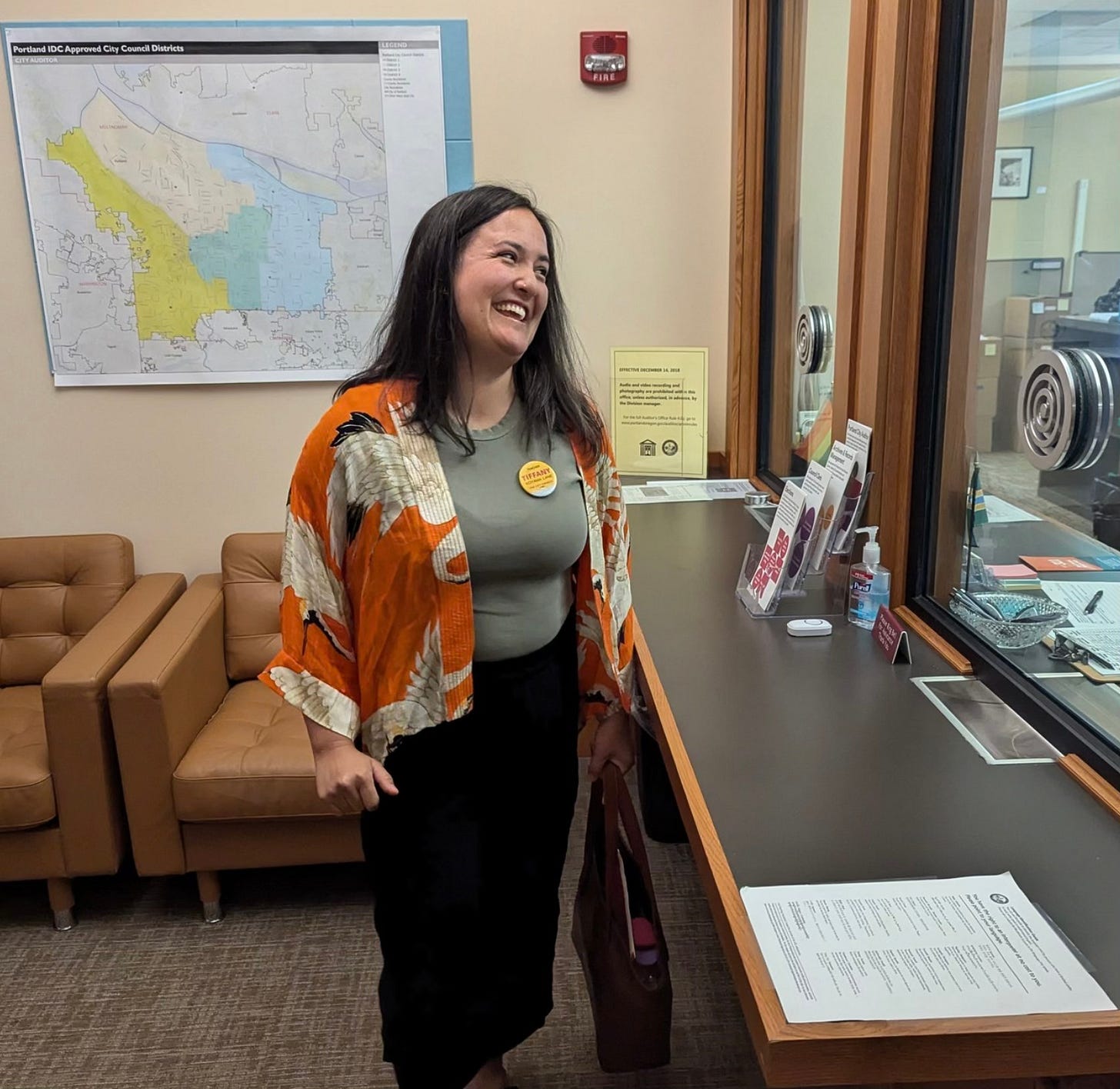
Candidates Split on Boosting Portland’s Police Force
PORTLAND, September 20, 2024 — A recent candidate questionnaire circulated by The Oregonian and OPB revealed that the 2024 council candidate pool is fairly evenly split on whether to significantly boost Portland’s police force.
The Portland Police Bureau has a total of 797 sworn members, down 23% from 1,035 in 2005. As of 2023, Portland's police staffing ratio was significantly below the national average, with approximately 1.3 officers per 1,000 residents, compared to the U.S. average of 2.1 officers per 1,000 residents.
The questionnaire posed the following question to council candidates: Would you vote yes on a proposal to fund hundreds more police officers than the City Council has already authorized? Why or why not? How would the city pay for it?
30+ Candidates Support Increasing Police Staffing
While approximately 30 candidates either didn’t answer the question directly or didn’t return the questionnaire at all, more than 30 candidates responded affirmatively.
“Investing in community police professionals is crucial to ensure community safety and effective crime response in Portland. By reallocating funds from redundant and overlapping city services, we can bolster public safety resources, enhance training, and improve community relations,” wrote City Commissioner Dan Ryan, who is seeking a seat in District 2. Ryan’s stance was echoed by Jamie Dunphy, a government relations director at the American Cancer Society Cancer Action Network who is running in District 1. “The bureau is truly understaffed, and it takes 18 months from when a recruit is hired to when they can be on the beat. We need to plan for the wave of coming retirements from an aging police force and to welcome new talent.”
Perhaps unsurprisingly, Eli Arnold, a Portland police officer vying to represent District 4, also supported increasing the police force. “I propose endorsing a goal of 1.8 police officers per 1,000 residents. The FBI reports a national average of 2.3 in 2019. We should fund them one hundred at a time. We should use some of the PCEF revenue, which greatly exceeded the program size sold to voters.”
30+ Candidates Say Now is Not the Right Time for Expansion
Approximately 35 candidates said they would not support hiring hundreds of new police officers at this time. “Until we restructure our public safety system, let police focus on crime response, prevention, and investigations, and empower other providers to address calls when a person is in crisis, we won’t know how many officers our community needs. Let’s build the right system, then determine our policing needs,” wrote political consultant and former union organizer Elana Pirtle-Guiney, a candidate in District 2.
Angelita Morillo, an anti-hunger advocate running in District 3, said: “Given the issues of excessive force and unequal treatment of BIPOC Portlanders endemic in the Portland Police Bureau, we need to talk about accountability and rebuilding public trust before giving them a blank check. The city needs to do regular audits to ensure the bureau is responding to calls effectively.” Both Pirtle-Guiney and Morillo have previously voiced their support for expanding Portland Street Response, the city’s unarmed first responders focusing on mental health emergencies.
Some Candidates Won't Commit Without Specific Funding Plans
Multiple candidates took issue with the question, arguing that committing to voting yes without identifying the funding source would be disingenuous.
“As a prospective city councilor, I hope your readers appreciate that I won’t make promises I can’t keep. Until we know how to pay for police officers, I can’t commit to voting for more. Reducing overtime costs within the Portland Police Bureau alone could fund over 100 new hires,” wrote Jesse Cornett, a recovery advocate in District 3. His opinion was seconded by former City Commissioner Steve Novick, running in the same district. “I can’t say yes, precisely because I can’t say how to pay for it. I would like to restore detectives to investigate property crimes, traffic officers to stem the carnage on the streets, and add patrol officers (after seeing how many calls can be handled by increasing Portland Street Response),” Novick answered.
Others pointed out that while they were supportive of adding officers, the city has an officer recruiting problem that must first be addressed. “[...] we have a recruitment and training pipeline problem that will slow our ability to increase the force. Public safety is an essential function, important to restoring a sense of safety among the public and improving our image. The budget must prioritize essential services, find savings, and get creative,” stated Olivia Clark, a former long-time legislative director who is running in District 4.
While mayoral candidates also received the questionnaire, the question about bolstering the police force was not included.
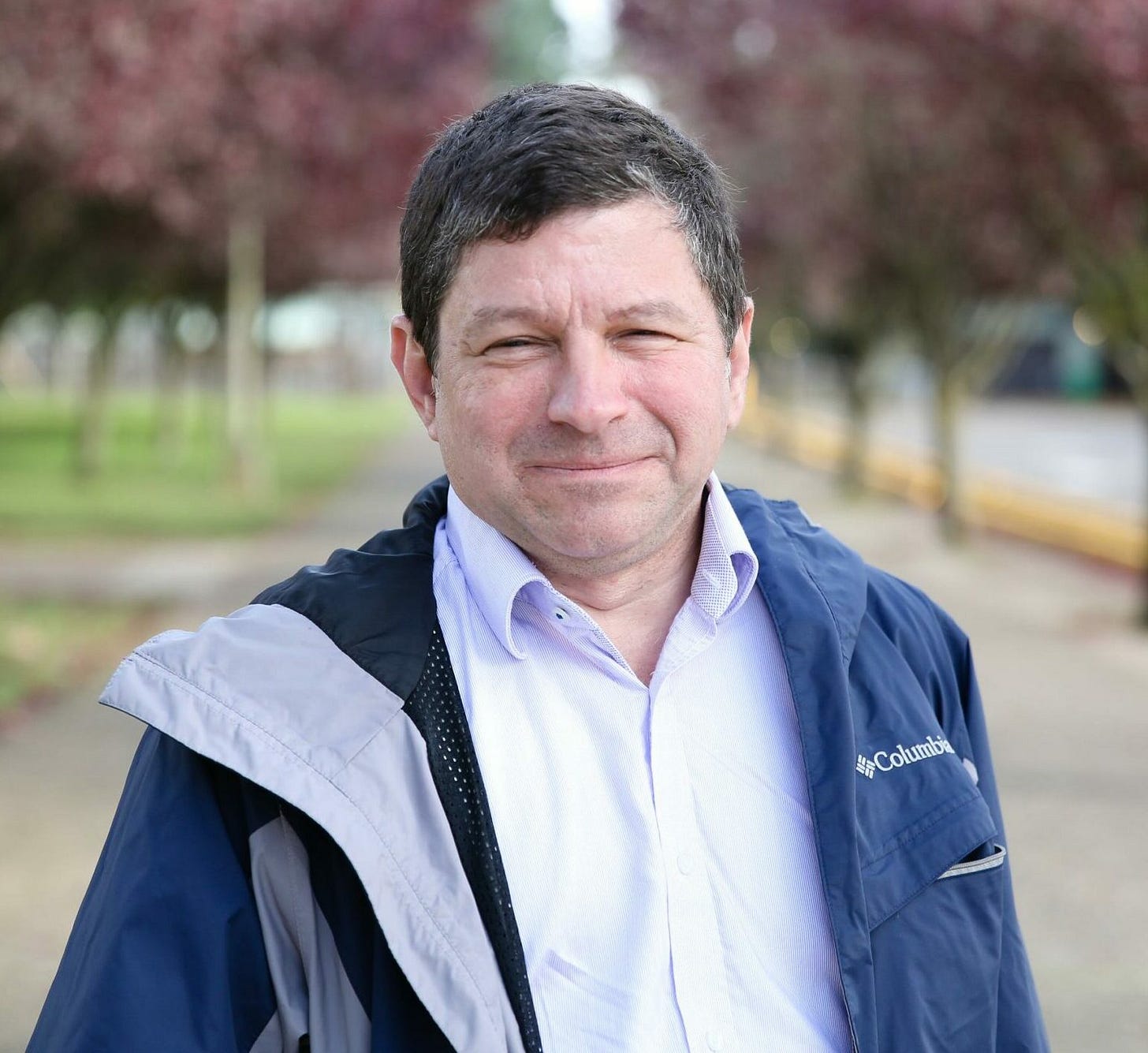
Jesse Cornett Criticizes City’s Staffing Process, Questions Leadership
PORTLAND, September 19, 2024 — District 3 City Council candidate Jesse Cornett has sharply criticized Portland’s decision to post a job listing for shared staff positions for the expanded City Council, set to grow from five to twelve members in January. In a letter to the city’s transition team, Cornett took issue with what he sees as a lack of leadership from the current administration.
“The elected Mayor seems all too happy to have ceded power to the bureaucracy, and 75% of the current council is busy trying to be the next Mayor,” Cornett wrote, adding that the transition team had “filled a leadership vacuum” over the past year. However, he emphasized that staffing decisions should be made by those who will be elected to serve on the new council, not by the current administration or transition team.
“The decision to post and make hiring decisions about who will staff the next council is not acceptable,” Cornett continued. He argued that staffing choices should fall under the purview of those elected by Portlanders: “It will be their prerogative. Not the current council’s and not your office’s.”
Concerns Over Exclusionary Hiring Process
Cornett also questioned the one-week application period for the role, calling it “exclusionary” and suggesting it raised concerns about whether the city already had preferred candidates in mind.
The job posting is intended to be a shared administrative position assisting incoming council members. While it’s still unclear how many such roles will be created, the city has determined that each councilor will receive one individual staff member, a number several council candidates have called insufficient.
Cornett went on to criticize how resources are being allocated during the transition, arguing that much of the spending seems focused on expanding the bureaucracy rather than delivering on the voter-approved reforms. “That’s not what I had in mind when I voted yes, and I’m confident few voters did either,” he wrote, adding that resources should instead be spent on creating in-district offices to serve constituents.
In closing, Cornett urged the transition team to remove the job postings and refrain from making decisions that could limit the authority of the incoming council.
Shared Frustration Among Candidates
Cornett is not the only candidate expressing concern over staffing decisions. District 4 candidate Bob Weinstein raised similar issues in an August email to the city council, criticizing the reduction in council staff from an originally recommended two staffers per member to just one. Weinstein cited a study by the Government Transition Advisory Committee, a volunteer body overseeing the government transition, which found that Portland’s per-councilor staffing would be the lowest among peer cities, potentially hampering the council's ability to effectively engage with constituents.
Weinstein was particularly critical of the city’s suggestion that councilors rely on the 311 system to handle constituent concerns, saying, “In other words, the same transition team that recommended 1 staffer then says 1 staffer is inadequate for council members to respond to constituents, so they won’t need to (or be able to) do that anymore. Catch-22!”
Like Cornett, Weinstein questioned the city's priorities in how resources are being allocated during this transition, emphasizing that under-resourcing the new council would diminish its effectiveness from the outset.
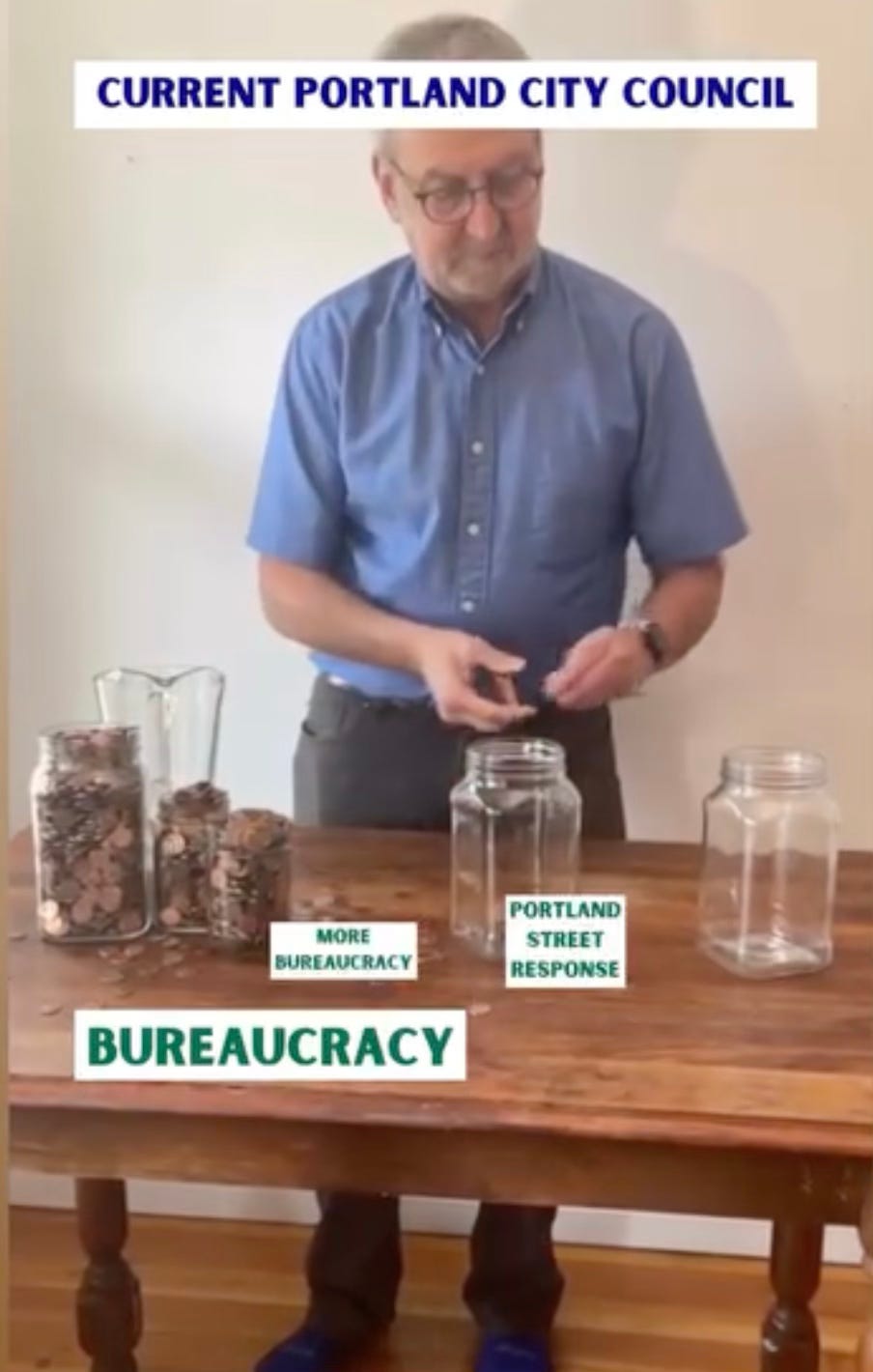
Oregonian/OPB Candidate Survey Shows Overwhelming Support for PCEF Among City Candidates
PORTLAND, September 18, 2024 — A recent candidate questionnaire circulated by The Oregonian and OPB revealed that most 2024 candidates for mayor and City Council support the Portland Clean Energy Fund (PCEF), a voter-approved tax on large retailers funding clean energy, job training, and green infrastructure.
Since its 2018 inception, PCEF has generated far more revenue than expected, with nearly $1.5 billion projected by 2028. This windfall has sparked debate over the allocation of funds, particularly after $7.6 million in interest was used this year to fill gaps in the city budget, raising concerns about diverting the fund from its original climate and social justice goals. In March, Willamette Week reported that Commissioner Rene Gonzalez was considering sending a revised version of PCEF to voters, though no such effort materialized.
The Oregonian/OPB survey asked council candidates the following question: Do you support putting the Clean Energy Fund measure back on the ballot? What, if any, changes would you support?
While over 30 candidates either didn’t answer the question directly or return the questionnaire at all, nearly 50 candidates replied no. “Voters spoke decisively when they approved PCEF in 2018. [...] We need to safeguard these funds and ensure their efficiency,” wrote Candace Avalos, the executive director of the environmental nonprofit Verde, who is running for a seat in District 1. Avalos’ stance was echoed by Marnie Glickman, a political strategist running in District 2, who said, “We are fortunate to have PCEF because climate resilience costs are rising. [...] PCEF is working better and better and shouldn’t be raided to fund other needs.”
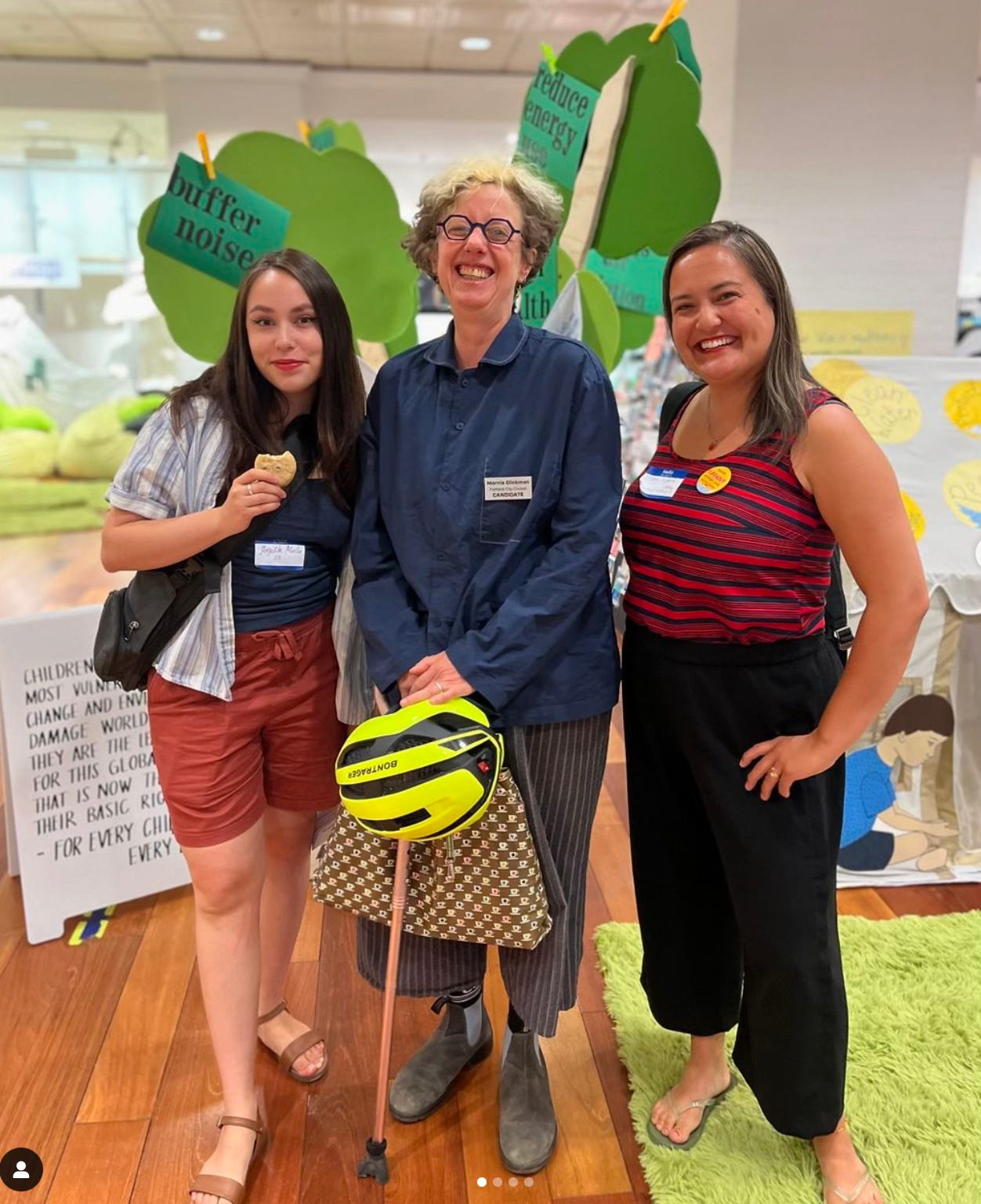
Calls for Council Influence Over Selection Process
Some candidates who support PCEF suggested giving the council more direct influence over the use of its funds. “The one change I would see helpful is to have the selection process brought directly under the council’s purview,” wrote Rex Burkholder, a former Metro Councilor who is running in District 3.
While City Council has the final say over PCEF investments, the selection process is currently handled by a community-based committee. Bob Weinstein, a former mayor of Ketchikan, Alaska, who is running in District 4, argued that the council needs more flexibility in its ability to spend PCEF’s surplus funds. “While I don’t advocate putting it back on the ballot, I support allowing council discretion to allocate excess funds to other pressing city needs while maintaining PCEF’s core mission and funding,” he wrote.
Approximately 15 council candidates indicated support for returning PCEF to voters. “I believe there are exciting opportunities to use these funds for programs which are climate-related, but we need budget stability and flexibility in the short run. I want to preserve the original projected size of the program and move the excess to the general fund,” wrote Eli Arnold, a Portland police officer who is running for a seat in District 4. A similar answer came from Eric Zimmerman, chief of staff to County Commissioner Julia Brim-Edwards. “Yes, voters should have another say on the fund. The fund reputation had to be saved by Commissioner Rubio, and she laid out a strong plan to broaden the use of it. I think making the case with voters is smart and would help rinse off distrust surrounding the program,” wrote Zimmerman, who is also seeking a seat in District 4. Other candidates who support sending PCEF back to voters include Noah Ernst, a taxi company supervisor in District 1; Mike Marshall, co-founder of the recovery advocacy organization Oregon Recovers, running in District 2; and Daniel DeMelo, a community organizer and engineer in District 3.
One candidate, community organizer Chris Olson in District 2, supported putting the tax back to voters in an effort to increase it. “I support putting the Clean Energy Fund measure back on the ballot with an increase in the PCEF tax to 2% for large corporations. This change ensures greater investment in renewable energy, green jobs, and economic justice, funded by those most able to contribute,” Olson stated.
A small number of candidates appear to have been under the impression that PCEF needs to go back on the ballot to be renewed, which is not the case, since the tax is not set to expire.
Mayoral Candidates Say PCEF Funds Should Be Reserved for Original Purpose
Mayoral candidates received a different question: Do you support the decision to use millions from the Portland Clean Energy Fund to backfill budget holes in various city bureaus? Would you seek to continue, expand, or halt that practice?
While eight candidates either didn’t return the questionnaire or didn’t answer the question directly, ten candidates indicated that they would not support the use of PCEF funds to fill budget holes. “I believe the Portland Clean Energy Fund should be used for its intended purpose — investing in climate solutions. I would halt its use for backfilling budget holes, as it compromises the fund’s mission,” wrote City Commissioner Mingus Mapps. His colleague and mayoral rival, City Commissioner Carmen Rubio, agreed: “The Mayor and the PCEF committee agreed this year for a one-time redirect of interest earned on the funds – I am committed to holding the line moving forward,” Rubio said.
City Commissioner Rene Gonzalez, who in March indicated interest in sending PCEF back to voters, was less definitive. “The corporate surcharge that funds PCEF is producing seven times its original projections. We must evaluate on an ongoing basis how to most strategically deploy this source of revenue. Stabilizing funding for city bureaus is a legitimate use of those funds and should be done openly and transparently.”
Mayoral candidate Keith Wilson, who is president of Titan Freight System, an eco-friendly trucking company, said he would not support the use of PCEF funds to fill budget holes.
“City leadership has siphoned away millions from the Portland Clean Energy Fund without a clearly articulated goal or financial accountability. I strongly oppose diverting PCEF funds to any purpose other than originally intended by Portland voters,” Wilson said.
Liv Østhus, an artist and stripper also running for mayor, also indicated she would oppose the usage of PCEF funds for non-climate-related purposes. “We could throw ten times the amount at the problem and still need more. Use the funds to hatch an actionable plan to move and improve the Critical Energy Infrastructure hub,” she wrote, referring to the cluster of fuel storage facilities along the Willamette River. This area has been a source of environmental concern for many Portlanders, particularly for communities living near the tanks.

Sierra Club Endorses Rubio and 13 Council Candidates
PORTLAND, September 17, 2024 — The Oregon chapter of the environmental advocacy organization Sierra Club has endorsed City Commissioner Carmen Rubio for mayor. The group, one of the most influential endorsements for candidates seeking to sway voters who prioritize climate action and environmental protections, also backs thirteen council candidates.
In District 1, Sierra Club supports Candace Avalos, Jamie Dunphy, Timur Ender, and Steph Routh. In District 2, it has endorsed Michelle DePass, Marnie Glickman, and Nat West. In District 3, the group backs Rex Burkholder, Tiffany Koyama Lane, and Angelita Morillo. Its picks in District 4 are Lisa Freeman, Mitch Green, and Chad Lykins.
Other environmental organizations that have endorsed many of the same names are Lead Locally, Jane Fonda Climate PAC, and Sunrise Movement PDX.
City Auditor Finds No Campaign Violation by Rene Gonzalez in Wikipedia Case, Refers Case to Secretary of State
PORTLAND, September 16, 2024 — The Portland City Auditor’s Office has found no conclusive evidence that Commissioner Rene Gonzalez violated campaign finance law by using $6,400 in City funds to edit his Wikipedia page. The edits removed a reference to Gonzalez tagging a member of the far-right group Patriot Prayer on Twitter, prompting a complaint alleging the edits were intended to benefit his mayoral campaign, thus constituting an illegal campaign contribution.
“The evidence obtained to date is insufficient to find that a violation occurred,” the Auditor’s Office said in a statement, but noted the case was a close call.
The matter has now been referred to the Oregon Secretary of State to investigate whether any City employees engaged in prohibited political activities. City Auditor Simone Rede, herself running for re-election, is recused from all campaign finance investigations and did not personally oversee the investigation, which was instead handled by her staff.
Jaclyn Smith-Moore Exits District 3 Race, Remains on Ballot
PORTLAND, September 16, 2024 — Jaclyn Smith-Moore, a candidate for Portland’s District 3, has ended their campaign. However, since the deadline to withdraw from the ballot was August 30, Smith-Moore will still appear on the ballot.
"While I'm sad to be leaving the race, I am excited to focus on supporting Jesse Cornett as Policy Writer and Advisor," Smith-Moore stated on Instagram. "I believe Jesse has the vision, determination, and experience to be a strong advocate for District 3."
Smith-Moore was the only transgender candidate in the 2024 city election. Two nonbinary candidates remain in the race: Chris Flanary in District 3, and Andra Vltavín in District 4.
Ernst, DePass, Kanal, and Flanary Qualify for Taxpayer Campaign Financing
PORTLAND, September 16, 2024 — Four additional candidates have recently qualified for public campaign financing. In District 1, Noah Ernst, a superintendent at Radio Cab, has qualified for $31,185 in taxpayer funds. In District 2, Michelle DePass, a climate change analyst for the City of Portland and Portland Public School Board member, qualified for $34,875, while Sameer Kanal, a policy manager for the City of Portland's Public Safety Service Area, secured $13,563. In District 3, Chris Flanary, a union organizer and Housing Program Specialist with the City of Portland, has qualified for an undisclosed amount.
This brings the total number of council candidates qualifying for public financing to 42, in addition to five mayoral candidates. Portland’s public campaign financing program matches small donations up to $20 at a 9-to-1 ratio, meaning a $20 contribution generates $200 for the candidate. Mayoral candidates may collect up to $100,000, while council candidates can raise up to $120,000.
While the qualification deadline was August 27, the city's processing office has experienced delays due to the large number of applications. Six council candidates are still under review, and those who did not meet the deadline will not receive taxpayer funds.
No Joint Labor Endorsement in Voter’s Pamphlet
PORTLAND, September 15, 2024 — The Multnomah County Voter Guide, set to be mailed to voters next month, is filled with endorsements from advocacy groups, community leaders, elected officials, and labor organizations. However, one highly anticipated endorsement is notably absent: Working for a Better Portland, a newly formed political action committee (PAC) aimed at uniting multiple unions behind a slate of candidates, did not unveil its picks in time for candidates to submit earned endorsements by the Sept. 9 deadline.
Instead, key labor groups like the NW Oregon Labor Council and SEIU have made independent endorsements, supporting candidates ranging from established figures such as City Commissioner Dan Ryan to up-and-comers like Tiffany Koyama Lane, a teacher and union organizer gaining traction in District 3. The absence of a joint endorsement from the PAC suggests a less centralized approach from labor unions in this election cycle than many had anticipated.
Though Working for a Better Portland did not finalize endorsements for the voter guide, the PAC is still expected to invest in key races. It recently received a $10,000 contribution from LiUNA 737, a labor union representing construction workers and public employees in Oregon and Southwest Washington.
Both NW Labor Council and LiUNA 737 back Candace Avalos, Jamie Dunphy, and Steph Routh in District 1; Elana Pirtle-Guiney and Jonathan Tasini in District 2; Chris Flanary and Steve Novick in District 3; and Olivia Clark, Tony Morse, and Eric Zimmerman in District 4. However, while NW Labor Council has endorsed Carmen Rubio for Portland mayor, LiUNA 737 recently withdrew its endorsement after reports surfaced regarding Rubio’s history of traffic violations.
Eric Zimmerman Calls for Ban on RV Camping in Portland
PORTLAND, September 15, 2024 — Eric Zimmerman, a candidate in District 4, has made the issue of RV camping a central focus of his campaign for City Council.
"It’s time to ban RV camping on Portland streets,” Zimmerman recently wrote in an email to supporters. “They have ruined too many quiet neighborhood streets and they are hard to get removed."
Zimmerman, an Army veteran who serves as Chief of Staff to County Commissioner Julie Brim-Edwards, cited concerns about possible criminal activity as a reason for his opposition to the parked vehicles. "At best, they’re the once-mobile version of tents on sidewalks. At worst, they’re a haven for hard drug usage or sales, hot spots for human trafficking," he wrote.
He proposed legislation to ban RV camping and secure funding for the removal of these vehicles. Zimmerman also pointed to Temporary Alternative Shelter Sites (TASS) as a safer, more regulated solution for addressing homelessness. TASS sites are designated areas where people living unsheltered can camp with access to basic services such as sanitation and healthcare.
Zimmerman acknowledged that his stance might provoke criticism, saying, "If only one City Council candidate has the guts to say it, then I’ll be the one."
Liv Østhus Campaign to Receive Public Financing Boost in Portland Mayor Race
PORTLAND, September 13, 2024 — Liv Østhus, a stripper running for Portland mayor, is about to receive a significant cash boost for her campaign. While her fundraising efforts have been modest, with just over $34,000 raised since she announced her candidacy in March, she recently qualified for nearly $84,000 in public campaign financing.
Portland’s public campaign financing program, Small Donor Elections, provides a 9-to-1 match on donations of $20 or less for candidates who secure 750 such donations from individual Portlanders. Østhus may now continue to receive taxpayer funds up to $100,000. So far, four other candidates have qualified for public financing: Rene Gonzalez, Carmen Rubio, Keith Wilson, and Mingus Mapps.
As of today, Gonzalez reports contributions totaling over $276,000, while Rubio has raised over $229,000, and Wilson has amassed nearly $207,000. Mapps, who has not yet reported his $100,000 public match, has so far raised approximately $80,000.
Gonzalez, Wilson, and Rubio Debate Mental Health and Homelessness at Progreso Latino Event
PORTLAND, September 12, 2024 — At a Wednesday night debate organized by Progreso Latino, an organization advocating for Oregon’s Latinx communities, Portland mayoral candidates Rene Gonzalez, Keith Wilson, and Carmen Rubio discussed their approaches to addressing the city’s homelessness and mental health crises. While they agreed on the urgency of these issues, a sharp exchange occurred when Gonzalez criticized Wilson's focus on expanding shelter capacity as “overly shallow.”
Wilson, who promises to end unsheltered homelessness in his first year as mayor by implementing a network of nighttime emergency shelters, argued that Portland should follow the example of cities like Boise, ID, and Boston, MA, where the number of unsheltered people is just over 100. He stated that Portland’s over 5,000 unsheltered individuals represent a humanitarian crisis, straining both public safety officers and emergency room staff, and leading to longer emergency response times. “Our hospitals are now sheltering the unsheltered,” he said, referencing other cities with larger shelter capacities and fewer people living on the streets. “There’s nothing progressive about leaving people on the streets.”
Gonzalez countered by arguing that Wilson’s shelter-based strategy fails to address underlying issues such as addiction and criminal behavior. “If you put an addict or a criminal in a shelter, they’re still an addict or a criminal. They will still tax the system. Shelter alone, as important as it is, is not going to solve someone's behavioral health, medical needs, or criminal behaviors overnight. It’s a false promise, and it’s overly shallow.” He proposed a more comprehensive approach, including addiction treatment, stricter enforcement of camping and drug laws, and increasing Portland’s police force to 1,000 officers.
Wilson responded, “In Portland, we have one department handing out tents while another department is sweeping them. What kind of rational approach is that?”
Commenting on the exchange, Carmen Rubio argued that public camping bans are unlikely to be effective, saying they merely relocate unsheltered people to unsafe areas like bridges and overpasses. She called for expanded access to shelter with on-site mental health and addiction services. Referring to Wilson’s promise to end unsheltered homelessness within a year, she said, “I don’t think that quick fixes, like a one-year plan, are realistic. But I agree that it’s neither compassionate nor progressive to leave people suffering on our streets.”
For Voters, a Choice Between Track Record or Trying Something New
During closing statements, Wilson criticized his opponents’ track records, claiming they have failed to adequately address the homelessness crisis: “My opponents have had years to build coalitions and deliver results, and they haven’t,” he said. “If you like the way the city is being run, I’m not your guy. But if you want real change—vote for me.”
Gonzalez emphasized his commitment to public safety: “I have led the fight and been the standard-bearer on public safety. That means taking on hard topics and balancing compassion without enabling,” he said. “This has been a dark era for the City of Portland, but there is light at the end of the tunnel, and we've got to lean in on redefining what a western city looks like post-pandemic.”
Rubio, who often refers to herself as the “no drama” candidate, closed by highlighting her track record and claiming credit for initiatives such as police body-worn cameras and efforts to streamline the city permitting process and incentivize housing production. “We don’t need more drama or division. We just need real, accountable, and competent leaders—leaders who know how to work together, build coalitions, and make tough choices to get things done,” she said.
Rubio, Gonzalez, and Wilson are among nineteen candidates running for mayor. Other candidates, including City Commissioner Mingus Mapps and artist and stripper Liv Østhus, did not qualify for the debate due to not meeting the public campaign financing deadline.


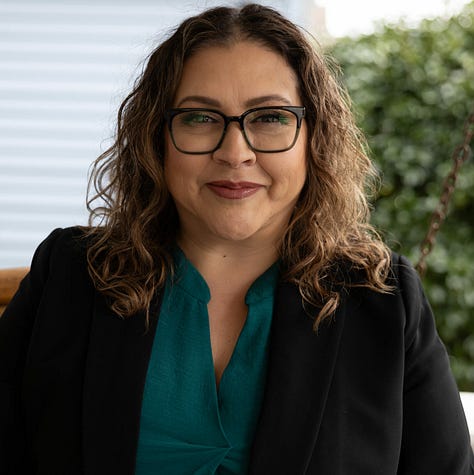
Portland Mayoral Candidates Raise Concerns Over Tax Burden but Offer Few Specific Solutions at Chamber Debate
PORTLAND, September 12, 2024 — In a debate hosted by the Portland Metro Chamber this morning, mayoral candidates Carmen Rubio, Keith Wilson, and Rene Gonzalez discussed a range of issues, including the city’s growing tax burden. All three candidates raised concerns about the impact of high taxes on residents and businesses, though specific plans to address the issue were sparse.
Rene Gonzalez criticized recent tax measures, such as the Metro and Multnomah County universal pre-K taxes, suggesting they are driving high earners out of the city. "We're literally driving away other taxes the city can collect," Gonzalez stated, adding that the public’s increasingly negative attitude toward new taxes has delayed investments in essential services like parks and public safety. He added that some wealthy Portlanders keep their house in the city but simply change their residency to another jurisdiction to lower their tax burden, calling it a "perverse incentive."
Carmen Rubio echoed concerns about the tax burden, noting that many residents are leaving because they no longer see the value of staying in Portland or Multnomah County. "We don't have an attraction problem, we have a retention problem," Rubio said, pointing to her past efforts to incentivize downtown leases and expand enterprise zones.
Keith Wilson argued that Portlanders are "paying New York City taxes without getting New York City services." He added, "If you look at who's left, it’s not just the population, not just higher earners, but corporations like Target, REI, Walmart, and Starbucks." Wilson called for a review of existing taxes, including the business tax funding the Portland Clean Energy Fund and Multnomah County’s Preschool for All tax on high earners, which he argued has generated significantly more revenue than intended.
Gonzalez, Rubio and Wilson were the only mayoral candidates invited to the event. A total of nineteen candidates are running for Portland Mayor, including City Commissioner Mingus Mapps and artist and stripper Liv (Viva) Østhus.
Ben Hufford Blames 18% Fee for Stalling Housing Development, Proposes Cutting Red Tape
PORTLAND, September 12, 2024 —Ben Hufford, a Portland architect running for City Council in District 4, is putting the spotlight on what he describes as the city’s crippling housing fees and red tape. Citing his own experience, Hufford outlined a hypothetical $10 million, 50-unit housing project that would incur $1.8 million in taxes and fees—an 18% cost he says is stopping housing development in its tracks.
“We are in a massive housing shortage, and that will only be fixed if we cut the red tape,” Hufford said. “The costs and bureaucracy are stopping projects before they even begin.”
With the city well short of its goal to build 6,000 housing units annually—fewer than 500 are expected this year—Hufford is proposing to overhaul the permitting process to cut costs for developers. His focus includes affordable housing, market-rate units, and shelters to address the city's growing housing crisis.
Hufford, who has run a fairly quiet campaign until now, has recently picked up a number of consequential endorsements from business and real estate groups, such as United for Portland, Multifamily NW, and Revitalize Portland. He is also one of the candidates backed by both City Commissioners Carmen Rubio and Rene Gonzalez, who are rivals in the mayoral race.
Rubio Withdraws Endorsement of Jamie Dunphy
PORTLAND, September 11, 2024 — City Commissioner Carmen Rubio has withdrawn her endorsement of Jamie Dunphy, a candidate for District 1. Dunphy, Government Relations Director at the American Cancer Society Cancer Action Network and a board member of MusicPortland, recently made a controversial comment during a forum opposing a planned 62,000-square-foot Live Nation music venue in Portland’s Central Eastside.
At the event, when asked about possible actions if the Portland City Council rejected MusicPortland's appeal of the project, Dunphy said, “I’ll tell you that in the process of reaching out to the music community, more than one person suggested firebombs.” Shortly thereafter, Dunphy faced criticism for referencing violence, particularly firebombing—a tactic historically used by white supremacists to terrorize and suppress civil rights leaders.
Andrew Colas, CEO of Colas Development Group, one of the firms developing the Live Nation project, later wrote a letter to MusicPortland expressing his concerns about Dunphy’s remark. Colas, who is Black, described the comment as “unacceptable, fanatical, and rooted in racism,” according to The Oregonian.
In response, MusicPortland issued a public apology, acknowledging that Dunphy’s words were “culturally insensitive and unacceptable.” Dunphy also admitted to The Oregonian that his remarks were “poorly phrased.”
Rubio’s campaign confirmed to Rose City Reform that she had withdrawn her endorsement of Dunphy but did not explicitly state that the "firebombing" comment was the reason.
Carmen Rubio Apologizes to Supporters
PORTLAND, September 11, 2024 — City Commissioner Carmen Rubio apologized to supporters today after news broke that she had accumulated over 150 parking and traffic violations over the past two decades. According to The Oregonian, her driver's license has been suspended at least six times due to unpaid fines or failure to appear in court.
“I know that the best things to do when you make mistakes are to take responsibility, clean up the mess, and do better going forward. And that's what I've done,” Rubio wrote. “When I paid my fines off many years ago, I closed the book on those times. But I haven't forgotten the lessons I learned.”
Willamette Week reported that Rubio’s colleague and closest rival, Commissioner Rene Gonzalez, also has a history of traffic-related offenses. Gonzalez has received approximately 20 tickets in the past, leading to two license suspensions for nonpayment of fines. While he acknowledged his mistakes to Willamette Week, Gonzalez has not yet addressed his traffic record with his supporters.
Jon Walker Proposes Minimum Service Ratio for Portland Non-Profits
PORTLAND, September 11, 2024 — District 3 candidate Jon Walker is calling for the City of Portland to adopt a Minimum Service Ratio (MSR) requirement for non-profits receiving city grants and contracts. Drawing on his experience as a policy analyst for the Oregon Health Authority, where he enforces a similar rule for Medicaid funds, Walker believes this measure would ensure that a larger portion of city funds goes directly to services rather than being lost to overhead costs.
Walker points to the recent financial struggles at the Community Cycling Center, a nonprofit focused on making cycling accessible to underserved communities. According to Walker, despite receiving over $1 million in Portland Clean Energy Fund (PCEF) grants, the organization is facing serious financial issues due to high administrative costs. He argues this example highlights the city's need for stronger financial oversight.
“The city needs to better vet nonprofits and should be able to get back money when it is clear not enough is being spent on services versus overhead,” said Walker.
Powerful Business PAC Unveils Picks for Portland City Council
PORTLAND, September 10, 2024 — United for Portland, a political action committee (PAC) backed by business groups, real estate interests, and local civic leaders, has announced its picks for Portland City Council. Known for having one of the most rigorous endorsement processes among local PACs, the group required candidates to attend four educational events, complete a questionnaire that aligned with their priorities, and secure 250 unique donations to qualify.
In District 1, the candidates are Noah Ernst, Terrence Hayes, and Loretta Smith.
For District 2, the chosen candidates include James Armstrong, Michelle DePass, Marnie Glickman, Mariah Hudson, Debbie Kitchin, Mike Marshall, William Mespelt, Tiffani Penson, Elana Pirtle-Guiney, Dan Ryan, and Nat West.
District 3’s picks are Rex Burkholder, Jesse Cornett, Daniel DeMelo, and Steve Novick.
Finally, in District 4, the endorsed candidates are Eli Arnold, Olivia Clark, Ben Hufford, Tony Morse, Stan Penkin, Bob Weinstein, and Eric Zimmerman.
United for Portland has played a significant role in recent elections, backing multiple current members of the council, such as Mayor Ted Wheeler, Mingus Mapps, and Rene Gonzalez. All of this year’s candidates have received the organization’s “greenlight” endorsement. United for Portland is expected to unveil its top picks from the list at a later date.
Mingus Mapps: “As a Black Man, If I Had Over 150 Traffic Violations, I’d Be in Jail.”
PORTLAND, September 10, 2024 — City Commissioner and mayoral candidate Mingus Mapps criticized his opponents, Carmen Rubio and Rene Gonzalez, following reports of their histories of traffic violations. According to The Oregonian, Rubio has accumulated over 150 parking and traffic violations in the past two decades, largely for expired meters and registration tags. Her driver's license has been suspended at least six times due to unpaid fines or failure to appear in court. Willamette Week later revealed that Gonzalez has approximately 20 traffic-related offenses, resulting in his license being suspended twice for nonpayment of fines.
In an email to supporters, Mapps framed the issue as one of privilege. "Let’s be real—this isn’t just about traffic tickets. It’s about privilege. My opponents' actions show they feel that they are above the law, a luxury most Portlanders, especially those of us from marginalized communities, don’t have," Mapps wrote. He emphasized that he has not received any traffic citations, drawing a clear contrast between his record and those of Rubio and Gonzalez. "As a Black man, I don’t get to flout the rules. I live by them, and I’ll make sure our leaders do too. If I had over 150 violations in recent years, not only would I not be on the City Council today, I would be in jail."
Since the Oregonian article, at least one labor union, LiUNA Local 737, has withdrawn its endorsement of Rubio.
Eli Arnold Suggests Victim Check-In Policy for Portland Police
PORTLAND, September 10, 2024 — Portland police officer and District 4 candidate Eli Arnold has proposed a new policy for the Portland Police Bureau.
In an Instagram video, Arnold suggested that officers who respond to a call should be required to follow up with the victim during their next shift, regardless of whether it's necessary for evidentiary purposes. He referred to the policy as a "victim check-in."
"I want to do this because I've seen firsthand the important role police play in helping people move past that initial moment of victimization," Arnold said, describing officers as the "uniformed representatives of the community." He added that the follow-up, particularly emphasizing the victim's experience of being wronged, could have a therapeutic effect.
"I think it's good for victims, and I think it's a low-effort way to ensure we're looking out for people," he said.
Angelita Morillo On Accountability as an Elected Official
PORTLAND, September 10, 2024 — District 3 candidate Angelita Morillo responded to a follower's question on TikTok about how she would remain accountable to voters if elected. Morillo, whose TikTok account has over 34,000 followers, said she plans to continue using the platform to provide weekly updates on City Council discussions and voting outcomes. She also committed to hosting town halls in District 3, allowing community members to participate in decision-making and stay informed on policy developments.
Morillo stressed that accountability is a two-way street. "The reality is that being [an] elected official is going to be very different than being an advocate," she said. "Depending on the makeup of the council, I'm going to need seven out of 12 votes to pass policy, and if we don't have a lot of strong progressives on the council, then guess what? Even if you get me in and you think I'm your magic candidate, I'm not going to be able to pass the most progressive policies ever unless I somehow change a bunch of people's minds who are more conservative or closer to the right than I am."
She also emphasized the importance of voter engagement beyond election cycles, adding, "You need to be pushing City Council and helping to give us leverage… we're going to need leverage if you want us to push for progressive policies as hard as we can."
Morillo is running as one of the most progressive candidates in the race, opposing Portland’s public camping ban and the re-criminalization of small amounts of street drugs.
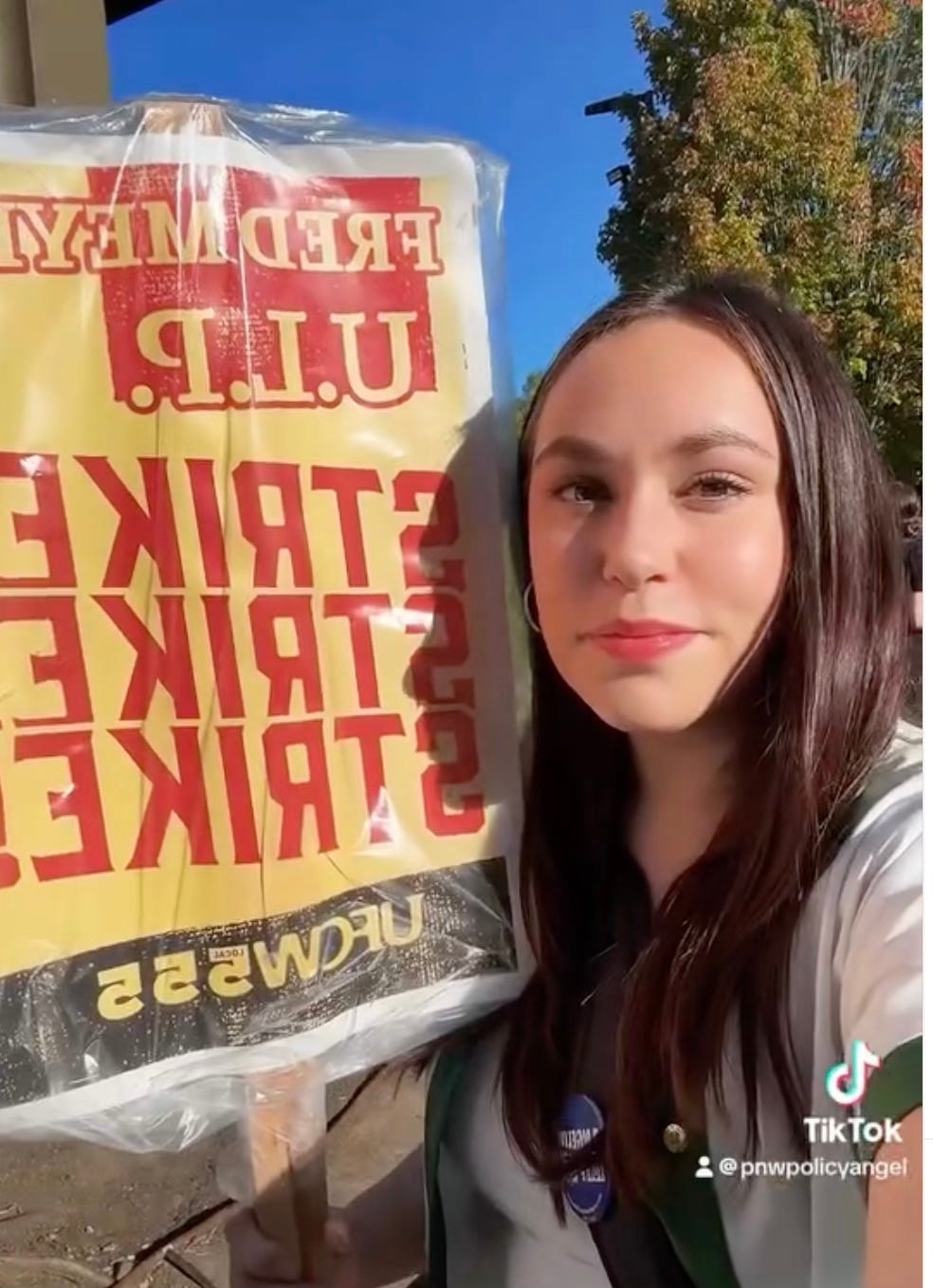
We’re on the Oregonian’s Beat Check Podcast!
PORTLAND, September 8, 2024 — September has been a big month for Rose City Reform. In addition to launching our own podcast, Stump Talk, I had the opportunity to join Shane Kavanaugh from The Oregonian on the Beat Check podcast to discuss one of my favorite topics: the Portland 2024 election. Take a listen!
Jamie Dunphy’s Apology Missed the Mark, Business Leader Says
PORTLAND, September 8, 2024 — Portland business leader Stephen Green has publicly criticized District 1 candidate Jamie Dunphy for comments made during a MusicPortland forum and for what Green described as Dunphy’s failure to take accountability afterward. The forum was organized to address opposition to a proposed 62,000-square-foot Live Nation music venue in Portland’s Central Eastside, which MusicPortland and its supporters argue could harm the city's independent music scene.
During the event, Dunphy, a MusicPortland board member, responded to a question about potential actions if the City Council rejected the group’s appeal. He said, “I’ll tell you that in the process of reaching out to the music community, more than one person suggested firebombs.” Dunphy later clarified in a statement to the Portland Business Journal that the remark was intended as "dark-humored truth" and that “violence is obviously not the answer.”
One of the firms developing the Live Nation project, Colas Development Group, is owned and run by Andrew Colas, who is Black.
Green, who has Black and Latinx heritage, expressed concern over both the comment and Dunphy’s response. In a LinkedIn post, Green pointed out that firebombing, historically linked to racial violence in the U.S., was an inappropriate subject for humor, especially in a public forum. "As tough as things are for our small businesses in Portland, they will never advocate for, joke about, or even allude to violence as the answer to the challenges they face," Green wrote. He also criticized Dunphy for attributing the comment to community feedback, stating, “Saying that small businesses in the community referred to firebombing… tells us you have a problem taking accountability for the words that come out of your mouth.”
Green, a prominent figure in the Portland business community, is the founder of PitchBlack, a competition supporting Black and Latinx entrepreneurs, and serves as Executive Director of the business organization Better Portland.
Voter Pamphlet Deadline Brings Endorsement Blitz
PORTLAND, September 8, 2024 — With Monday’s deadline to submit information to the Multnomah County Voter’s Pamphlet fast approaching, many interest groups are finalizing their endorsements for inclusion in the widely-read voter guide.. The chance to reshape City Hall—with all fourteen seats in the newly reformed government up for grabs—presents a unique opportunity not only for candidates but also for interest groups hoping to influence the outcome. As a result, the 2024 election has seen an influx of endorsements from organizations and political players. As of September 8, over 200 elected officials, around 30 advocacy organizations, nearly 40 labor unions, and three political parties have endorsed their favorites among the 118 candidates vying for city seats.
Endorsement strategies vary: Some organizations endorse three candidates per district for the three available seats, while others recommend six candidates per district to align with Portland voters’ six ballot rankings. Meanwhile, some groups simply endorse their preferred candidates without regard to the number of seats or rankings.
Rubio Leads in Endorsements
In the mayoral race, City Commissioner Carmen Rubio leads in endorsements, securing support from over 20 progressive elected leaders and several social justice organizations. Her backers include Governor Tina Kotek, former Governor Kate Brown, and former Portland Mayor Tom Potter, for whom Rubio previously worked. Her platform, focusing on climate action, housing expansion, community policing, and tackling poverty and homelessness, has also garnered support from the Sierra Club, the Working Families Party, and labor organizations like the Portland Association of Teachers and AFSCME Oregon.
Rene Gonzalez, whose platform emphasizes economic revitalization and stricter enforcement of public camping and drug bans, has received endorsements from the Portland Police Association, the Portland Firefighters Association, and several regional sheriffs and district attorneys. He is also supported by various trade unions and former U.S. Congressman Kurt Schrader. Keith Wilson, running on a promise to end unsheltered homelessness within his first year as mayor by rolling out a network of flexible, low-cost overnight shelters, is supported by a mix of trade unions, homelessness experts, and elected officials, including the mayors of Lake Oswego and Hillsboro.
Avalos and Cornett Secure Most Endorsements from Elected Officials
As of September 8, the council candidates who have attracted the most endorsements from elected officials are Candace Avalos, an environmental and criminal justice advocate in District 1, and Jesse Cornett, a recovery advocate in District 3. Jonathan Tasini, a writer and lifelong union organizer in District 2, leads in labor endorsements, closely followed by Tony Morse, a recovery and labor advocate in District 4. Environmental organizations, such as the Sierra Club, favor Candace Avalos, District 2’s Nat West, and District 4’s Mitch Green.
Business endorsements, which have been slower to roll out, include backing from Revitalize Portland, a pro-business group focused on public safety and economic growth. Their endorsed candidates include former Multnomah County Commissioner Loretta Smith in District 1 and City Commissioner Dan Ryan in District 2.
According to sources, United for Portland, a business-friendly political action committee (PAC) expected to spend heavily in local races, has quietly made endorsements ahead of Monday’s deadline, though no formal announcements have been made. United for Portland includes contributions from the Portland Metro Chamber and the Portland Metropolitan Association of Realtors PAC.
Additionally, the PAC Working for a Better Portland, which represents labor unions and social justice groups, is expected to release its much-anticipated endorsements soon, likely informing candidates before the Voter’s Pamphlet submission deadline. To research candidates’ endorsements, visit our impartial voter guide.
118 Candidates—and We’re Done!
PORTLAND, September 6, 2024 — After more than a year of anticipation since the first candidates announced their bids in July of last year, the filing window for city offices has officially closed. The final count includes 19 mayoral candidates, 98 council candidates, and one unopposed candidate for city auditor—incumbent Simone Rede. However, the door isn’t entirely closed: certified write-in candidates have until October 29 to file, so more names could still appear on the ballot.
Much Anticipated Business Endorsements Dropping Soon
PORTLAND, September 6, 2024 — United for Portland, a political action committee (PAC) backed by business associations, real estate interests, and civic leaders, will soon unveil its endorsements across all council districts. The organization’s training sessions, mandatory for those seeking its backing, have drawn a large crop of council hopefuls. Among those rumored to get a nod are District 4 candidates Olivia Clark, a longtime legislative director; Tony Morse, a recovery advocate and union supporter; and Eric Zimmerman, chief of staff to County Commissioner Julia Brim-Edwards. United for Portland's contributors include the Portland Metro Chamber and the Portland Metropolitan Association of Realtors PAC.
New Grassroots Group, 12 for PDX, Announces Endorsements
PORTLAND, September 6, 2024 — A newly formed grassroots group called 12 for PDX, consisting of eighteen volunteer members tasked with vetting city candidates, announced its picks yesterday. The name is a nod to the twelve council seats up for election in November.
“This election cycle is full of major changes that will impact all Portlanders. Our 12 for PDX volunteers have done some of the heavy lifting to help voters make informed choices come November 5," said group member Edy Dorsen in a statement.
The organization’s picks are Candace Avalos, Jamie Dunphy, Noah Ernst, Terrence Hayes and Steph Routh in District 1; Michelle DePass, Mariah Hudson, Debbie Kitchin, Elana Pirtle-Guiney, Tiffani Penson, Dan Ryan, and Bob Simril in District 2; Rex Burkholder, Jesse Cornett, Philippe Knab, and Steve Novick in District 3; and Eli Arnold, Olivia Clark, Stanley Penkin, John Toran, Bob Weinstein, and Eric Zimmerman in District 4.



Chad Lykins Refunds Donations After Questions Arise About Campaign Finance Laws
PORTLAND, September 5, 2024 — District 4 candidate Chad Lykins has refunded $145 in contributions following a report by Willamette Week journalist Sophie Peel. The report highlighted discussions among several city council candidates, including Lykins, Michael DiNapoli, Michael Trimble (District 4), and Sam Sachs (District 2), about exchanging $5 donations to help one another meet the 250-donor threshold required for public matching funds.
Although several candidates participated, Lykins was the only one who ultimately qualified for matching funds. Under campaign finance laws, donations exchanged solely to receive a reciprocal contribution are ineligible for public matching. Attorneys interviewed for the report also suggested that other campaign finance violations might be involved.
Lykins responded to the story on Twitter, thanking Peel for her reporting and stating, "Out of an abundance of caution, we’re refunding all $145 from the 15 donations we received." According to Peel, Lykins also sought guidance from the Secretary of State’s office to determine whether the contributions violated campaign finance laws. An official opinion is still pending.
Terrence Hayes Qualifies for Public Campaign Financing
PORTLAND, September 5, 2024 — Terrence Hayes, running for a seat in District 1 (East Portland) is the latest council candidate to qualify for public campaign financing. Hayes will receive $40,000 in taxpayer funds.
Portland’s public campaign financing program matches small donations up to $20 at a 9-to-1 ratio, meaning a $20 contribution from a resident can generate $200 for the candidate ($20 original donation plus $180 in matching funds). To qualify, candidates needed to collect and certify 250 individual contributions from Portlanders by August 27. Qualified candidates can continue to collect matching funds up to $120,000, providing a significant advantage over those who don’t meet the deadline.
Thirty-seven candidates have qualified for the program, with more likely to be announced in the coming days as the program, facing a historic number of participants, processes applications.
Former Alberta Main Street President Accused of Embezzlement Files for Office, Then Withdraws
PORTLAND, September 4, 2024 — In a strange turn of events, Devon Horace, accused of embezzling approximately $100,000 from the nonprofit Alberta Main Street, appeared on the city’s list of council candidates today. His name disappeared only hours later. According to the City Elections Office, he has withdrawn his candidacy.
Horace led Alberta Main Street, which supports the Alberta business district, from July 2021 to January 2023. According to Multnomah County Court records, he faces charges of four counts of Aggravated Theft in the First Degree, five counts of Theft in the First Degree, and seven counts of Falsifying Business Records. He has pleaded not guilty to all charges.
In a notable twist, James Armstrong, a forensic accountant and Alberta Street business owner who helped uncover the financial discrepancies at Alberta Main Street, is also running in District 2. Armstrong and his wife operate Alberta Eye Care, Cathedral Eye Care, and Eyestrong Pediatric Eye Care. He has qualified for $40,000 in public campaign financing and is endorsed by City Commissioner and mayoral candidate Carmen Rubio.
Armstrong declined to comment on Horace’s shortlived candidacy.
Labor PAC, ‘Working for a Better Portland,’ Gets Ready to Support Candidates
PORTLAND, September 4, 2024 — Working for a Better Portland, a political action committee (PAC) representing labor unions and allied groups, has officially launched its campaign to back pro-worker candidates in Portland’s upcoming city election. The PAC, highly anticipated for its role in shaping the election landscape, is planning to support candidates across the city’s four new council districts.
Given the labor organizations’ broad reach and substantial fundraising potential, Working for a Better Portland is expected to play a significant role in shaping public opinion and influencing voter choices.
“We hope to highlight candidates whose values and effectiveness will best serve our beautiful but challenged city,” said Laurie Wimmer, Executive Secretary-Treasurer of the NW Oregon Labor Council and the convener of the PAC. “With the introduction of ranked-choice voting, we aim to help voters not only select the right candidates but also understand how to cast their ballots correctly.”
Working for a Better Portland includes both public and private sector unions, as well as social justice organizations.
113 Candidates and Counting
PORTLAND, September 4, 2024 — The list of candidates for the city ballot continued to grow as city staff processed more applications yesterday. So far, 18 candidates have filed for mayor, while 95 are running for a council seat. Districts 3 and 4 have the highest numbers, with 29 candidates each.
Yesterday, a few expected names were confirmed, including environmental activist Ahlam Osman and Harrison Kass, policy advisor to City Commissioner Rene Gonzalez, both in District 3. Several new names, not previously associated with a campaign, were also added to the ballot—something common in elections. However, this will be the first time Portlanders see such candidates on the general election ballot, as in the past, a primary election either determined the winner or sent two candidates to a runoff.
Revitalize Portland Endorses 14 Candidates
PORTLAND, September 4, 2024 — The Revitalize Portland Coalition, a business-friendly group focused on public safety and economic vitality, has announced its endorsements for Portland City Council. In District 1, the organization supports Terrence Hayes and Loretta Smith. In District 2, its picks are Mariah Hudson, Tiffani Penson, and Dan Ryan. In District 3, the coalition backs Daniel DeMelo and Steve Novick.
In District 4, the coalition's top picks are Ben Hufford, Stan Penkin, and Eric Zimmerman, while it also backs Eli Arnold, Olivia Clark, Tony Morse, and Bob Weinstein.
More business endorsements are expected soon, as United for Portland, a political action committee (PAC) representing business associations, real estate interests, and civic leaders, prepares to release its endorsements. This PAC includes contributors such as the Portland Metro Chamber and the Portland Metropolitan Association of Realtors PAC.
Liv (Viva) Osthus Becomes Fifth Mayoral Candidate to Qualify for Public Match
PORTLAND, September 3, 2024 — Liv Osthus, an artist and dancer at the strip club Mary’s, is the fifth and final mayoral candidate to qualify for public campaign financing. Osthus, whose stage name is Viva Las Vegas, will now receive a 9-to-1 match on donation of $20 or less, up to $100,000. Other candidates who have qualified for public financing are Rene Gonzalez, Mingus Mapps, Carmen Rubio, and Keith Wilson.
Tiffany Koyama Lane First Council Candidate to Max Out on Public Campaign Financing
PORTLAND, September 3, 2024 — Tiffany Koyama Lane, a public school teacher and union organizer running in District 3, is the first council candidate to reach the final tier of the city’s public campaign financing program. This program matches small donations up to $20 at a 9-to-1 ratio, effectively turning a $20 contribution into $200 for the candidate. Koyama Lane’s rapid success in the program, which program director Susan Mottet noted as record-breaking at a recent meeting, has allowed her to secure the maximum $120,000 in public funds for her campaign.
Koyama Lane’s platform emphasizes affordability, workers' rights, housing, and addiction and behavioral health services. She advocates for stronger eviction defense resources and has pledged to fully fund Portland Street Response, the city’s unarmed first responders for mental health crises. Her platform has earned endorsements from the Working Families Party, several labor organizations, and numerous progressive elected leaders. To date, Koyama Lane has raised approximately $145,000, making her the top fundraiser among all council candidates. This total includes two rounds of public financing and will soon increase as she collects her third and final payout.
So far, more than 30 council candidates and four mayoral candidates—Rene Gonzalez, Mingus Mapps, Carmen Rubio, and Keith Wilson—have qualified for the program, with many more under review by the city.
Annual Labor Picnic Attracts City Candidates
PORTLAND, September 3, 2024 — City candidates gathered at the Northwest Labor Council’s annual labor picnic at the Clackamas County Fairgrounds to show their support for labor and workers' rights. The event followed a week-long grocery workers' strike at Fred Meyer stores and comes just days before a labor coalition is expected to announce its endorsements for labor-friendly candidates in city races. Fun fact: Oregon was the first state to make Labor Day an official holiday, back in 1887.
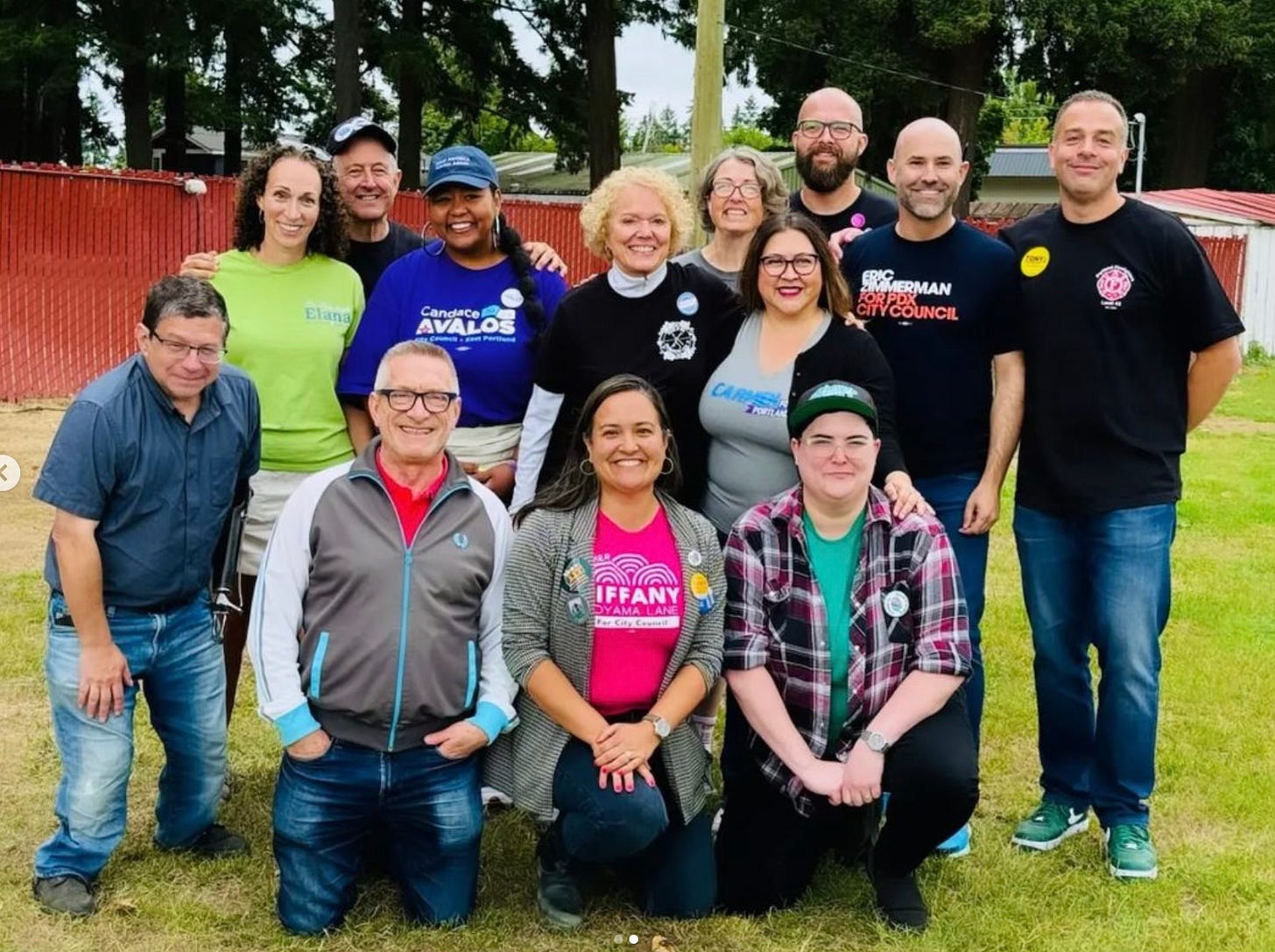
Friends of Portland Street Response Unveil Endorsements
PORTLAND, September 3, 2024 — The grassroots organization Friends of Portland Street Response has announced its endorsements for city council candidates. The organization advocates for a 24/7 version of Portland Street Response (PSR)—a city program that deploys unarmed first responders to address mental health crises—and its establishment as a co-equal branch of the city's emergency response network.
Several, but not all, of the endorsed candidates have signed the "Save Portland Street Response" pledge, committing to these initiatives. You can find the list of signatories here.
In District 1 (East Portland), the endorsed candidates are Candace Avalos, Timur Ender, and Steph Routh. In District 2 (North & Northeast), the organization supports Nat West, Marnie Glickman, Debbie Kitchin, Michelle DePass, Sameer Kanal, and Elana Pirtle-Guiney, though not all have signed the pledge. Angelita Morillo and Tiffany Koyama Lane have been endorsed in District 3 (Southeast Portland), while Lisa Freeman, Chad Lykins, and Mitch Green are the endorsed candidates in District 4 (West Portland and Sellwood area).
Eli Arnold Wants to Sleep in a Homeless Shelter
PORTLAND, September 2, 2024 — Portland police officer Eli Arnold, who is vying for a seat in District 4, posted a video on Instagram where he said he would like an invitation from a homeless shelter to spend the night.
“We had a saying in the army, ‘I wouldn’t ask you to do anything I wasn’t willing to do myself,’” said Arnold, an Army veteran who served in Afghanistan. “I don’t think you can have too much first-hand experience. If there’s a way, without displacing somebody and without using a needed bed, I would love to have the experience of actually checking in, entering the shelter and staying overnight,” he said.
Arnold, campaigning on a platform to end street camping, said his comments came in response to another city council candidate’s recent video claiming that shelters are often unsafe for those living on the street. While Arnold did not mention the other candidate by name, such a video was recently released by District 3 candidate Angelita Morillo, an anti-hunger advocate, who said some shelters are poorly run, but that houseless clients fear reporting violations due to fear of repercussions from staff.
Morillo, who opposes Portland’s current public cmaping ban, added that most houseless people do not feel safe reporting to any authority about what is going on inside shelter systems because they are afraid of losing what little support is being offered there. She also expressed concerns about the plan to arrest those repeatedly refusing shelter, citing a number of deaths reported in recent years, which she attributed to inmates not receiving adequate medical care.
Secretary of State Announces Ballot Order
PORTLAND, August 31, 2024 — The Oregon Secretary of State has announced the random order of letters that will determine the placement of candidates' names on the November 5 ballot. This process is designed to avoid giving candidates an advantage based on the alphabetical order of their last name.
The random order of letters for the 2024 ballot is as follows:
K | Y | W | V | B | O | G | E | N | A | I | J | P
M | X | L | T | C | F | S | U | H | Q | R | Z | D
Who’s on the Ballot? It’s a Cliffhanger…
PORTLAND, August 31, 2024 — While many candidates have qualified for the ballot after the filing window closed on August 27, the City was still adding names yesterday. A complete list is expected on September 5. Some much-anticipated names in District 2 were added at the 11th hour, including cidermaker Nat West and Portland Public Schools Board Member Michelle DePass. However, Sameer Kanal, who was expected to appear on the ballot, has not yet been added as a qualified candidate. The reason for the delay is unclear, but city officials are working under a heavier-than-usual workload given the unprecedented number of candidates.
Daniel DeMelo’s Home Vandalized
PORTLAND, August 31, 2024 — District 3 City Council candidate Daniel DeMelo’s home was vandalized on Friday, with several offensive messages spray-painted on the exterior. DeMelo believes the vandalism may be linked to the support he has received from Portland’s police officers, firefighters, and City Commissioner and mayoral hopeful Rene Gonzalez.
“I have faced arrest, felt the sting of tear gas, and endured the blows of batons while advocating for what is right. I have worked with Portland’s leading civil rights attorneys to hold police accountable in court. I have successfully fought to maintain community oversight over our $400 million-plus homelessness response system and $4 billion-plus county budget. And I will continue to fight for every Portlander with every fiber of my being, no matter the obstacles placed in our path,” DeMelo wrote in a statement.
SEIU Local 49 Endorses Candidates in Portland City Council Races
PORTLAND, August 30, 2024 — SEIU Local 49, the local branch of Oregon’s largest public employee union, has announced its endorsements for the upcoming November City Council races. The endorsed candidates span a spectrum of political views, from moderate Democrats like Mariah Hudson and Tiffani Penson in District 2 to progressive candidates such as Tiffany Koyama Lane and Angelita Morillo in District 3. Their platforms also differ significantly: Olivia Clark and Tony Morse in District 4 have received endorsements from the Portland Police Association, while candidates like Candace Avalos and Jamie Dunphy in District 1 have signed the "No Police Money" pledge, rejecting endorsements and contributions from law enforcement.
All of the chosen candidates have strong union backing, with District 2 candidate Jonathan Tasini, a lifelong union organizer, showing the highest levels of labor support. He is closely trailed by recovery advocate Tony Morse in District 4. SEIU’s organizational resources, including door-knocking, phone banking, and social media campaigns, are expected to play a key role in crowded council races.
Mayor: Carmen Rubio
District 1: Candace Avalos, Jamie Dunphy, Steph Routh
District 2: Mariah Hudson, Tiffani Penson, Elana Pirtle-Guiney, Jonathan Tasini, Nat West
District 3: Tiffany Koyama Lane, Angelita Morillo, Steve Novick
District 4: Olivia Clark, Chad Lykins, Tony Morse
Nancy Congdon Suspends Mayoral Campaign
PORTLAND, August 30, 2024 — Nancy Congdon, the founder of the financial planning firm Blue Water Wealth, has suspended her brief campaign for Portland mayor. Congdon had applied for public campaign financing but failed to meet Tuesday’s deadline to collect 250 certified contributions from Portlanders, a requirement for receiving taxpayer funds.
First Business Endorsements Start Rolling In
PORTLAND, August 30, 2024 — The first business endorsements for the Portland City Council election have begun to roll in. The Revitalize Portland Coalition, a business-friendly group focused on public safety and economic vitality, has announced its endorsements for District 4. According to sources close to the organization, the candidates receiving their support include Tony Morse, Stan Penkin, Olivia Clark, Bob Weinstein, Eli Arnold, Eric Zimmerman, and Ben Hufford.
Additionally, United for Portland, a political action committee (PAC) composed of business associations, real estate interests, and civic leaders, is expected to announce its much-anticipated endorsements soon. This PAC includes contributors like the Portland Metro Chamber, the Portland Metropolitan Association of Realtors PAC, and other key figures in the business and real estate sectors.
Mapps Qualifies for Public Financing
PORTLAND, August 29, 2024 — After a tense few days, City Commissioner Mingus Mapps received confirmation from Portland’s Small Donor Elections Office, which oversees the city’s public campaign financing program, that he has qualified for a $100,000 payout of public funds. Mapps is currently trailing behind frontrunners and fellow council members Rene Gonzalez and Carmen Rubio, as well as trucking executive Keith Wilson, who is positioning himself as an alternative to the incumbents. Tuesday was the final day to qualify for the program.
McKenzie Suspends Campaign
PORTLAND, August 29, 2024 — District 1 candidate Sonja McKenzie has suspended her campaign for Portland City Council due to personal reasons.
“District 1 is so fortunate to have an amazing list of candidates for Portland City Council,” McKenzie wrote on Instagram. “It has been an honor to take part in this journey with them. They are all incredibly experienced, talented advocates with a desire to create a better form of city government. I am proud to call them friends and look forward to supporting them as our future city councilors.”
McKenzie is a Community Engagement Coordinator at the Oregon Community Foundation and currently serves as a member of the Parkrose School Board.
Candidates on the Picket Line
PORTLAND, August 29, 2024 — Many candidates took to the streets and to social media to communicate their support of a week-long strike at 28 Fred Meyer stores in the Portland area. The strike is organized by the union UFCW Local 555, which accuses Fred Meyer of wage discrepancies between stores and unfair labor practices including withholding essential information during negotiations.
“Standing with these strikers isn’t just a campaign position, it’s personal,” mayoral candidate Keith Wilson wrote on Instagram.
“The UFCW 555 gave me my first chance to earn good money with a good job, and I’ve experienced the higher wages, benefits, and protections provided by union representation firsthand. I’m grateful for their endorsement for my candidacy, and proud to stand by them in this dispute,” said Wilson, who is endorsed by the union.






Mad Dash for Public Financing As Deadline Looms
PORTLAND, August 28, 2024 — Yesterday marked the final day for candidates to qualify for Portland’s public campaign financing program, which matches small donations up to $20 at a 9-to-1 ratio, turning a $20 contribution into $200 for the candidate. To qualify, mayoral candidates need 750 contributions and can raise up to $100,000, while council candidates need 250 contributions and can raise up to $120,000. Failing to meet the deadline means losing out on these funds entirely.
So far, 35 council candidates and three mayoral candidates—Rene Gonzalez, Carmen Rubio, and Keith Wilson—have qualified. Mingus Mapps and Liv Osthus are still under review, while other mayoral candidates failed to meet the deadline.
Similarly, fifteen City Council candidates are still under review. During a Tuesday evening meeting, Susan Mottet, director of the Portland Elections Commission, which oversees the public campaign financing program, reported that some candidates hadn't qualified because their applications were still being processed, while others were waiting for ActBlue, an online fundraising platform, to update results.
Mottet highlighted record-breaking fundraising progress by Steph Routh in District 1 and Tiffany Koyama Lane and Angelita Morillo in District 3, with Nat West in District 2 and Chad Lykins in District 4 also standing out for their success in unlocking matching funds.
Filing Window Closes, Over A Hundred Candidates Qualified For Ballot
PORTLAND, August 28, 2024 — Today marked the closing of the filing window for candidates wishing to appear on Portland’s 2024 general election ballot. With some names still trickling in, a total of 84 candidates have filed to run for City Council, while 16 have entered the mayoral race. Portland's City Auditor, Simone Rede, is running unopposed.
District 4, encompassing West Portland and some inner Southeast neighborhoods, has the highest number of candidates with 29, followed by District 3 (Southeast and central neighborhoods) with 23. District 2 (North and Northeast neighborhoods) currently has 17, while District 1 (East Portland) has the smallest candidate pool with 15.
The list of contenders includes many familiar names, such as former Multnomah County Commissioner Loretta Smith, current City Commissioner Dan Ryan, and former City Commissioner Steve Novick. The list also features a growing number of new names as candidates who are not running active campaigns but still wish to appear on the ballot.
Still missing from the list of qualified candidates are some expected names, like PPS Board Member Michelle DePass and cidermaker Nat West, both anticipated to appear on the ballot.
HOME PAC Shares Picks for Portland’s 2024 Elections
PORTLAND, August 27, 2024 — HOME PAC, a political action committee focused on housing affordability and homelessness, has announced its endorsements for the 2024 Portland City Council and Mayoral races. The group, formed by nonprofit leaders and advocates in the affordable housing community, aims to support candidates they believe will effectively address the city’s ongoing housing crisis.
The endorsements include candidates ranging from moderate Democrats, such as Bob Weinstein, to more progressive figures like Mitch Green, a socialist advocating for social housing—a model that emphasizes public or community ownership to ensure long-term affordability. The organization’s pick for mayor is City Commissioner Carmen Rubio, who has made housing a cornerstone of her candidacy.
The endorsed candidates are as follows:
Mayor: Carmen Rubio
District 1: Candace Avalos, Jamie Dunphy, Timur Ender, Steph Routh
District 2: Marnie Glickman, Debbie Kitchin, Tiffani Penson, Elana Pirtle-Guiney, Nat West
District 3: Jesse Cornett, Tiffany Koyama Lane, Steve Novick
District 4: Olivia Clark, Mitch Green, Chad Lykins, Tony Morse, Bob Weinstein
Notably, the list does not include City Commissioner Dan Ryan, who is running in District 2 to retain a seat on the council. Both Rubio and Ryan have managed the Housing Bureau—Rubio most recently—but only Rubio received an endorsement from HOME PAC.
At District 1 Candidate Forum, Candidates Debate Policing and Public Safety in East Portland
PORTLAND, August 26, 2024 — City commissioner and mayoral candidate Rene Gonzalez joined seven District 1 candidates this weekend at a forum hosted by Future Portland, a grassroots organization focused on livability and public safety. The discussion focused on curbing gun violence and property crime in the area, as well as how to address the presence of tents, tarps, and drug paraphernalia on city streets.
"Families don't feel safe sending their kids to the park because they're afraid they're going to step on needles," said Jamie Dunphy, one of the seven seeking to represent District 1, which comprises neighborhoods east of 82nd Avenue.
Gonzalez and most of the council candidates called for increasing the police presence in East Portland. Five council candidates also expressed support for Portland’s current public camping ban, ushered in earlier this year by Gonzalez and his colleagues. Steph Routh and Jamie Dunphy did not indicate support for the ban, reflecting their preference for alternatives to policing when connecting people on the streets to shelter and services.
Former Multnomah County Commissioner Loretta Smith, who recently entered the District 1 race, discussed her previous efforts to address homelessness, including a push to repurpose the Wapato facility—a never-used jail in North Portland—into a homeless shelter. "Had the facility been repurposed in 2017 or 2018," Smith said, "it could have provided shelter for many of the 3,500 people who were unsheltered at the time, offering a safe, affordable, and clean space for those in need."
Smith, whose voice was scratchy from cheering at the Democratic National Convention where she was an Oregon delegate, also noted that only three candidates at the forum—herself, Terrence Hayes, and Rene Gonzalez—had received endorsements from the Portland Police Association (PPA).
Do East Portlanders Want More Police?
Terrence Hayes, one of the PPA endorsees, called for adding up to 500 new police officers. Hayes, a former gang member who now advises Portland police on gun violence prevention, said recent years have seen an "attack on police” in Portland and argued that the entire force should not be judged by the wrongful actions of a few.
"If you don't believe that this community wants police officers, and that we want our streets and our public rights-of-way back, then maybe you shouldn't serve this community," he offered. His stance was echoed by Loretta Smith and Noah Ernst, as well as Deian Salazar, who called East Portland the “least policed area of Portland”.
In contrast, candidates like Steph Routh, Jamie Dunphy, and Cayle Tern focused on addressing the root causes of homelessness, such as housing shortages and lack of services. Dunphy, an former staffer to Senator Jeff Merkley and the late City Commissioner Nick Fish, stated, "We need to focus intensely on the humanitarian crisis happening on our streets, delivering services for housing, healthcare, and mental health and addiction."
Dunphy also highlighted the importance of revitalizing public spaces to enhance safety. "The city can actively clean up trash, remove needles, repair storefront windows, and activate public spaces to encourage positive behavior."
Absent from the forum were two of the frontrunners in District 1, environmental advocate Candace Avalos and transportation planner Timur Ender, both of whom are ideologically aligned with Routh and Dunphy. Steph Routh, a sustainability and transit advocate, currently leads fundraising in the district.
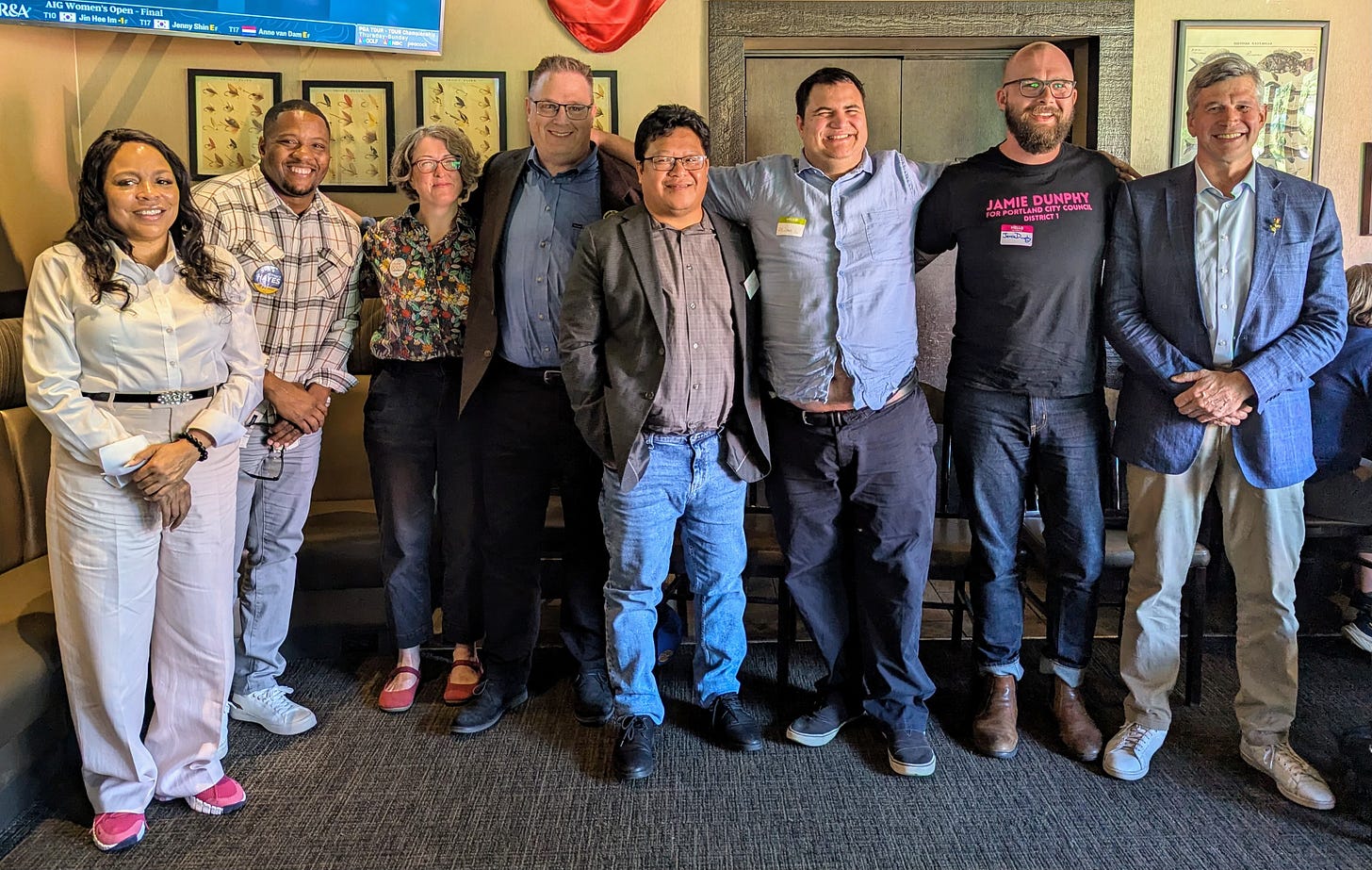
Loretta Smith Makes Fundraising Strides Despite Late Start
PORTLAND, August 23, 2024 — Former Multnomah County Commissioner Loretta Smith, who is running for a seat in District 1, has made notable fundraising progress despite entering the race months later than many of her competitors. Smith, who joined the race in July of this year, has raised over $28,000 and appears on track to unlock $40,000 in matching public funds. While this places her among the top five fundraisers in District 1, several candidates have already pulled ahead in the race. Frontrunner Steph Routh—who announced her candidacy almost a year earlier—has raised over $139,000, including $80,000 in public financing. Other candidates, such as Timur Ender and Candace Avalos, have also made significant fundraising advances. Avalos and Smith previously competed in the 2020 council race, which was won by City Commissioner Carmen Rubio. Rubio, now running for mayor, has endorsed Routh, Ender, and Avalos, but not Smith.
“The Haves, the Can Nots, and the Will Nots: Armstrong’s Take on Portland’s Homelessness Crisis
PORTLAND, August 23, 2024 — James Armstrong, a small business owner running for a seat in District 2, recently outlined his approach to addressing the city’s homelessness crisis in an email to supporters. Armstrong introduced terms he coined to categorize the homeless population into three groups: "The Have Nots," "The Can Nots," and "The Will Nots."
According to Armstrong, "The Have Nots" are individuals struggling financially who need help meeting basic needs. "The Can Nots" face significant challenges, such as addiction or untreated mental health issues, that prevent them from caring for themselves. "The Will Nots" are people who, despite having access to other options, choose not to engage with available services and prefer to live outside societal norms.
“We need to be united in telling those that Will Not adhere to our basic community standards that if they are unwilling to utilize the services offered, they cannot continue this behavior in our city,” Armstrong wrote.
Armstrong’s platform includes repurposing the Portland Expo Center into a comprehensive service hub for people experiencing homelessness. Drawing inspiration from San Antonio’s Haven for Hope, he suggests that the Expo Center could house a range of services—including shelter, healthcare, and addiction recovery—all in one location. He believes this approach could significantly reduce homelessness in Portland while easing the burden on neighborhoods and businesses.
Morillo “Disappointed” in Sheriff’s Decision to Book Those Refusing Shelter
PORTLAND, August 23, 2024 — District 3 candidate Angelita Morillo, who faced homelessness as a college student, released a social media video expressing disappointment in Multnomah County Sheriff Nicole Morrisey O’Donnell’s decision to start booking individuals charged with violating Portland’s anti-camping policy. Morrisey O’Donnell had previously declined to do so, stating that jails should be used as “a place for people who pose a genuine danger to the public, and that does not include individuals whose only offense is living unsheltered.”
“I am really disappointed to see that Sheriff O'Donnell went back on this statement,” said Morillo, who had praised the sheriff’s original decision.
“I thought it was a very powerful statement. As someone who has been formerly houseless, I thought it was exactly what was needed in the moment,” she added, speculating that business interests may have influenced the change.
“I don't know if some business interests got involved and intimidated her behind the scenes, but you don't stick your neck out like that and then rescind your word suddenly—unless something happened behind the scenes. I think there's more to the story, but I think this is the wrong move, and I am really disappointed to see that.”
Morillo further elaborated on the concept of “service resistance,” a term commonly used to describe people who decline the offer of shelter. She noted that some shelters are poorly run, but individuals fear reporting potential violations due to possible repercussions from staff.
“Unfortunately, most houseless people do not feel safe reporting to any authority about what is going on inside shelter systems because they are afraid of losing what little support is being offered there,” she said, adding that jails are also unsafe places due to the number of deaths reported in recent years, something she attributed to inmates not receiving adequate medical care.
“So when we are telling houseless people that their two options are to go to a shelter bed, which is usually nonexistent or very hard to get into—or to go to jail, where we have these mysterious deaths that we haven't figured out why they're happening, we are telling houseless people that they are going to have to go to jail and possibly be harmed or even be killed for the crime of being poor. That is unacceptable in one of the wealthiest countries in the entire world,” Morillo concluded.
Ben Hufford Qualifies for Public Campaign Financing
PORTLAND, August 22, 2024 — District 4 candidate Ben Hufford has qualified for public campaign financing, just ahead of next Tuesday's deadline. Hufford will receive $40,000 in matching public funds.
Portland’s public campaign financing program matches small donations up to $20 at a 9-to-1 ratio, meaning a $20 contribution from a resident can generate $200 for the candidate ($20 original donation plus $180 in matching funds). To qualify, candidates must collect and certify 250 individual contributions from Portlanders by August 27. Qualified candidates can continue to collect matching funds up to $120,000, providing a significant advantage over those who don’t meet the deadline.
Other candidates who have qualified for the program include:
District 1: Candace Avalos, Jamie Dunphy, Timur Ender, Steph Routh
District 2: James Armstrong, Marnie Glickman, Mariah Hudson, Debbie Kitchin, Mike Marshall, Tiffani Penson, Elana Pirtle-Guiney, Dan Ryan, Jonathan Tasini, Nat West, Nabil Zaghloul
District 3: Jesse Cornett, Daniel DeMelo, Tiffany Koyama Lane, Angelita Morillo, Steve Novick
District 4: Eli Arnold, Olivia Clark, Chad Lykins, Mitch Green, Tony Morse, Stan Penkin, Moses Ross, Sarah Silkie, Bob Weinstein
Mayoral Candidate Keith Wilson at the Democratic Convention
PORTLAND, August 22, 2024 — Keith Wilson, a sustainable trucking company executive and mayoral candidate, is representing Oregon at the Democratic Convention in Chicago. Wilson, a standing committee member of the Oregon Democratic Party, has been sharing updates on social media about his experience.
Also attending the convention are District 1 candidate Loretta Smith, who chairs the Democratic Party of Oregon’s Black Caucus, and at-large delegate Moses Ross, a political consultant running for a seat in District 4.


District 1 Race Heats Up as Hayes Accuses Opponents of Being Out of Touch
PORTLAND, August 21, 2024 — While Portland’s new voting method, ranked choice voting, has generally led to a more positive atmosphere among council candidates, the District 1 race is showing signs of intensifying pressure. In a recent campaign email, candidate Terrence Hayes commented on a forum where he felt his opponents’ focus on expanding urban tree canopies was met with skepticism by residents.
Hayes, running against frontrunners Steph Routh, Timur Ender, and Candace Avalos—candidates with strong backgrounds in sustainability, city planning, and environmental activism—described how the audience reacted when the topic of tree canopies was raised. “They were nearly laughed out of the room,” Hayes wrote. He suggested that this response indicated a disconnect between the candidates and the concerns of the community.
“The problem with these candidates is that they are treating our district like it’s the Inner Eastside and we’re in such a great place that we can focus on the top of the pyramid, and it’s incredibly detached from the needs of the community,” continued Hayes. “Of course, we need more trees in East Portland, but until we can feel safe walking down our streets, they are not currently very useful.”
Despite being outraised by his opponents, who have received endorsements from labor unions, progressive leaders, and environmental organizations, Hayes has recently gained momentum with endorsements from the Portland Police Union and City Commissioner Rene Gonzalez.
Kitchin and DeMelo Qualify for Public Campaign Financing
PORTLAND, August 21, 2024 — In the race to qualify for public campaign financing—before the deadline next Tuesday—District 2 candidate Debbie Kitchin and District 3 candidate Daniel DeMelo have just made the cut. The program matches small donations up to $20 at a 9-to-1 ratio, meaning a $20 contribution from a resident can result in a total of $200 for the candidate ($20 original donation plus $180 in matching funds). To qualify, candidates must collect and certify 250 individual contributions from Portlanders by August 27.
While the city’s Small Donor Elections Office did not specify the public match received by Kitchin and DeMelo, they can now continue to collect matching contributions up to $120,000. Other candidates who have qualified for the program include:
District 1: Candace Avalos, Jamie Dunphy, Timur Ender, and Steph Routh
District 2: James Armstrong, Marnie Glickman, Mariah Hudson, Mike Marshall, Tiffani Penson, Elana Pirtle-Guiney, Dan Ryan, Jonathan Tasini, Nat West, and Nabil Zaghloul
District 3: Jesse Cornett, Tiffany Koyama Lane, Angelita Morillo, and Steve Novick
District 4: Eli Arnold, Olivia Clark, Chad Lykins, Mitch Green, Tony Morse, Stan Penkin, Moses Ross, Sarah Silkie, and Bob Weinstein
Rubio and Gonzalez Endorse Newcomers
PORTLAND, August 21, 2024 — City Commissioners Carmen Rubio and Rene Gonzalez, both running for mayor, have endorsed fresh faces in the city council race. Rubio yesterday indicated her support for Chloe Mason, a model and social media organizer, who announced her candidacy in District 4 last week.
Earlier this month, Gonzalez urged his supporters via email to contribute to his policy advisor, Harrison Kass, who recently entered the race for District 3 and is aiming to qualify for public campaign financing before the deadline next week.
Whose Mayoral Poll Should We Believe?
PORTLAND, August 20, 2024 — A poll commissioned by the Rene Gonzalez campaign shows 21% of voters named the Portland city commissioner as their first choice for mayor, with nearly 40% remaining undecided. Conducted by Lake Research Partners, the poll also found Commissioners Carmen Rubio and Mingus Mapps each at 13%, businessman Keith Wilson at 4%, and arts advocate Liv Osthus at 3%. According to the Gonzalez campaign, these results suggest he could win if he can sway undecided voters. The poll surveyed 500 voters, with a margin of error of ±4.4%.
On the other hand, a poll conducted by Keith Wilson's campaign revealed that 50.5% of voters were undecided or uncommitted, with no candidate initially exceeding low-teens support. However, after voters were informed about the candidates, Wilson emerged as the frontrunner with 25% support, followed by Gonzalez at 19%, Rubio at 15%, and Mapps at 8%. Wilson's campaign suggested that the findings show his appeal across ideological lines, positioning him as the top choice for left-leaning voters and the second choice for right-leaning voters. This poll, indicating widespread voter dissatisfaction with current city leadership, surveyed 459 voters with a margin of error of ±4.57%.
Candidates Explain Ranked Choice Voting to Portland Voters
PORTLAND, August 19, 2024 — As Portland's city council elections approach, candidates are offering explanations of how Ranked Choice Voting (RCV) works. Mitch Green, a candidate in District 1, provided a straightforward explanation on Instagram, stating that voters can rank up to six candidates per district, with three ultimately winning seats, resulting in a 12-member city council. Green added that the system would increase the likelihood that voters' preferences will influence the outcome and promote broader representation.
Other candidates have used creative analogies to illustrate RCV. Maria Hudson of District 2 shared a video outlining how she and her children used a version of RCV to order a pizza, comparing their first, second, and third choices. The result? A half-and-half BBQ chicken and veggie pie. Steph Routh from District 1 likened RCV to choosing shoes in a store, where a customer might be offered alternative colors if their first choice is unavailable.
Portland: Neighbors Welcome Endorses Housing-Focused Candidates
PORTLAND, August 19, 2024 — ).Portland: Neighbors Welcome, a grassroots organization advocating for pro-housing and pro-tenant reforms across Oregon, has announced its endorsements for Portland's mayoral and city council races. The candidates backed by the group all support the Inner Eastside for All plan, which aims to legalize the construction of street-scale apartment buildings on residential lots within the area bounded by 12th to 60th Avenues and Fremont to Powell Streets. The plan also calls for an inclusionary housing program to ensure the inclusion of subsidized units in new mixed-income buildings and backs state-level building code reforms to facilitate the construction of family-sized condos and apartments.
The organization has endorsed Carmen Rubio for Portland Mayor. In District 1, it supports Candace Avalos, Timur Ender, and Steph Routh. District 2 sees the most endorsements with Michelle DePass, Marnie Glickman, Debbie Kitchin, Sameer Kanal, and Nat West receiving the group's backing. In District 3, Tiffany Koyama Lane and Angelita Morillo were selected. In District 4, Neighbors Welcome has endorsed Lisa Freeman, Mitch Green, and Chad Lykins.
The organization also gave a “green light” to the following candidates: Keith Wilson (candidate for mayor), Jamie Dunphy (District 1), Elana Pirtle-Guiney and Jonathan Tasini (District 2) Rex Burkholder, Chris Flanary and Luke Zak (District 3), and Olivia Clark (District 4)/
Marshall Runkel Withdraws From Mayor’s Race
PORTLAND, August 18, 2024 — Marshall Runkel, a former chief of staff to Commissioner Chloe Eudaly, has withdrawn from the Portland mayoral race. His campaign, which focused on environmental issues and local government strategy, concluded due to unspecified personal reasons. Runkel’s exit narrows the field of mayoral candidates to fourteen.
Chloe Mason is Running for Council in District 4
PORTLAND, August 18, 2024 — Sports and fitness model Chloe Mason is running for a seat in Portland's District 4. Mason, who has over 47,000 followers on Instagram, serves on committees for the Portland Art Museum and the private social club Soho House. She is also a member of the Portland Police Bureau's Equity Advisory Council and previously served on the board of directors of Raphael House, a nonprofit supporting survivors of domestic violence.
Mason’s campaign priorities include supporting small businesses, ending unsanctioned street camping by providing shelters and recovery housing, and addressing the fentanyl crisis on city streets. She joins four women and one nonbinary candidate in the heavily male-dominated District 4 race, which has attracted 25 candidates so far. You can watch her launch video on Instagram here.
Gonzalez, Rubio, and Wilson Surpass $200,000 Fundraising Milestone
PORTLAND, August 18, 2024 — City Commissioners Rene Gonzalez and Carmen Rubio, along with trucking company owner Keith Wilson, have each exceeded the $200,000 fundraising mark in the Portland mayoral race after qualifying for $100,000 in public campaign financing.
Gonzalez, benefiting from significant carryover funds from his 2022 election, leads with $273,660. Rubio follows with $211,700, and Wilson has reached $200,900. In contrast, Commissioner Mingus Mapps has struggled to gain fundraising momentum. He recently urged supporters via email to contribute, aiming to qualify for a debate hosted by the Progresso Latino PAC. The debate required participants to be certified for public campaign financing by August 15, a deadline Mapps did not meet. However, his campaign assured supporters that he has garnered enough donors to qualify by the final certification deadline of August 27, which could secure him up to $100,000 in public funds.
Koyama Lane Leads Council-Race Fundraising, But Others Are Closing In
PORTLAND, August 18, 2024 — Tiffany Koyama Lane currently leads fundraising among City Council candidates with $138,500, including $80,000 from public campaign financing. Close behind her is Steph Routh (District 1) with $137,300, followed by fellow District 3 candidate Angelita Morillo with $131,700. Both Routh and Morillo have also received $80,000 in matching public funds. Other candidates showing significant fundraising momentum include City Commissioner Dan Ryan in District 2, Olivia Clark in District 4, and Steve Novick in District 3, each of whom has received $40,000 in public campaign financing so far.
James Armstrong Qualifies for Public Campaign Financing
PORTLAND, August 17, 2024 — James Armstrong, a candidate in District 2, is the latest to be certified for Portland’s Small Donor Elections Program. The program matches small donations up to $20 at a 9-to-1 ratio, meaning a $20 contribution from a resident can result in a total of $200 for the candidate ($20 original donation plus $180 in matching funds). To qualify, candidates must collect and certify 250 individual contributions from Portlanders by August 27.
“It may have taken us a bit longer than others, but I am so proud to have reached this milestone and hopefully start seeing my ideas for the city elevated into the mainstream discussions,” said Armstrong, a forensic accountant who also co-founded Alberta Eye Care, Cathedral Eye Care, and Eyestrong Pediatric Eye Care in Northeast Portland.
Olivia Clark Reaches Second Tier of Public Financing
PORTLAND, August 17, 2024 — Olivia Clark, a candidate in District 4, has become the first in her district to reach 750 unique Portland donors, unlocking the second tier of matching funds through Portland’s Small Donor Elections program. This milestone earns her up to $40,000 in additional funding, building on the $40,000 she received from the first tier.
To date, Clark has raised $118,005, which includes the initial $40,000 from the first tier of matching funds.
“Our campaign's rapid progress and the overwhelming support we've received show that the residents of District 4 are ready for change,” said Clark whose background includes leadership roles at TriMet and the Oregon Department of Environmental Quality, as well as serving as a top staffer to Governor John Kitzhaber and three Salem mayors. She is also the founder of CASA, a non-profit focused on building farm worker housing.
Only three other candidates have reached the second tier of public campaign financing: Steph Routh in District 1, and Angelita Morillo and Tiffany Koyama Lane in District 2.
Mitch Green Advocates for Labor Protections in Keller Auditorium Project
PORTLAND, August 16, 2024 — District 4 candidate Mitch Green urged the Portland City Council to include strong labor protections in the proposed renovation or replacement of the Keller Auditorium. Green submitted testimony ahead of the council’s vote on August 14 to collaborate with Portland State University and the Halprin Landscape Conservancy to explore the project.
In his testimony, Green expressed the concerns of labor unions, including PSU-AAUP (Portland State University’s chapter of the American Association of University Professors), SEIU 503 (Service Employees International Union, representing public sector employees), and IATSE Local 28 (International Alliance of Theatrical Stage Employees, representing theater workers). He called on the city to ensure that unionized labor would be utilized during both the construction and operation of the facility.
“It’s critical that the city ensures these commitments for our working families. Union jobs are vital to the recovery of downtown and to the broader economic health of the city,” concluded Green, who is backed by the Working Families Party, the Democratic Socialists of America, and multiple trade unions.
Jamie Dunphy Slams Live Nation
PORTLAND, August 15, 2024 — District 1 candidate Jamie Dunphy, a long-time advocate for Portland’s independent music scene, has voiced strong concerns about Live Nation's recent approval to operate a new music venue in Portland. In a recent email to supporters, Dunphy emphasized the potential downside of allowing the entertainment giant to establish a foothold in the city.
"Live Nation...is trying to steal our vibrant, homegrown industry and sell it back to us at a profit," Dunphy warned, likening the company to the "Walmart of music" with a history of stifling local competition. He highlighted that Portland’s independent music scene contributes over $3 billion annually to the local economy, surpassing the impact of other major industries like salmon, timber, and cannabis.
Dunphy’s concerns stem from the belief that Live Nation’s presence could divert talent and resources away from local venues, a fear shared by many in Portland's music community. “Our music industry is DIY at its core, and I will protect it from out-of-state corporations that don’t care about our community,” Dunphy said, promising to champion policy proposals like reforming Portland’s noise code to protect small venue owners, addressing liquor licensing to ensure all-ages access to live music, and expanding musician loading zones at every performance venue in the city.
Eli Arnold Proposes Changes to Portland Street Response
PORTLAND, August 15, 2024 — Eli Arnold, a Portland police officer running for a District 4 seat on the City Council, recently outlined his policy proposals to enhance the effectiveness of Portland Street Response (PSR), the city’s unarmed team addressing mental health emergencies.
Arnold argues that PSR's current scope is too limited, restricting its ability to respond to situations involving individuals who are aggressive, armed, or indoors. He proposes that PSR teams be authorized to transport individuals or initiate mental health holds, stating that these changes "could be a real game changer for PSR's efficacy."
In addition to operational changes, Arnold believes PSR should be managed by Multnomah County, which already oversees mental health services. "PSR should never have been created at the city, and the county should be responsible for funding them," he stated. He suggests integrating PSR with the county's Project Respond team to improve coordination and expand the scope of mental health responses.
In a related Instagram video, Arnold addressed potential concerns about his impartiality as a council member on law enforcement issues. "You're going to want me on council because I've been a police officer in Portland, not in spite of it." He described policing and PSR as “tools” that should be designed to effectively address the city's needs.
“When Council is trying to figure out how to deal with use of force, with crime, with homelessness and shelter systems, and mental health, the fact that I've already worked on all of those things—that I know where the starting point is—is going to be very useful,” Arnold concluded.
Old Town is Ground Zero for Portland’s Future, Zimmerman Says
PORTLAND, August 14, 2024 — Eric Zimmerman, a candidate for Portland's District 4, recently posted an Instagram video outside the fenced-in Lan Su Chinese Garden in Old Town, where he discussed the challenges faced by the area. He noted that Lan Su is dealing with issues such as "vandalism, crime, break-ins, and harassment," which have led the city to erect protective fencing around the cultural site.
Zimmerman, an Army veteran who serves as Chief of Staff to Multnomah County Commissioner Julie Brim-Edwards, stated, "I consider Old Town to be ground zero for everything I'm trying to achieve," and emphasized the need for the city to direct more resources to Old Town,
"As a city, we've got to surge our resources to the Old Town community. For those of you that reached out, I hear you. I'm with you, and let's work together to improve Old Town, and make it part of Portland's future," he concluded.
Walker: Deflection Plan “Purposely Malicious Compliance"
(PORTLAND, August 14, 2024) — Jon Walker, a candidate for Portland's District 3, weighed in on Multnomah County Commissioner Sharon Meieran's call to pause plans for a $2 million drug deflection center in the Buckman neighborhood of inner Southeast Portland. The center, scheduled to open on September 1 at 900 SE Sandy Blvd, aims to provide police with a place to take individuals found with small amounts of illicit drugs, offering them optional treatment paths instead of jail. Meieran has raised concerns about unresolved security issues, advocating for a delay.
"This plan has been so poorly designed and considered I'm honestly left wondering if it is purposely malicious compliance to disprove the concept by wasting taxpayer money on a build about to be torn down," Walker tweeted. He further stated, "The left needs to be honest that you can't make public transit a purposeful choice for the majority instead of a last resort for low-income travelers unless you make it somewhat pleasant, and most people would rather sit in traffic than deal with passed-out addicts."
Walker also expressed frustration with broader urban issues in Portland, remarking, "People often defend the status quo saying 'well that is just city life if you don't like it,' and that is the problem—many don't."
Gonzalez Stands for "Compassion Without Enablement"
(PORTLAND, August 14, 2024) — In a recent Twitter post, Portland City Commissioner Rene Gonzalez warned that San Francisco's decision to expand its homeless bussing program, combined with Governor Gavin Newsom's order to clear unsanctioned camps, "should put all Oregonians on notice: if we stand still, more homeless people will come to Oregon." Gonzalez highlighted that Oregon's resources are already stretched thin and called for reforms to HB 3115 to prevent migratory homelessness while also expanding behavioral health systems and shelter access.
Gonzalez mentioned that his approach to the issue will be one of "compassion without enablement" as he begins his service on the Steering and Oversight Committee for the Joint Office of Homeless Services. This committee is a new entity formed under a recent agreement between Portland and Multnomah County to better coordinate their response to homelessness. Mayor Wheeler recently appointed Gonzalez as a member of the committee.
Dan Ryan Endorsed By All Fellow Commissioners
(PORTLAND, August 13, 2024) — City Commissioner Dan Ryan has received endorsements from his three colleagues: fellow commissioners Rene Gonzalez, Mingus Mapps, and Carmen Rubio. Mayor Ted Wheeler has not yet made any endorsements for the 2024 election. Ryan has endorsed Tony Morse, Stan Penkin, and Eric Zimmerman in District 4 and has previously stated he will not endorse any mayoral candidates.
Portland For All Unveils District 2 Endorsements
(PORTLAND, August 13, 2024) — Portland For All, a social justice grassroots group, has unveiled its endorsements for District 2. The picks are political strategist and organizer Marnie Glickman, consultant and union organizer Elana Pirtle-Guiney, and cider entrepreneur Nat West. The organization has previously released endorsements for Districts 1, 3, and 4. In District 1, Portland For All backs environmental activist Candace Avalos, transportation planner Timur Ender, and transit advocate Steph Routh in District 1. In District 3, the group supports teacher and union organizer Tiffany Koyama Lane and anti-hunger advocate Angelita Morillo. Endorsed candidates in District 4 included economist and college professor Mitch Green, chess club owner and housing advocate Chad Lykins, Lisa Freeman, a conflict resolution specialist, and Sarah Silkie, a water engineer with the City of Portland.
Hayes Campaign Highlights Personal Connection to Public Safety Issues
(PORTLAND, August 12, 2024) — District 1 City Council candidate Terrence Hayes recently shared a personal story that shapes his views on public safety. In a message to supporters, Hayes reflected on the loss of his cousin Quanice in a fatal police encounter, stating, "A few years back, my cousin Quanice was killed by police." He noted that this event has driven his commitment to public safety, emphasizing, "If we can create a few more moments before action, Quanice and so many others might still be alive."
Hayes’s campaign focuses on improving communication between communities and law enforcement to prevent similar incidents. He says he advocates for a balanced approach to public safety, suggesting that the values of "protecting the community and valuing the people tasked with protecting it can coexist." His platform has earned him endorsements from the Portland Police Association and City Commissioner Rene Gonzalez.
Rubio Campaign Confirms Public Safety as a Central Election Issue
(PORTLAND, August 12, 2024) — A recent email from City Commissioner Carmen Rubio’s campaign for mayor confirms that public safety will be a central issue in the upcoming election. Rubio laid out her strategy for keeping Portlanders safe, including increasing first responders, improving police-community relations, and expanding homelessness services.
“As Mayor, I will be committed to greater public safety, not by over-policing our community or implementing draconian measures, but by seizing the commonsense solutions that will break the cycle of crime and addressing its underlying causes,” Rubio wrote, highlighting her support for Portland Street Response, the city’s unarmed team addressing mental health emergencies.
While Rubio did not mention her colleague and mayoral rival, City Commissioner Rene Gonzalez, by name, her reference to “draconian measures” presumably referred to Gonzalez, who advocates for stricter enforcement of policies related to public camping and drug use.
Gonzalez Campaign Spotlights Likeminded Council Candidates
(PORTLAND, August 12, 2024) — City Commissioner Rene Gonzalez’s mayoral campaign has begun promoting his favored council candidates. In a recent email to supporters, Gonzalez urged voters to back his policy advisor, Harrison Kass, who recently entered the race for District 3.
Kass, a lawyer, previously served on Mayor Ted Wheeler’s community safety team and shares Gonzalez’s focus on public safety. On his campaign website, Kass emphasizes his work on body-worn cameras, gun violence reduction, and police recruitment as key areas of expertise. His background also includes clerking for Youth, Rights & Justice, a nonprofit law firm for children and families, as well as for the Oregon Federal Defenders.
Gonzalez has also endorsed Terrence Hayes in District 1, Bob Simril in District 2, and Eli Arnold, Olivia Clark, Tony Morse, Stan Penkin, and Bob Weinstein in District 4.
"Teacher Tiffany" Overtakes Steph Routh as Top Council Fundraiser
(PORTLAND, August 10, 2024) — Tiffany Koyama Lane, a public school teacher and union organizer in District 3, has become the highest fundraiser among all council candidates. Koyama Lane has raised $138,500, including $80,000 in public campaign financing. The top spot was previously held by District 1 candidate Steph Routh, who has raised $137,300, also including an $80,000 public match.
Koyama Lane was actively involved in the 2020 Preschool for All campaign, which implemented an income tax on high earners to provide free preschool education for 3- and 4-year-olds in Multnomah County. She is endorsed by the Working Families Party of Oregon, multiple labor unions and social justice organizations, and City Commissioner and mayoral candidate Carmen Rubio.
Chloe Mason Rumored to Run in District 4
(PORTLAND, August 9, 2024) — Chloe Mason, a model, author, and social media influencer with over 47,000 Instagram followers, is rumored to be considering a run for a seat in District 4. Her potential candidacy would add to the list of female candidates in a race currently dominated by male contenders. So far, only four women and one nonbinary candidate have entered the race.
Keith Wilson Qualifies for Public Financing
(PORTLAND, August 8, 2024) — Keith Wilson, an executive for a sustainable trucking fleet, has qualified for a $100,000 payout from Portland’s public campaign financing program. He joins city commissioners Rene Gonzalez and Carmen Rubio, who have also reached the milestone by collecting and certifying 750 small contributions from individual Portlanders. Established in 2016 to take big money out of politics, the program provides a 1-9 match on contributions up to $20 from individual Portlanders.
Given the public financing program’s budget woes, this is the first and only payout mayoral candidates can receive, although the program was originally expected to support mayoral campaigns with up to $750,000. While Wilson has testified in opposition to the council’s decision not to increase the program’s funding despite a record number of candidates running, he says money is not the only thing that matters.
“Money is important because it helps get the message out. But the message is always more important than the money, and money doesn’t translate into wins every time. I feel confident that the message we're carrying forward about ending unsheltered homelessness and caring for four hundred people on the streets who are going to die this year because of inaction, will resonate with Portlanders,” Wilson told Rose City Reform.
“We need to care for our community. We know that half of all arrests are of the unsheltered, yet they represent 1% of our population. By sheltering people who need it, we can repair and restore our public safety system and shorten response times so that an officer can arrive in six minutes like ten years ago instead of the 24 minutes it takes now.”
According to the Oregon Secretary of State, Wilson has raised nearly $97,000, not counting the payout of public funds. This makes him the third most successful fundraiser, surpassed only by Rene Gonzalez whose campaign funds total $172,200. Rubio has amassed approximately $106,100. Neither candidate has yet reported the $100,000 payout from Small Donor Elections.
Interest in Business Community’s Endorsements Draws Huge Crowd to Event
(PORTLAND, August 7, 2024) — On August 6, over fifty candidates attended an event hosted by the business-friendly political action committee United For Portland. The group, whose full membership is unknown but includes organizations like the Portland Metro Chamber, advocates for permitting reform and supports the recommendations of the Governor’s Downtown Taskforce. Strategies include support for small businesses, additional public safety measures, and a tax moratorium to stimulate downtown economic recovery.
Spearheaded by Doug Moore, former leader of the Oregon League of Conservation Voters, the PAC is expected to endorse candidates in each district over the next month. Only candidates who have qualified for Portland’s public campaign financing system by successfully raising 250 contributions from individual Portland donors will be considered. Candidates who have collected 750 individual contributions have a chance to be featured as “spotlighted” candidates, the organization said.
Rubio and Gonzalez Announce New Council Endorsements
(PORTLAND, August 7, 2024) — City commissioners and mayoral hopefuls Rene Gonzalez and Carmen Rubio are both unveiling a series of new endorsements today. What’s official so far?
Gonzalez has endorsed Terrence Hayes in District 1, Bob Simril in District 2, and Eli Arnold, Olivia Clark, Tony Morse, Stan Penkin and Bob Weinstein in District 4. Clark and Morse also received endorsements from Rubio. They now join District 4 candidate Stan Penkin as candidates who enjoy support from both mayoral contenders.
“The broad-based support that I’ve earned speaks to my pragmatic ability to bring people to the table,” Morse told Rose City Reform. “I can convene, collaborate, and work effectively with others from across the spectrum of different perspectives, and I’m ready to help deliver the practical solutions that Portland needs going forward,” he said.
At an event last week, Clark expressed a similar sentiment, stating that she would use her legislative experience to help the city secure resources from Salem and restore Portland to “the city that works” rather than “the city that works you over.”
Rubio has also endorsed Candace Avalos, Jamie Dunphy, and Timur Ender in District 1. In District 2, her endorsements include Michelle DePass, Marnie Glickman, Debbie Kitchin, Tiffani Penson, and her council colleague, City Commissioner Dan Ryan. Additionally, Rubio supports Tiffany Koyama Lane and Angelita Morillo in District 3, and Chad Lykins in District 4.
Rene Gonzalez’ Policy Advisor Joins District 3 Race
(PORTLAND, August 6, 2024) — Harrison Kass, a policy advisor to Commissioner Rene Gonzalez, has announced his candidacy for Portland City Council in District 3.
Kass, a lawyer, also served on Mayor Ted Wheeler’s community safety team and appears to share Gonzalez’s focus on public safety. On his campaign website, he highlights his work related to body-worn cameras, gun violence reduction, and police recruitment as key areas of expertise. Kass’s background also includes serving as a clerk for Youth, Rights & Justice, a nonprofit law firm for children and families, as well as for the Oregon Federal Defenders.
Originally from the East Coast, Kass faced a period of homelessness in his youth, an experience he shares with fellow District 3 candidate Angelita Morillo. However, for District 3 voters, Kass’s candidacy—if aligned with Gonzalez’s commitment to stricter enforcement—could present a platform that contrasts with Morillo's. Morillo has supported Measure 110 and opposes Portland’s public camping ban, arguing that it criminalizes homelessness and pushes people into deeper despair.
District 4 Candidates Tackle Tough Issues
(PORTLAND, August 5, 2024) — District 4 candidates recently delved into some thorny issues at a mixer organized by Future Portland, a grassroots organization focused on livability issues. Taking questions from voters, the eleven candidates in attendance spoke about everything from Portland’s gridlocked permitting system to their views on the city’s public camping ban.
While all candidates rallied behind permitting reform and the need for more affordable housing, their views diverged on issues like policing and the city’s response to mental health emergencies. Olivia Clark, a former high-level staffer at both TriMet and the Oregon Department of Environmental Quality, called for boosting the city’s police force.
“I know this can be controversial, but we don't have enough police, and we don't have enough firefighters in this city,” she said, pointing out that Portland’s officer-to-population ratio hovers around 0.9, while the national average is 2.4. “We don't need 2.4, but we really need about three to four hundred more officers to have a fully functioning police department,” said Clark, who is endorsed by the police and firefighters unions.
Meanwhile, Lisa Freeman, a conflict resolution specialist who previously worked for the City of Portland’s Community Safety Division, emphasized her support for a “third branch” of the city’s emergency response system. With around-the-clock operations focused on addressing mental health emergencies, a dedicated department could take pressure off both police and firefighters, she said.
“I believe that’s the future of public safety, and eventually, this is where all cities are going,” Freeman predicted.
Multiple candidates, like Bob Weinstein, Tony Morse, Eric Zimmerman, and Stan Penkin, emphasized the importance of enforcing Portland’s public camping ban and moving those living on the street into shelters.
“We need to get adult about enforcing the public camping laws that we have,” said Eric Zimmerman, an army veteran who currently serves as chief of staff to County Commissioner Julia Brim-Edwards. “At this point, we have created so many types of shelter, and there are so many beds going unused every night, that we have to get serious about enforcement,” added Zimmerman, who is endorsed by the police union.
The most vivid discussion of the evening came in response to a question about whether candidates supported mandatory treatment. While the question didn’t specify whether the treatment was in response to an emergency or an offense such as drug possession, it showed some marked philosophical differences between candidates.
“I’ll say it, compelled treatment is effective and has high success rates of participation and successful completion of treatment,” said Tony Morse, a former policy and advocacy director for Oregon Recovers—a statewide coalition supporting Oregonians in recovery from addiction. “Recovery is about meeting people where they’re at but not leaving them there,” said Morse, who is himself a person in long-term recovery and is endorsed by the police union as well as multiple addiction and mental health specialists.
His position was seconded by Eric Zimmerman and Bob Weinstein, a former mayor of Ketchikan, Alaska, who posited that a civilized society does not allow people who are a threat to themselves or others to be on the streets.
“If we're going to revitalize the community and revitalize downtown, we have to move people off the streets into shelters and on the continuum of housing with supportive services,” Weinstein said.
Lisa Freeman offered a contrasting perspective:
“I think we have jumped way too fast to talking about mandatory sheltering and mandatory treatment when we do not have the services available for people who want treatment and for people who want shelter. Let's do that first. Let's invest our energy there first,” she said.
Freeman received support from Moses Ross, the President of the Multnomah Neighborhood Association, who called mandatory treatment “paternalistic,” saying it raised serious questions about who should make decisions about people’s lives.
“I feel strongly that we need to build up the available resources first and then, and only then—once we have locations for them, all of them—maybe we can start talking about mandatory X and mandatory Y,” said Ross, whose mother suffered from addiction.
Many candidates also emphasized their commitment to climate resiliency. Olivia Clark predicted that Portland will become a climate refuge and said the city needs to tighten its emergency response in the case of extreme climate events and ensure that housing stays affordable for Portlanders as more people migrate to the city. Sarah Silkie, who works as an engineer for the City of Portland and holds a PhD in environmental engineering from UC Berkeley, said her run for office was propelled by her frustration with the city’s management.
“I'm running because I want things to work and I am so tired of being part of a bureaucracy that doesn't function,” she said. “I'm also running because it's time to get serious about the climate crisis. These 115-degree days—unfortunately they are going to happen again. And we need to attack it on two fronts. We need to reduce our carbon emissions and we need to make our city resilient so that we can survive and not have people dying every time there's a fluctuation in our temperatures,” added Silkie, who is endorsed by multiple labor unions.
To learn more about the platforms of candidates in District 4, visit Rose City Reform’s expanded candidate tracker.
Portland's Ballot Takes Shape as August Filing Deadline Nears
(PORTLAND, August 2, 2024) — As we enter August, the last month for candidates to officially file to run for city office, 12 mayoral candidates have qualified to appear on the ballot. July and August have seen multiple new filings by candidates about whom little is known and who are not actively campaigning, a fairly common occurrence during any election cycle.
For the office of mayor, well-known names include City Commissioners Rene Gonzalez and Carmen Rubio, as well as up-and-coming challenger Keith Wilson, a trucking company executive, and Liv Osthus, a stripper and advocate for the arts. City Commissioner Mingus Mapps has not yet qualified for the ballot but is expected to meet the deadline.
In District 1, 11 out of 16 candidates have qualified for the ballot, including transportation advocates Steph Routh and Timur Ender, environmental and racial justice advocate Candace Avalos, and small business owner Terrence Hayes. Former county commissioner Loretta Smith, who announced her candidacy last month, has not yet qualified to appear but is expected to do so.
District 2 has the lowest number of candidates qualified for the ballot, with nine out of 23. Notable names include City Commissioner Dan Ryan, labor organizers Elana Pirtle-Guiney and Jonathan Tasini, and Tiffani Penson, a people and culture manager for the City of Portland. Though not yet qualified, cider entrepreneur Nat West recently filed the necessary paperwork. Others expected to qualify include PPS school board member Michelle DePass and political strategist Marnie Glickman.
In District 3, 12 out of 21 candidates have qualified, including recovery advocate Jesse Cornett, teacher and union organizer Tiffany Koyama Lane, and anti-hunger advocate Angelita Morillo. Others expected to qualify include former city commissioner Steve Novick and former Metro councilor Rex Burkholder.
District 4 has the highest number of candidates qualified for the ballot, with 22 out of 24. Candidates include police officer Eli Arnold, retired policy director Olivia Clark, economist and labor advocate Mitch Green, chess club founder Chad Lykins, recovery and labor advocate Tony Morse, former Pearl Neighborhood Association Chair Stan Penkin, and Bob Weinstein, a former mayor of Ketchikan, Alaska. Environmental advocate Andra Vltavín is currently collecting signatures to appear on the ballot (many others simply pay a fee).
Portland City Auditor Simone Rede, who is running unopposed, has also qualified for the ballot.
The filing window closes on August 27.
Candidates Diverge on Sheriff’s Decision Not to Book First Arrest Under Camping Ban
(PORTLAND, July 31, 2024) — Two candidates offered starkly different takes on Multnomah County Sheriff Nicole Morrisey O’Donnell’s decision not to book the first person arrested under Portland’s public camping ban, which went into effect on July 1.
On July 26, Portland police officers made their first arrest under the new ordinance, which bans public camping during daytime hours and allows for fines of up to $100 or seven days in jail for those who repeatedly refuse available shelter. However, once the man arrived at the Multnomah County Jail, the sheriff’s office declined to book him. Sheriff Morrisey O’Donnell later issued a statement, saying, “As the elected official charged with managing the jail, I believe we need to utilize the corrections system as a place for people who pose a genuine danger to the public, and that does not include individuals whose only offense is living unsheltered.”
Angelita Morillo, a progressive candidate running in District 3, applauded the sheriff’s decision in an Instagram video, saying Morrisey O’Donnell made the right choice and “stood strong in her values.”
“It is reprehensible for the city and the county to push off the responsibility of housing our citizens and keeping them safe onto the criminal justice system and to expect that sheriffs and police officers are going to act as social workers to repair all of the ills that have happened because we haven't addressed income inequality in this city,” said Morillo, who experienced homelessness for nearly a year as a college student.
“Let's hope that our new generation of City Council will have the courage and the wherewithal to actually address the long-term impacts of poverty in our city and instead invest in housing and anti-poverty measures,” she added.
Meanwhile, Eli Arnold, a police officer running for office in District 4, joined city council members in expressing surprise and disappointment in the sheriff’s decision.
“The camping ban is a humane law. It says that we're going to offer you a place to stay before we arrest you. The goal is not arrest, it's to get you off that sidewalk to make it passable again for someone in a wheelchair and get you into a place that’s going to help you get back on your feet,” Arnold said.
“If we have a rule, we have to enforce it. Otherwise, it's not really a rule,” he concluded.
Jonathan Walker Slams Renters’ Bill of Rights
(PORTLAND, July 30, 2024) — Jonathan Walker, a policy analyst for the Oregon Health Authority's Office who is running for a seat in District 3, has directed pointed criticism at a proposal to create a Renters' Bill of Rights in Portland. The initiative is currently being circulated among candidates by the Renters Action Network and the Democratic Socialists of America and among other things advocates for local rent control throughout Oregon and mandating relocation assistance for rent increases exceeding 5%.
In a lengthy tweet, Walker called the proposal a “disaster for Portland” and argued that the bill would disrupt the rental market and halt new rental construction. His main point of contention is the proposal to cap rent for a one-bedroom apartment at 30% of the minimum wage, a move Walker argues is too low to cover the construction costs of new rental units, effectively prohibiting the development of new one-bedroom apartments.
He also criticized the bill’s suggestion to prevent evictions for school workers or families with children except during the summer months, arguing it would simply deter landlords from renting to these groups altogether.
“Some ideas like legal help for people facing eviction and eviction pauses during extreme weather are good, but the rest of the ideas would cripple the rental market,” Walker concluded.
Candidates who have signed the Renters’ Bill of Rights include Jamie Dunphy in District 1; Sameer Kanaal, Chris Olson, Jennifer Park, and Jonathan Tasini in District 2; Tiffany Koyama Lane and Angelita Morillo in District 3; and Mitch Green and Andra Vltavín in District 4.
Weinstein Opposes People’s Rebate Tax
Bob Weinstein, a candidate in District 4, directed harsh criticism against Initiative Petition 17 (IP17), also known as the People’s Rebate, a ballot measure that aims to create a rebate program distributing $750 cash payments to Oregon residents. To fund this, IP17 would increase Oregon’s corporate minimum tax for large corporations with annual statewide sales over $25 million by adding a new 3% gross receipts tax. This tax would be in addition to the existing corporate minimum tax structure.
Weinstein highlighted that the rebate program isn’t targeted toward a specific income group, saying it would “benefit millionaires.”
“Giving money to wealthy people that don't need it won't accomplish anything,” Weinstein said, adding that Oregon already has a targeted refundable child tax credit for low-income families.
“Initiative 17 is a misguided and destructive proposal that would inflict severe economic damage on our state. It would make Portland and our state far less competitive, driving companies, jobs, and investment dollars to cities in other states,” Weinstein added, calling the proposal “yet another experiment funded by out-of-state money” and comparing it to Measure 110.
While 90% of the proposal’s funding comes from donors outside of Oregon, the initiative has gathered enough local signatures to qualify for the ballot and is expected to go to voters in November.
Candidates Pick Up Sought-After Endorsements
The Portland Fire Fighters Association has endorsed 11 candidates for the Portland City Council.
In District 1, the union endorsed Jamie Dunphy, Terrence Hayes, and Steph Routh. In District 2, City Commissioner Dan Ryan and Bob Simril received the nod. In District 3, former city commissioner Steve Novick, Jesse Cornett, and Daniel DeMelo were backed. In District 4, the firefighters chose Tony Morse, Olivia Clark, and Eli Arnold. The union has previously endorsed City Commissioner Rene Gonzalez for Portland mayor.
“My grandfather was a Portland Firefighter, and I’m named after him,” District 4 candidate Tony Morse wrote on Instagram.
“As your Portland City Councilor, I will always work to make sure our firefighters get the support they need to do their jobs safely. I’m eager to work with our Firefighters Union to build a safer and stronger Portland.”
Morse, who has been endorsed by sixteen labor unions, also enjoys support from the Portland Police Association, an endorsement he shares with City Commissioner Rene Gonzalez, District 1 candidate Terrence Hayes and District 2 contender Daniel DeMelo. In Morse's own district, Eli Arnold, Olivia Clark, and Eric Zimmerman have also been endorsed by the police union.
The Working Families Party of Oregon also announced its first round of endorsements this week, selecting Candace Avalos, Timur Ender, and Steph Routh in District 1; Nat West in District 2; Tiffany Koyama Lane and Angelita Morillo in District 3; and Mitch Green in District 4.
“As a BIPOC working mom, I know that the Working Families Party is one of the most powerful organizations for supporting workers and families, changing the calculus at the ballot box, and strengthening the multiracial working class,” Tiffany Koyama Lane posted on Instagram.
Koyama Lane, a public school teacher and union organizer, is also backed by the Portland chapter of the Democratic Socialists of America, an endorsement she shares with Mitch Green in District 4.
The social justice group Portland For All has unveiled its endorsements for Districts 1 and 3, tapping Candace Avalos, Timur Ender, and Steph Routh in East Portland (D1), and Tiffany Koyama Lane and Angelita Morillo in Southeast Portland (D3).
Additionally, three animal rights organizations – Animal Rights Collective, Compassionate PDX, and Pro-Animal Future – have announced their endorsements. All three are supporting Jamie Dunphy, Timur Ender, and Steph Routh in District 1 and Chad Lykins in District 4. Additionally, Animal Rights Collective is also endorsing Marnie Glickman and Jonathan Tasini in District 2, and Angelita Morillo in District 3. Pro-Animal Future also backs Jonathan Tasini in District 2.
Moms Demand Action, a grassroots group founded by the mother of one of the children killed in the Sandy Hook school shooting, has awarded their ‘Gun Sense Distinction’ to nine council candidates: Candace Avalos (D1), Marnie Glickman (D2), Jonathan Tasini (D2), Elana Pirtle-Guiney (D2), Laura Streib (D2), Jennifer Park (D2), Chad Lykins (D4), Tony Morse (D4), and Sarah Silkie (D4).
Want to research more candidate endorsements? Visit Rose City Refom’s expanded candidate tracker.
Exchange Between Rene Gonzalez and Journalist Andy Ngo Sparks Backlash
A Twitter exchange between city commissioner and mayoral candidate Rene Gonzalez and right-wing social media influencer Andy Ngo has ignited controversy, drawing sharp criticism from various groups.
On July 21, Gonzalez tweeted his appreciation for President Biden and called on Democrats to unite behind Vice President Kamala Harris to defeat Donald Trump. Gonzalez attributed Portland's "darkest days" in 2020 to Trump's presidency, emphasizing the need for a different path forward.
Ngo, known for his controversial reporting on Portland’s protests, commented on Gonzalez’s post, blaming Democratic officials for the unrest in Portland in 2020.
"Portland’s darkest days of violence in 2020 were because elected officials in the city, all Democrats including DA Mike Schmidt, allowed the violence to happen and chose not to prosecute most of the violent leftists in order to spite then-President Trump. It was Trump who surged federal officers to Portland to protect the federal courthouse from being burned down,” Ngo said.
“Considering Antifa used and use violence against you long after Trump exited office, I’d thought you’d know all this,” he added.
Gonzalez fired off a response:
"Antifa/anarchists have terrorized my family & my city. I appreciate you calling a spade a spade & recognize you have been terrorized for it. Portland is the city I love and it does better with a Democrat in the White House. We need to own our problems - but Trump kicked us when we were down."
The exchange immediately prompted backlash from progressive and social justice groups, including a tweet from the Independent Party of Oregon, which questioned Gonzalez's suitability as a mayoral candidate.
"Is Portland really prepared to elect a Mayor who lies about being assaulted on public transit and fawns over Andy Ngo? Is Portland's business community going to continue funding a candidate who aligns himself with right-wing agitators like Andy?" the party tweeted, referencing a previous incident when Gonzalez called 911 to report a woman who brushed by him on a MAX train.
Jonathan Maus, founder of the indepedent news outlet Bike Portland, also criticized Gonzalez's remarks.
"Pretty wild that Rene Gonzalez typed 'I appreciate you' in reference to Andy Ngo. Ngo's approach to journalism and his content isn't something a Portland mayoral hopeful should be showing support for," Maus tweeted.
James Armstrong Advocates for Texas-Based Haven for Hope Model
James Armstrong, running for City Council in District 2, is advocating for using San Antonio’s Haven for Hope campus as a model to address Portland's homelessness crisis. This concept has been pondered before, most notably by local developer Homer Williams and Mayor Wheeler.
Armstrong’s proposal involves creating a campus-style headquarters for the Joint Office of Homeless Services (JOHS), modeled after Haven for Hope, which coordinates services through partnerships with numerous non-profits.
He suggests that the Portland Expo Center could be an ideal location, providing space for development and proximity to public transit.
“By building a campus-style headquarters for the JOHS at the Expo Center, we can better coordinate services and provide a more efficient system, ultimately saving tax money and improving outcomes for our most vulnerable residents,” Armstrong wrote on his campaign website.
“This vision requires bold action, but it could transform Portland into the progressive leader on addressing homelessness that we strive to be,” he concluded.
Dan Ryan Gets Nod from the Governor
City Commissioner Dan Ryan, who is running for a seat in District 2, has been endorsed by Governor Tina Kotek.
”Governor Kotek’s support underscores the importance of my work and the impact I can have on our beloved city. With her endorsement, I am more energized than ever to continue the mission of serving Portland,” Ryan wrote on social media.
Ryan, who was elected in 2020, until recently oversaw the Office of Community and Civic Life, Office of Equity and Human Rights, Portland Parks & Recreation and the Portland Children's Levy. Starting this month, city bureaus are instead managed by Portland’s interim city adminstrator Michael Jordan in preparation for Portland’s new form of government, where city council members have no executive responsibilities.
Governor Kotek has also endorsed City Commissioner Carmen Rubio for Portland mayor.
Morillo Slams Gonzalez on Social Media
In a recent social media video, Angelita Morillo, a progressive candidate for Portland's City Council, delivered a sharp critique of mayoral candidate Rene Gonzalez. This came in response to questions about how she would collaborate with Gonzalez if both were elected.
"I don't know what everyone else is hearing, but when I'm on the ground, talking to my people, they're not asking me how I'm going to move towards an unjust man or unjust policies," Morillo stated.
While Morillo acknowledged that compromise is inherent to the role, she described her primary responsibility as advocating for vulnerable and working-class residents.
“It is not my role in this life or in this race, to comfort the comfortable,” she asserted.
Morillo specifically criticized Gonzalez's tenure on the city council, claiming he has neither built strong relationships nor passed significant policies.
"He does not have any friends. He has not passed any substantial policies or made any accomplishments. His greatest accomplishments are the things that he has tried to dismantle and destroy," she argued.
Morillo also highlighted that mayoral candidate Carmen Rubio has endorsed her campaign. Several other council candidates showed their support by liking her video, including District 1 candidate Candace Avalos, who has publicly clashed with Gonzalez on multiple occasions.
“I've gotten to know Angelita over the last year, and she's smart, passionate, and nuanced. Like she says, the work of actually moving a policy agenda requires collaboration, and Rene Gonzalez is the epitome of the opposite. District 3 would be lucky to have Angelita representing them,” Avalos wrote.
Other candidates who liked the video included mayoral candidate Liv Osthus, Timur Ender (D1), Kelly Janes (D3), and Mitch Green (D3).
Progressive Candidates Sign Renters' Bill of Rights
Several candidates have signed a campaign pledge called Renters' Bill of Rights, an initiative by the Portland chapter of the Democratic Socialists of America and the Renters Action Network. The bill includes provisions such as:
Linking rent to the minimum wage to ensure affordability
Advocating for local rent control throughout Oregon
Mandating relocation assistance for rent increases exceeding 5%
Capping fees for pet rent and late fees
Additionally, the bill requires a six-month notice before rent increases, protects children and education workers from eviction due to late rent during the school year, and shields renters from eviction for late rent during extreme weather events. It also requires code violations to be resolved before rent increases and establishes the right to legal counsel in eviction court.
Candidates who have signed the bill include Jamie Dunphy in District 1; Sameer Kanaal, Chris Olson, Jennifer Park, and Jonathan Tasini in District 2; Tiffany Koyama Lane and Angelita Morillo in District 3; and Jeremy Beausoleil Smith, Mitch Green, and Andra Vltavín in District 4.
“Letting people get pushed out of their homes and their city is a policy choice, and it's a bad one. Change starts with simple, common-sense protections like keeping school kids and educators in their homes during the school year, or ensuring that unsafe conditions are fixed before a rent increase,” District 3 candidate and pledge signatory Tiffany Koyama Lane posted on Twitter.
Koyama Lane, a public school teacher, is one of two council candidates endorsed by the Democratic Socialists of America. The other is economist Mitch Green, who has also signed the pledge.
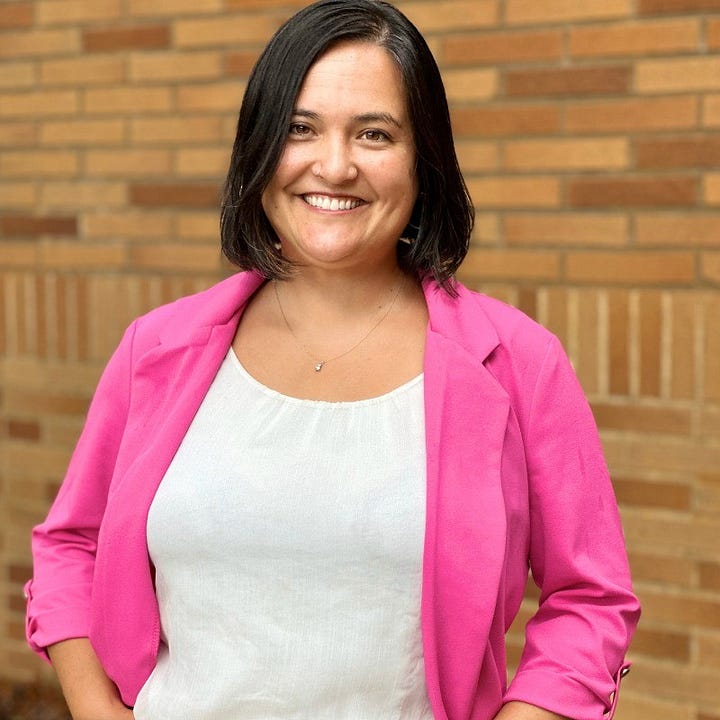
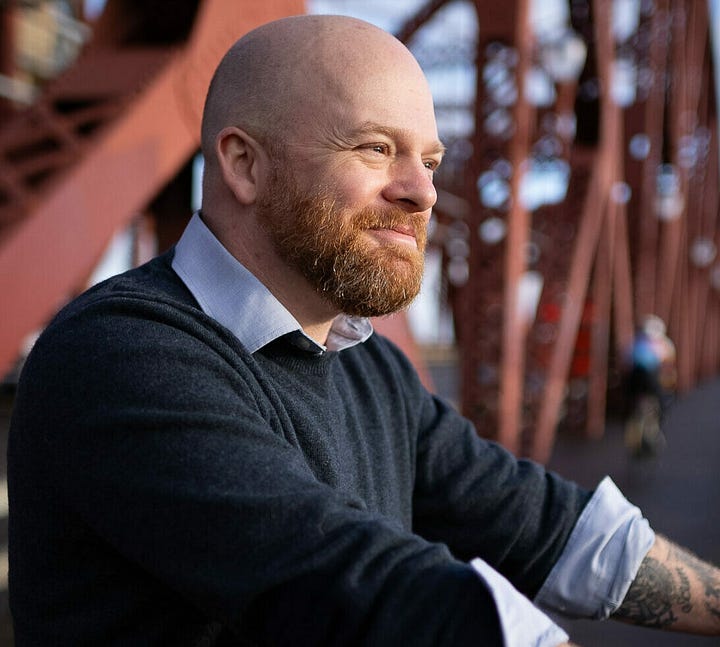
Eli Arnold on Vandalized Yard Signs
Portland police officer and District 4 candidate Eli Arnold posted a video in response to one of his yard signs being tagged with the letters ‘FTP’, which stands for “[Expletive] the Police.”
“Happy to have it crystal clear that I believe the police abolitionist crowd needs to be ignored,” Arnold posted on Twitter, offering to replace signs for all supporters whose signs are vandalized.
“This weekend should be a stark reminder that we remain an anomaly on homicides and police staffing relative to Seattle and San Francisco,” he added, referring to the five homicides that took place in Portland the second weekend of July.
Arnold called police officers “important partners” in Portland’s future and noted that the West Coast cities of San Francisco and Seattle have lower homicide rates than Portland.
“Both have more police per capita, and I don’t think that’s a coincidence,” Arnold said.
New Collector’s Item? Say Hello to Candidate Trading Cards
Ann Sanderson, a professional photographer and political consultant, has launched an innovative project to draw attention to Portland’s city races: candidate trading cards.
“The cards are only given out by the candidates themselves so that voters have to meet a candidate to get a card or trade with someone who has one. I’m hoping that many voters will want to ‘catch them all’,” Sanderson told Rose City Reform.
“I imagine when they get their voter pamphlets, they will put their collected cards on the table in front of them and physically sort them as they decide who to rank in what order,” she added.
While candidates are free to distribute the cards as they see fit, Sanderson is organizing events centered around trading the cards. The first event is scheduled for July 26 at Rogue Eastside, 928 SE 9th Ave, from 4:00 PM to 6:00 PM.
Nat West Slams Rene Gonzalez for Remarks on Public Testimony
District 2 candidate Nat West sharply criticized City Commissioner Rene Gonzalez following comments Gonzalez made during a council hearing, as reported by the Portland Mercury.
“Seeing Commissioner Gonzalez's bullying attack on a tireless community advocate yesterday reminded me that many elected officials take positions of power for granted and don’t listen,” West tweeted.
The incident occurred before the approval of an $11,500 legal settlement related to a bodily injury lawsuit from the 2020 Portland protests. Gonzalez dismissed testimony by Marc Poris of the volunteer group Portland Copwatch, stating Poris’ comments were not directly related to the lawsuit and should have been made during the public comment section.
“I strongly object to continuing to platform abolitionists that cannot testify on the matter before council,” Gonzalez said, calling Poris’ testimony “nonsense” and adding that he had no “constitutional right” to testify on that particular agenda item.
Registering his opposition to Gonzalez’s position, West noted:
“We don't have to agree. We often don't. But as a participant in this city and a candidate for Council, I will always fight for the right for others to speak and share their insights. Sadly, the Commissioner seems to think his role is to silence others, not open himself up to change or growth,” he wrote.
Eric Zimmerman Opposes Multnomah County Deflection Rollout
Eric Zimmerman, the chief-of-staff to County Commissioner Julia Brim-Edwards who is also a candidate in District 4, posted a video on social media saying he was “deeply disappointed” in Multnomah County’s planned rollout of deflection centers for individuals caught with small amounts of illicit drugs.
“At the end of the day, there is no accountability for follow-through on this program,” Zimmerman said, referring to the fact that individuals who choose deflection over arrest will be taken to a dropoff location, where they can choose to accept or refuse treatment.
“That is not what the State Legislature had in mind when they reformed Measure 110. It’s not what Portlanders had in mind when they supported those reforms, and it’s not something that the next City Council should accept from our other government partners moving forward,” Zimmerman said.
Measure 110, a ballot measure passed in 2020 to decriminalize small amounts of illicit drugs and fund treatment and recovery services, was repealed by the State Legislature in 2023 due to widespread concerns about its implementation and overall effectiveness in addressing substance abuse issues. The alternative legislation recriminalized the possession of illicit drugs with the option of deflection as an alternative to arrest.
Watch Multnomah County’s Voter Education Video
Multnomah County, which administers the City of Portland’s elections, has released a video explaining Portland’s new voting method for city offices. Have a look!
If you’d like to learn how this voting method works in practice, check out Rose City Reform’s mock election video.
Portland’s 2024 Election Documented in Upcoming Film
Did you know that a documentary film team has been chronicling Portland's election cycle since January 2024?
People’s Town Hall, a local nonprofit, is quietly following candidates and their campaigns, outgoing civic leaders, election officials, local press, and community members to explore how Portland navigates its historic 2024 election. The working title for the documentary is "The Experiment," with an anticipated release date in early 2026.
Nathan Williams, the film’s director, said the team applies a “fly on the wall” approach, similar to Frederick Wiseman’s critically acclaimed documentary "City Hall” about the workings of city government in Boston.
“So far, the vast majority of candidates and others involved in this process have welcomed our project with open arms,” Williams told Rose City Reform.
“I think there's a widespread feeling that something rare and special is happening this year, that we may not see again for a generation, and folks are happy we're documenting the big picture story beyond the immediate news cycle.”
Williams emphasized the team’s commitment to neutrality, saying all video footage is embargoed until after the election.
“We are committed to honoring that trust by not putting our thumb on the scale in any way -- we aren't advocating for any candidate or set of policy outcomes: we want to document all of these campaigns truthfully and with respect, showing what's unique about each candidate and their message, and trusting the audience to reach their own conclusions as they watch the film.”
For more information, visit People's Town Hall or follow the team’s progress on Instagram at pdxdemocracydoc.
Eli Arnold on Grants Pass Ruling
Eli Arnold, a Portland police officer who’s running for office in District 4, recently submitted a letter to the editor of The Oregonian. The piece outlined his views on the recent SCOTUS ruling overturning Martin v. Boise, a 2018 decision by the federal Court of Appeals for the 9th Circuit that barred western cities from enforcing public camping bans unless shelter beds were available.
Arnold noted that the ruling does not override local ordinances or Oregon's state law HB 3115, which requires cities to allow homeless individuals to rest and sleep in public spaces if no other options are available. He argued that expanding access to shelters and approved campsites is both the key to assisting those sleeping outside and to enforcing Portland’s new camping ban.
“We must create systems and enforce rules that promote the safety of all members of the community. It is time to put blocked sidewalks, dangerous roadside encampments and shigella outbreaks behind us,” Arnold wrote.
“The end of the Grants Pass case is the end of an excuse we’ve used because we were uncomfortable with moving beyond ideology and into the murky world of tangible choices,” he concluded.
Jesse Cornett Wants Return to Community Policing
District 3 candidate Jesse Cornett posted a statement on Instagram outlining his support for community policing.
“If I am so honored to be elected to Portland City Council, I will use my role to encourage our mayor to only hire a police chief with long-term dedication and a deep understanding of community policing,” he wrote.
“Before I launched my career in the legislative process, I attended the Police Academy and spent three years as a reserve Deputy Sheriff for Multnomah County. A few years later, my closest friend was killed by a police officer on my back porch,” Cornett continued, calling Portland’s loss of community policing under former mayor Vera Katz the worst decision made during her storied career.
“When we pivot our police back to community policing, we are going to require them to conduct their job in a different way,” he continued.
“This will take more time than simply responding to calls which has become the norm. The police will tell you we need more officers on the force to do it right. We might. But until we have a potent and co-equal non-law enforcement response in our city, I do not believe that the actual number of police officers we need can be determined,” he added, referring to Portland Street Response, the city’s unarmed responders who are sent to address mental health emergencies.
“I will work closely with our first city manager to ensure we have civilians for the vast array of other tasks that don’t require police.”
Mapps Concerned About Buckman Deflection Center
City Commissioner and mayoral candidate Mingus Mapps recently raised concerns about Multnomah County's planned drug deflection center in the Buckman neighborhood in southeast Portland. The center, set to open at 900 SE Sandy Blvd, aims to provide an alternative to incarceration for individuals found with small quantities of illicit substances, following the repeal of Oregon's Measure 110.
In a letter to supporters, Mapps said residents felt “blindsided” by the announcement, and highlighted several issues with the deflection process, including the unlimited opportunities for deflection, insufficient treatment resources, and the potential strain on the criminal justice system due to a shortage of public defenders.
"It's unclear what the "connection" will entail, raising questions about whether people will receive meaningful help or just sign in and leave without any further action," Mapps wrote.
He also pointed out community concerns about increased foot traffic, safety, and the perceived lack of transparency in the county's decision-making process.
"It's crucial that decisions affecting our neighborhoods involve transparent processes and robust community input," Mapps concluded.
Mariah Hudson Applauds PBOT Crackdown
District 2 candidate Mariah Hudson, who chairs the Portland Bureau of Transportation Budget Committee, tweeted her support for the City of Portland’s tougher enforcement policy on vehicle registration lapses and parking violations. As part of the initiative, the Portland Bureau of Transportation will increase its parking agent team from 58 to 80 officers, aiming to curb expired tags, missing plates, and improper parking—and to generate an estimated $5 million in additional revenue in the process.
“It’s not fun to get a ticket, but parking enforcement like graffiti enforcement/cleanup sets the tone for our city as a place where people follow the rules,” she said, calling the crackdown a “needed move to generate revenue from paid parking and to reestablish the common good.”
Council Candidates Express Concerns Over Office Remodel Staffing
A group of council candidates have raised concerns about City Hall’s planned remodel for city council offices. In a letter to Mayor Ted Wheeler and city commissioners Rene Gonzalez, Mingus Mapps, Carmen Rubio, and Dan Ryan, the candidates specifically took issue with interim city administrator Michael Jordan's statements that the remodel would accommodate only one staffer per council member.
“As candidates who have engaged extensively with Portland's diverse communities and intricate policy landscape, we firmly believe that a single staff member per council member is grossly inadequate to effectively carry out the various duties required of the office,” the letter stated.
The candidates argued that the proposed staffing level would hinder effective governance, slow down responses to constituents, and reduce community engagement. They called for an immediate halt to the remodeling work and asked the council to reevaluate the plan based on a comparison of staffing levels in peer cities of similar size to Portland. The letter noted that such a review was reportedly already conducted by city staff and urged City Hall to make the findings public.
The letter was signed by Deian Salazar from District 1; Mariah Hudson, Mike Marshall, and Bob Simril from District 2; Theo Saner from District 3; and Eli Arnold, Mitch Green, Stan Penkin, Michael Trimble, Andra Vltavín, and Bob Weinstein from District 4.
Advisory Committee Raises Similar Issues
In February of this year, the Government Transition Advisory Committee (GTAC)—an advisory body appointed to consult on the implementation of Portland’s reforms—voiced similar concerns about staffing levels.
"The staffing levels set [...] do not adequately support future council in their legislative duties and role in community engagement," GTAC wrote in a communication to council members.
The document referenced the review of staffing levels in peer cities and concluded that Portland would have the lowest staffing level among them. The review of peer cities included cities such as Austin, Boston, and Denver, and reported that peer cities averaged two to four staffers per individual councilor.
At the time, the mayor and city commissioners replied that elected councilors in the new government could establish additional office space within their districts and identify or reprioritize more funds for staff support in 2025.
Mixed Reactions From Candidates on Grants Pass Ruling
Multiple city candidates reacted this week to the Supreme Court’s decision to uphold a public camping ban in Grants Pass, a city in southwestern Oregon. The ruling overturns Martin v. Boise, a 2018 decision by the federal Court of Appeals for the 9th Circuit that barred western cities from enforcing public camping bans unless shelter beds were available.
“A dark period in the West, for Oregon, for Portland has ended,” tweeted city commissioner and mayoral candidate Rene Gonzalez, who oversees Portland’s Fire Bureau and is known for a tougher stance on public camping than his colleagues.
Gonzalez said the ruling would provide cities with new tools to remove encampments, but only if state legislators repeal or amend HB 3115, a 2021 state law enacted in response to the Martin v. Boise decision. HB 3115 mandates that public camping ordinances must be “objectively reasonable” and allows individuals affected by the ordinances to challenge them in court.
“If the state and courts continue to interfere with cities’ ability to govern their streets, we will continue to be overrun by migratory homeless and encampments,” he wrote, adding:
“To give Oregon cities a chance, the Legislature should remove the barriers created by HB 3115 and its progeny. If they fail to do so, it will be left to the good citizens of Oregon to do it themselves via ballot measure.”
Concerns Over Criminalizing Homelessness
City Commissioner Carmen Rubio, also running for mayor, agreed with Gonzalez that little would change in Portland as a direct result of the ruling, but appeared content with Portland’s current level of enforcement.
In a statement, Rubio expressed support for a camping ban recently passed by the council, scheduled to go into effect on July 1. The new ordinance, designed to comply with both Martin v. Boise and state law, prohibits camping on public property between 8 a.m. and 8 p.m, and allows enforcing officers to issue fines up to $100 for individuals refusing available shelter.
“I voted for the most recent camping ordinance because it strikes the right balance between humanity and accountability,” said Rubio, who oversees the Housing Bureau.
Despite city lawmakers’ assurances that no drastic changes are on the horizon, multiple council candidates expressed concerns about potential harsher penalties for sleeping outside.
“Criminalizing poverty is the exact opposite of progress,” District 1 candidate Candace Avalos posted on Twitter.
Mitch Green, an economist running for a seat in District 4, wrote a letter to supporters saying he was saddened by the ruling and that Portland could be going down a “dark road.” He argued that Portlanders have a choice between a politics focused on cutting taxes for the wealthy that seeks to “jail and exclude people from civic life,” or one that aims to “build the administrative capacity to house everyone living outside.”
Green’s fellow District 4 candidate Andra Vltavín called the SCOTUS ruling “devastating” and urged Portlanders to join a protest at City Hall on June 30.
The ‘black bloc’ protest – where participants wear black and cover their faces for anonymity – called for attendees to bring camping gear and masks. In a later post, Vltavín also mentioned bringing goggles to protect against tear gas.
“We’ll be here all night protecting the houseless community members when the camping ban goes into effect at midnight,” Vltavín said.
Have a tip for the tracker? Please send it to info@rosecityreform.org or reply directly to the Rose City Reform newsletter.
We have discontinued our events section due to a disproportionate number of event submissions from a small group of candidates. To maintain fairness for all, we will no longer be listing events.
Top fundraisers according to the City of Portland:
Mayor’s race:
Rene Gonzalez ≈$311,000*
Keith Wilson: ≈$288,000*
Carmen Rubio: ≈$254,000*
*Total includes $100,000 in public financing
Council races:
Tiffany Koyama Lane: ≈$214,000*
Steph Routh: ≈$200,000*
Dan Ryan: ≈$196,000**
*Total includes $120,000 in public financing
**Total includes $80,000 in public financing
Source: Oregon Secretary of State, last updated 11/02/24

